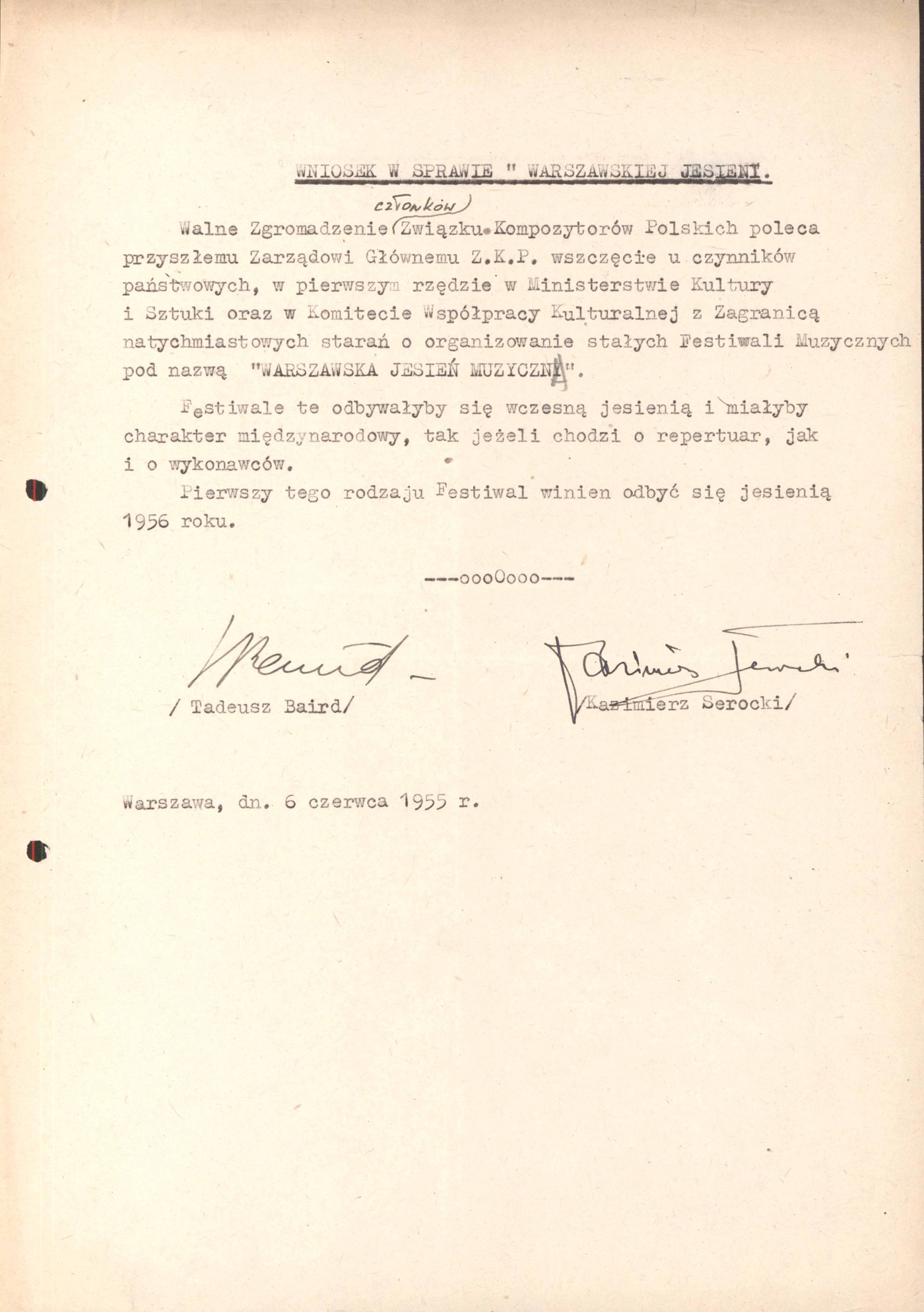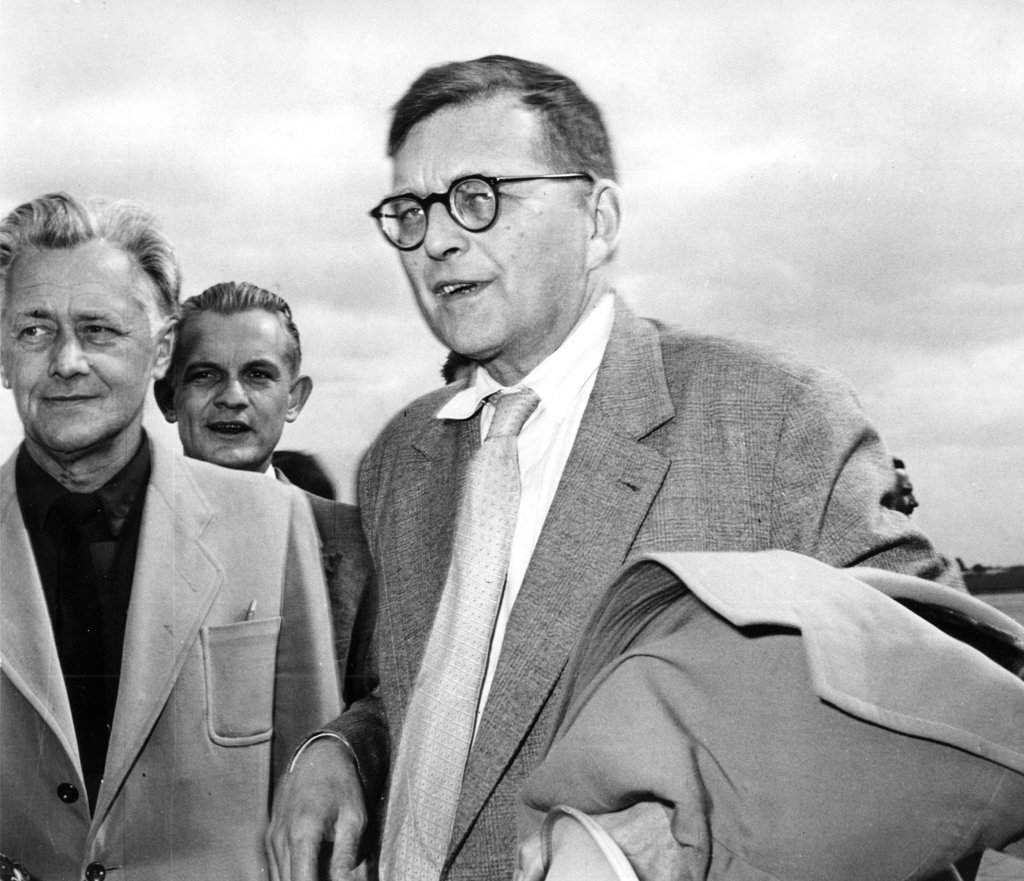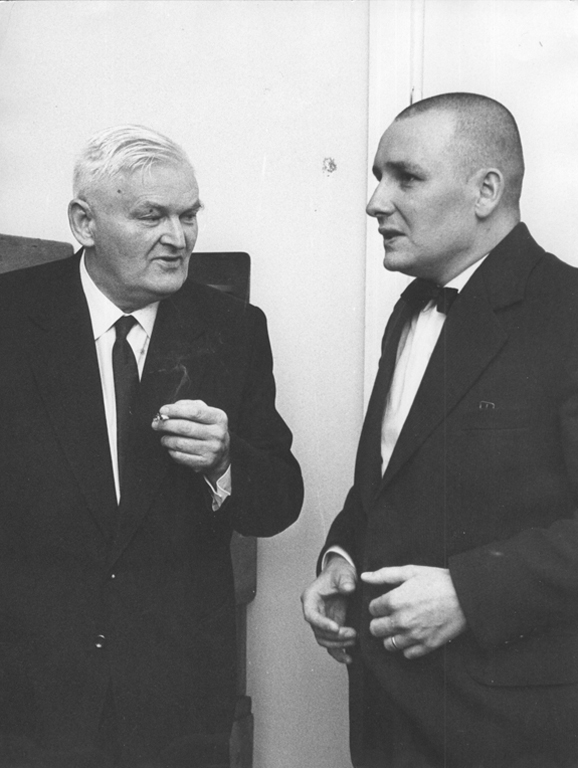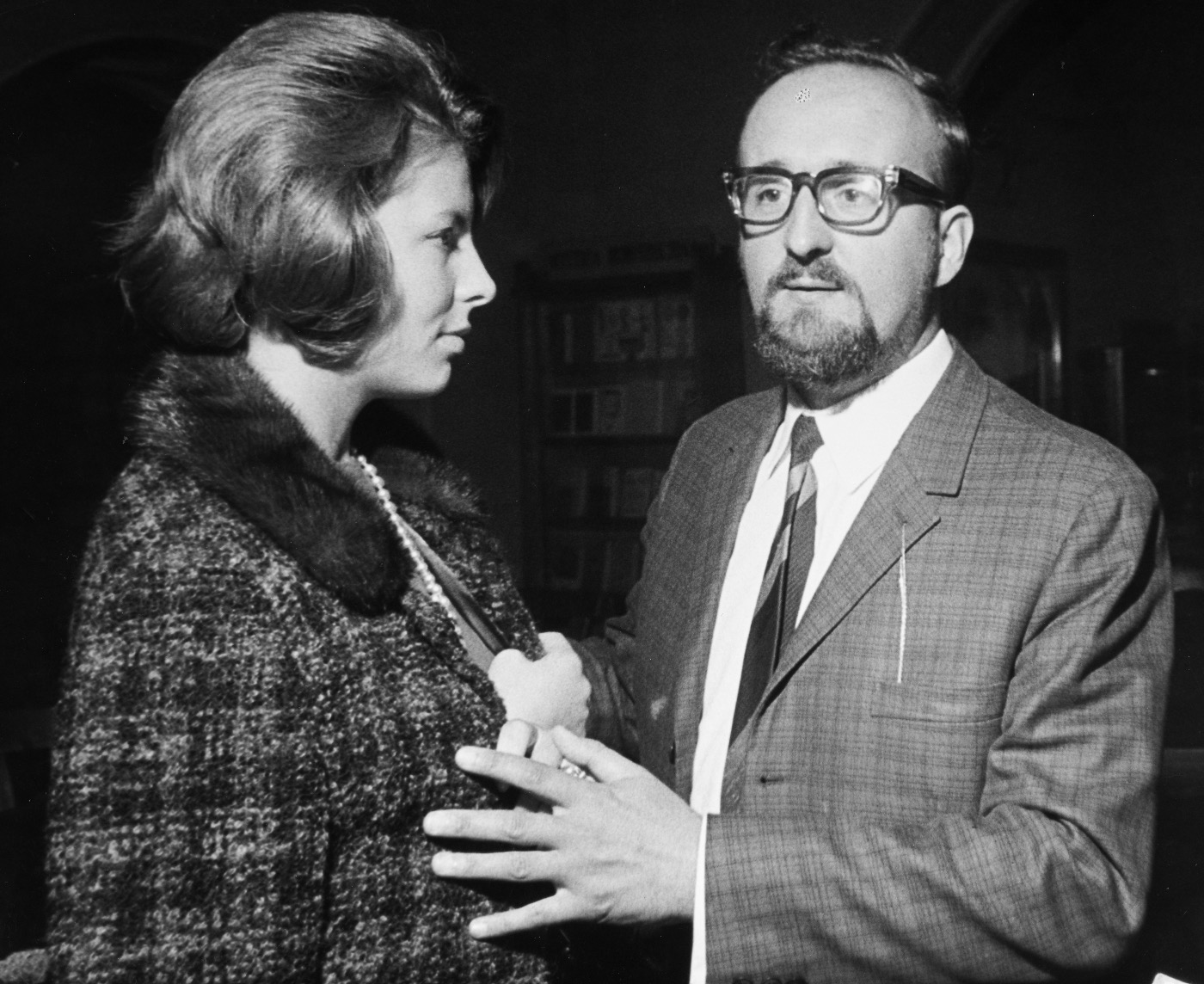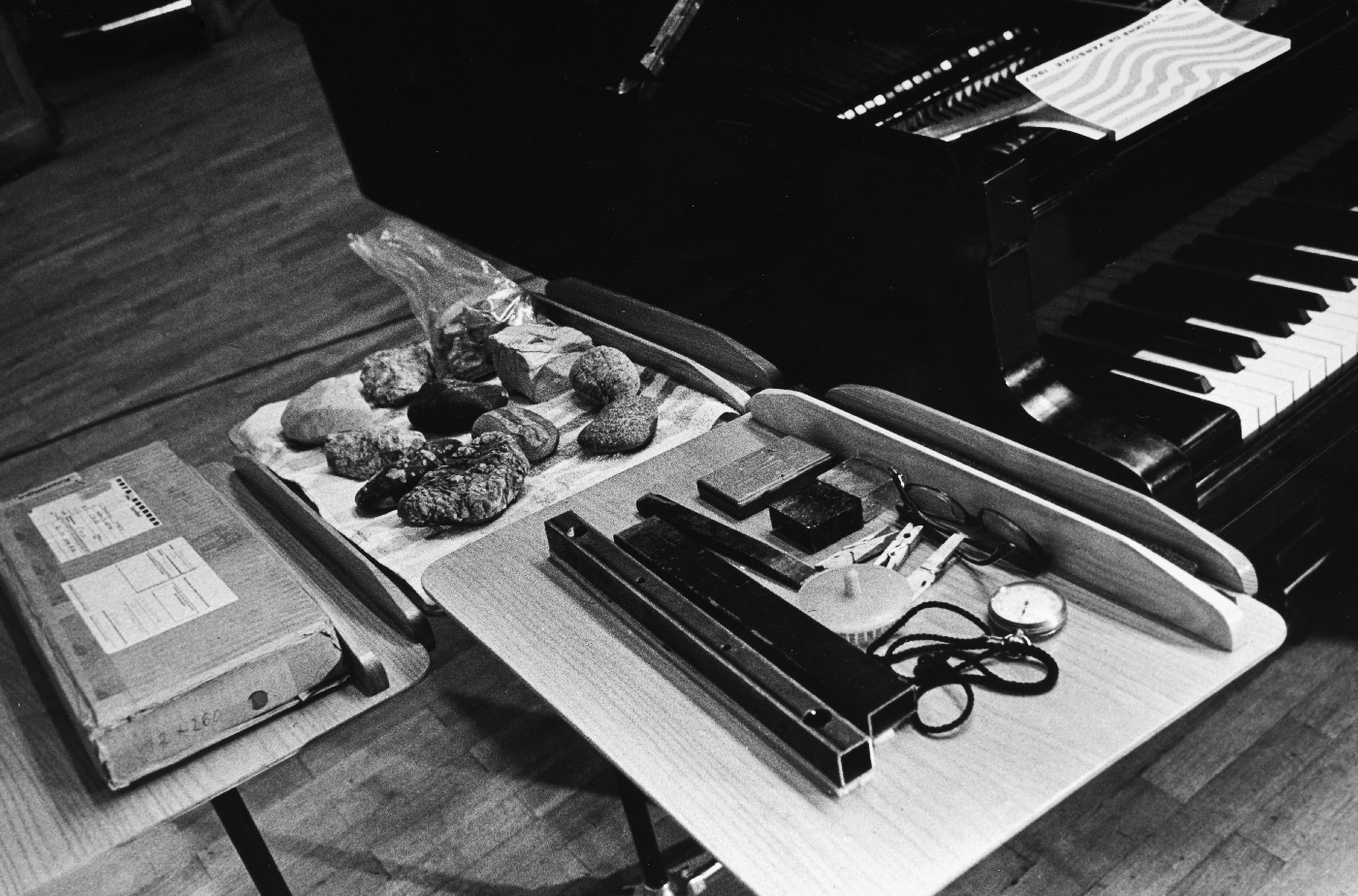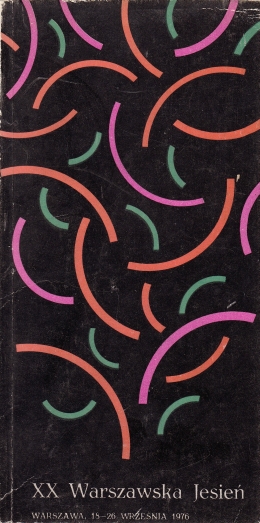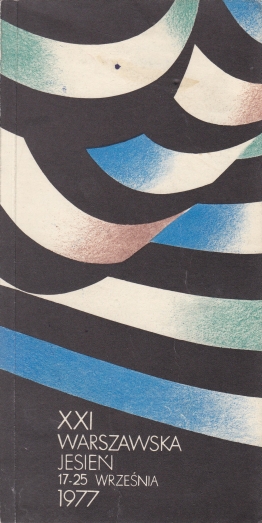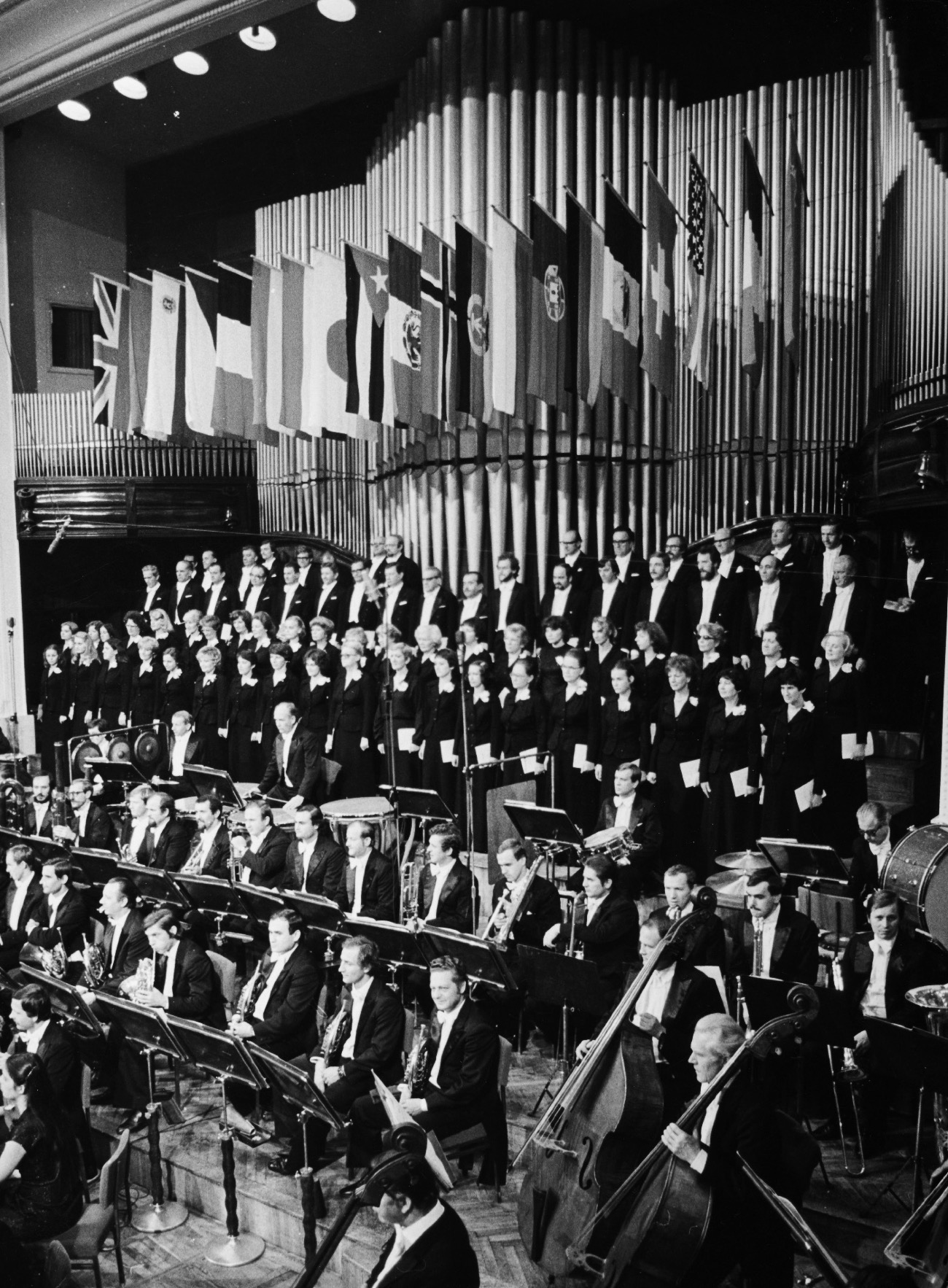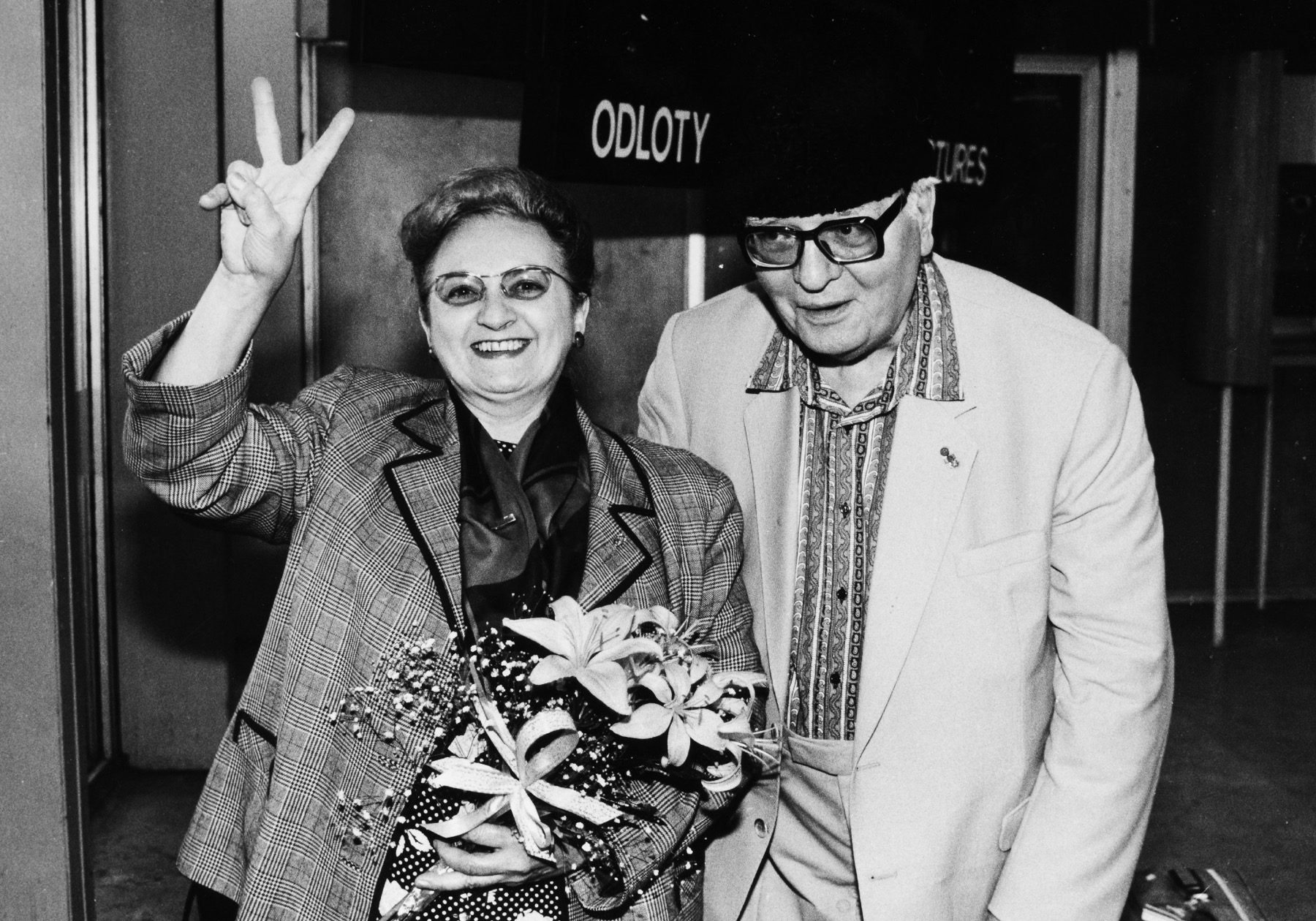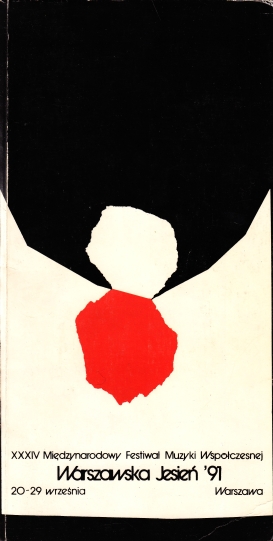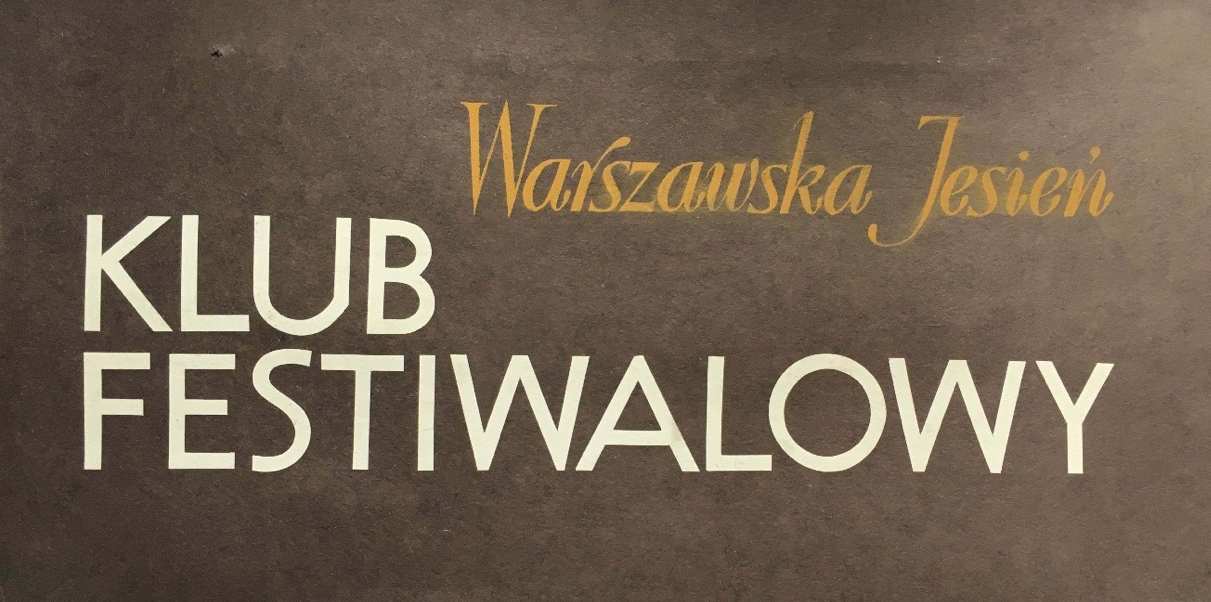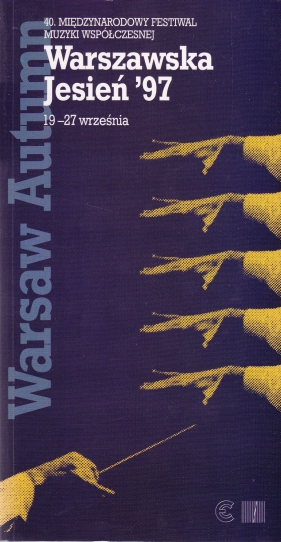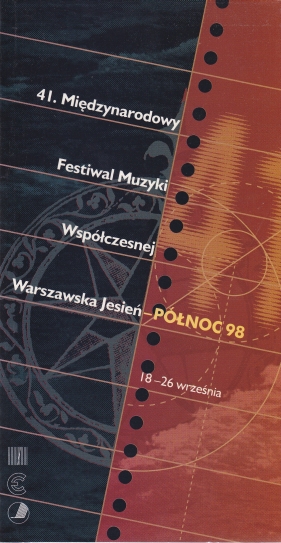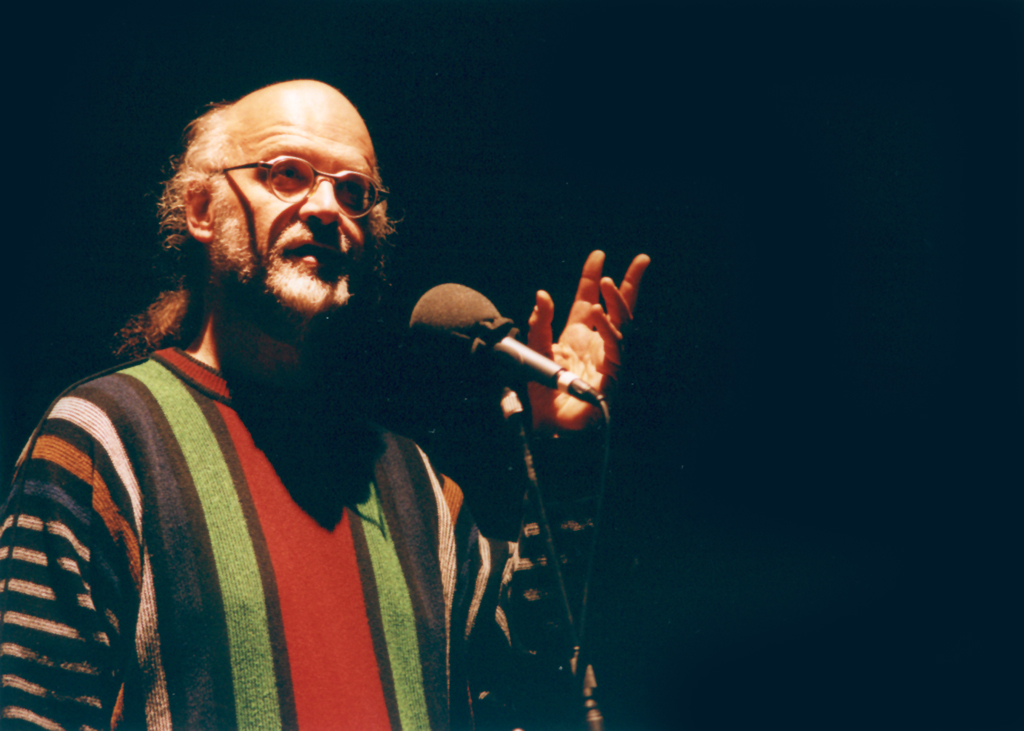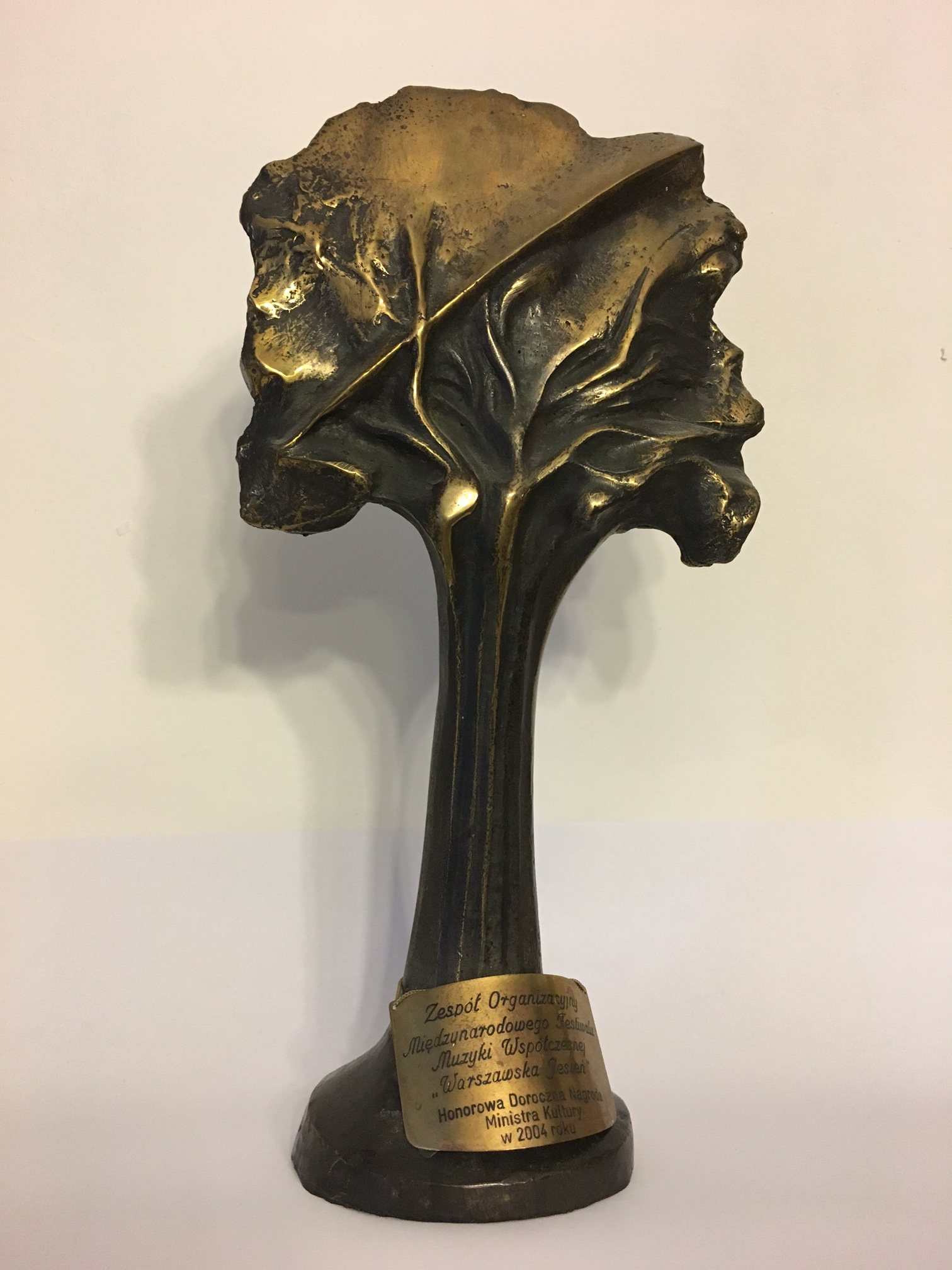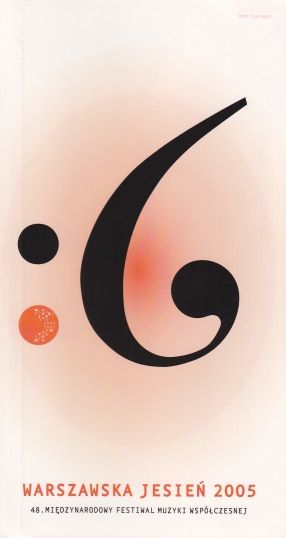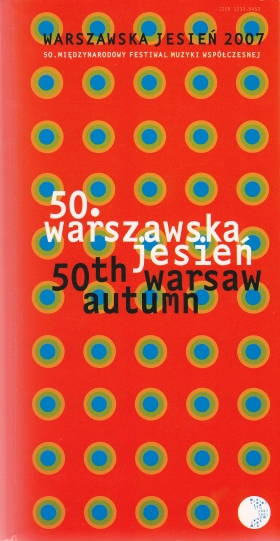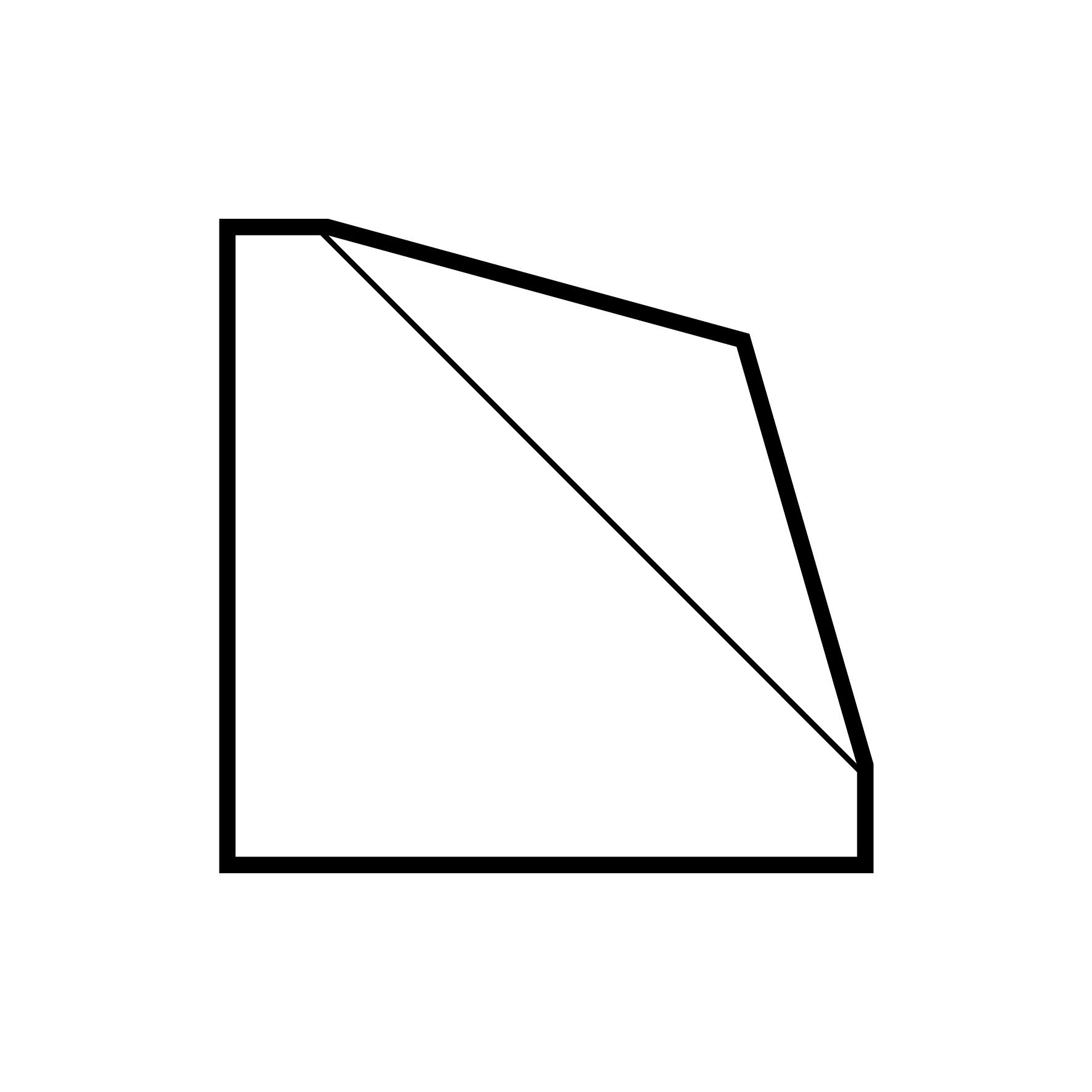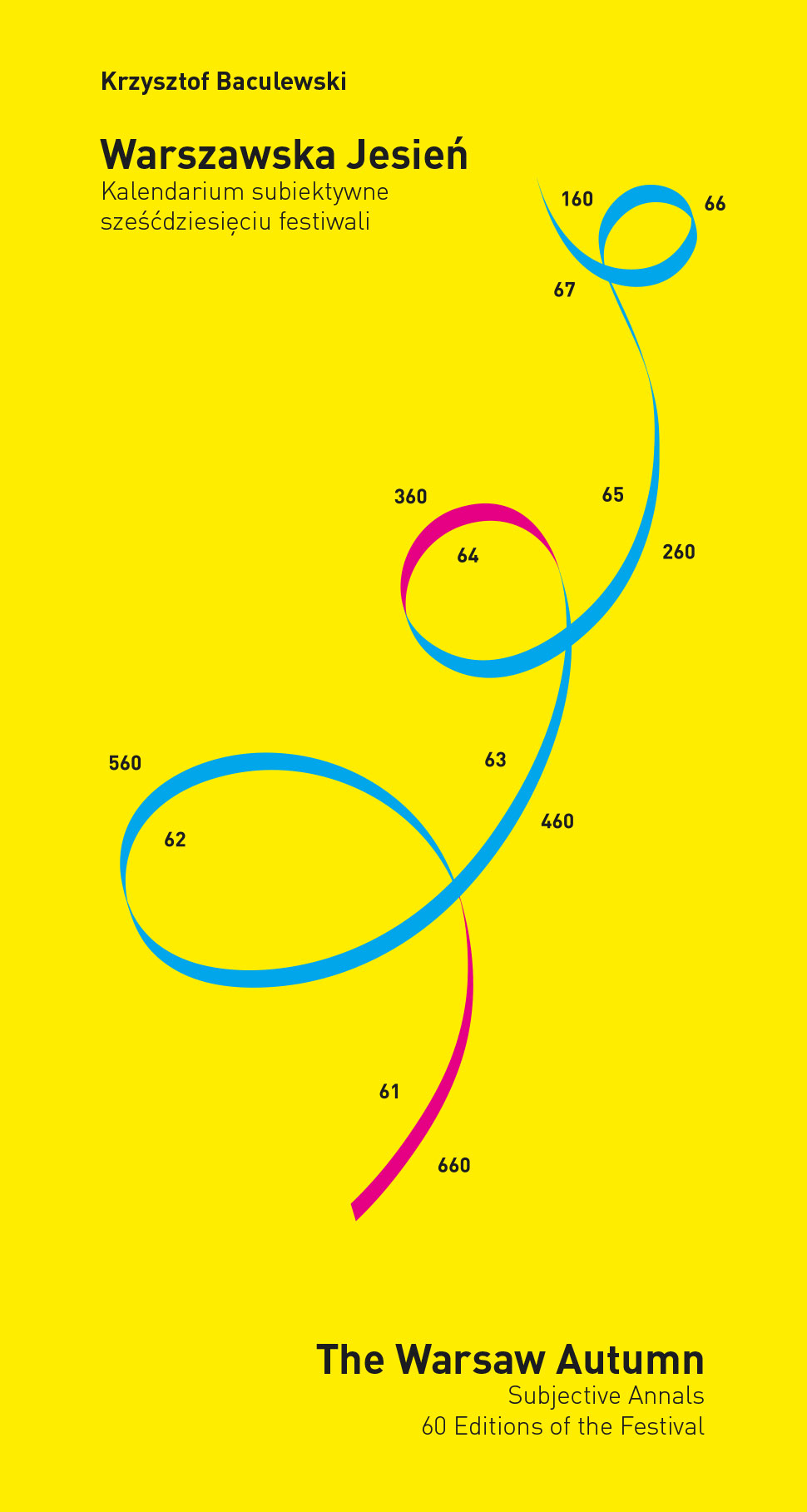

Krzysztof Baculewski "Subjective Annals 60 Editions of the Festival"
The first 'Warsaw Autumn' did not yet use that name. In the programme book, it was officially called the First International Festival of Contemporary Music.
The Festival lasted 11 days, from 10th to 21st October. Almost symbolically, it inaugurated a new stage in the history of Polish music: on the last day of the Festival, the 8th Plenary Session of the Central Committee of the Polish United Workers' Party, which had been deliberating for 3 days, elected a new Party Secretary, Władysław Gomułka. The expectations that the Polish society had in connection with this choice turned out to be vain hopes, and the 'thaw' was a brief one. However, the period of normative aesthetics, of socialist realism, traces of which continued to appear in the programmes of the 'Warsaw Autumn', definitely came to an end, at least as far as new Polish music was concerned.
The first 'Warsaw Autumn' did not have the distinctly avant-garde pro le that it acquired later. It was making up for the lost time of cultural isolation. For propaganda purposes, it forged a slogan about confrontation between the music of 'peoples' democracies' and that of the West. It was a convenient formula, which provided justification for the presence in the programme of 'bourgeois' music, which had until recently been banned in Poland. This made the 'Warsaw Autumn' particularly attractive for visitors from the USSR and other socialist countries, for whom this was the only opportunity for contact with music and musicians from the West.
The first work ever to be performed at the 'Warsaw Autumn' was Les Offrandes oubliées by Olivier Messiaen (I am not sure whether it was played in full), presented under the title Fragment symphonique, in order to fool the censor. The Warsaw Philharmonic Orchestra was led by Bohdan Wodiczko, who conducted the Orchestra from the start of its first season in the new venue (the Warsaw Philharmonic Hall: originally constructed in 1901, bombed in 1939, reduced to rubble toward the end of the war). He was the author of courageous and well-thought-out concert programmes, which presented music considered as harmful by theorists of socialist realism. Apart from Messiaen, the programme comprised Karol Szymanowski's Stabat Mater and Dmitri Shostakovich's Symphony No. 10. The Warsaw Philharmonic Choir rehearsed the programme with Roman Kuklewicz, and the soloists were prominent Polish singers: Maria Kunińska (soprano), Krystyna Szczepańska (alto), and Andrzej Hiolski (baritone). On the performance side, that first 'Warsaw Autumn' concert also made history as far as Polish music is concerned; but not only the first concert was of historical importance, and not only the Polish musicians. Some of the greatest conductors took part in the 1st Festival: Jean Martinon, Michael Gielen, Mircea Besarab, Jan Krenz, Witold Rowicki, Karol Stryja, Stanisław Wisłocki, Stanisław Skrowaczewski; violinists: David Oystrakh, Tadeusz Wroński, Irena Dubiska and Eugenia Umińska; pianists: Alfred Brendel and Władysław Kędra; Stefania Woytowicz also made an appearance.
The repertoire was dominated by - as we would say today - 20th-century classics, such as Igor Stravinsky, Béla Bartók, Arnold Schoenberg, Arthur Honegger, but every concert also included a Polish piece, by Bolesław Woytowicz, Grażyna Bacewicz, Michał Spisak, Tadeusz Baird, Artur Malawski, Stefan Kisielewski or Witold Lutosławski.
Symphonic concerts dominated the 1956 'Warsaw Autumn' programme (17 out of 20), which never happened again in history. Nine orchestras took part; apart from Warsaw Philharmonic there were the Wiener Philharmoniker, the Parisian ORTF, the State Orchestra of the USSR from Moscow, philharmonic orchestras from Brno and Bucharest, the Great Symphony Orchestra of Polish Radio (WOSPR), Silesian Philharmonic, and the Kraków Radio Orchestra. ere were also three chamber music concerts, including two performances of string quartets: by Vilmos Tatrai from Budapest and Jacques Parrenin from Paris. A curious feature of the programme were the 'concessions' to the performers - it is not hard to guess which ones - in the form of Symphony No. 4 in E minor, Op. 98 by Johannes Brahms and Symphony No. 5 in E Minor, Op. 64 by Pyotr Tchaikovsky. For balance, we also ought to note the first Polish performance of e Rite of Spring by Igor Stravinsky -a work which was, after all, 43 years old at that time...
An important complement to the Festival were the 'Sound Chronicles', until 1989 released promptly on LPs by 'Polskie Nagrania' [Polish Recordings state record company], and often released while the event was still in progress. Originally they contained excerpts from the most important events of the 'Warsaw Autumn', in later years - the Polish compositions, in full whenever possible. In the years 1990-99 the publication of the chronicles (on compact cassettes) was taken over by the Polish Composers' Union, which since 1999 has released them on promotional CDs (not for sale). Occasionally the organisers also managed to obtain permission for the release of selected Festival works by foreign composers.
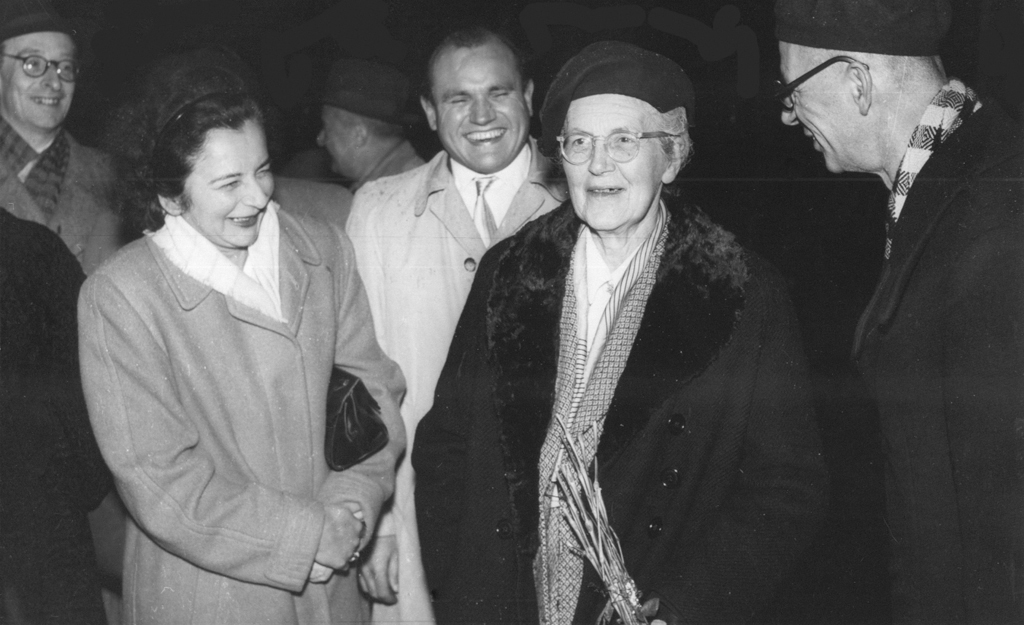

Nadia Boulanger taking her leave: Jerzy Jasieński, Grażyna Bacewicz, Kazimierz Serocki, Nadia Boulanger, and Zygmunt Mycielski, photo by Wdowiński
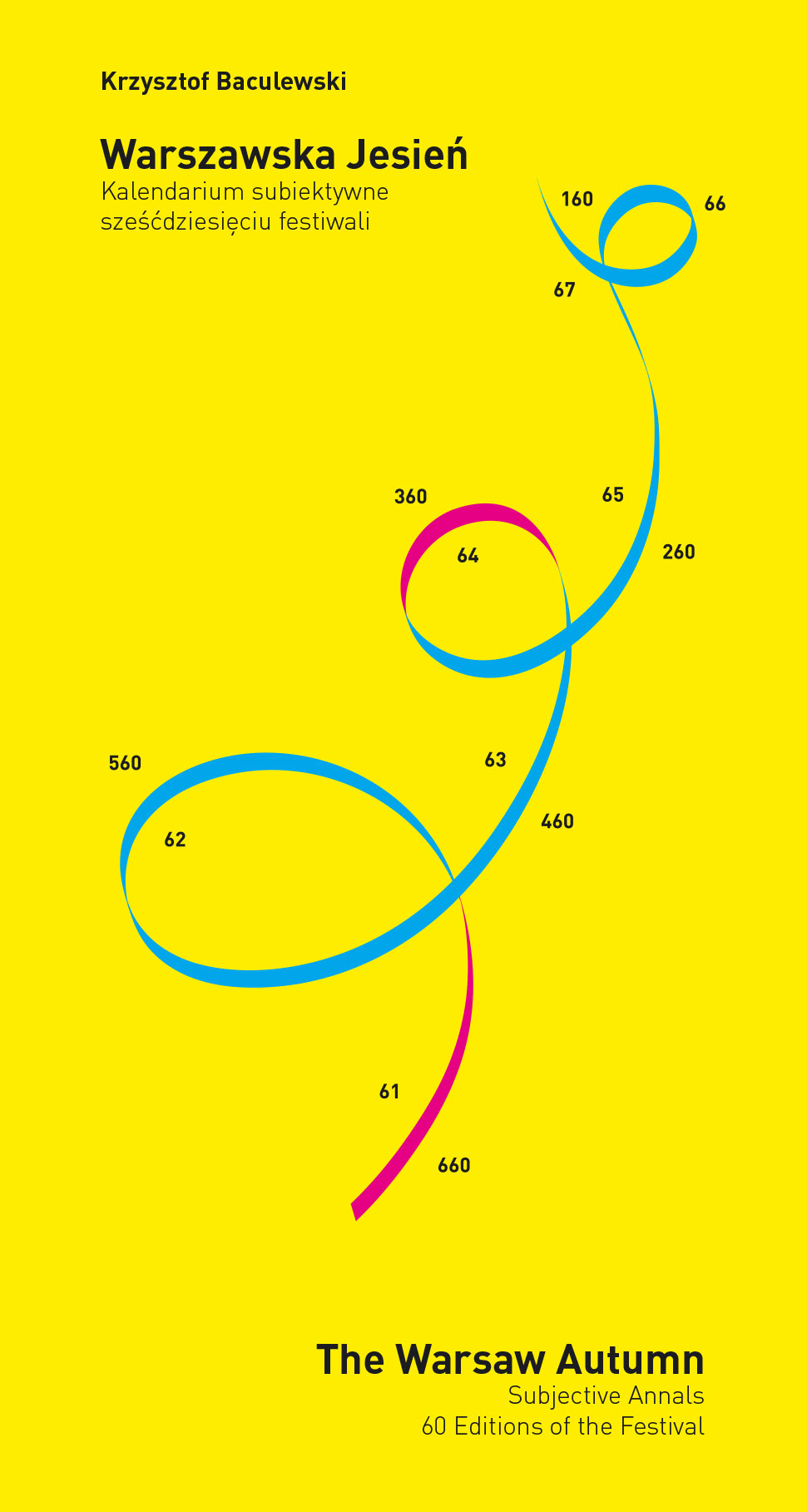

Krzysztof Baculewski "Subjective Annals 60 Editions of the Festival"
This is not a mistake: the second Festival took place as planned, two years after the first one, and the name 'Warsaw Autumn' was used in the programme book only unofficially (it was not printed on the cover). The dates were changed. The Festival was held between Saturday 27th September and Sunday 5th October. Altogether there were eighteen concerts and - for the first time - opera and ballet performances. Also for the first time the programme included a concert of electronic music - erroneously referred to as electron music, played back from tape and with a lecture by Karlheinz Stockhausen. Works by Anton Webern, Pierre Boulez, Karlheinz Stockhausen, Luigi Nono and Luciano Berio were performed. Moreover, the 'Warsaw Autumn' was host to Roman Palester, at that time a presenter and author of broadcasts for the Polish Section of Radio Free Europe in Munich, who visited Poland during a momentary 'thaw'. ere were also the debuts of Kazimierz Serocki, Włodzimierz Kotoński and Henryk Mikołaj Górecki. The performers included the Juilliard String Quartet, pianists: Sviatoslav Richter, Regina Smendzianka, violinist Henryk Szeryng, clarinettist Ludwik Kurkiewicz, cellist Mstislav Rostropovich, as well as conductors: Bruno Maderna, Kurt Sanderling, Yevgeny Mravinsky and, for the first time, also Andrzej Markowski.
From today's perspective one can clearly observe the change in the Festival's profile - a shift toward the most recent works representing the most avant-garde movements of the day. The dominant trends were dodecaphony and serialism. Music for tape was also making its appearance.
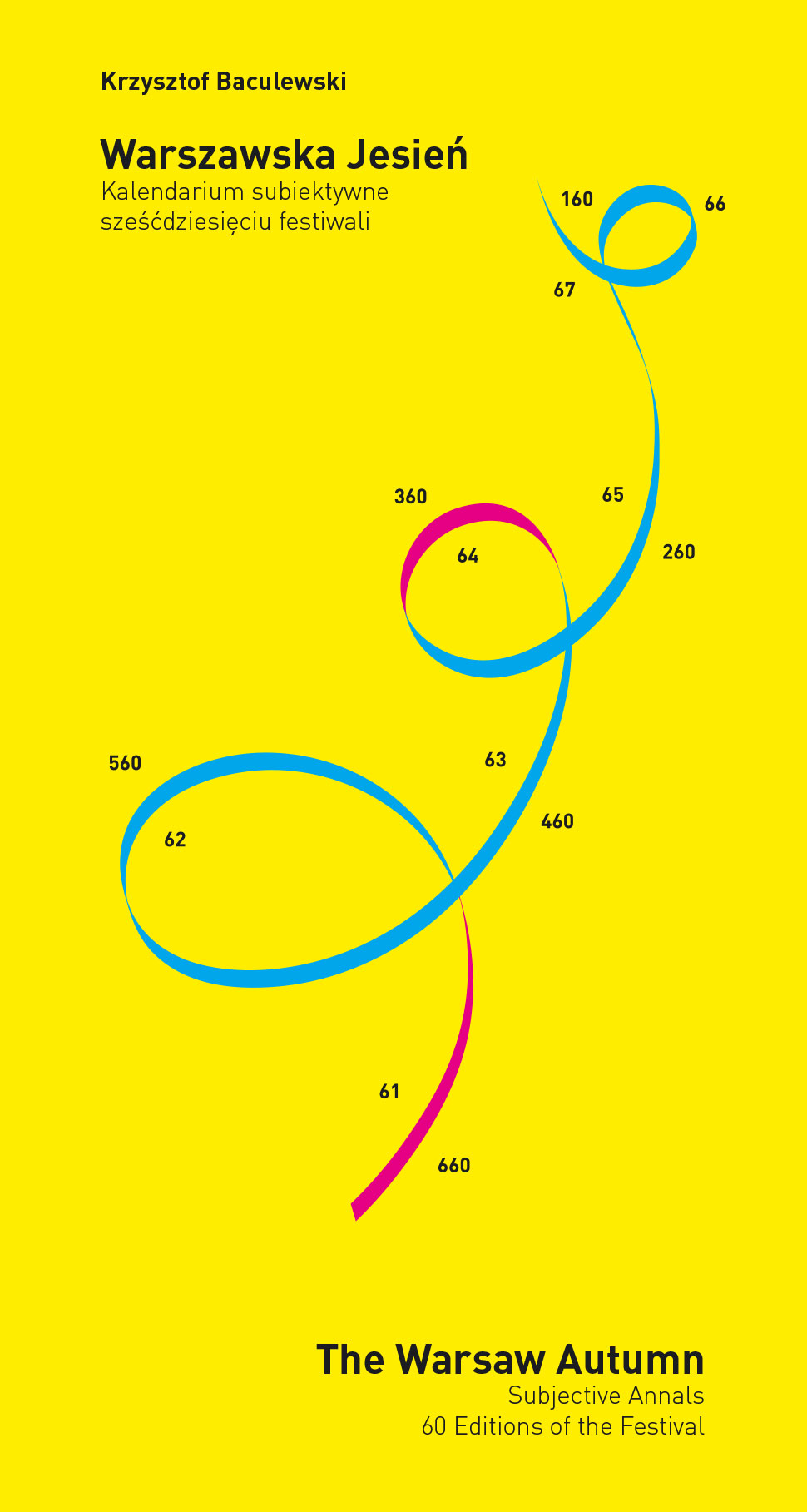

Krzysztof Baculewski "Subjective Annals 60 Editions of the Festival"
The festival, which took place still earlier in September (from Saturday 12th to Sunday 20th), clearly began to approximate its present-day shape. Until 1978 it would start on Saturday and end on the following Sunday.
This time there were nineteen concerts, opera and ballet performances. Among the most important participants, and those new to the 'Warsaw Autumn', one should note the conductors: Ernest Ansermet with l'Orchestre de la Suisse Romande, György Lehel with the Budapest Radio and TV Orchestra, the Parrenin String Quartet from France, violinist Wanda Wiłkomirska, pianist Tadeusz Żmudziński and flutist Severino Gazzeloni.
The dodecaphonic and experimental current, whose presence was becoming stronger every year, still mixed with neoclassical reminiscences which were a way of catching up with the missed past. The programme included works by Luigi Dallapiccola, Iannis Xenakis (tape), François Bernard Mâche (tape), Luc Ferrari (tape), Konstanty Regamey and Henri Pousseur, Edgard Varèse, the debuts of Witold Szalonek and Krzysztof Penderecki. And another lecture combined with a demonstration: this time Pierre Schaeffer demonstrated the musique concrete from ORTF studio .
The programme book of the 3rd 'Warsaw Autumn' contains a chapter with excerpts from Polish and foreign reviews of the preceding Festival. Bulgarian and Soviet opinions, which pulled the innovators to pieces and, by the same token, railed against the Festival's organisers, caused emotions to run very high. Today they sound amusing, creating the impression of ghosts from the past. Even in the Warsaw of that time they appeared anachronistic and sounded like political informers' reports, while at the same time they increased interest in and anticipation of the taste of forbidden fruit.
The Repertoire Committee of the Festival was formed before the 3rd 'Warsaw Autumn' - previously the Festival had been programmed by the Presidium of the PCU Managing Board . Members of the Committee, which remained unchanged until 1965, were: Tadeusz Baird, Andrzej Dobrowolski, Włodzimierz Kotoński, Kazimierz Serocki, Józef Patkowski, and Witold Lutosławski as its chairman.
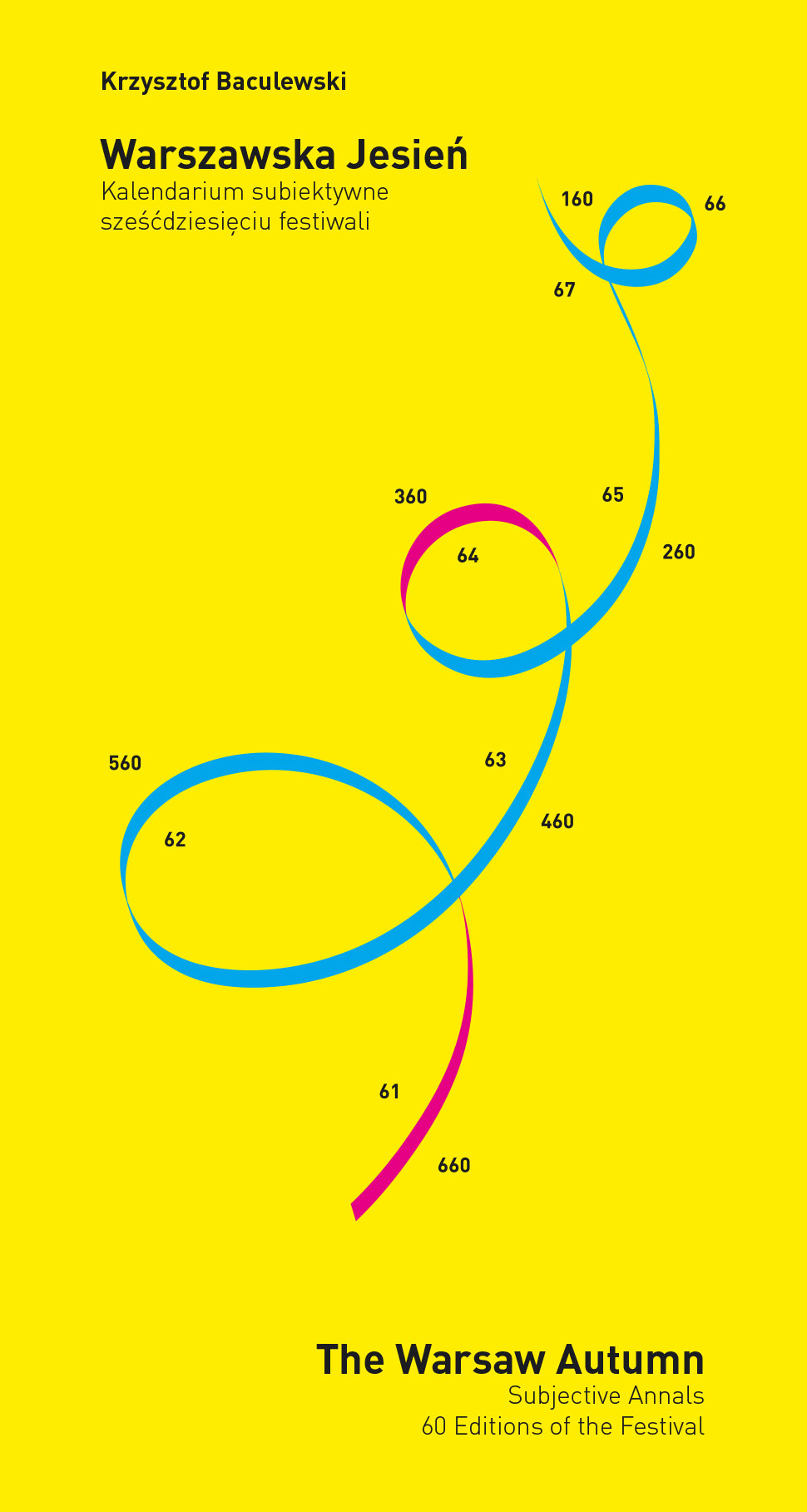

Krzysztof Baculewski "Subjective Annals 60 Editions of the Festival"
This Festival edition consisted of seventeen concerts and opera performances, with an increasing proportion of chamber music. After the experiences of the preceding year, the pro le of the Festival seems to have been clearly de ned. The participants included: Mstislav Rostropovich, the Parrenin Quartet, singers: Josephine Nendick and Halina Łukomska - sopranos, Krystyna Szostek-Radkowa - mezzo-soprano and Kazimierz Pustelak - tenor; conductors: Hiroyuki Iwaki with the Tokyo NHK Orchestra, Karel Ančerl with the Czech Philharmonic, as well as Polish masters of the baton: Witold Rowicki, Stanisław Wisłocki, Andrzej Markowski and Jan Krenz, with a guest appearance by Roman Maciejewski. The programme featured Bogusław Schae er. Working through the historical backlog, the Baltic Opera presented Béla Bartók's The Miraculous Mandarin. There were significantly fewer foreign performers. However, one should note an important new development: 'a review of experimental music', in other words, a concert of tape music. This presentation by Józef Patkowski, the director of the Experimental Studio of Polish Radio, set up three years earlier, included the first Polish work of this kind: Study for One Cymbal Stroke by Włodzimierz Kotoński. This was the beginning of the history of Polish electroacoustic music at 'Warsaw Autumn'. Other interesting and original events included the presentation of radio operas by Grażyna Bacewicz (The Adventure of King Arthur) and Zbigniew Wiszniewski (Neffru).
Witold Lutosławski chaired the Repertoire Committee (until 1965).
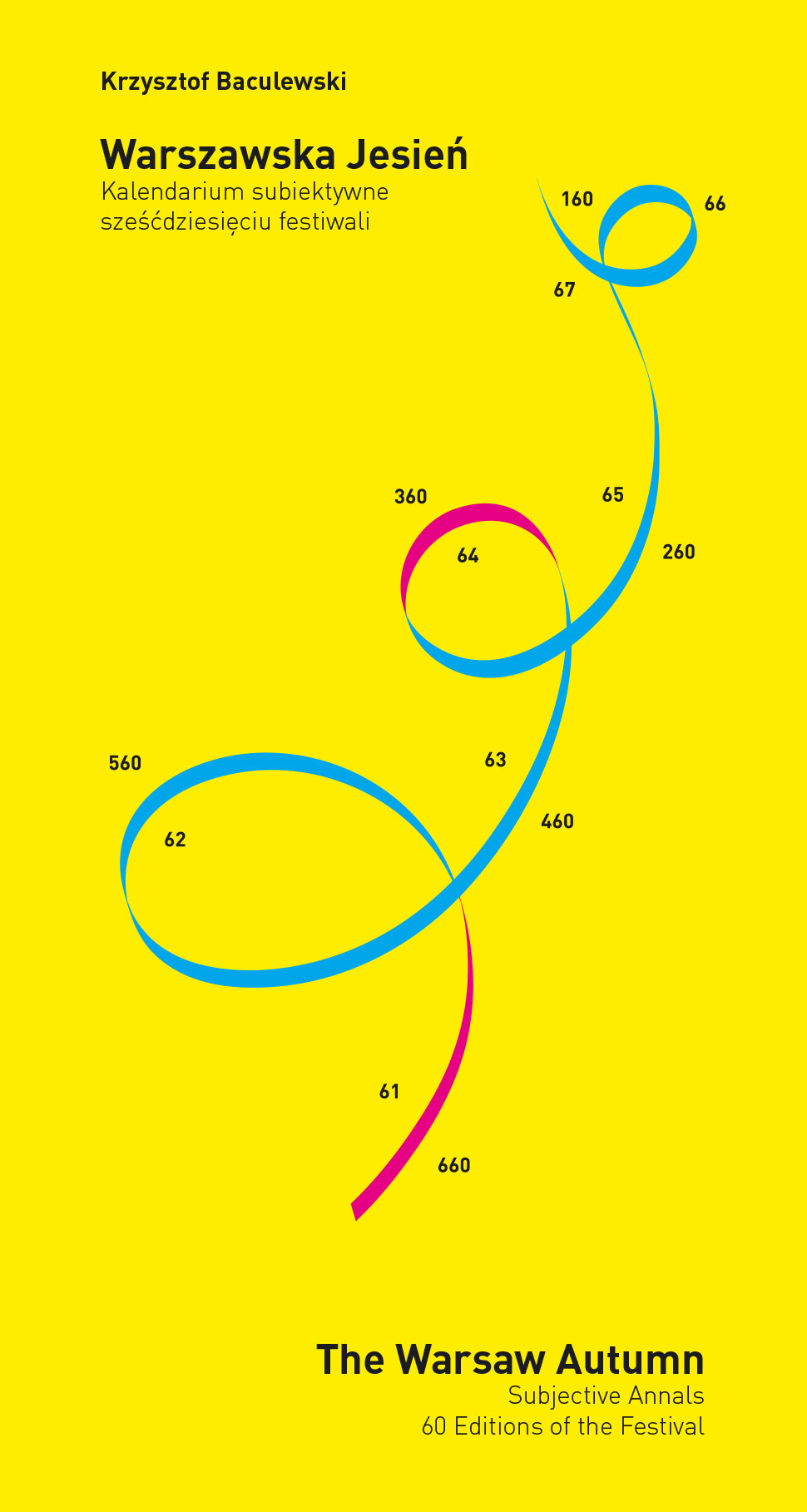

Krzysztof Baculewski "Subjective Annals 60 Editions of the Festival"
The familiar format and content organisation of 'Warsaw Autumn' programme books, with an index of past events at the end, dates from that year. In 1961-67 at the front of that publication we find the names of the members of the so-called Organising Committee -a somewhat curious body which was originally involved in organising the Festival, but over the years became more of an honorary committee, which not infrequently fulfilled a rather decorative and ceremonial function in different fora, especially those in a position to grant imprimatur, and even more importantly, allocate funds, Sometimes the Committee also played the role of a mediator between different parties.
Guests at the 5th 'Warsaw Autumn' included: Benjamin Britten, tenor Peter Pears, Italian flutist Severino Gazzeloni, and the West German piano duet Aloys & Alfons Kontarsky. The famous Cathy Berberian and the then well-known ensemble of avant-garde music Die Reihe under Friedrich Cerha made their appearance for the first time, as also did the pianist Barbara Hesse-Bukowska. The alto Daniela Ogłaza, who sang at the opening concert, is known today almost exclusively from the LP 'Golden Hits of Socialism', where she sings an actual hit: Alfred Gradstein's Na lewo most, na prawo most (A Bridge to the Left, a Bridge to the Right). The performance by Beijing Opera was quite a sensation. The composers Augustyn Bloch and Andrzej Koszewski made their debuts that year. The programme included a number of significant points: Luigi Nono's Il Canto sospeso, Krzysztof Penderecki's Threnody for the Victims of Hiroshima and Stanisław Wiechowicz's Lettre à Marc Chagall.
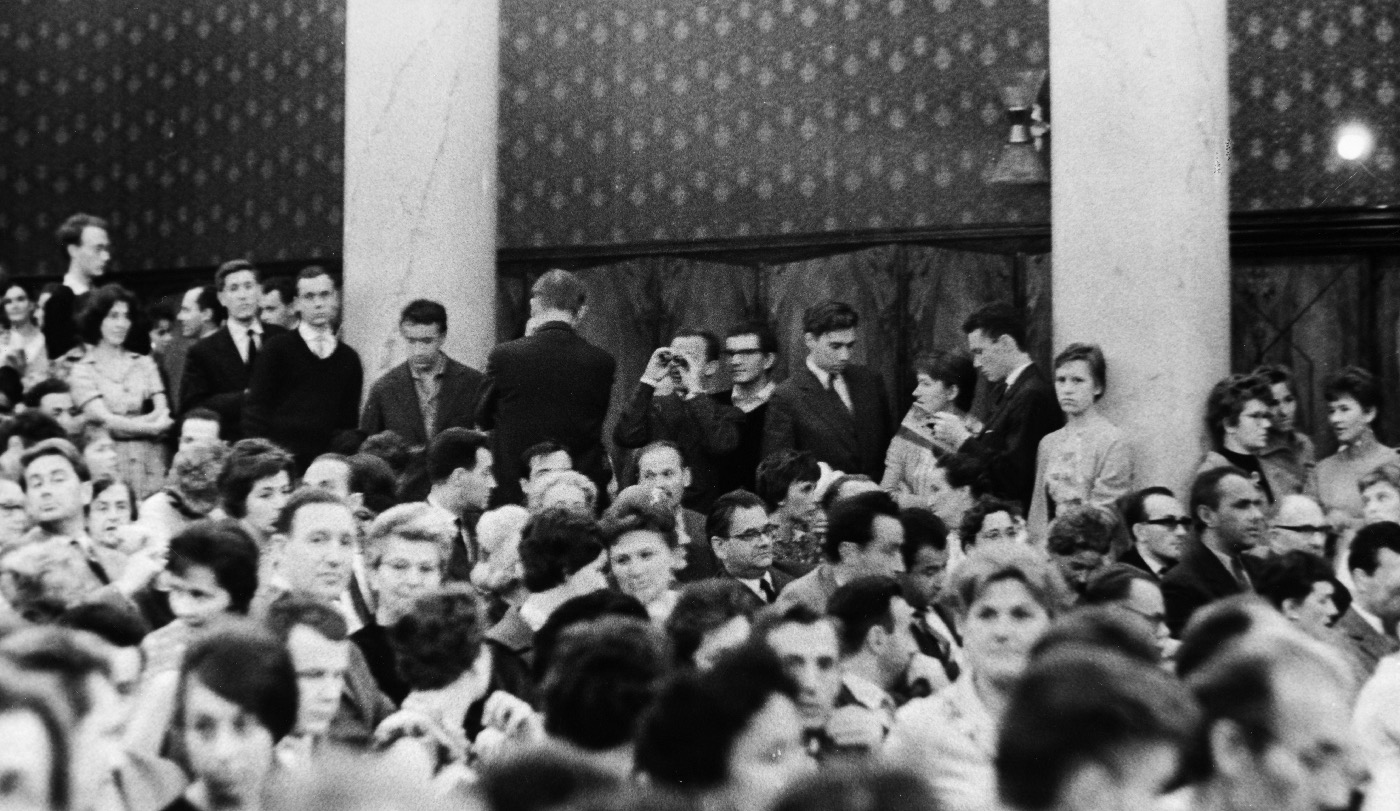

The Warsaw Autumn audience in the Warsaw Philharmonic Chamber Music Hall, photo by Andrzej Zborski
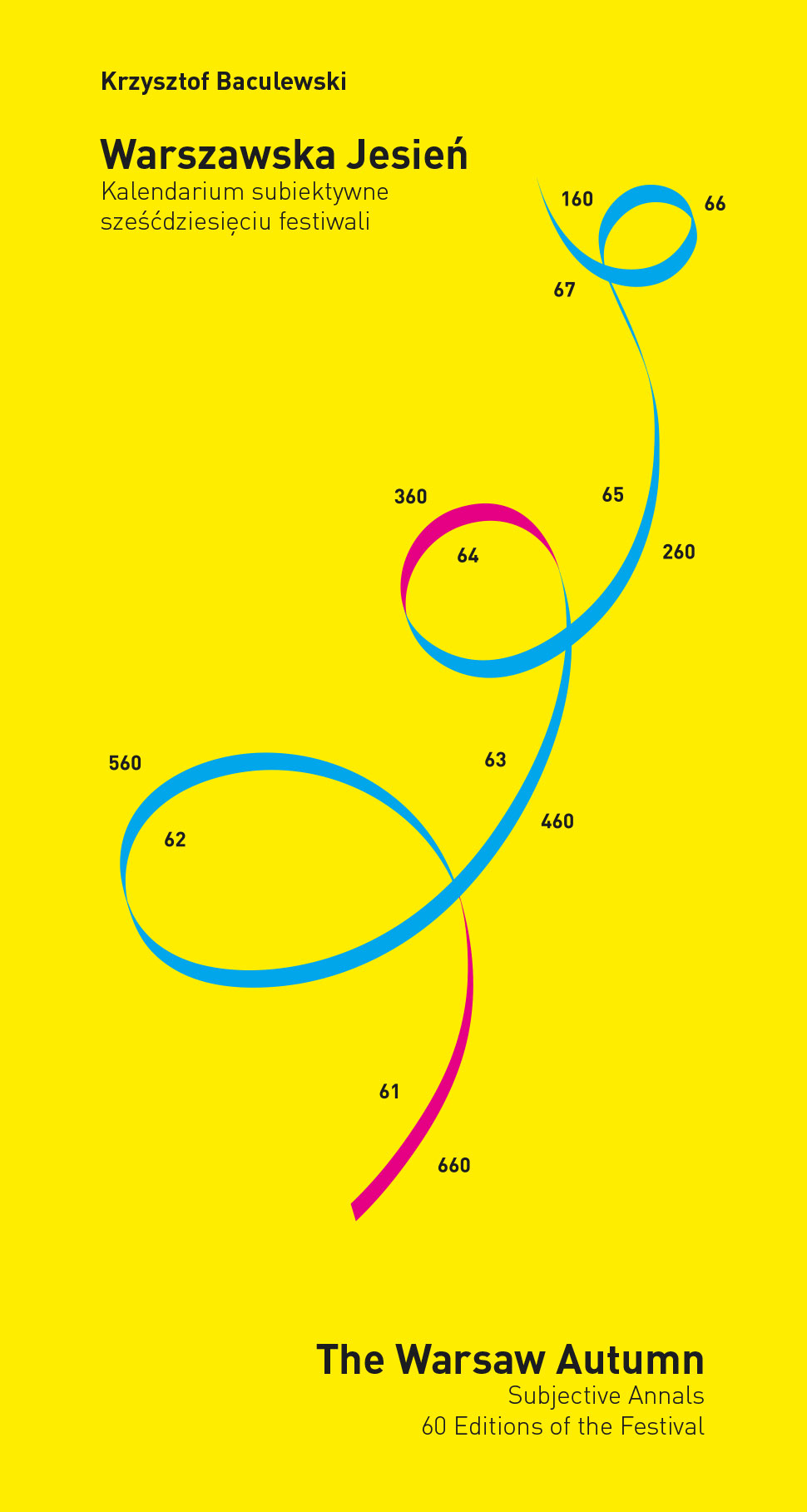

Krzysztof Baculewski "Subjective Annals 60 Editions of the Festival"
Today, the programme of the 1962 Festival appears somewhat eclectic. On the one hand, we have Legends of Love by Arif Melikov, performed by the Kirov State Academic Theatre of Opera and Ballet from Leningrad, winner of the Order of Lenin. An explanation for younger readers: Leningrad is today known as St Petersburg, and Sergey M. Kirov was a prominent communist activist and participant of the 1905 and October 1917 revolutions, honoured for his services to Leningrad. On the other hand, there are Riff 62 by Wojciech Kilar and Pithoprakta by Iannis Xenakis, as well as Karol Szymanowski (to mark his 80th birth anniversary), Anton Webern, Dmitri Shostakovich, Karl Amadeus Hartmann, Anton Webern (Concerto Op. 24). Bolesław Szabelski, then aged 66, presented his amazing, pointillistic Aphorisms 9. Foreign participants were few: LaSalle Quartet, Melos-Ensemble under Bruno Maderna. For the finale - the Polish premiere of The Wedding by Igor Stravinsky.
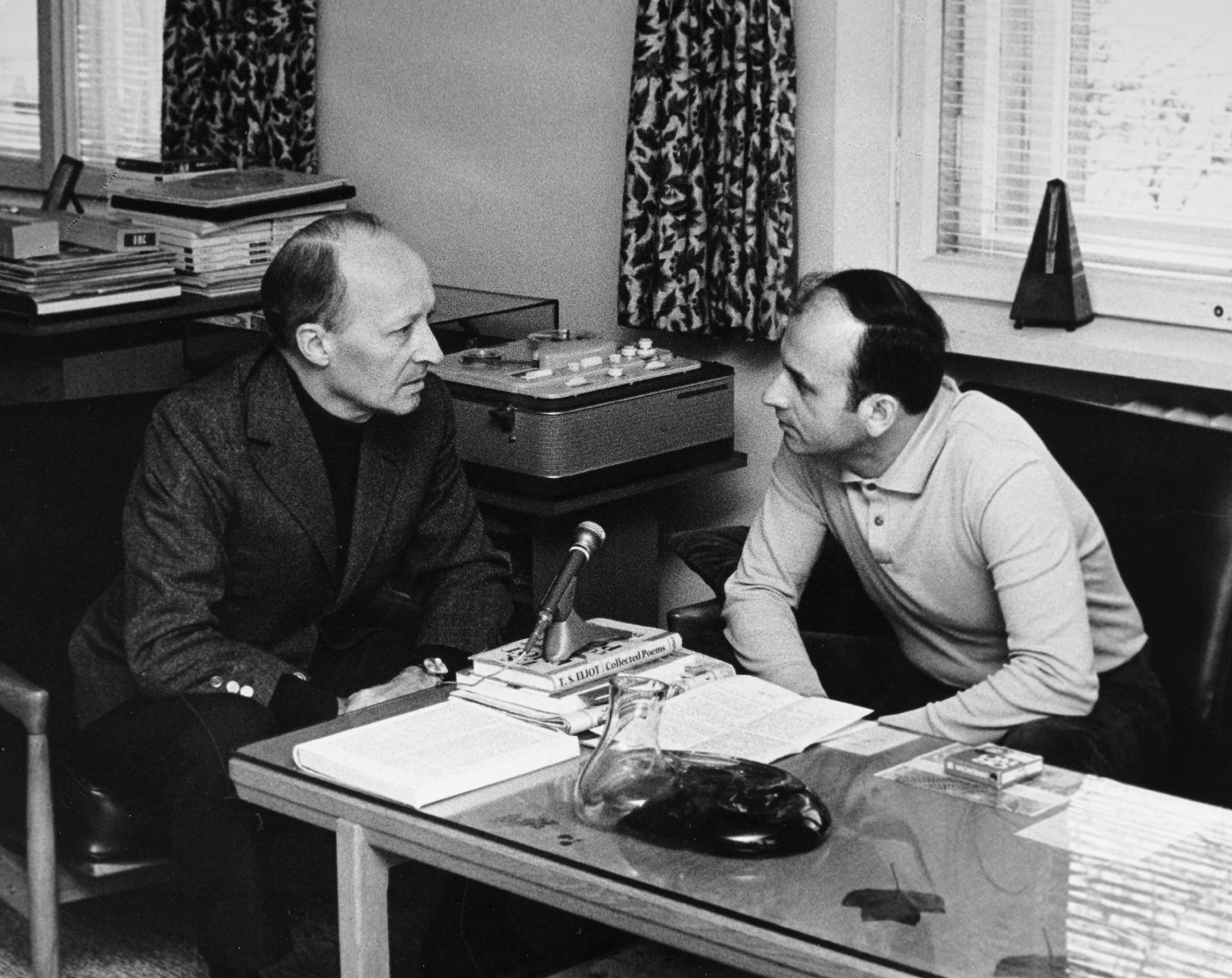

Witold Lutosławski during an interview conducted by Tadeusz Kaczyński, photo by Andrzej Zborski
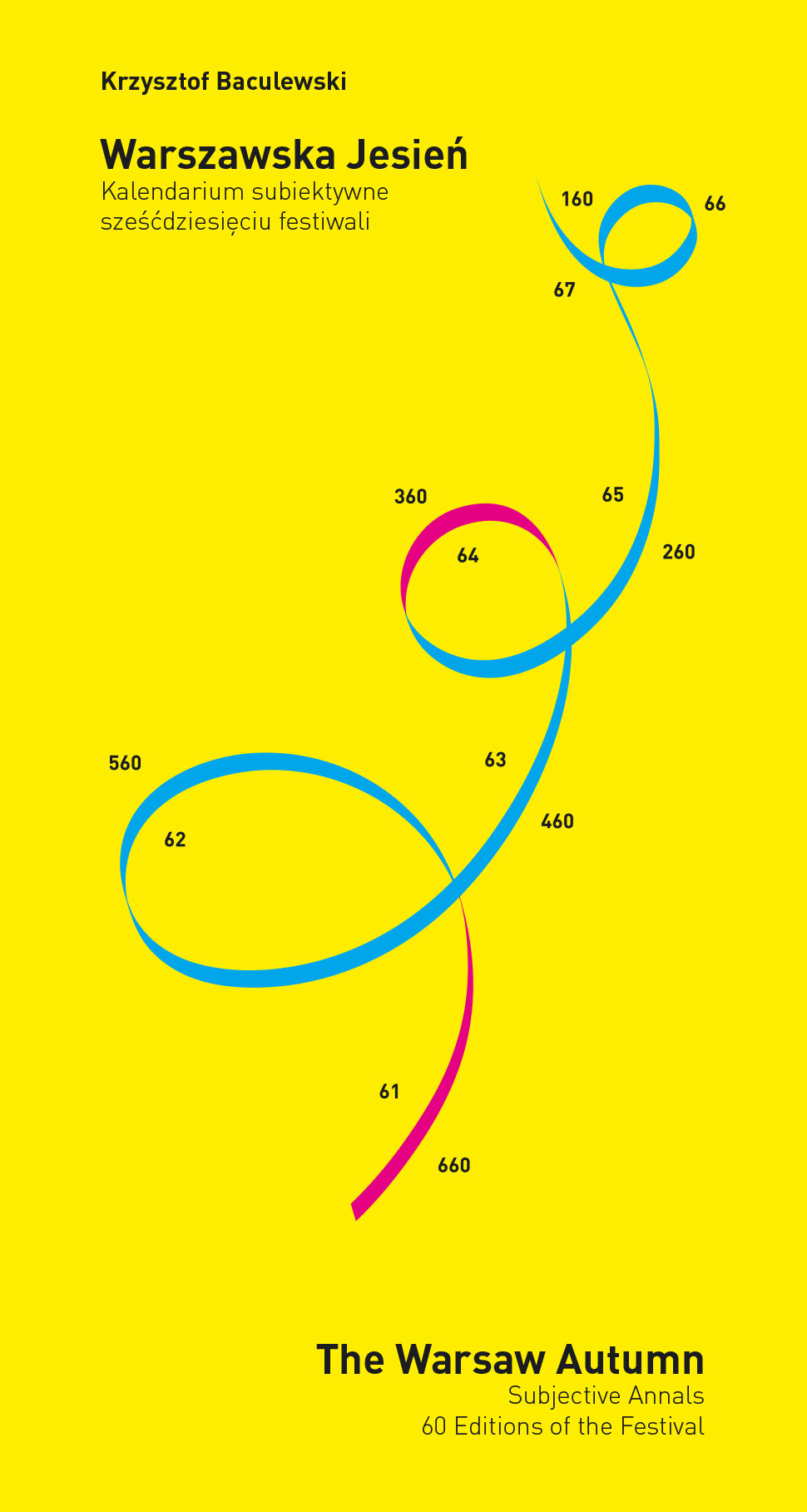

Krzysztof Baculewski "Subjective Annals 60 Editions of the Festival"
The most important event was the concert of the Radio Orchestra of the USSR, conducted by Gennady Rozhdestvensky, whose programme seems somewhat ambiguous. On the one hand, it featured Ozorne chastushky by Rodion Shchedrin, on the other - Symphony No. 2 in D Minor, Op. 40 by Sergei Prokofiev, a superb work, but of somewhat dubious political reputation in Prokofiev's homeland; for political balance we also have a cantata entitled Zdravitsa (Hail to Stalin) by the same composer, written to celebrate the sixtieth birthday of the USSR leader, and presumably for this reason regarded as a flagship piece of Soviet socialist realism.
What this programme demonstrates is the difference in the understanding of the concept of contemporary music between Warsaw and Moscow - even though a number of years had passed since the famous speech by Nikita Khrushchev and it might have seemed that normative aesthetics was a thing of the past... Well, it certainly was for the 'Warsaw Autumn'.
Bohdan Wodiczko, the director of Warsaw Opera, put on an opera-ballet spectacle which was a perfect re ection of the character of 'Warsaw Autumn' programmes in those days; it was made up of two ballets: The Red Coat by Luigi Nono, Orpheus by Igor Stravinsky combined with Luigi Dallapiccola's opera The Prisoner. The Festival programme also included the famous Trois Poèmes d'Henri Michaux by Witold Lutosławski, with the composer making his debut as a conductor, as well as Luciano Berio's Momenti, Pierre Boulez's Le Soleil des eaux, Olivier Messiaen's Cinq Rechants, Krzysztof Penderecki's Polymorphia and Iannis Xenakis' Orient-Occident . Tomasz Sikorski and Krystyna Moszumańska-Nazar made their appearances for the first time. Among the visiting foreign performers, we should mention the Swedish organist Karl-Erik Welin and the German oboist Lothar Faber.
For the first time the Association of Polish Artists Musicians (SPAM) presented its award, the 'Orpheus', for the best Polish artistic creation at the 'Warsaw Autumn'; it went to the dancer Stanisław Szymański for the title role in the ballet Orpheus by Stravinsky. The name of the award was probably borrowed from that work; in the following years, the objectives of the award were somewhat modified, and it began to reward the best performance of Polish music.
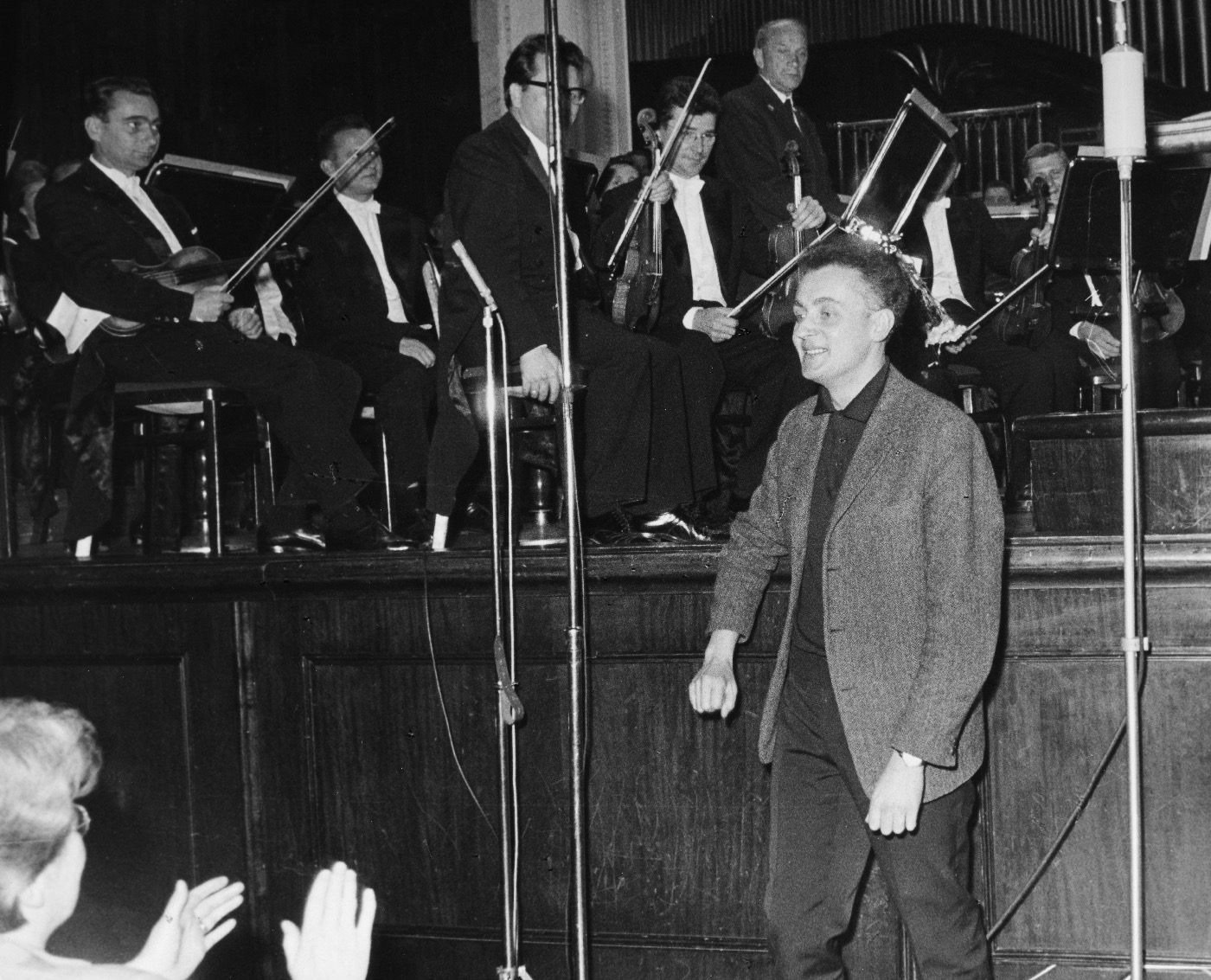

After the performance of Wojciech Kilar’s “Generique” by the State Silesian Philharmonic Symphony Orchestra under Karol Stryja at Warsaw Philharmonic. In the centre: Wojciech Kilar, photo by Andrzej Zborski
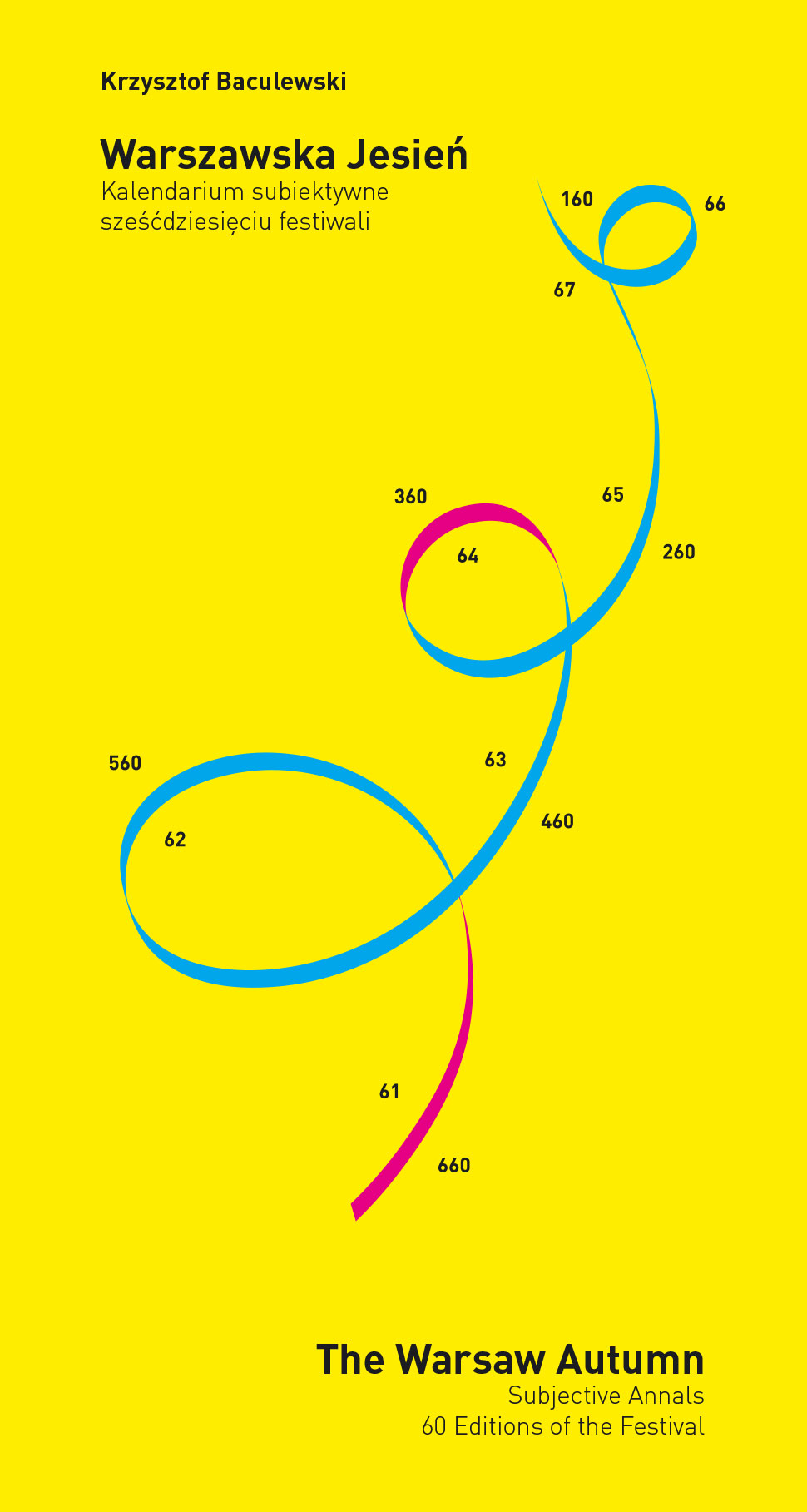

Krzysztof Baculewski "Subjective Annals 60 Editions of the Festival"
From today's perspective, perhaps the most important event seems to have been the visit of Merce Cunningham and Dance Company from New York, and their accompanying pianists David Tudor and John Cage. The programme also featured the Pittsburgh Symphony Orchestra, naturally with the Pittsburgh Symphony by Paul Hindemith, but also with ballet music by Aaron Copland, once a student of Nadia Boulanger. In order to maintain the necessary geographic-political balance, there was also a visit by Rudolf Barshai with his Chamber Orchestra of Moscow Philharmonic (presenting, among other things, a phenomenal orchestral version of Prokofiev's Visions fugitives), and for aesthetic balance-the avant-garde Ensemble Instrumental de Musique Contemporaine from Paris, directed by Constantin Simonovic, and Musica Viva Pragensis. Zbigniew Rudziński, Zbigniew Bujarski and Romuald Twardowski made their debuts. The programme includes Symphony Op. 21 by Anton Webern, Kreuzspiel by Karlheinz Stockhausen and Metastasis by Iannis Xenakis. The music of Morton Feldman, Charles Ives and Edison Denisov was heard for the first time at the 'Warsaw Autumn'. Krzysztof Penderecki presented his Stabat Mater, Włodzimierz Kotoński - Musica per fiati e timpani, Tadeusz Baird - Dialogues for oboe and orchestra, and Kazimierz Serocki - Symphonic Frescoes.
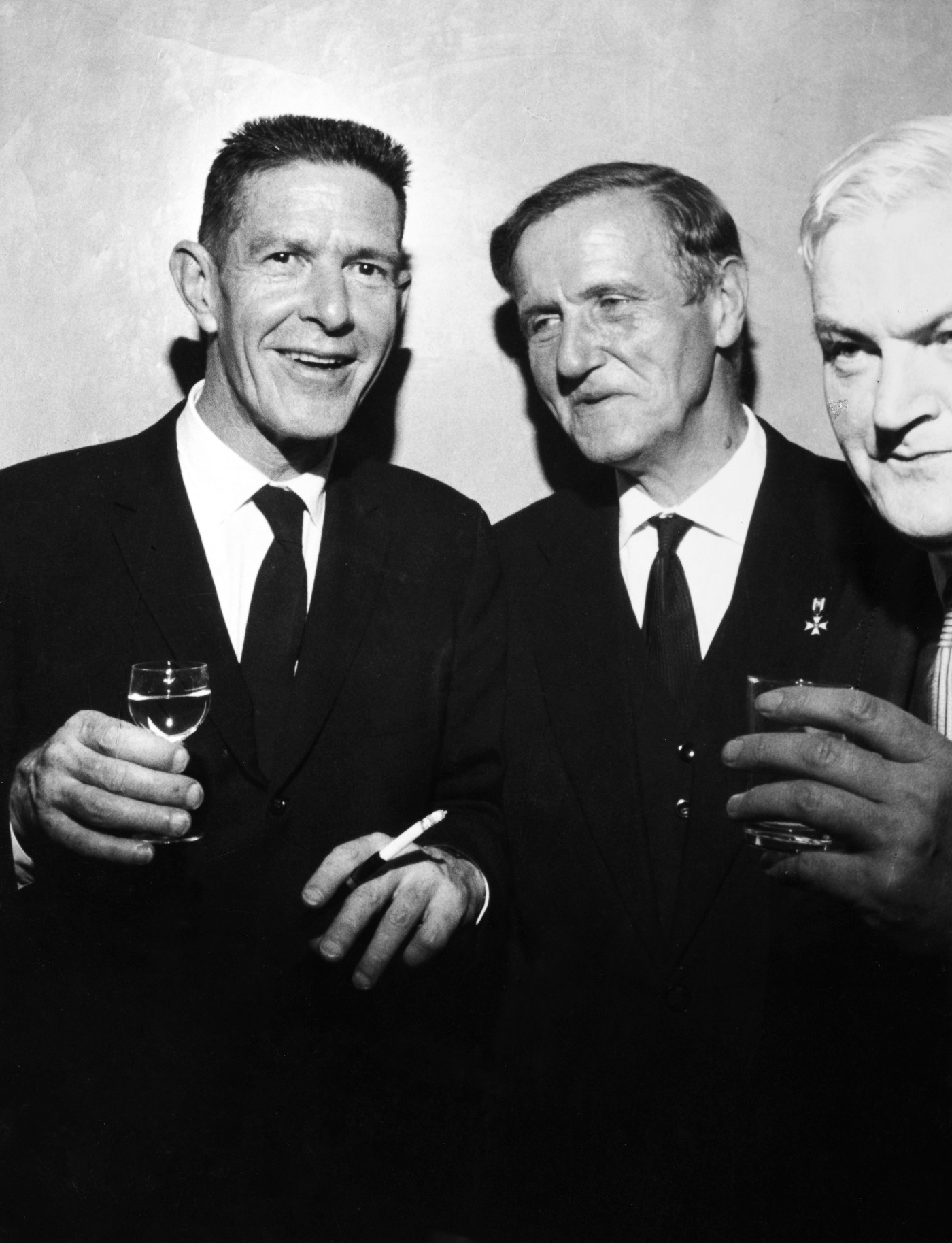

A reception at Warsaw Philharmonic, closing the Warsaw Autumn festival in 1964. John Cage, Stefan Śledziński, and Bolesław Szabelski, photo by Andrzej Zborski
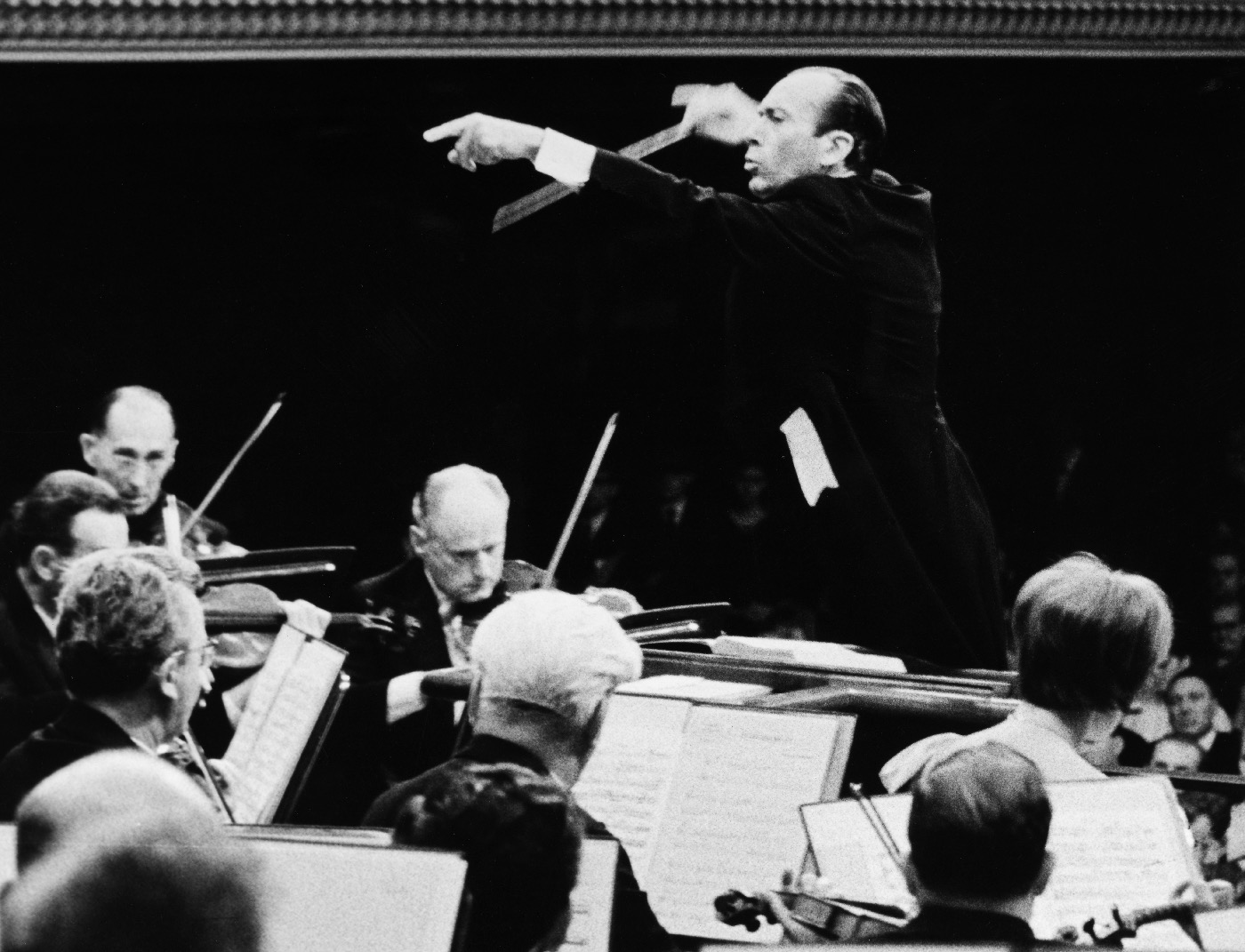

Jan Krenz conducts “3 Fragments” from the opera “Wozzeck” by Alban Berg at Warsaw Philharmonic, photo by Andrzej Zborski
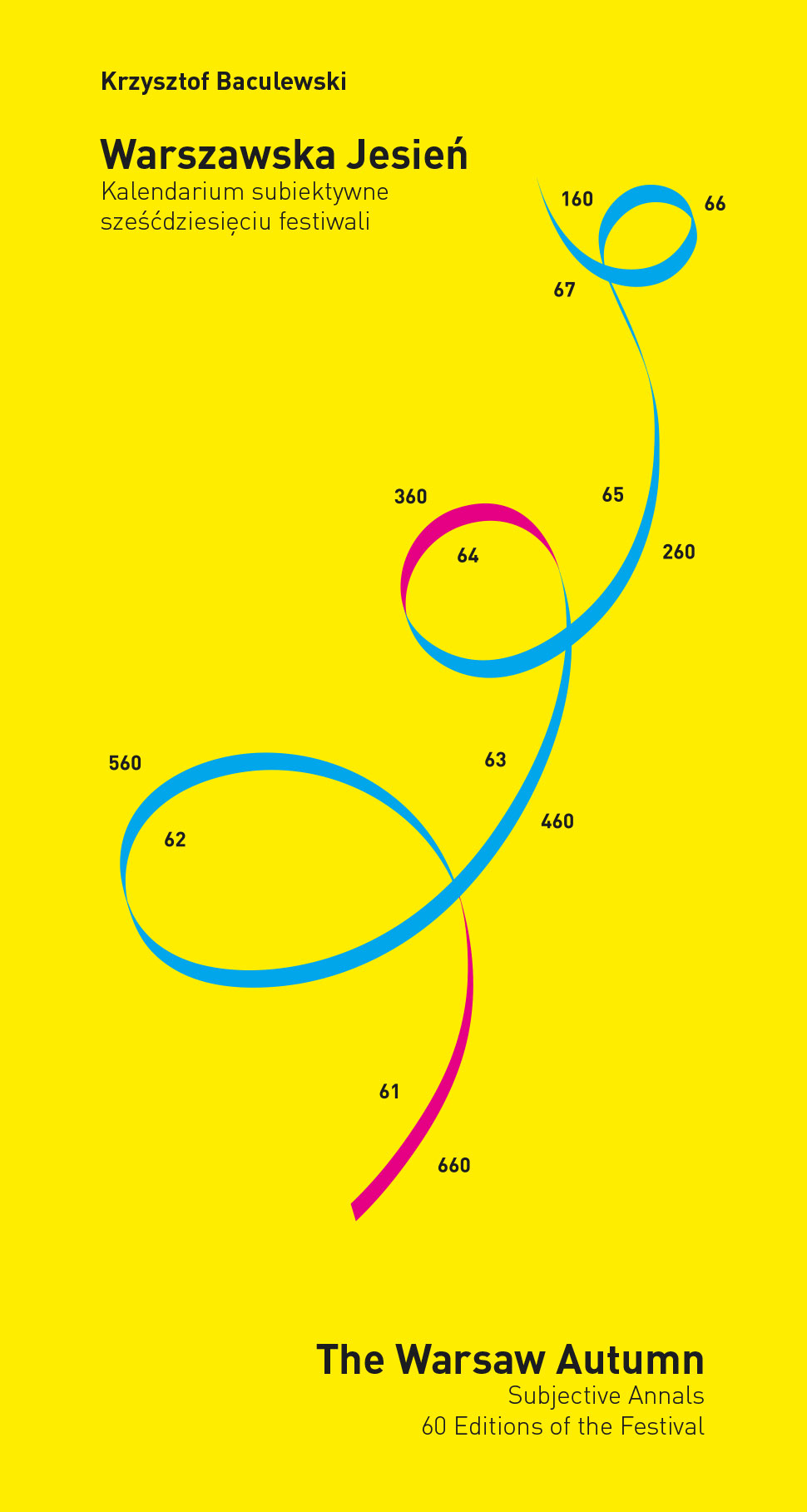

Krzysztof Baculewski "Subjective Annals 60 Editions of the Festival"
The 9th Festival (strangely scheduled between Tuesday 21st and Thursday 30th September) was more fortunate as far as prominent participants from the outside world were concerned. ese included the Orchestra of the City of Helsinki, who performed Apparitions by György Ligeti and Hexaèdre by Krystyna Moszumańska-Nazar - though three works by Sibelius were also included for balance. Other performers included the Orchestra of the City of Berlin with Kurt Sanderling, the Orchestra of Romanian Film Industry (sic!), the Brussels-based Musiques Nouvelles (Interestingly, Wieland Kuijken, now better known for his performances of early music, played the cello in this ensemble), LaSalle string quartet, the Groupe Instrumental à Percussion de Strasbourg and the Dancers' Workshop Company of San Francisco. Among guest performers were also conductor Ernest Bour, soprano Dorothy Dorow, and cellist Siegfried Palm. Significant works included: String Quartet by Witold Lutosławski, Répons by Henri Pousseur, Chronochromie by Olivier Messiaen, Les Sons by Witold Szalonek, and Epitaffio by Arne Nordheim. Debuts included Zygmunt Krauze and Krzysztof Meyer. This edition of the Festival also provided the occasion for the first appearance of music by Alfred Schnittke (Music for Piano and Chamber Orchestra). And, finally, it was the first 'Warsaw Autumn' to be directly observed by the present author.
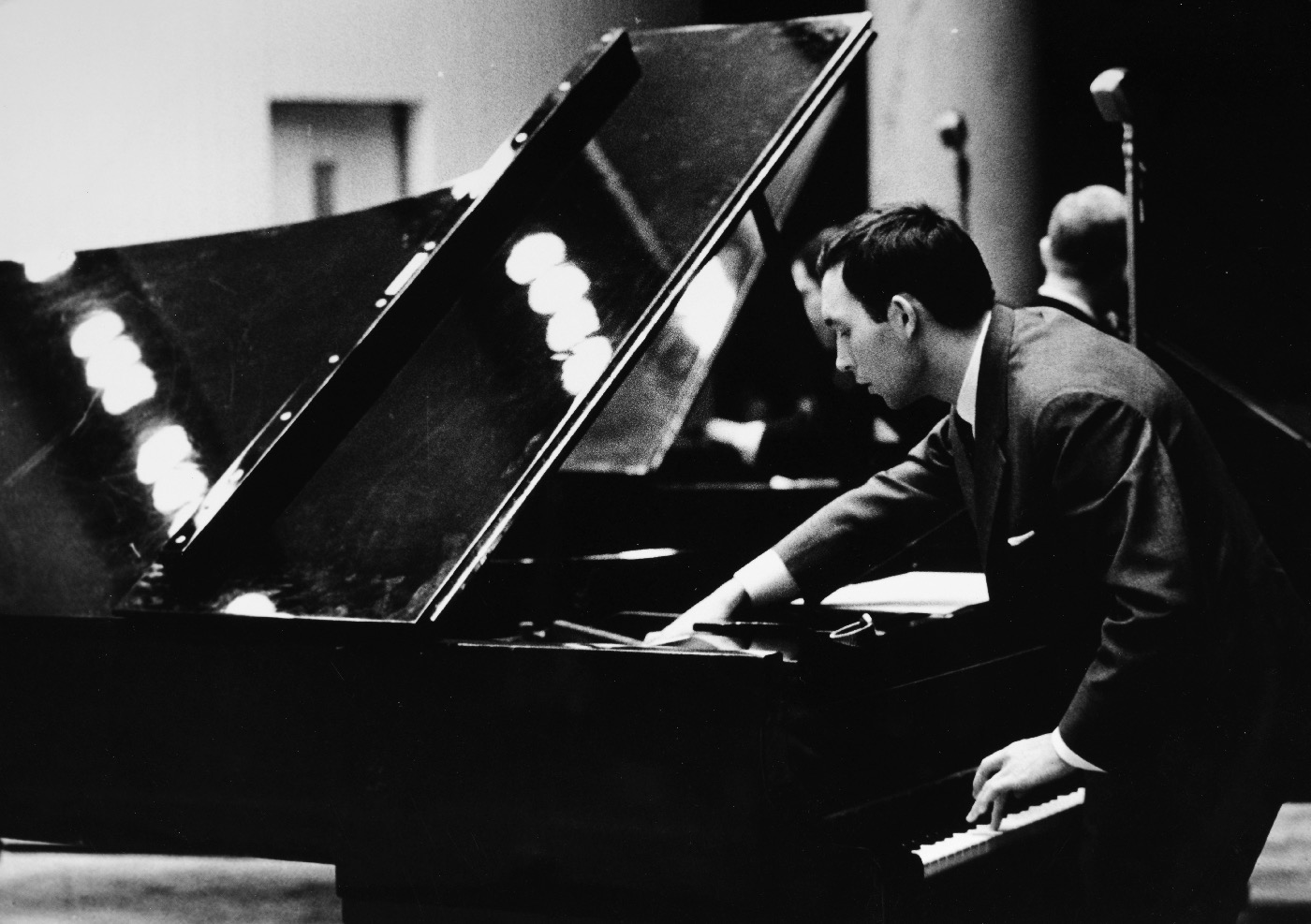

Zygmunt Krauze during a concert in the Warsaw Philharmonic Chamber Music Hall, photo by Andrzej Zborski
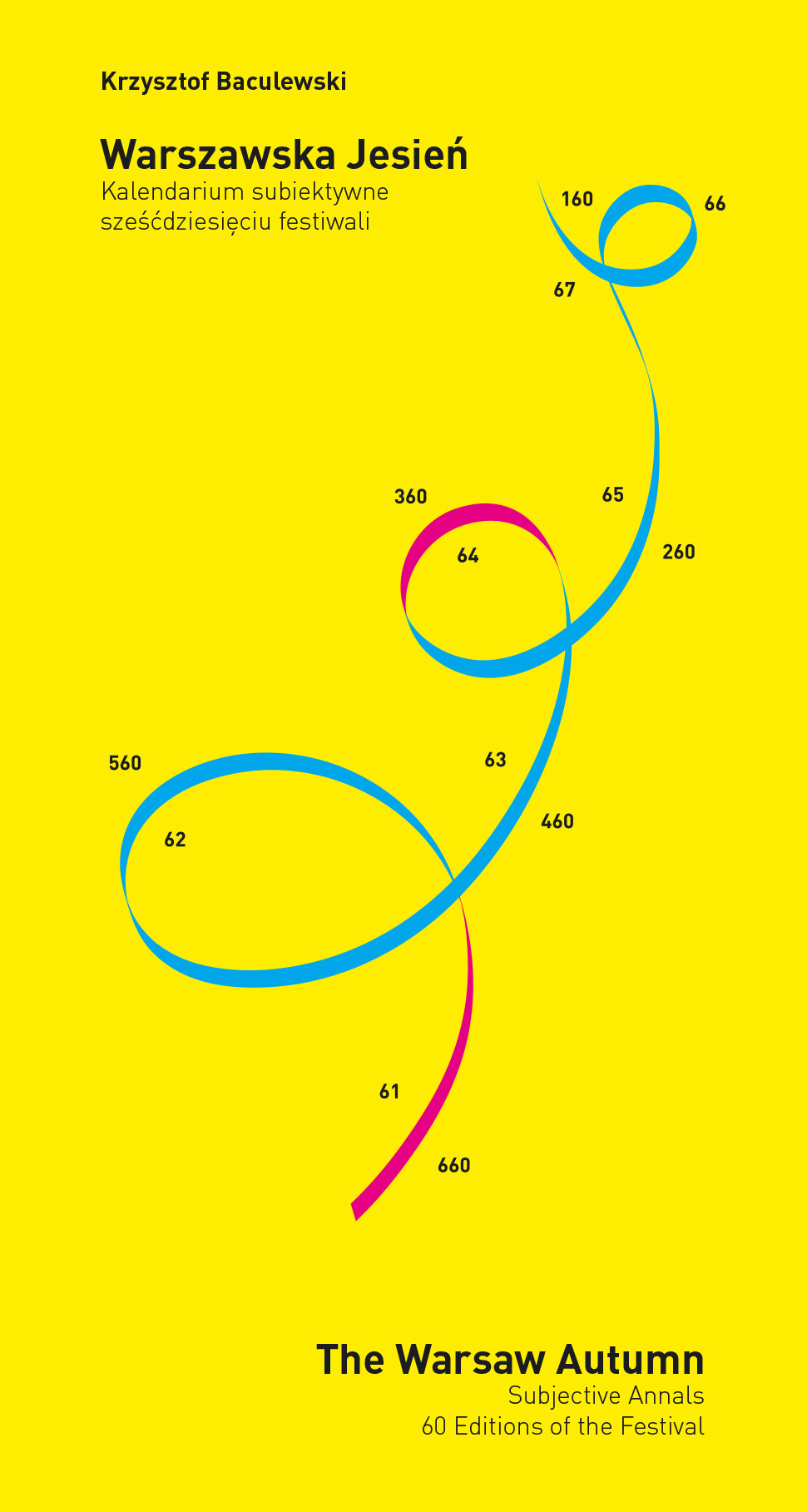

Krzysztof Baculewski "Subjective Annals 60 Editions of the Festival"
The first 'Warsaw Autumn' jubilee - its tenth anniversary. To celebrate this occasion, a set of 30 photographs from various Festival events was printed at the end of the programme book. Arthur Rubinstein played the solo part in Szymanowski's Symphonie concertante No. 4, Op. 60 at the opening concert, and later in the programme there came Jutro (Tomorrow), an opera by Tadeusz Baird, Le marteau sans maître by Pierre Boulez, Music for Magnetic Tape and Oboe Solo by Andrzej Dobrowolski, Sun of the Incas by Edison Denisov, a performance by the Swedish Kulturkvartetten, two concerts of the RAI Symphony Orchestra from Turin, including the Turandot suite by Ferruccio Busoni (a concession to the conductor, Mario Rossi ), the Contemporary Chamber Players from the University of Illinois, and others. But the main events - at least for the present writer, who from that year on attended nearly every 'Warsaw Autumn' concert for over a quarter of a century - were the performance of the St Luke Passion by Krzysztof Penderecki, and the première of Refrain by Henryk Mikołaj Górecki at the final concert. This Festival also saw the beginning of the night concert tradition; the performances started at 10 p.m., initially in the Concert Hall of the State Higher School of Music, then also at other venues. The chairman of the Repertoire Committee was Kazimierz Serocki.
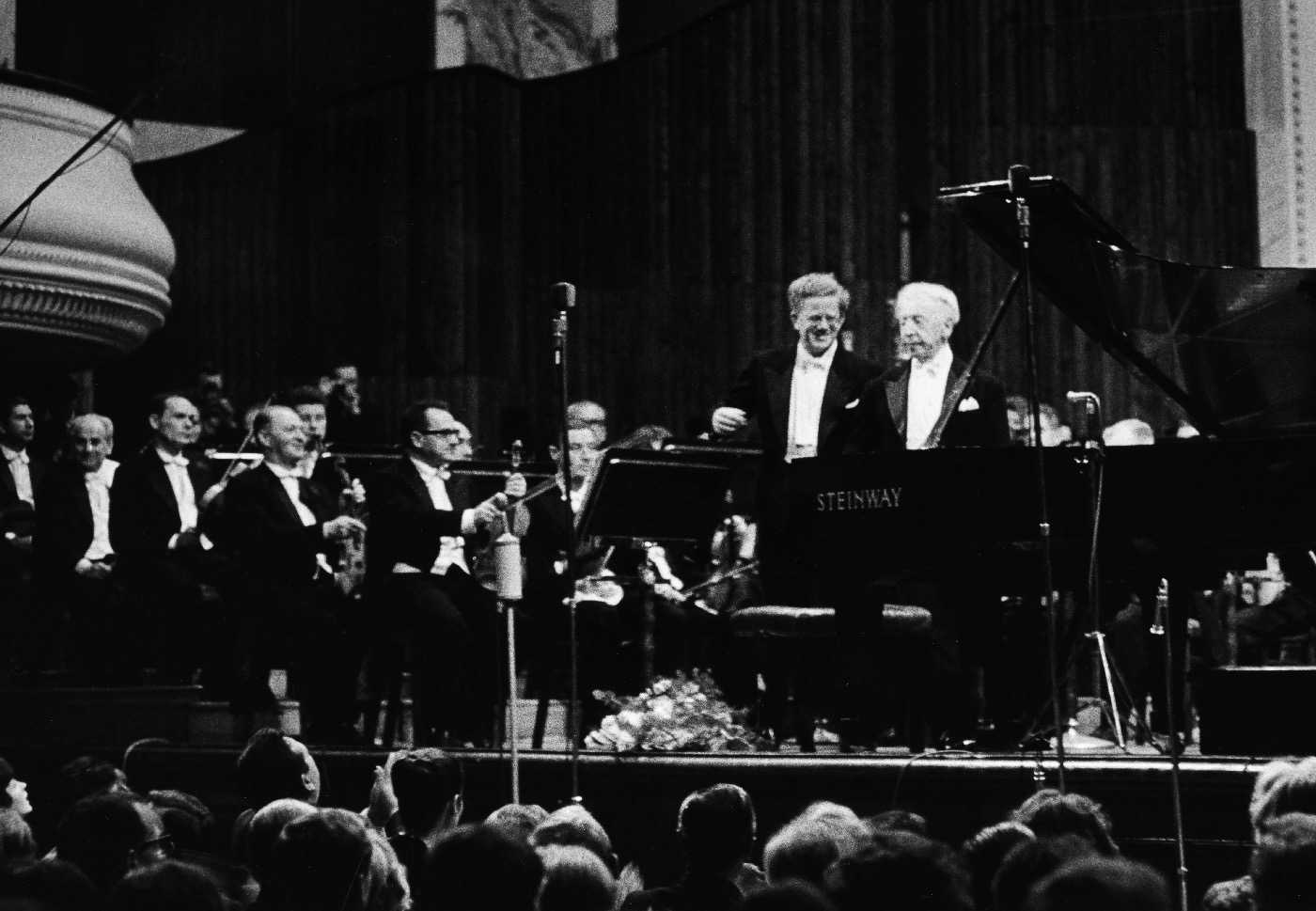

Arthur Rubinstein at Warsaw Philharmonic at the inaugural concert of the 1966 Warsaw Autumn. A performance of Karol Szymanowski’s “Symphony No. 4 ‘Symphonie concertante’”, cond. Stanisław Wisłocki, photo by Andrzej Zborski
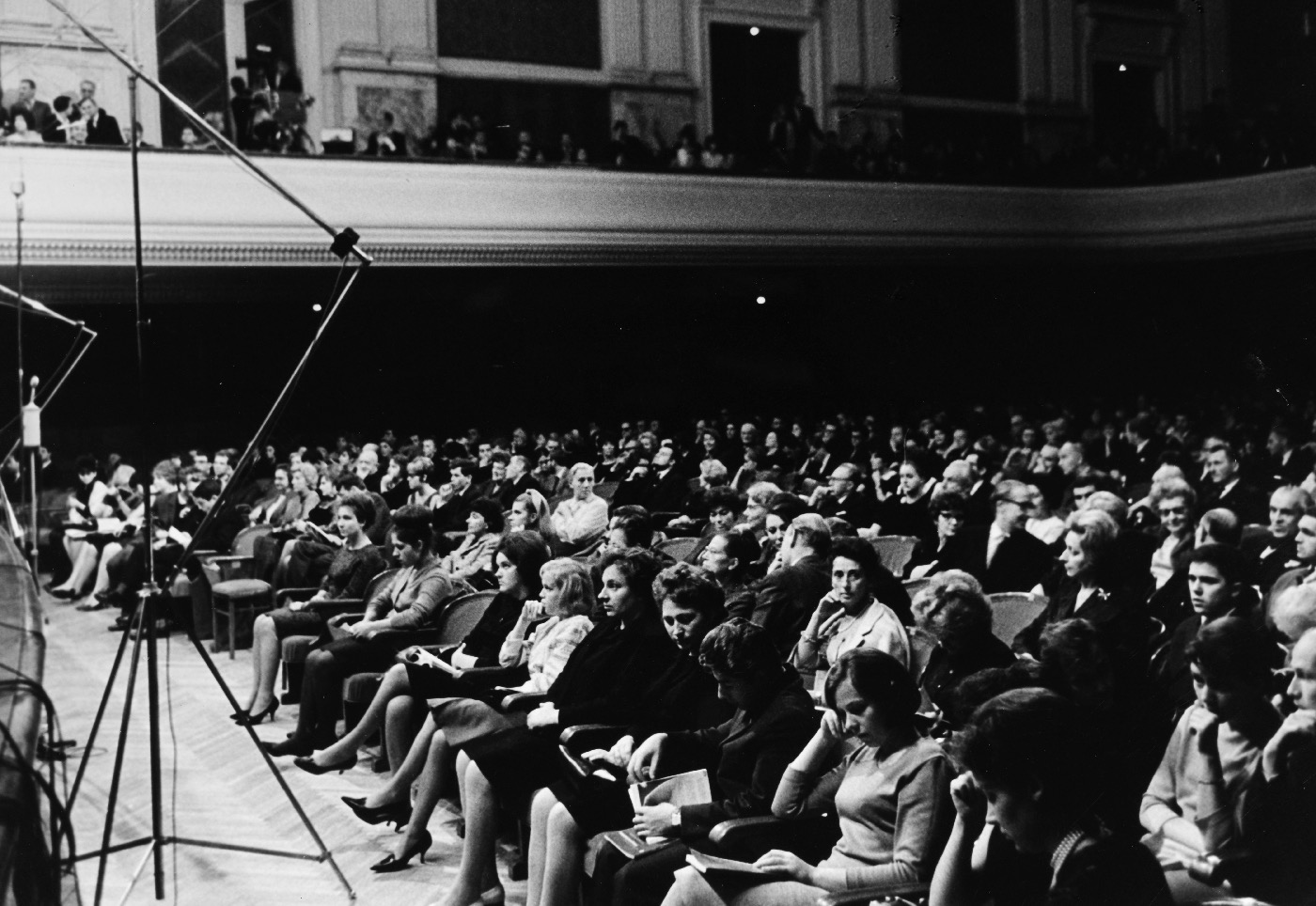

The Warsaw Autumn audience in the Warsaw Philharmonic Concert Hall, photo by Andrzej Zborski
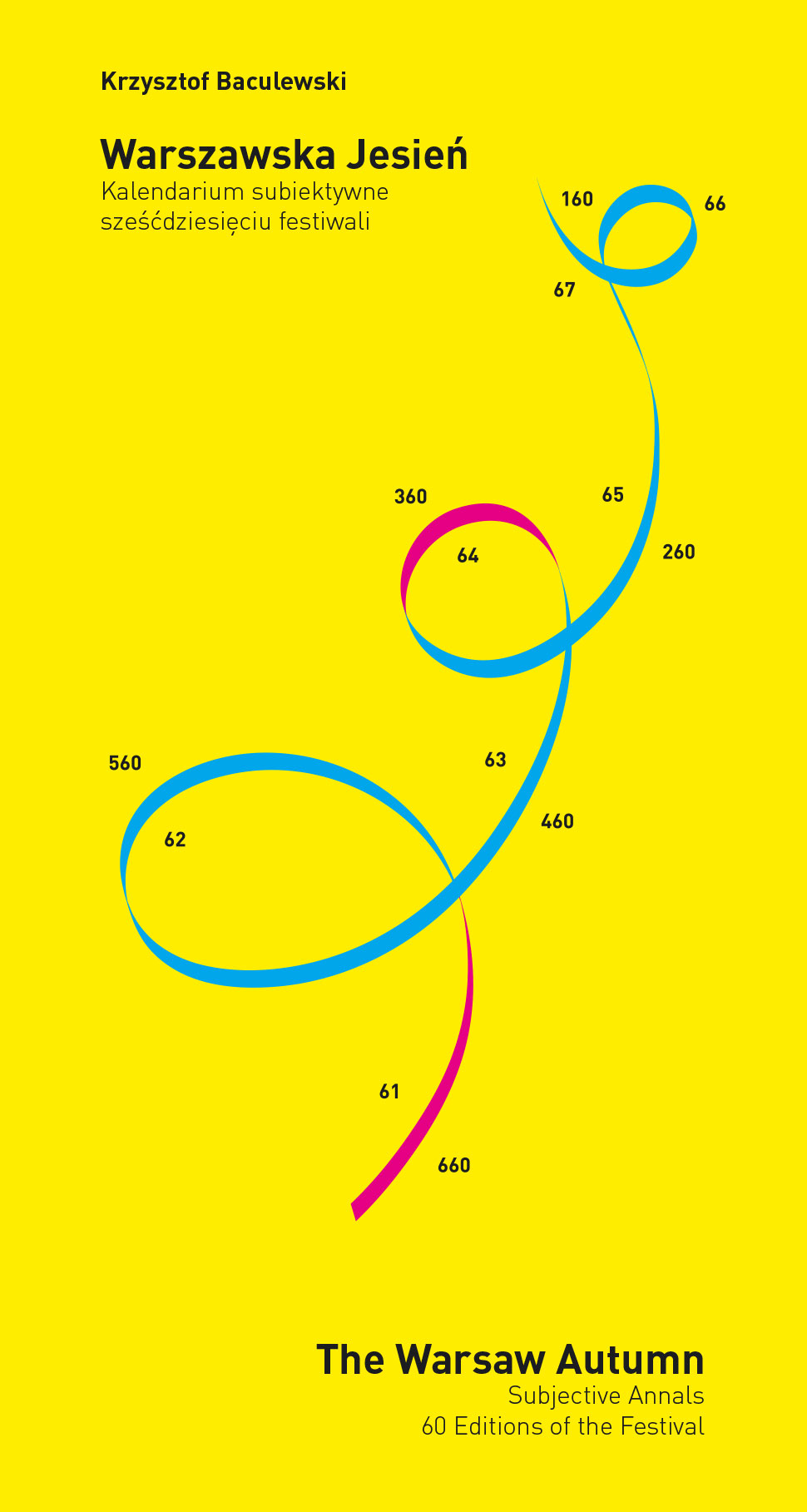

Krzysztof Baculewski "Subjective Annals 60 Editions of the Festival"
The programme featured the classics of contemporary music - that recent one, which came after neo-Classicism, socialist realism etc.: Symphonie pour un homme seul by Pierre Henry and Pierre Schaeffer, Espaces inhabitables by François Bayle, Wozzeck by Alban Berg, Réveil des oiseaux by Olivier Messiaen (with Jeanne Loriod playing real ondes Martenot; in Joan d'Arc at the Stake by Arthur Honegger that instrument, in the absence of a genuine one, was replaced in Poland by... a Hammond organ), and Edgar Varèse's Equatorial. Major events: Symphony No. 2 by Witold Lutosławski, spatial music Terrêtektorh by Iannis Xenakis, in which the orchestra was placed among the audience, and Echoi by Lukas Foss. Bernadetta Matuszczak made her debut. Prominent performers: Orchestre Philharmonique de l'ORTF in three (!) programmes conducted by Charles Bruck and Andrzej Markowski, and mezzo-soprano Anna Malewicz-Madey. Rather modest Perhaps, but we did not notice it at the time. The 'Warsaw Autumn' was still a celebration in which one wanted to take part. The chair of the Repertoire Committee was occupied by Andrzej Dobrowolski.
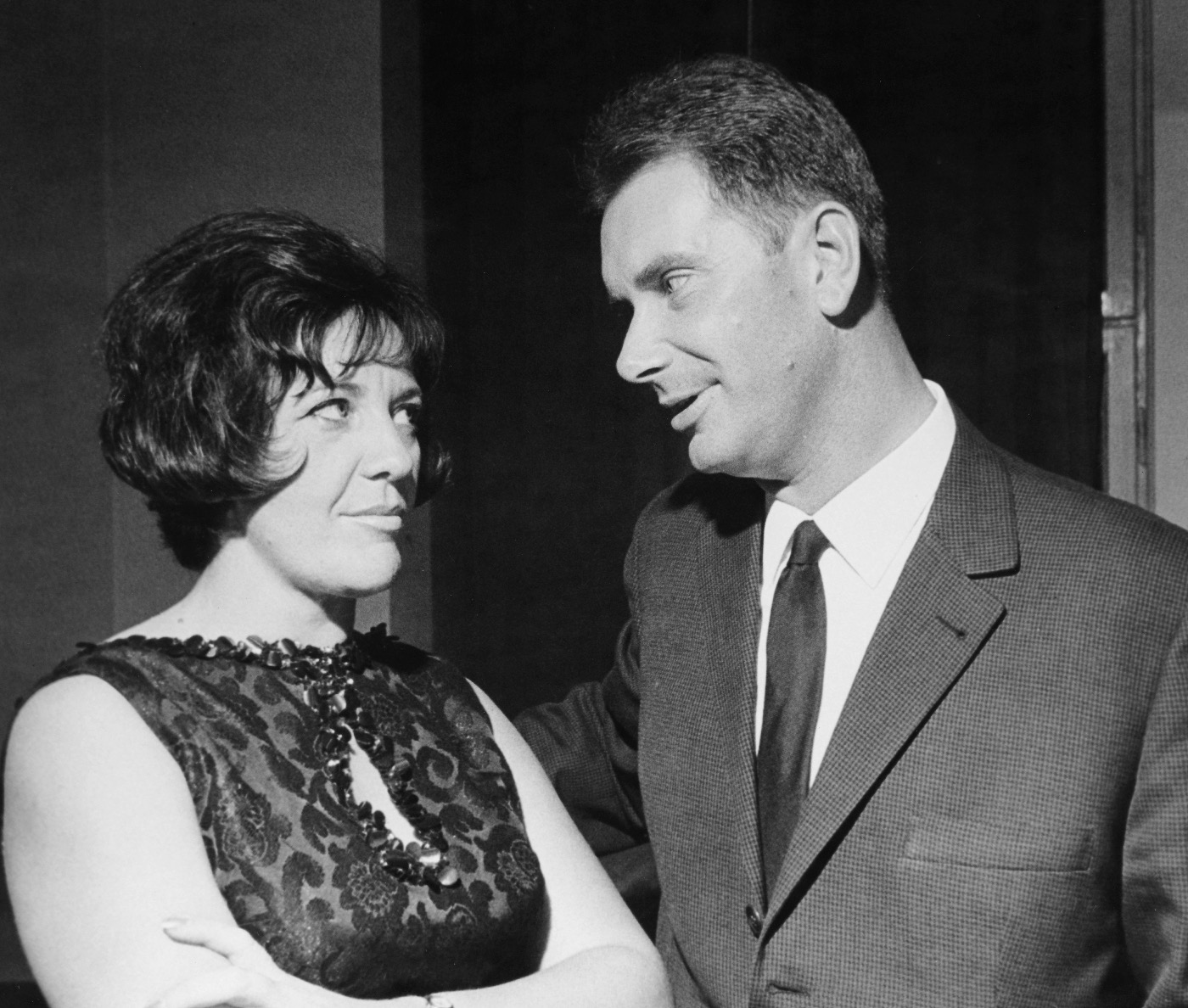

Krystyna Szostek-Radkowa and Tadeusz Baird after the performance of “4 Songs” for mezzo-soprano and chamber orchestra at Warsaw Philharmonic, photo by Andrzej Zborski
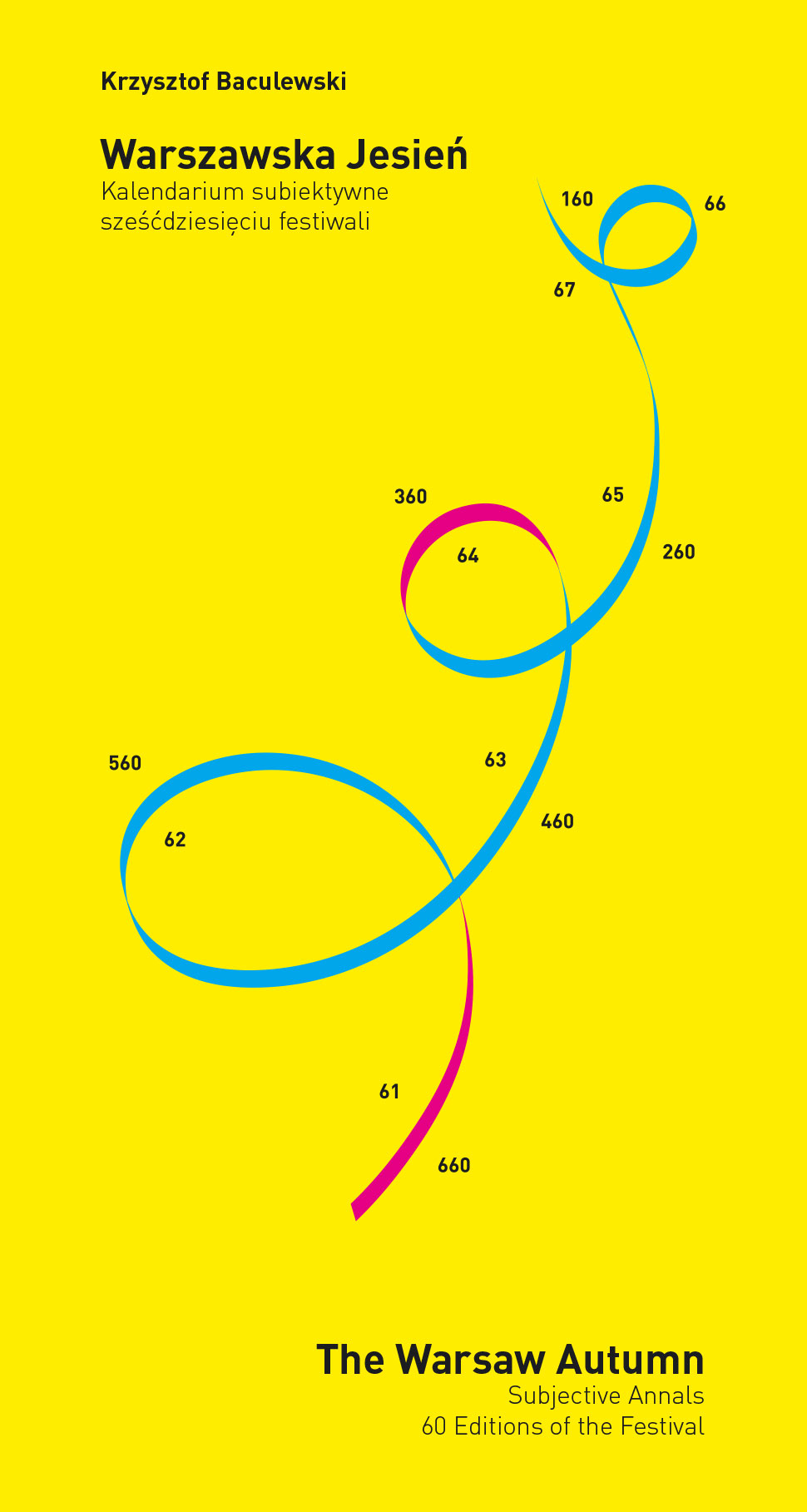

Krzysztof Baculewski "Subjective Annals 60 Editions of the Festival"
The unfortunate 12th 'Warsaw Autumn' was combined with the 42nd World Music Days, organised under the auspices of the ISCM (International Society for Contemporary Music). At that time, the function of the Polish section of ISCM was ful lled by the Polish Composers' Union. The PTMW (Polish Society for Contemporary Music), though older than the PCU (formed in 1924), had suspended its activities after the Łagów conference (the official acceptance of socialist realism) in 1949, and was formally dissolved as late as in 1960 (!); it was reactivated and became independent of the PCU in 1979.
It was a year of political unrest in Europe: the March events in Poland, May protests in Paris, then in August - the intervention in Czechoslovakia by the Soviet and Warsaw Pact armies. The latter invasion caused global protests. Many performers and composers refuse to attend the 'Warsaw Autumn', and to visit a state which took part in the suppression of democracy in a neighbouring country. Only a few foreign artists decide to ignore the boycott, among them oboist Lothar Faber, conductor Mario di Bonaventura and mezzosoprano Josephine Nendick. Works of importance for contemporary music performed at that Festival include: Requiem by György Ligeti, Quattro monologhi for solo oboe by Witold Szalonek, Symphony for Tape by Bogusław Schaeffer, Iris by Per Nørgård, Five Songs to Words by Halina Poświatowska by Tadeusz Baird and Symphony No. 5 by Bolesław Szabelski.
The programme book printed for the first time the names of the members of the Repertoire Committee, then chaired by Włodzimierz Kotoński (until 1969).
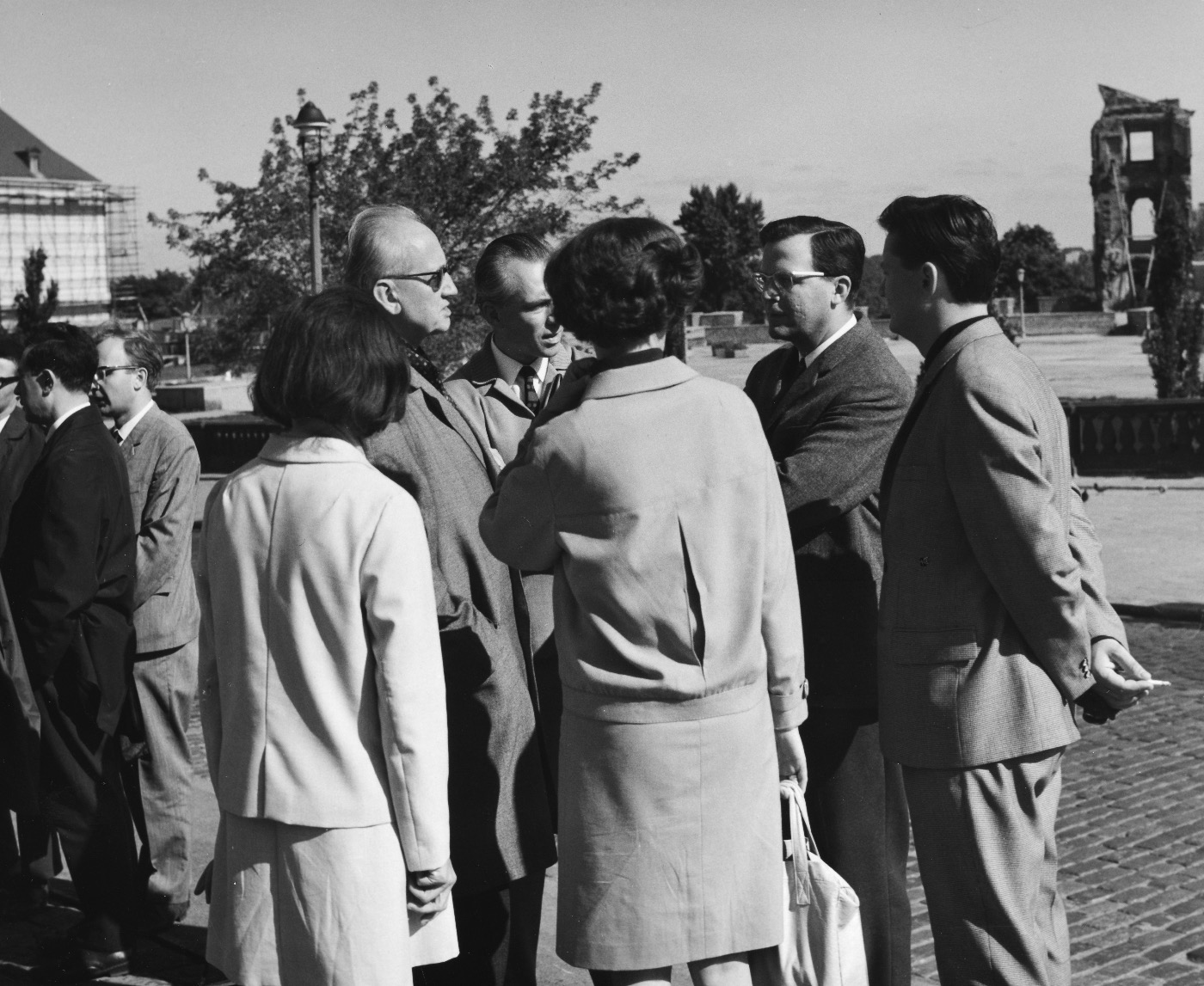

Waiting for the coach to take them to Żelazowa Wola – a group from Western Germany. In the background – the ruins of the Royal Castle in Warsaw (before its reconstruction), photo by Andrzej Zborski
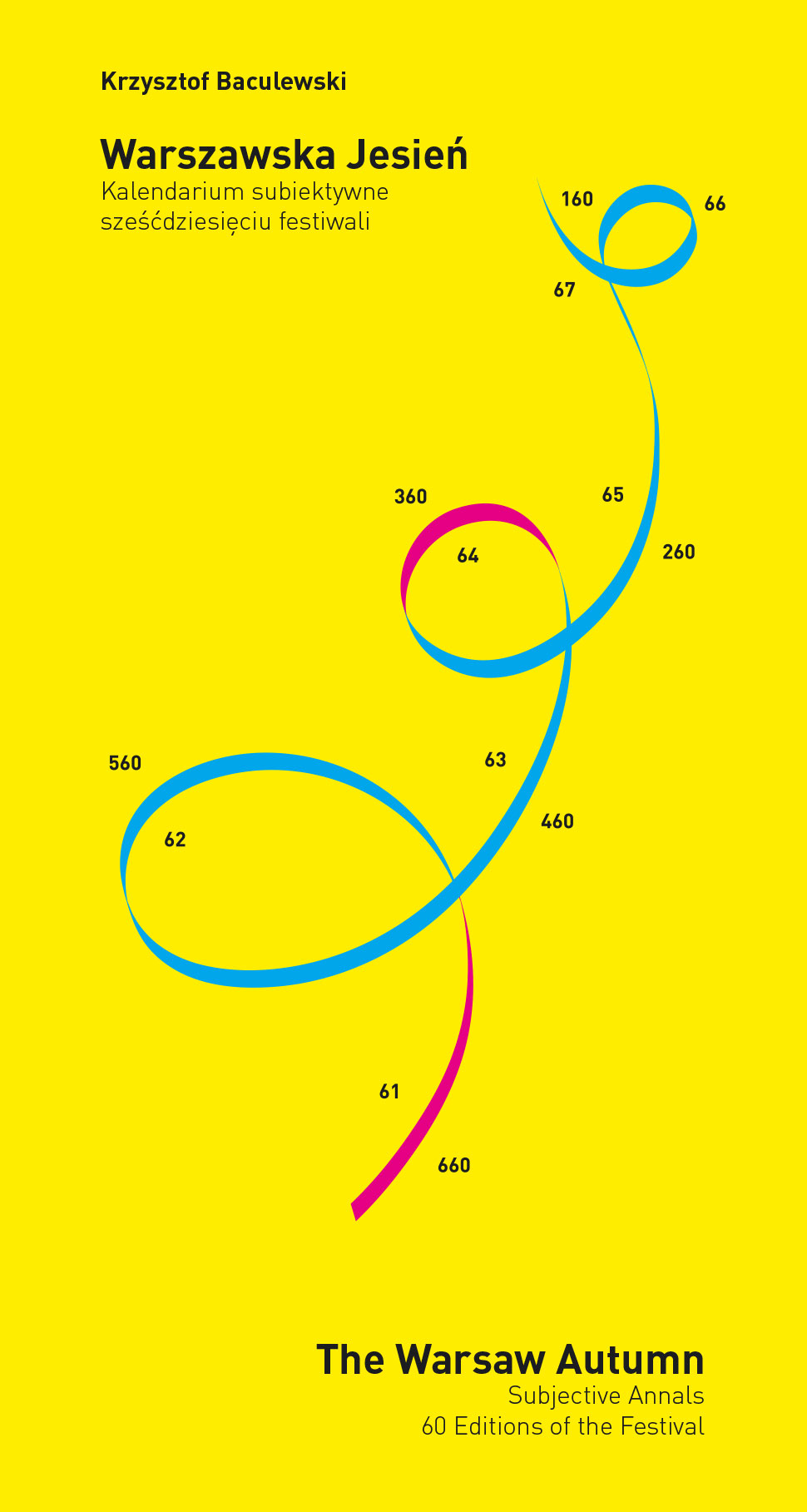

Krzysztof Baculewski "Subjective Annals 60 Editions of the Festival"
The 13th 'Warsaw Autumn' opened with a series of important Polish compositions: a work repeated in full as an encore (the first such event at this Festival in the present writer's memory) - Livre pour orchestre by Witold Lutosławski; then also Symphony No. 3 by Tadeusz Baird and Music for 16 Cymbals and Strings by Włodzimierz Kotoński. This 'Warsaw Autumn' edition also ended with important works: Parades by Zbigniew Bargielski and Gilgamesh by Augustyn Bloch. Between the opening and closing concert, we witnessed a number of significant music events. The situation had normalised, and the Festival was again attended by quite a few participants from abroad. ese included Balletéâtre Contemporain from Amiens, The Pierrot Players from London, Grupo Alea from Madrid, Società Cameralistica Italiana from Florence, and Dresdner Philharmonie under the baton of Kurt Masur - at that time considered as a third-rate conductor. The repertoire included works by Harrison Birtwistle, Peter Maxwell Davies, Vinko Globokar, the première of Muzyka staropolska (Old Polish Music) by Henryk Mikołaj Górecki, Apostrophes to words by Salvatore Quasimodo, composed by Jan Fotek (his 'Warsaw Autumn' debut), and Solitaire, produced by Arne Nordheim in the Polish Radio Experimental Studio, which turned out to be one of the most interesting works ever composed in this genre. John Ogdon performed the whole cycle of Olivier Messiaen's Vingt regards sur l'Enfant Jésus. John Tavener's 'Warsaw Autumn' debut also drew a lot of attention; his cantata The Whale created quite a sensation, perhaps more because of its subject than the music itself. It told (in Latin) the story of Jonah, preceded by an encyclopaedic introduction (in Polish, read by the popular TV announcer Jan Suzin) on the subject of whales and their biological situation in the modern world; original sounds produced by whales were played back from tape.
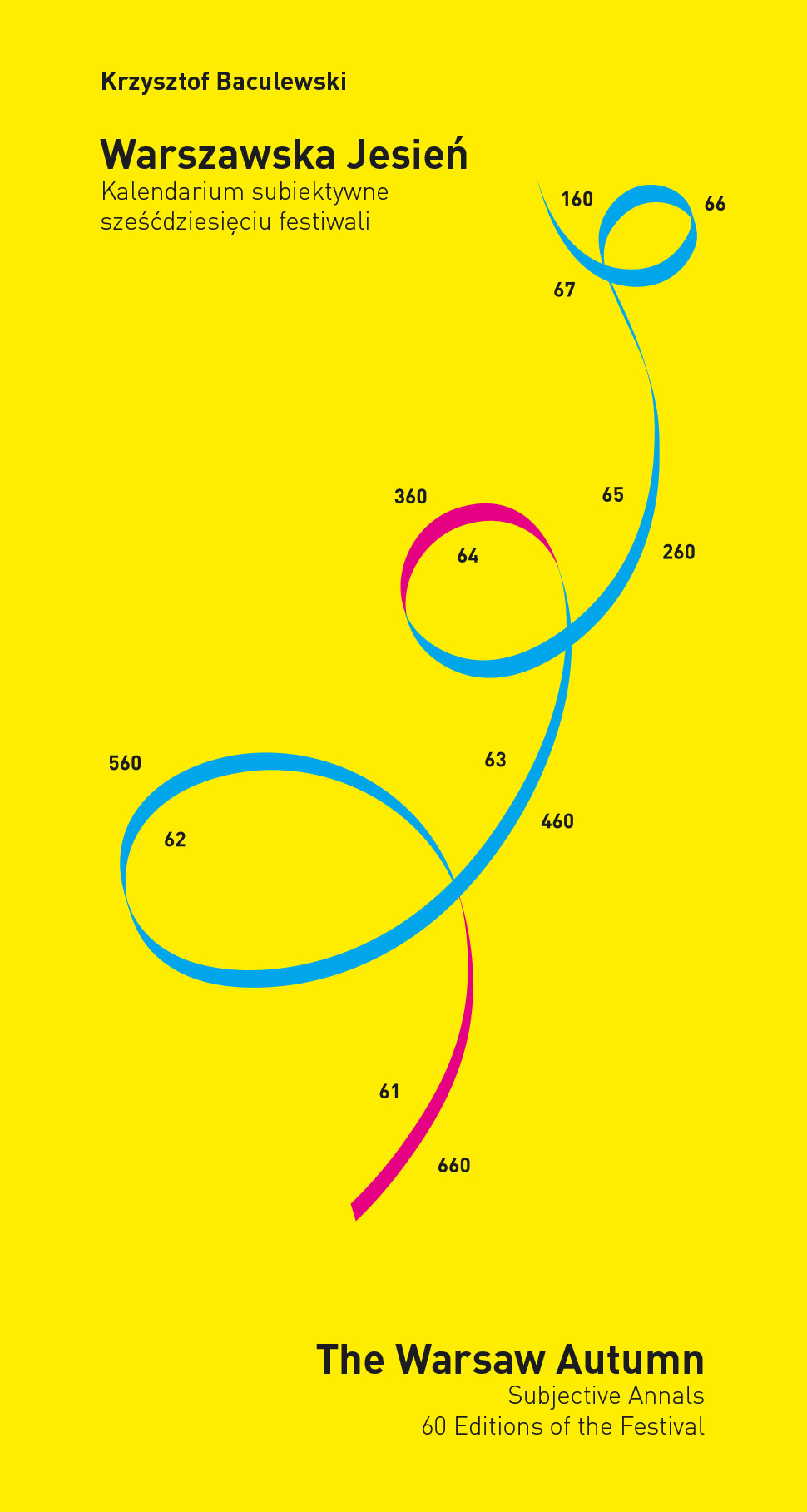

Krzysztof Baculewski "Subjective Annals 60 Editions of the Festival"
The poster, programme book and 'Warsaw Autumn Sound Chronicle' record sleeves, which from the 5th Festival had used the same graphic design, in 1970 received exceptionally attractive artwork (by Hubert Hilscher). Among guests from abroad there were: the Chamber Orchestra of Amsterdam Conservatory, the Grand Symphony Orchestra of Moscow Radio and Television conducted by Gennady Rozhdestvensky, the Symphony Orchestra of the Czech Radio from Prague, Kölner Rundfunk-SinfonieOrchester under Michael Gielen, Gruppe MHz from Wuppertal, as well as a large representation of Swedes from Stockholm: Royal Stockholm Philharmonic Wind Quintet, Kulturkvartetten and the Bel Canto choir. Noteworthy works included: Piece for Orchestra No. 1 by Zygmunt Krauze, Tre studi secondo Giotto by Romuald Twardowski, Aela by Włodzimierz Kotoński, Mixtur by Karlheinz Stockhausen, Forte the piano by Kazimierz Serocki, Cello Concerto by György Ligeti, and Four novelettes by Tadeusz Baird.
This 'Warsaw Autumn' is remembered by many for one of the most famous Festival scandals, which broke in the concert hall of the State Higher School of Music toward the end of a night concert by 'Music Workshop'. The audience was invited to participate in the performance of the aleatory piece The Great Digest (Paragraph 7) by Cornelius Cardew. The performance turned into a unique happening, which got out of the organisers' control, partly because a group of conservatory students took the performance guidelines extremely seriously, unduly prolonging the whole performance and causing the audience to become increasingly impatient: people were laughing, talking, walking around, and a large group invaded the stage in search of entertainment. To cap it all, one of the students (nomen est odiosum) began to play Chopin on the concert piano. The School's authorities later claimed that they interrupted the concert (by emitting sounds of high frequency and intensity from a generator into the concert hall), because of the risk of the excited youth setting re to the piles of sticks arranged on the stage, ready for the performance of the next composition, Sticks by Christian Wolff. However - unless my memory fails me - in spite of this work being listed as performed in the Festival index, the concert ended before Wolff's piece could be presented, and the only sticks that evening were those lying on the floor. Paradoxically, it was the censor who unwittingly contributed to this fracas by approving the publication of performance guidelines (with a Chinese text ascribed to Confucius in Ezra Pound's translation) for the singing, walking and/or humming audience... The Repertoire Committee was chaired again by Andrzej Dobrowolski (until 1972).
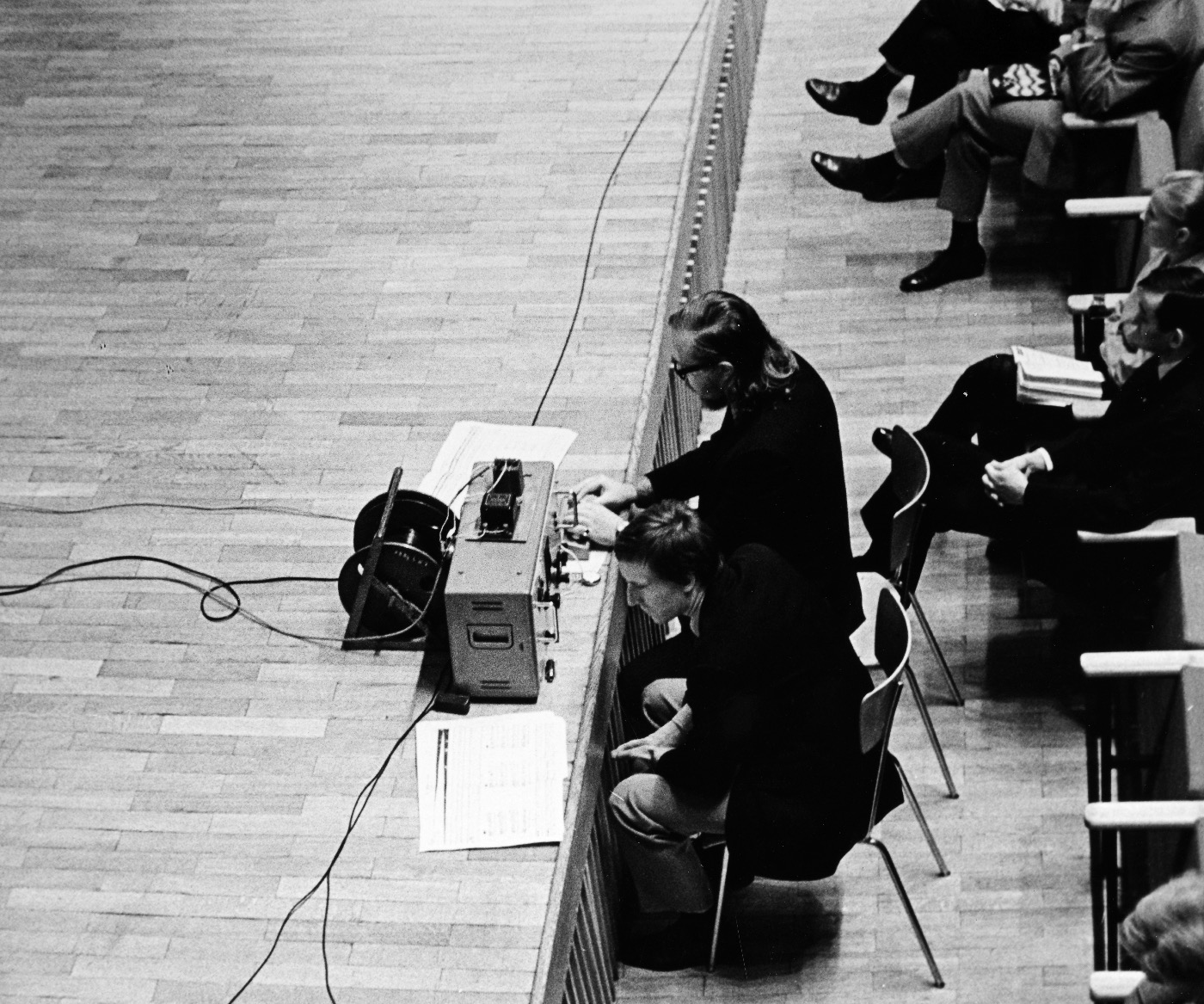

Tomasz Sikorski and Tim Souster at the State Higher School of Music in Warsaw (now the F. Chopin University of Music) as sound engineers in Tim Souster’s “Titus Groan Music”, photo by Andrzej Zborski
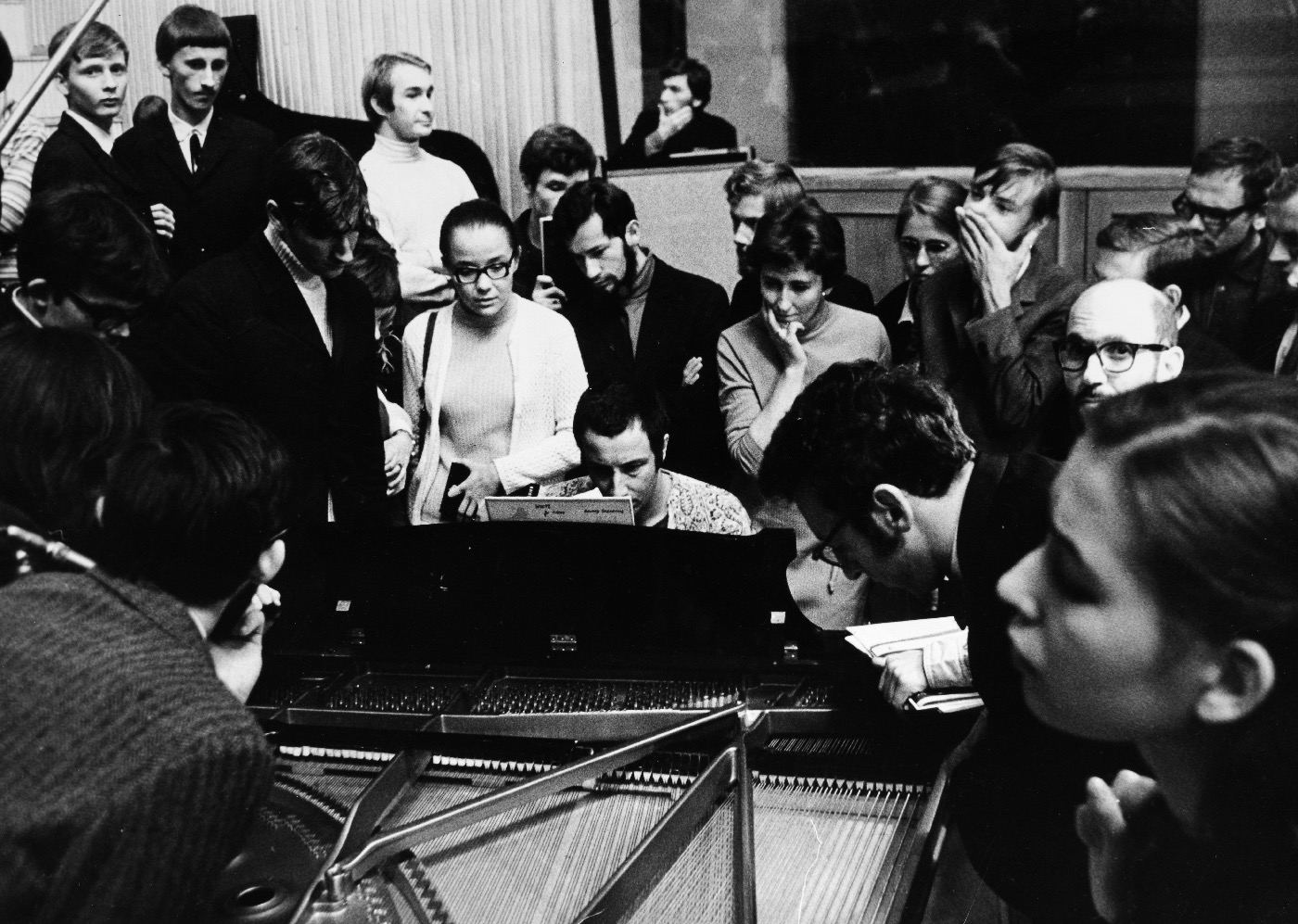

John Tilbury with Warsztat Muzyczny / Music Workshop ensemble; a performance held in the interval of a concert at the State Higher School of Music in Warsaw (now the F. Chopin University of Music), photo by Andrzej Zborski
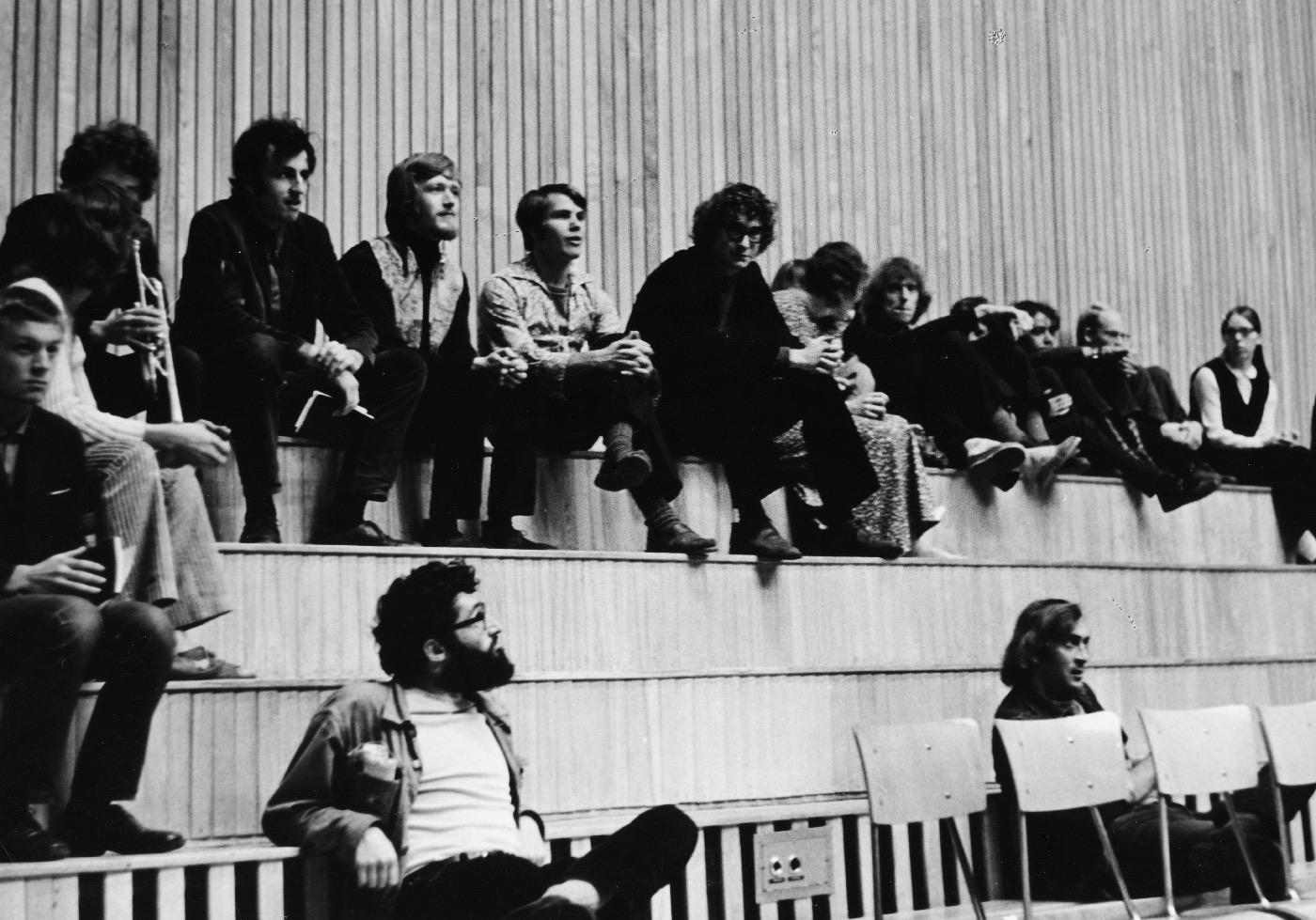

The audience of a concert by the Amsterdam Studenten Kamerorkestr conducted by Jan Vriend at the State Higher School of Music in Warsaw (now the F. Chopin University of Music), photo by Andrzej Zborski
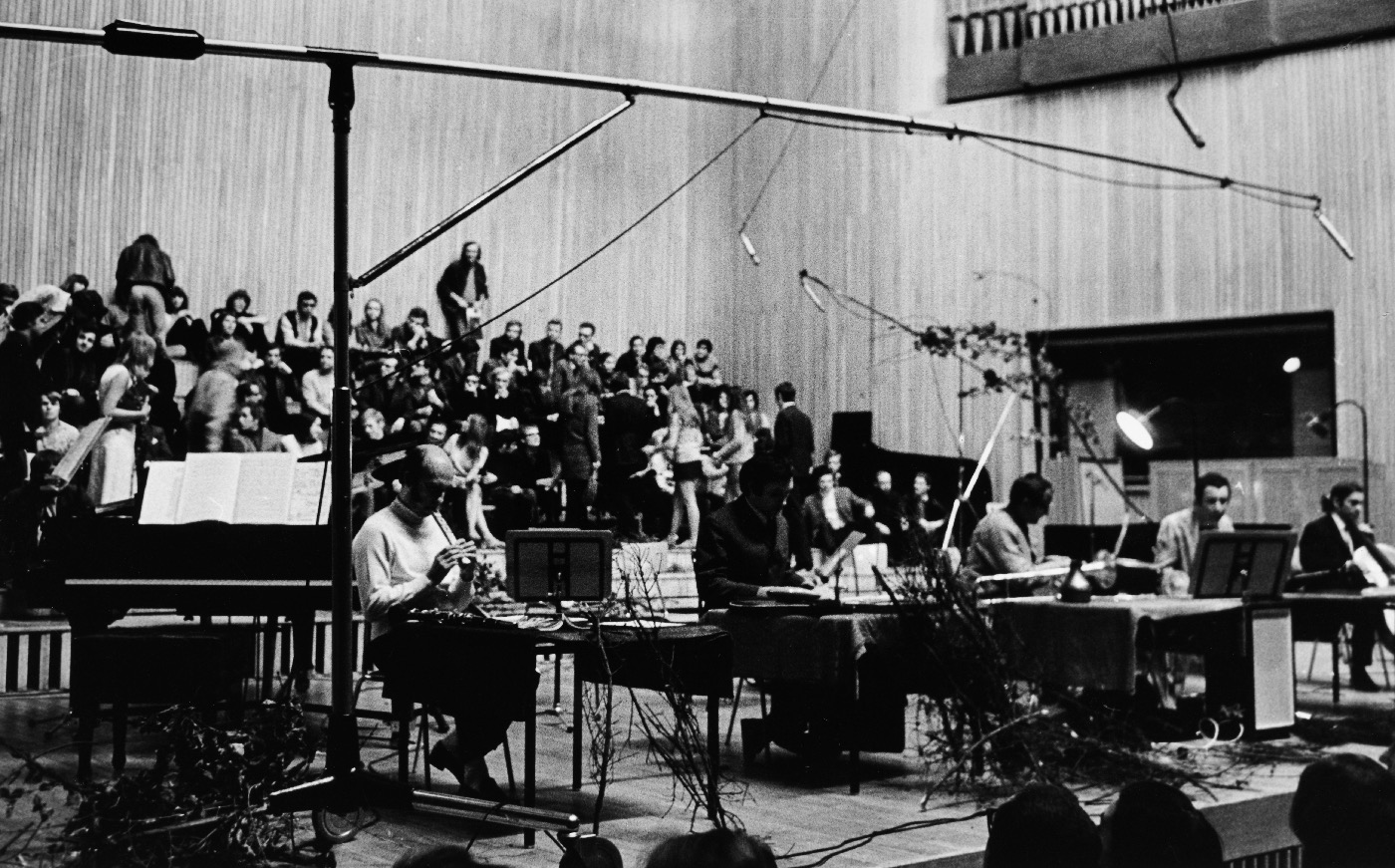

Warsztat Muzyczny / Music Workshop ensemble performing “P. T. Machine” by John White at the State Higher School of Music in Warsaw (now the F. Chopin University of Music), photo by Andrzej Zborski
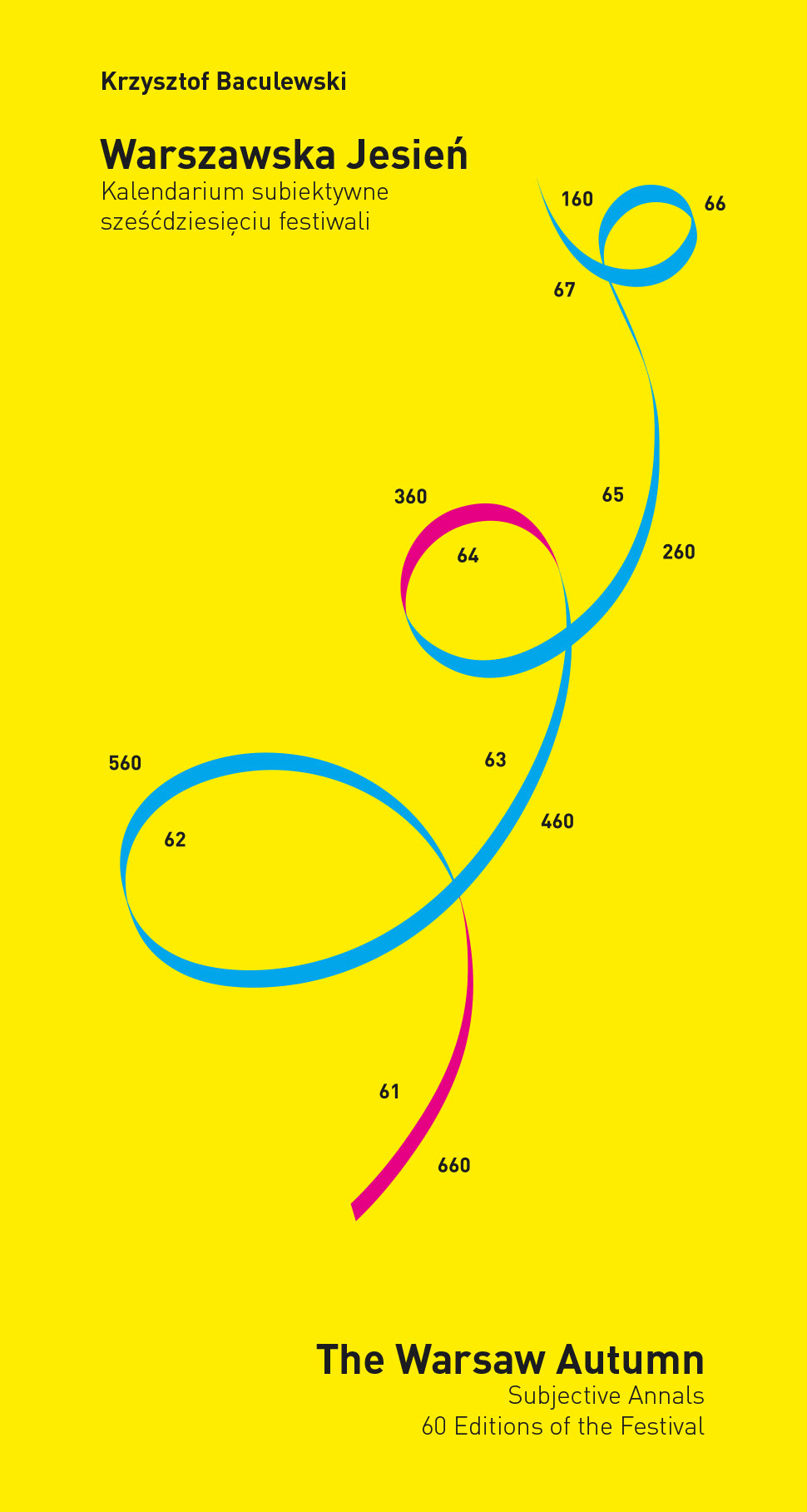

Krzysztof Baculewski "Subjective Annals 60 Editions of the Festival"
The 'WarsawAutumn' numer een. The inaugural concert included Voix humaine, one of the most characteristic works by Tomasz Sikorski. Deutsche Oper am Rhein presented two operas: The Soldiers by Bernd Alois Zimmermann and Lulu by Alban Berg. The programme also featured Utrenya by Krzysztof Penderecki in St John's Cathedral, a number of works by OlivierMessiaen, Piano Concerto by John Cage, En ando by Augustyn Bloch, Upstairs - Downstairs by Wojciech Kilar, cantatas: Józef Ko er's Love and Witold Szalonek's Ziemio miła (Beloved Land). The renowned Staatskappelle Dresden unfortunately did not delight the audience this time. The 'Warsaw Autumn' programmes increasingly began to feature works by Charles Ives: this time it was the Piano Trio with the grotesque scherzo bearing a mysterious title: TSIAJ, not explained in the programme book. Let us then at least today explain the meaning of this anagram: is Scherzo Is A Joke...
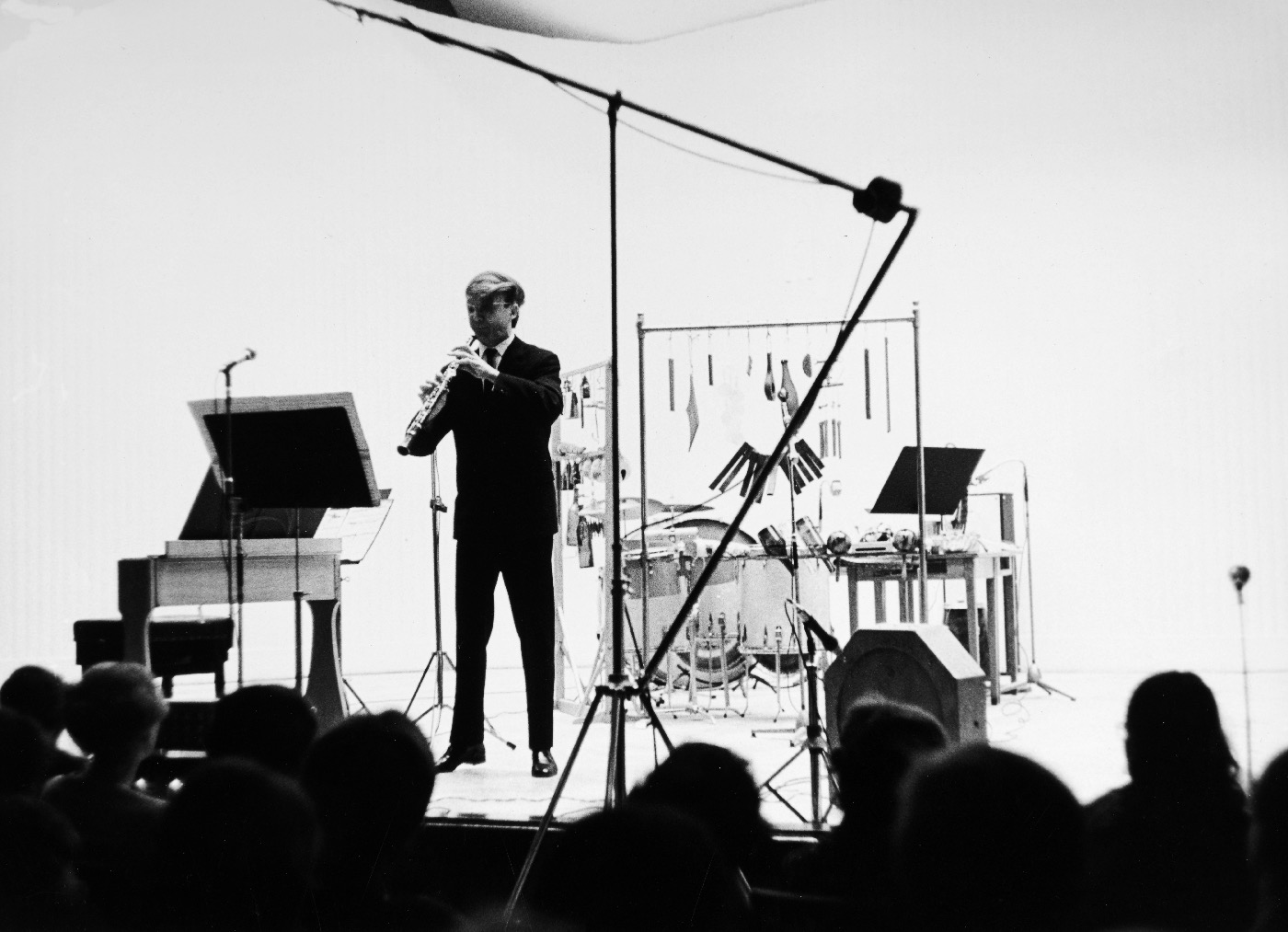

Heinz Hollinger performing “Sequenza VII” by Luciano Berio at the Warsaw Philharmonic Chamber Music Hall, photo by Andrzej Zborski
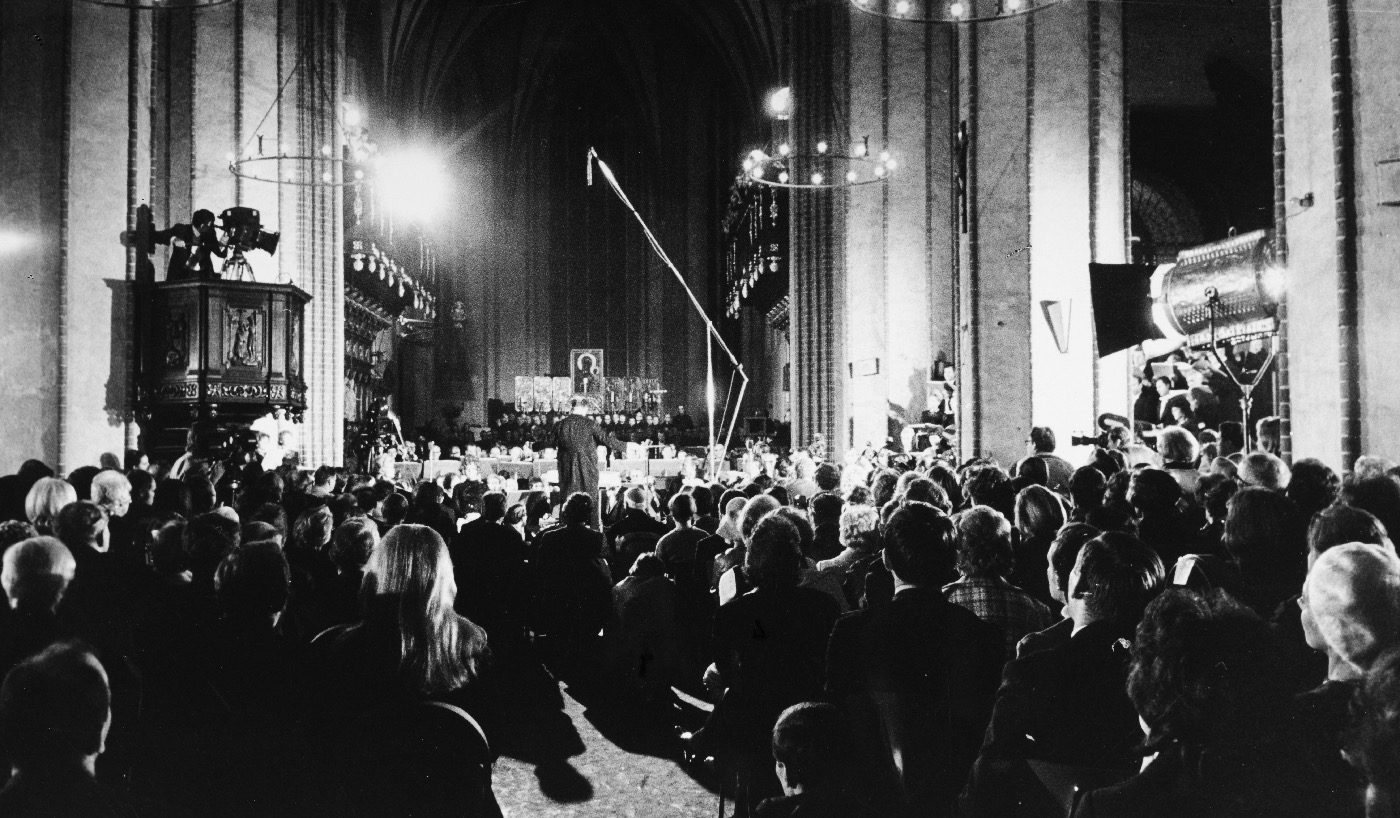

A performance of Krzysztof Penderecki’s “Utrenja” at St John’s Archcathedral in Warsaw, cond. Jerzy Katlewicz, photo by Andrzej Zborski
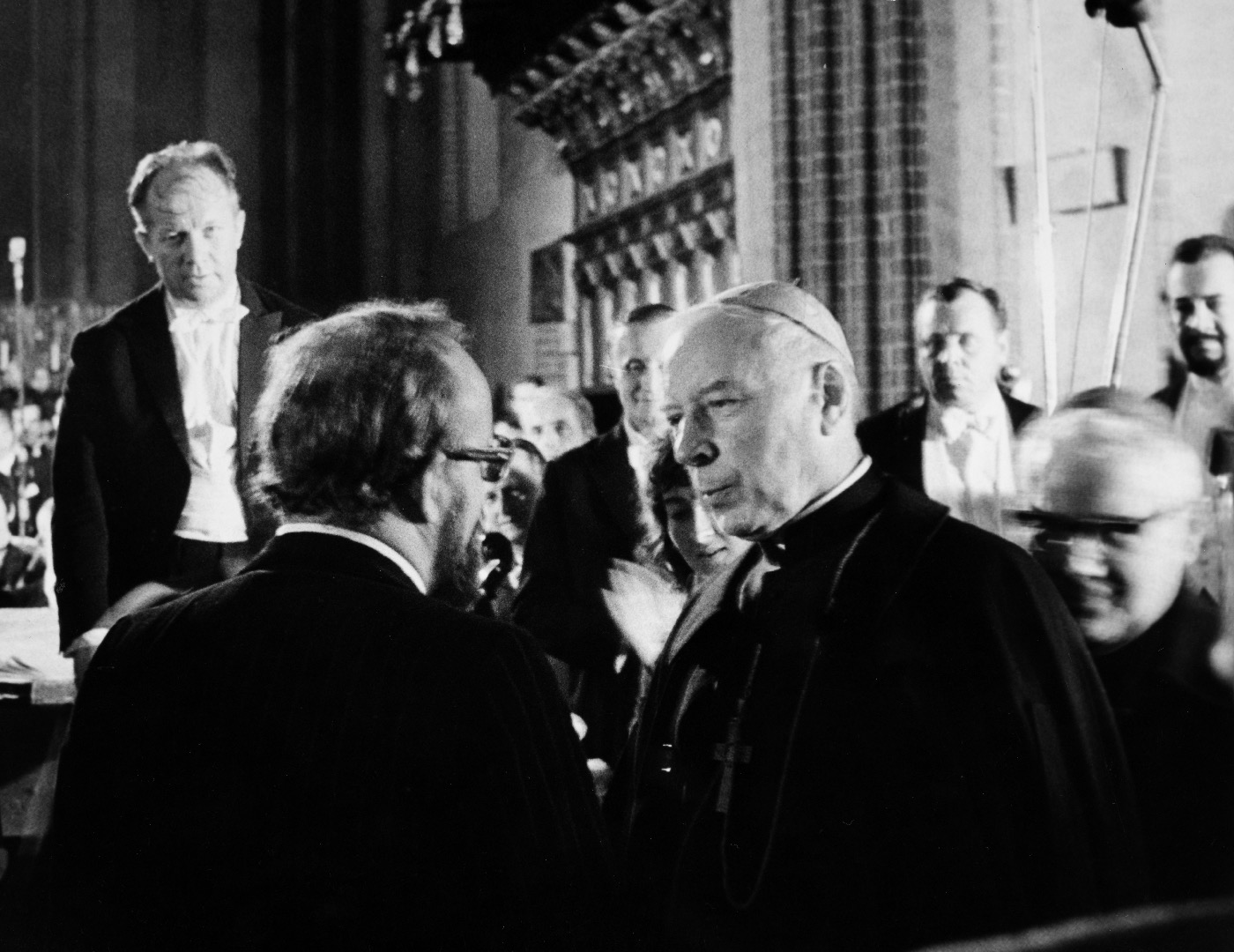

After the performance of Krzysztof Penderecki’s “Utrenja”. In the foreground: the composer with Cardinal Stefan Wyszyński, in the background: Jerzy Katlewicz, photo by Andrzej Zborski
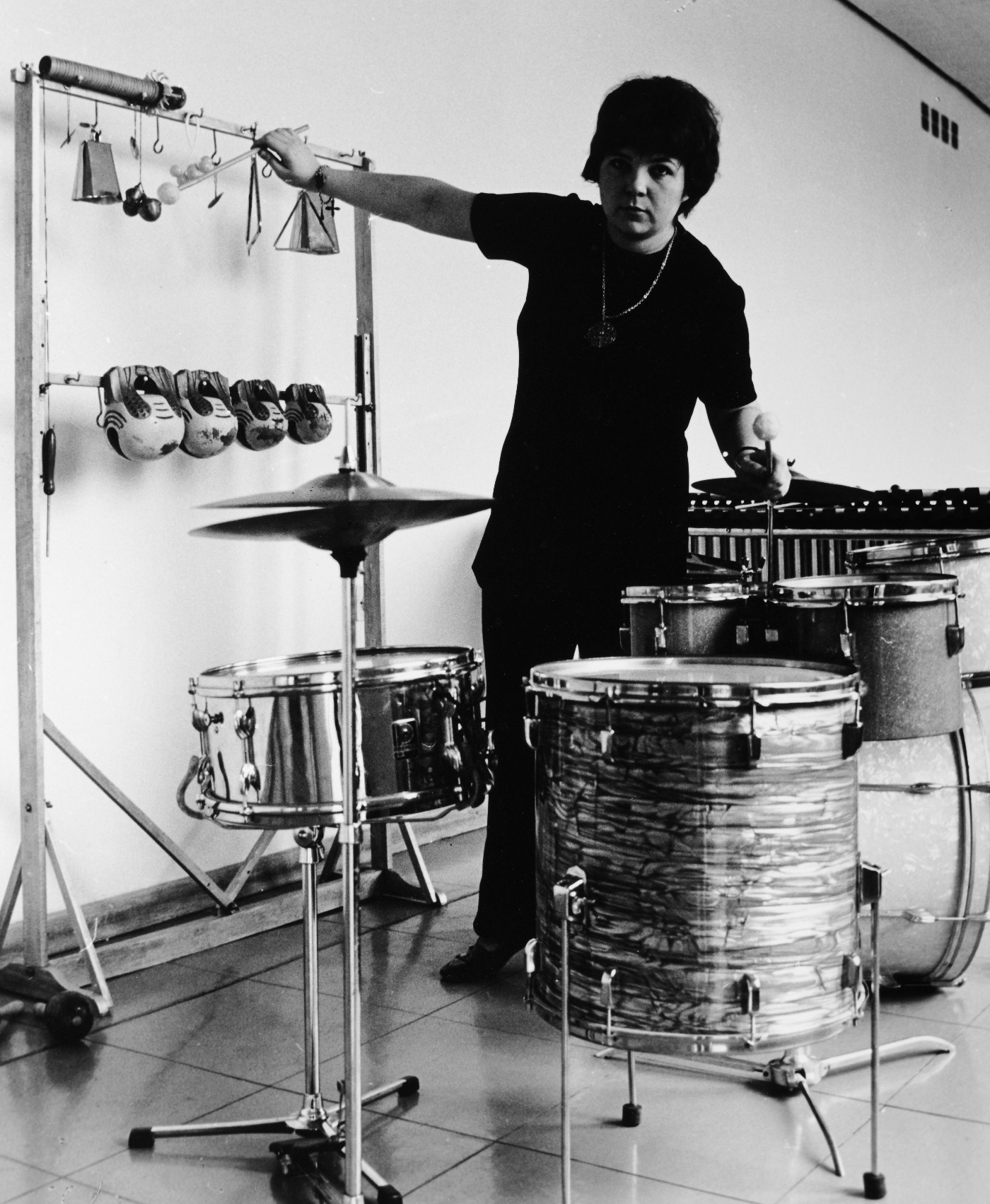

Marta Ptaszyńska performing “27’10.554” by John Cage at the Warsaw Philharmonic Chamber Music Hall, photo by Andrzej Zborski
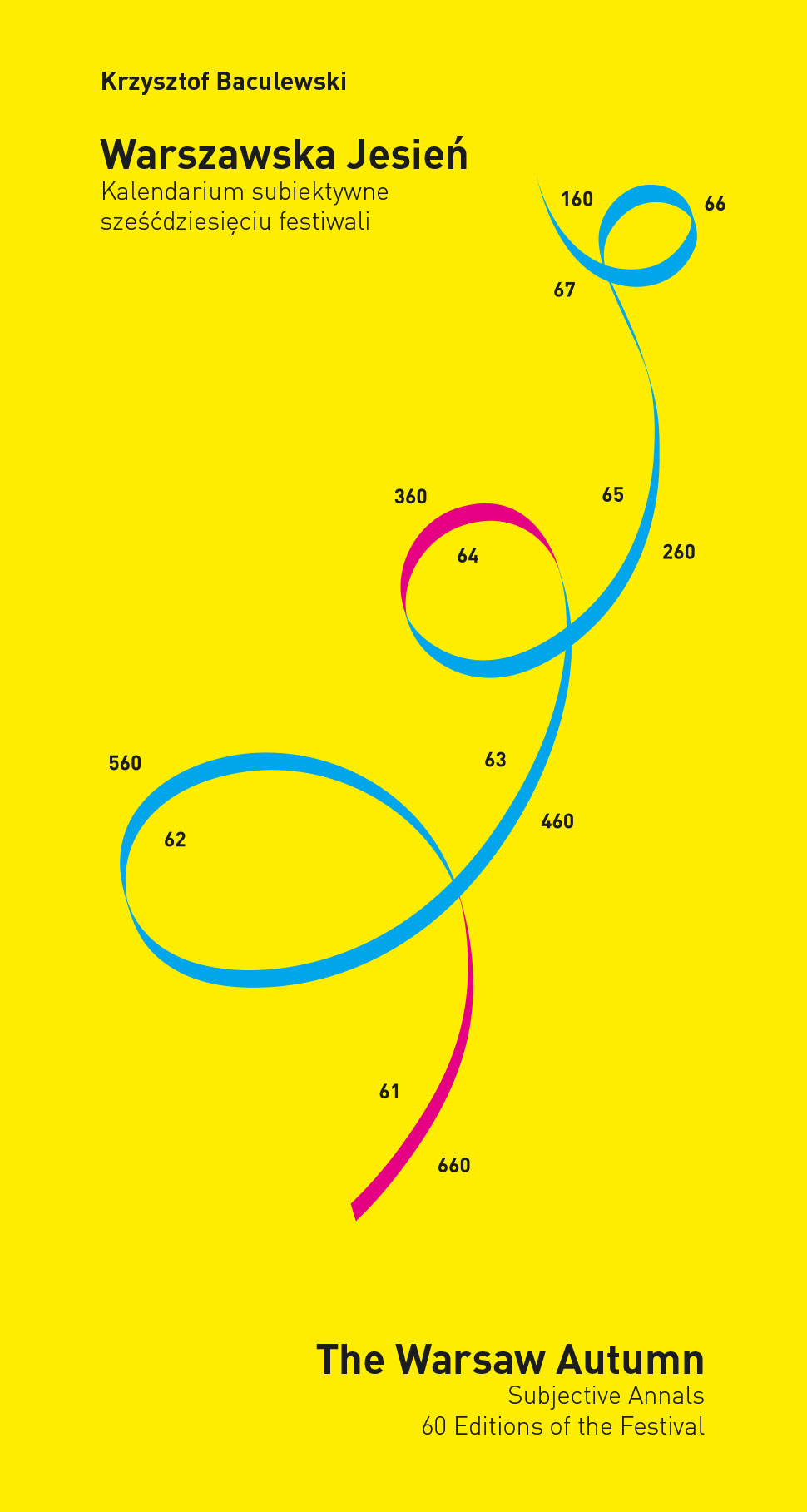

Krzysztof Baculewski "Subjective Annals 60 Editions of the Festival"
The sensational Folk Music by Zygmunt Krauze, the debut of Jan Oleszkowicz, quite a few pieces by Charles Ives, plus Amériques by Edgard Varèse. The performance of George Crumb's Echoes of Time and the River for orchestra marked the beginning of the fascination with the works of this American composer. ere was French music as well: Chant après chant by Jean Barraqué and Figures - Doubles - Prismes by Pierre Boulez. Apart from another visit by Merce Cunningham and Dance Company and from John Cage, the Festival also hosted Aram Khachaturian conducting his Symphony No. 2. Tomasz Sikorski again drew attention with his work Holzwege and Henryk Mikołaj Górecki with the cantata Ad matrem.
This edition of the Festival again clashed with politics. The Ministry of Culture and Art ordered that a composition by Edison Denisov, of whom the Soviet authorities disapproved, be struck o the programme. Directives from Moscow obviously could not be questioned, and so as a 'replacement' we got the Piano Concerto by the (appointed for life) First Secretary of the Soviet Composers' Union, Tikhon Khrennikov, with the composer himself as soloist. The concert was partly boycotted by the Warsaw audience, particularly by the older generation of the musical community; the younger members, particularly pupils and students, came to the concert to have a laugh... The Repertoire Committee of the 'Warsaw Autumn' withdrew the names of its members from the programme book in protest. And Denisov's work appeared in the programme anyway - as part of Enkyklopaideia, a cycle of works commissioned from many composers from different countries by Zygmunt Krauze for his 'Musical Workshop'. The only difference was that the Russian composer appeared under the maiden name of his wife, Gala Varvarin.
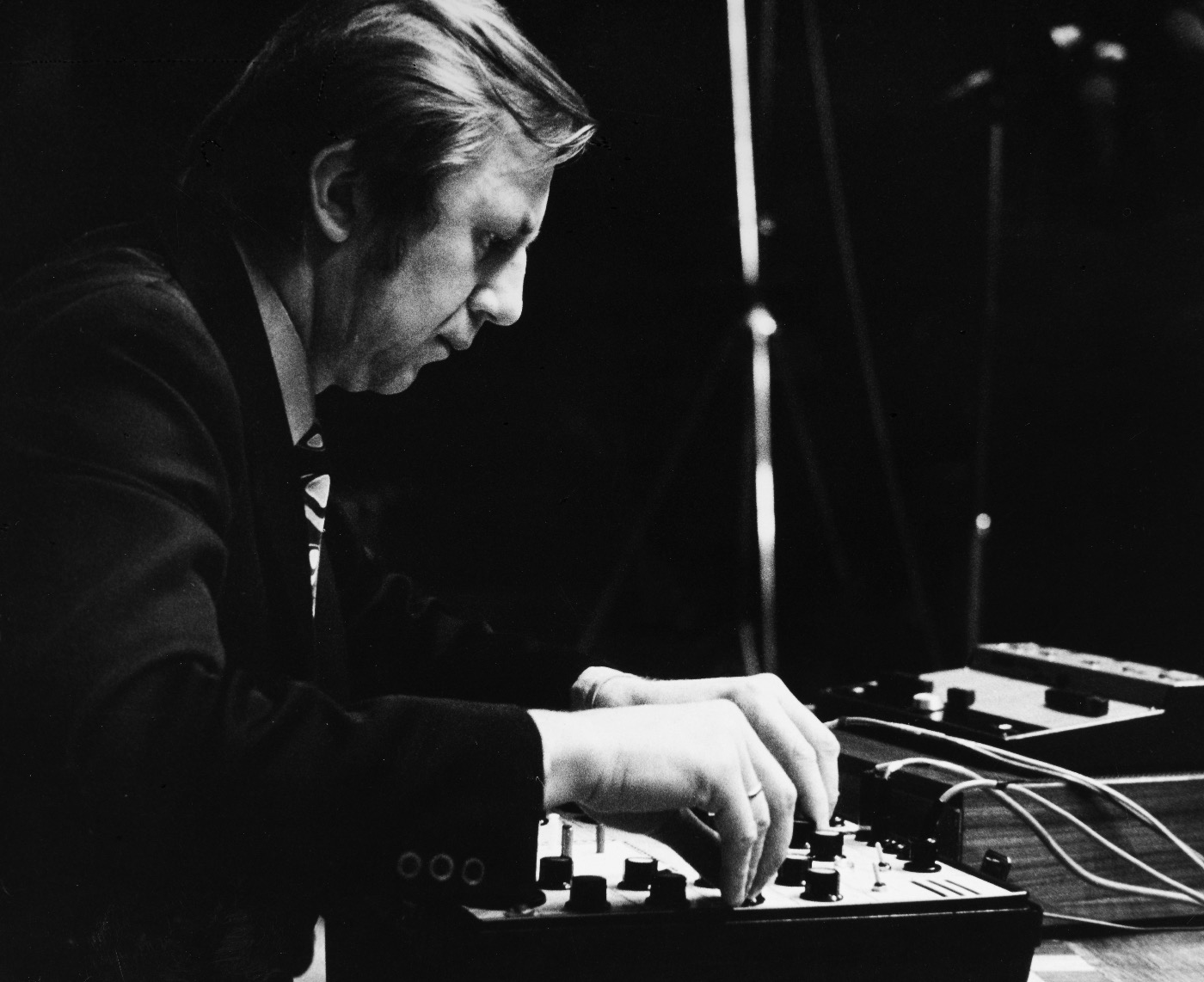

Włodzimierz Kotoński at Warsaw Philharmonic as sound engineer in his own piece “Concerto per oboe” for electrically amplified oboe, 6 wind instruments and orchestra, photo by Andrzej Zborski
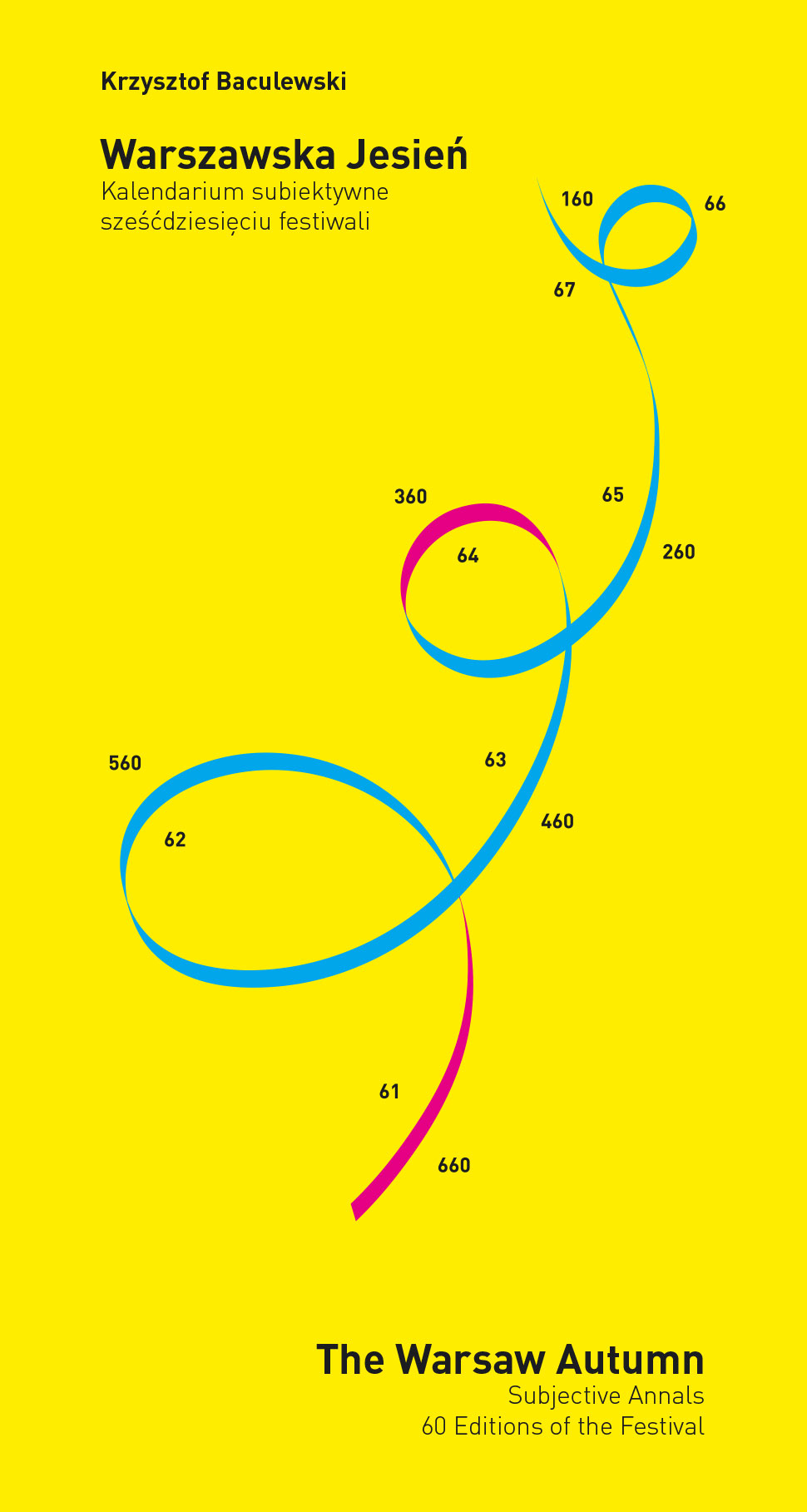

Krzysztof Baculewski "Subjective Annals 60 Editions of the Festival"
1973 brought a kind of compensation for the concessions of the previous year. The Festival opened with the 'dissident' Symphony No. 14 in G Minor, Op. 135 by Dmitri Shostakovich; there was also a performance of Romantic Music by Edison Denisov and the debut of Norbert Kuźnik; Irisation by Marek Stachowski, Symphony No. 2 by Per Nørgård, Pour orchestre by Krystyna Moszumańska-Nazar, Symphony No. 2 'Copernican', Op. 31 by Henryk Mikołaj Górecki, Lux aeterna by György Ligeti and Fantasia elegiaca for organ and orchestra by Kazimierz Serocki. The Festival came to an end with Witold Lutosławski's Cello Concerto. However, the soloist was Heinrich Schi rather than Mstislav Rostropovich, because the latter did not receive approval from Moscow. The Repertoire Committee was chaired by Tomasz Sikorski (until 1974).
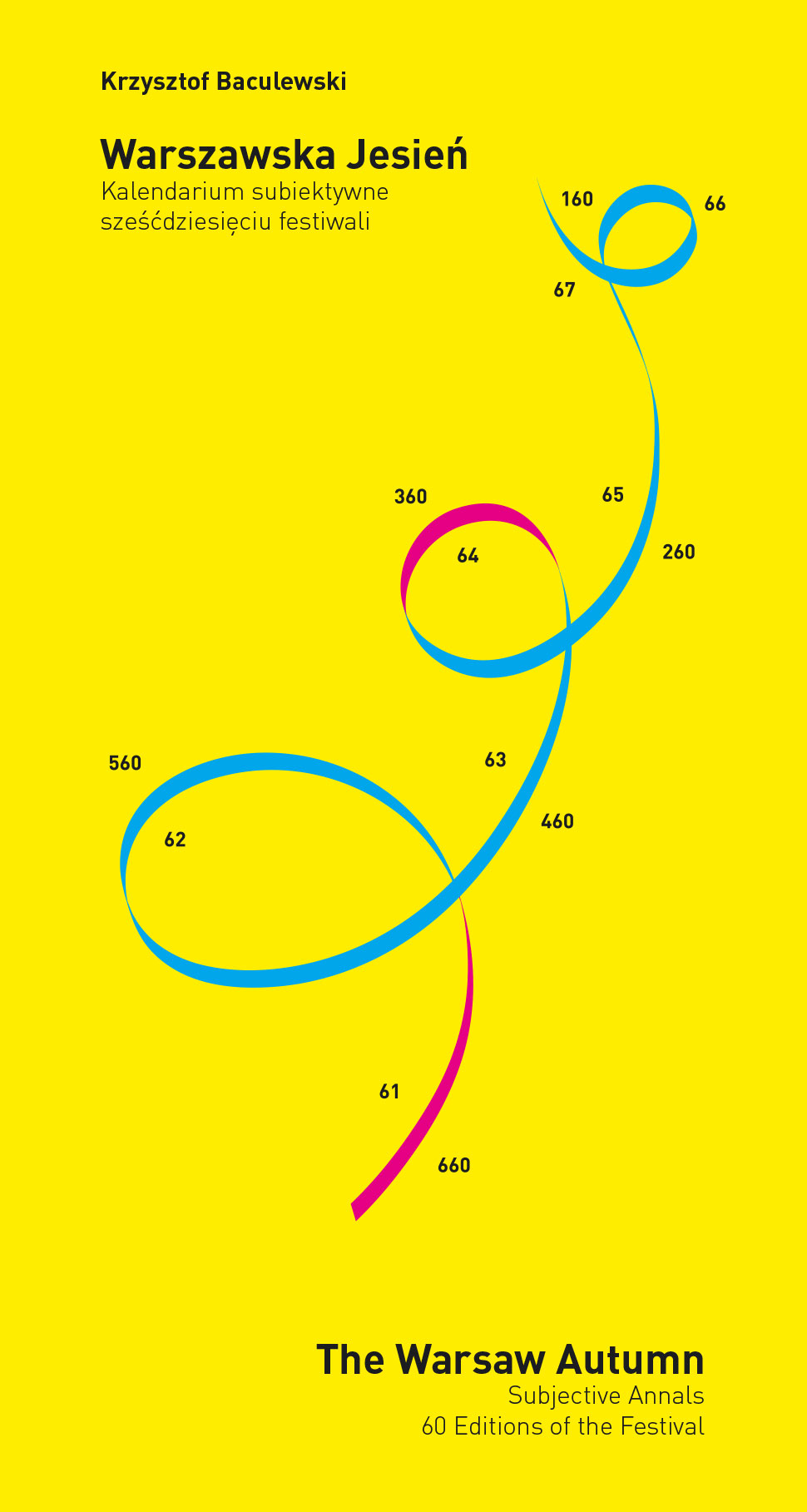

Krzysztof Baculewski "Subjective Annals 60 Editions of the Festival"
'Warsaw Autumn' concerts by outstanding foreign ensembles came in waves every few years. at year there were again quite a few of them: the Rundfunk-Sinfonieorchester from Berlin, Collegium Vocale from Cologne; the ORTF Orchestra from Paris gave two concerts, with conductors Gilbert Amy and Maurice le Roux. ere were also chamber ensembles: one from Armenia, as well as Acezantez from Zagreb, '4'33' from West Berlin, Den Norske Blasekvintett from Oslo and Agitation Free from West Germany. The programme included the oratorio El hombre by Zbigniew Bujarski, Impromptu fantasque by Kazimierz Serocki, Stimmung by Karlheinz Stockhausen, Concerto for Piano and Tape by Szabolsc Esztényi (his debut as a composer), Sonata for Strings - Veronica's Veil by Marek Kopelent, a 24-hour performance of Vexations by Erik Satie, Music from Afar by Tomasz Sikorski, Epifanie by Luciano Berio, Clocks and Clouds by György Ligeti, and yet another sensation: Krzesany by Wojciech Kilar, with its novel aesthetics and new type of expression.
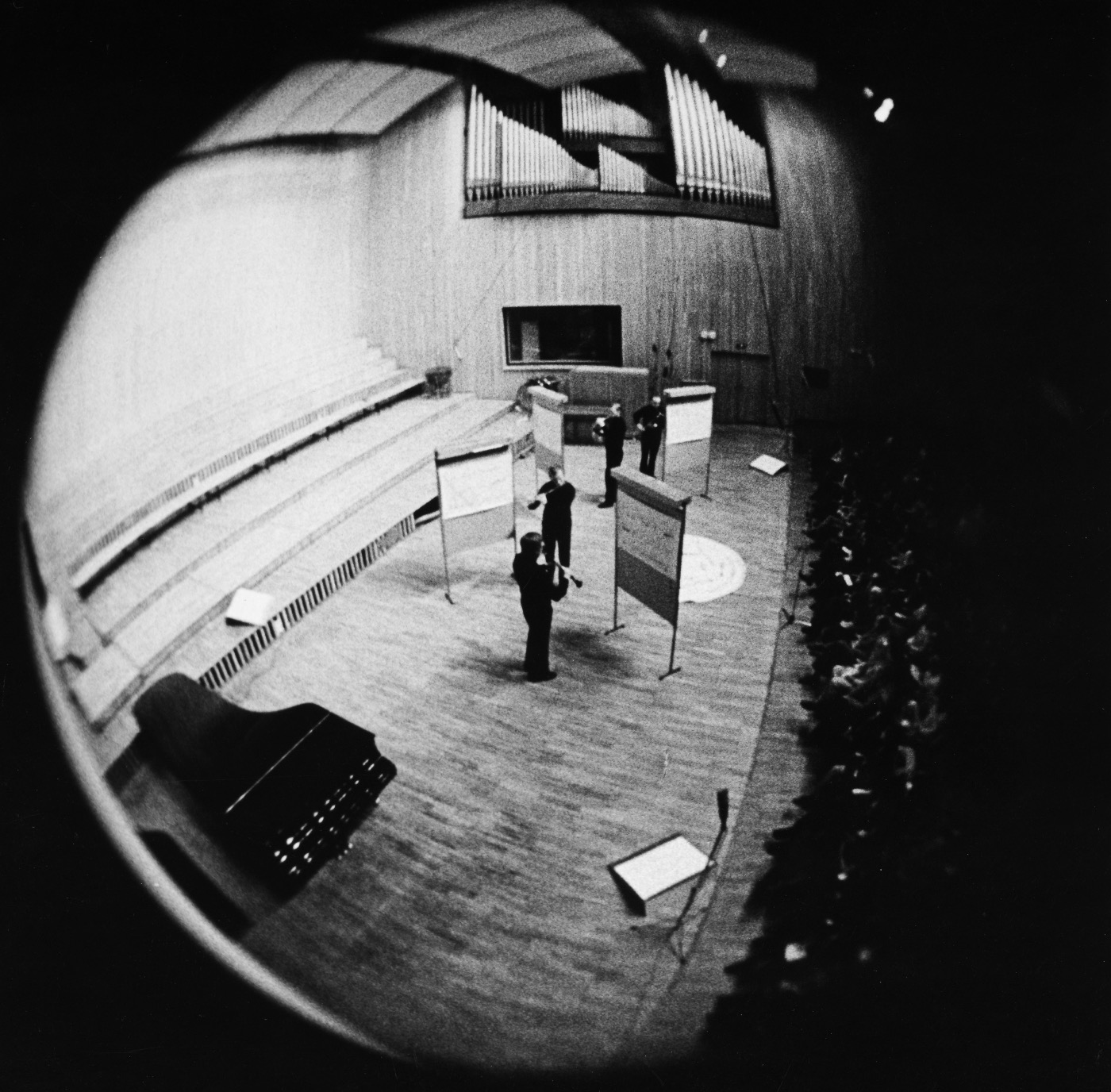

A performance of “Musical Games” by Włodzimierz Kotoński at the State Higher School of Music in Warsaw (now the F. Chopin University of Music), photo by Andrzej Zborski
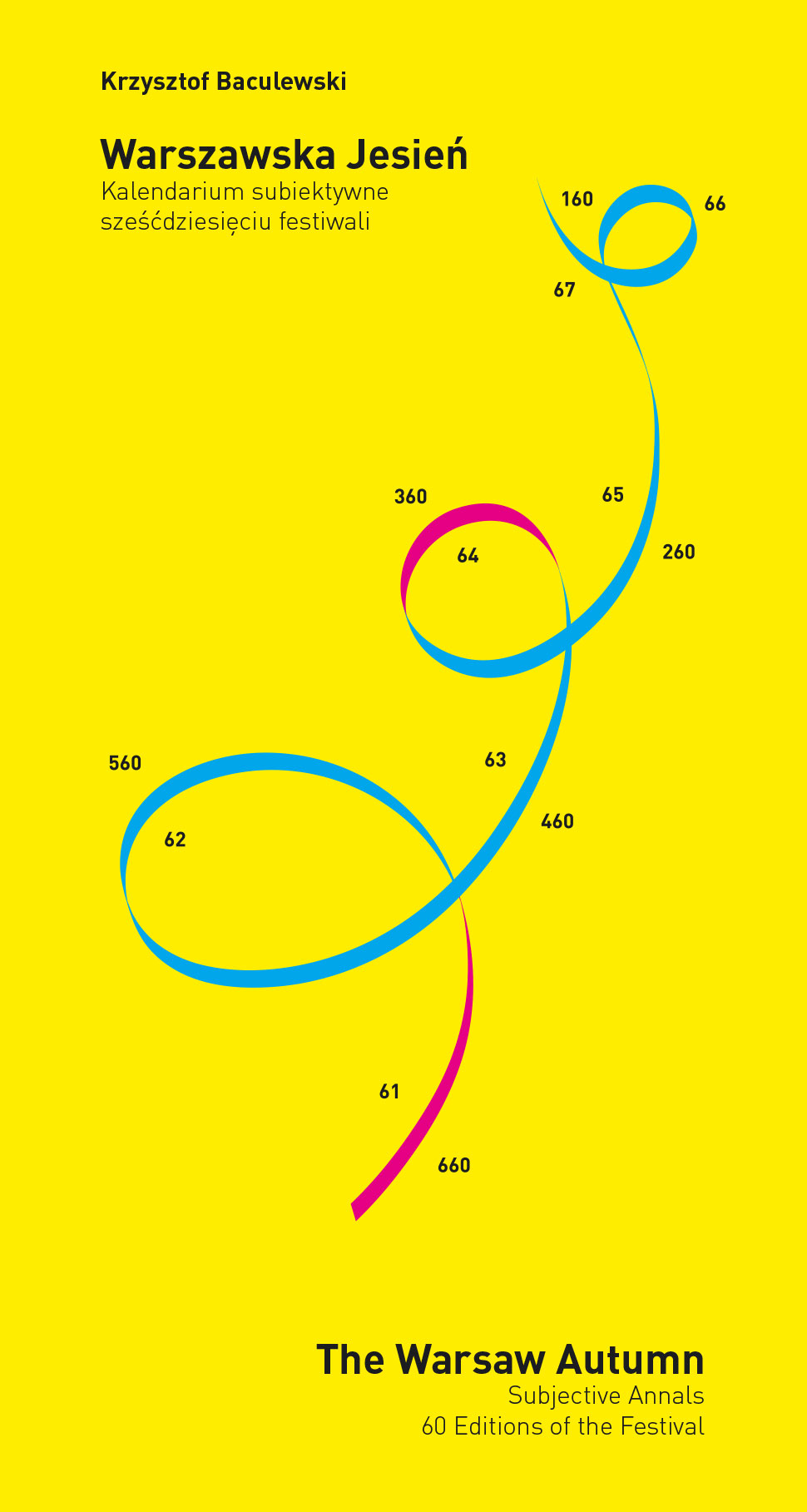

Krzysztof Baculewski "Subjective Annals 60 Editions of the Festival"
Another festival edition with a vague pro le. A pinch of the classics: the Opera from Brno with two works by Leoš Janáček (The Cunning Little Vixen and From the House of the Dead); the avant-garde: San Francisco Polyphony by György Ligeti, a memorable performance of Black Angels by George Crumb (Wilanów Quartet at its most excellent); La Passion selon Sade by Sylvano Bussotti - a multimedia spectacle, as we would call it today, in the Hall of the Warsaw University of Technology, with computer graphics appearing for the first time; Como una ola de fuerza y luz by Luigi Nono. Polish works included: Other Voices by Tomasz Sikorski, Psychodrama by Tadeusz Baird, The Awakening of Jacob and Magni cat by Krzysztof Penderecki, Paroles tissées by Witold Lutosławski with Peter Pears as soloist, the opera Zmierzch Peryna (The Twilight of Peryn) by Zbigniew Penherski, Music for Orchestra No. 4 'a-la' by Andrzej Dobrowolski. The debut of Krzysztof Knittel: points/lines for clarinet, tape and slides. The Repertoire Committee worked under the leadership of Józef Patkowski (until 1978).
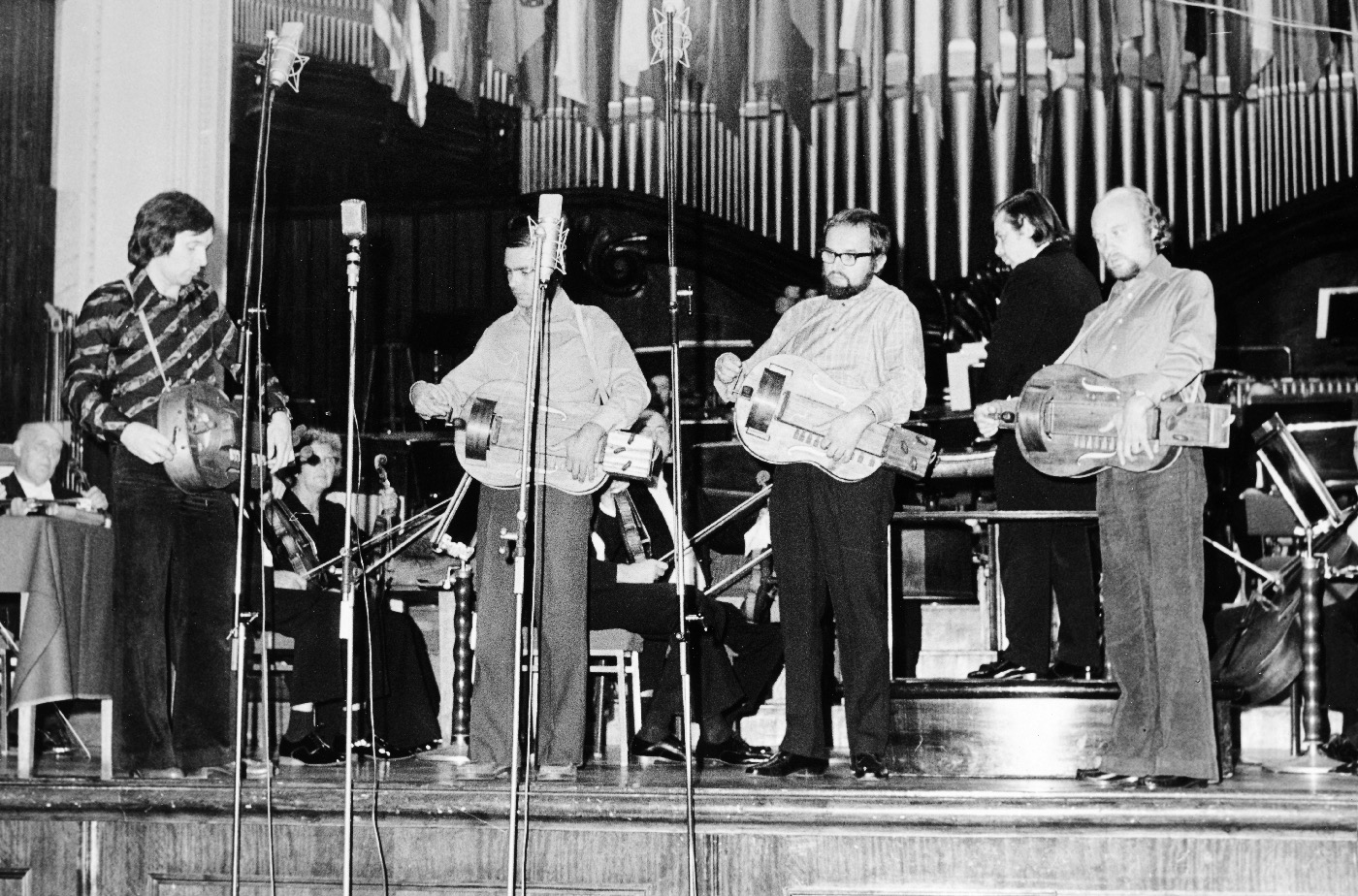

Warsztat Muzyczny / Music Workshop ensemble performing at Warsaw Philharmonic, photo by Andrzej Zborski
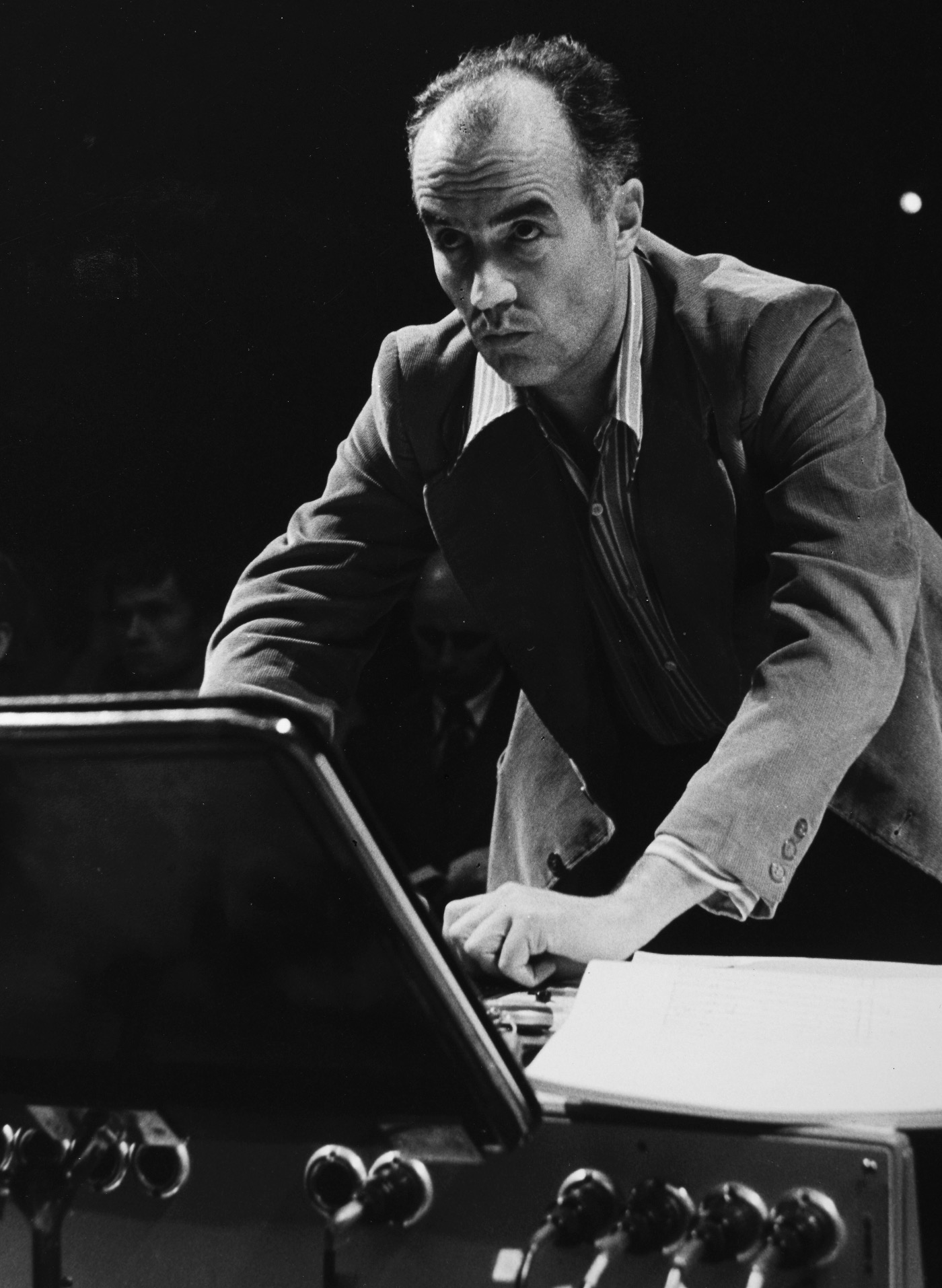

Luigi Nono at Warsaw Philharmonic as sound engineer in his own composition “Como una ola de fuerza y luz” for soprano, piano, tape and orchestra, photo by Andrzej Zborski
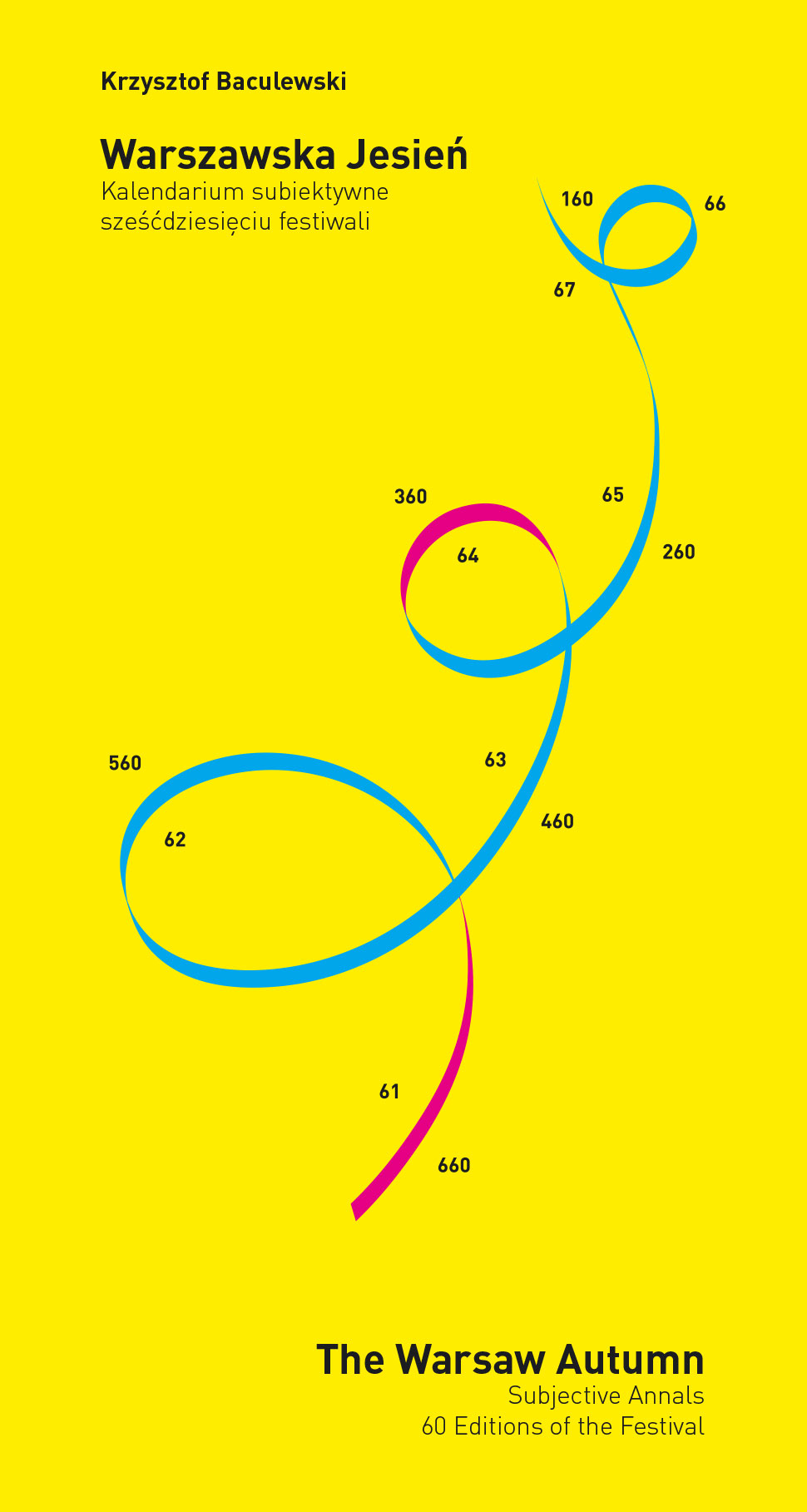

Krzysztof Baculewski "Subjective Annals 60 Editions of the Festival"
This edition opened with Wojciech Kilar's Bogurodzica (Mother of God), and closed with Rituel by Pierre Boulez. Between these two came a concert by The King's Singers featuring Eclogue VIII by Krzysztof Penderecki and the amusing Time Piece by Paul Patterson; two concerts of the Slovenian Philharmonic from Ljubljana; Jane Manning sang the Harawi cycle by Olivier Messiaen; we listened to Peinture by Edison Denisov and Musique socialiste by Luc Ferrari; Andrzej Dutkiewicz performed Macrocosmos I by George Crumb; the programme also included Studium in A by Romuald Twardowski, which seems rather amusing today, presented along the Baroque Variations by Lukas Foss. Camerata Strumentale 'Alfredo Casella' from Turin aroused enthusiasm with its daring-grotesque interpretation of Aventures & Nouvelles Aventures by György Ligeti. The cantata Goethe-Briefe by Tadeusz Baird occasioned rather peculiar re ections, but his Concerto lugubre for viola with Stefan Kamasa as soloist was highly moving. We also got to know ree Places in New England by Charles Ives and were reminded of Eonta by Iannis Xenakis. Elżbieta Sikora made her 'Warsaw Autumn' debut with a piece for tape entitled Podróż II (Journey II) and I, Krzysztof Baculewski, also made my first appearance with the rhapsody Is-slottet.
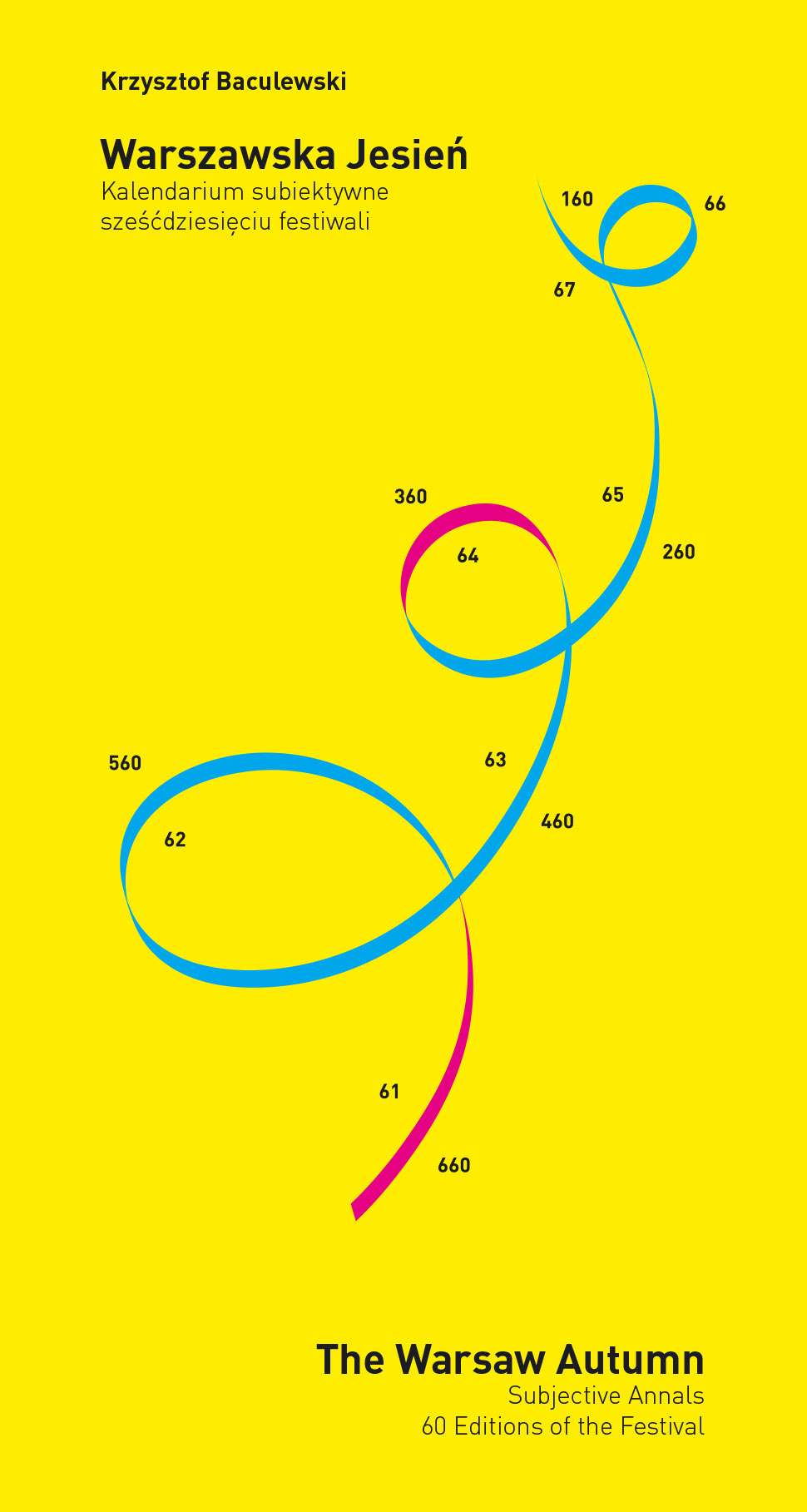

Krzysztof Baculewski "Subjective Annals 60 Editions of the Festival"
This 'Warsaw Autumn' abounded in major events. Henryk Szeryng played Szymanowski's Violin Concerto No. 2, Op. 61; Mauricio Pollini gave a recital of Arnold Schoenberg's piano works (Klavierstücke Opp. 11, 19, 23), Pierre Boulez's Sonata No. 2 and Luigi Nono's ...so erte onde serene (with tape). Włodzimierz Kotoński demonstrated a new style in Wind Rose, and Zygmunt Krauze did the same in his Piano Concerto. Wojciech Kilar continued to explore the Polish highlands inspirations - this time somewhat in uenced by the Young Poland style in his poem Kościelec 1909. Olga Szwajgier appeared in the cycle of Madrigals by George Crumb. ere were debuts by Eugeniusz Knapik with the orchestral song Le Chant and Andrzej Krzanowski with a multimedia spectacle (with slides by Kazimierz Urbański). De Staat by Louis Andriessen proved a sensation, and so did Symphony No. 3 (Symphony of Sorrowful Songs), Op. 36 by Henryk Mikołaj Górecki, received with mixed feelings. It was hard to obtain a ticket for Cathy Berberian's recital 'From Monteverdi to the Beatles', which included a number of enthusiastically received jokes: Cat Duet by Gioacchino Rossini (the other cat was the soloist's accompanying pianist, Harold Lester), the aria Après un dîner by Jacques O enbach, a 'Baroque-and-roll style' arrangement of the Beatles' song Yesterday sung à la Elisabeth Schwarzkopf, as well as Ticket to Ride in the style of a Handel aria. Contrast was provided by Krzysztof Knittel's string quartet dorikos. 1977 also brought a significant change: the Polish Composers' Union succeeded in having the censor's ban li ed from the names and works of Andrzej Panufnik and Roman Palester. The Festival audience could now listen to Universal Prayer by Panufnik.
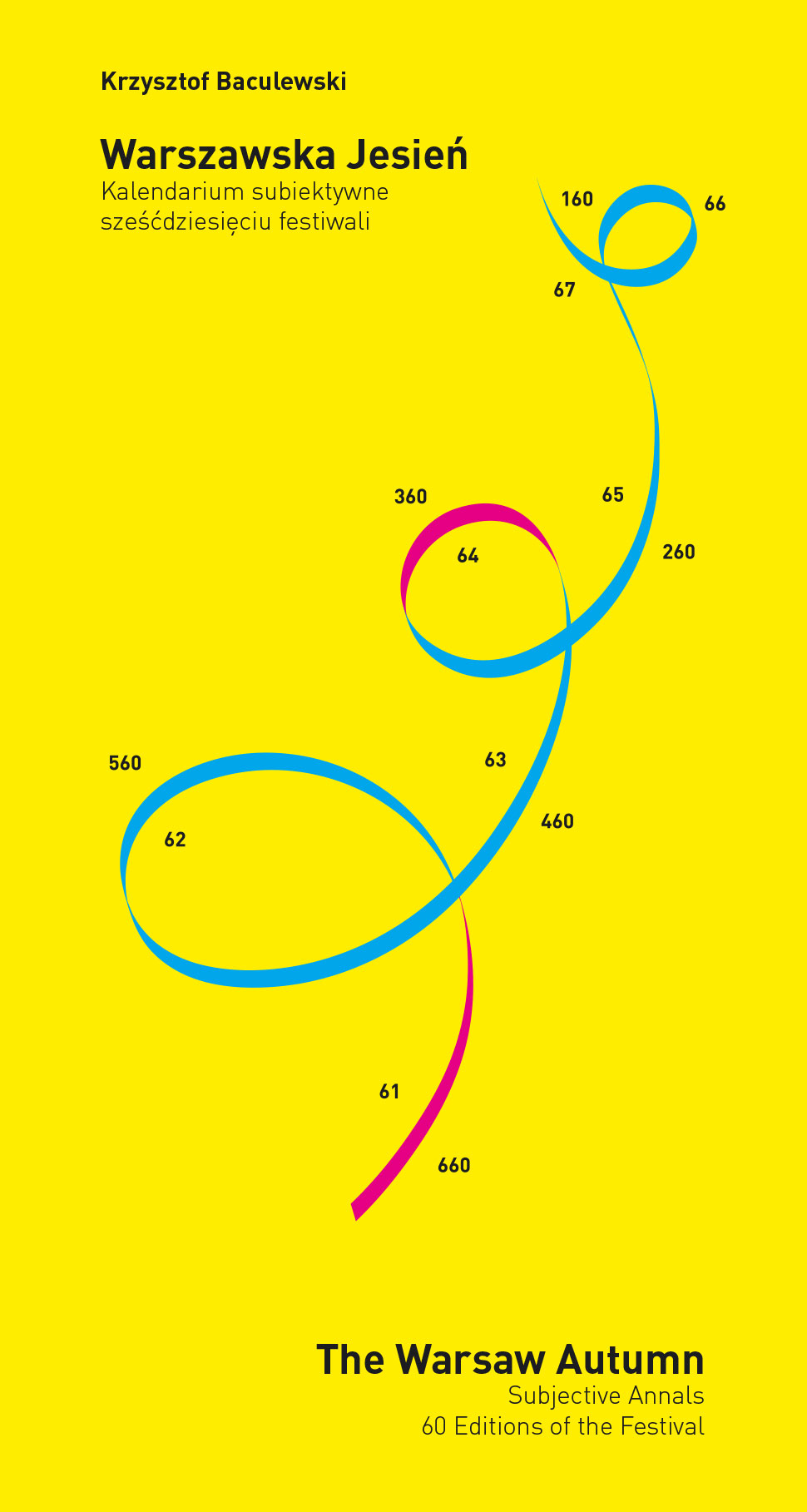

Krzysztof Baculewski "Subjective Annals 60 Editions of the Festival"
The programme included one of the most important achievements of late 20th-century music: Coro by Luciano Berio, performed by the Choir and Symphony Orchestra of Austrian Radio from Vienna under Leif Segerstam. Wanda Wiłkomirska played the Violin Concerto by Zbigniew Bargielski. The Silesian Philharmonic under Karol Stryja presented a single-composer concert (which happens only rarely at the 'Warsaw Autumn') dedicated to the music of Bolesław Szabelski (who was then 82); Tadeusz Żmudziński premiered Szabelski's Piano Concerto. The Malmö Percussion Ensemble performed Campanella by Zbigniew Rudziński - a highly original piece - as well as Ballad by Adam Sławiński. Jerzy Maksymiuk's Polish Chamber Orchestra made an appearance, as also did the Radio Chamber Orchestra from Hilversum conducted by Ernest Bour, and the Scottish National Orchestra from Glasgow under Sir Alexander Gibson, which performed, among others, Sinfonia sacra by Andrzej Panufnik. The Lithuanian Chamber Orchestra conducted by Saulius Sondeckis, with violinists Gidon Kremer and Tatiana Grindenko accompanied by Alfred Schnitke on the piano presented Tabula rasa by Arvo Pärt. During the final concert Tadeusz Strugała brilliantly conducted Iannis Xenakis' Jonchaies.
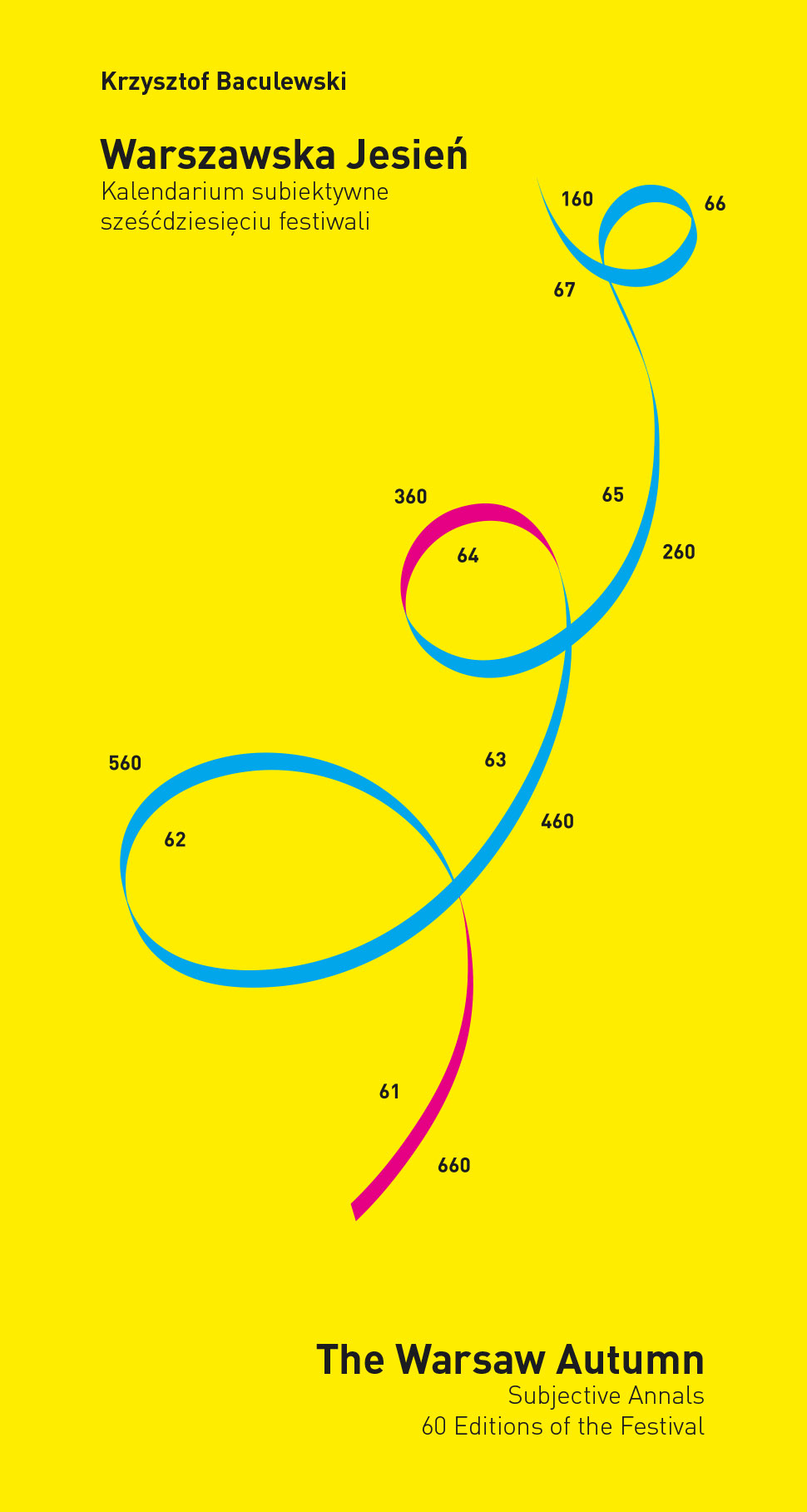

Krzysztof Baculewski "Subjective Annals 60 Editions of the Festival"
From that year on, the Festival started on Fridays (not Saturdays), and so lasted one day longer. The State Higer School of Music, whose concert hall was frequently used as a vanue for Festival events, changed its name to the Fryderyk Chopin Academy of Music.
The inaugural concert featured the latest work by Kazimierz Serocki: Pianophonie, with Szabolcs Esztényi as soloist. Another chink appeared in the censors' restrictions: the audience heard performances of the Viola Concerto by Roman Palester and Poème funèbre by Bolesław Woytowicz, composed in memory of Marshal Józef Piłsudski (the first head of the Polish State, re-established in 1918 after 123 years of foreign rule; the Marshal was not popular with the authorities of communist Poland). Aesthetically, Krzysztof Penderecki presented a new style, reminiscent of the music from the turn of the 19th and 20th centuries, in his Violin Concerto and in the 'sacra rappresentazione' Paradise Lost, staged by the Württembergische Staatstheater from Stuttgart, directed by August Everding. Moreover, the programme contained: Eugeniusz Knapik's Corale, Interludio e Aria, Louis Andriessen's Hoketus, and Karlheinz Stockhausen's Mantra. Among the performers there were the cellist Ivan Monighetti, baritone John Shirley-Quirk, the Symphony Orchestra of Finnish Radio conducted by Leif Segerstam, Jerzy Maksymiuk's Polish Chamber Orchestra, and others. The final concert included Klangschatten - mein Saitenspiel by Helmut Lachenmann. This concert also occasioned one of the legendary Festival fracas: The audience, bored, stopped listening to the piece and noise from the auditorium drowned out the music. The composer, in desperation, came onto the stage and made a somewhat arrogant speech (translated into Polish by Józef Patkowski from the balcony), in which he instructed the public that das ist ein Pianissimo-Stück and those who do not want to listen should leave. The conductor then carried on. The audience, like children who have been disciplined, fell silent, and then responded to the nished performance with enthusiastic applause. Paweł Szymański made his debut with Gloria for female choir and orchestra. Augustyn Bloch took over the chairmanship of the Repertoire Committee (until 1987).
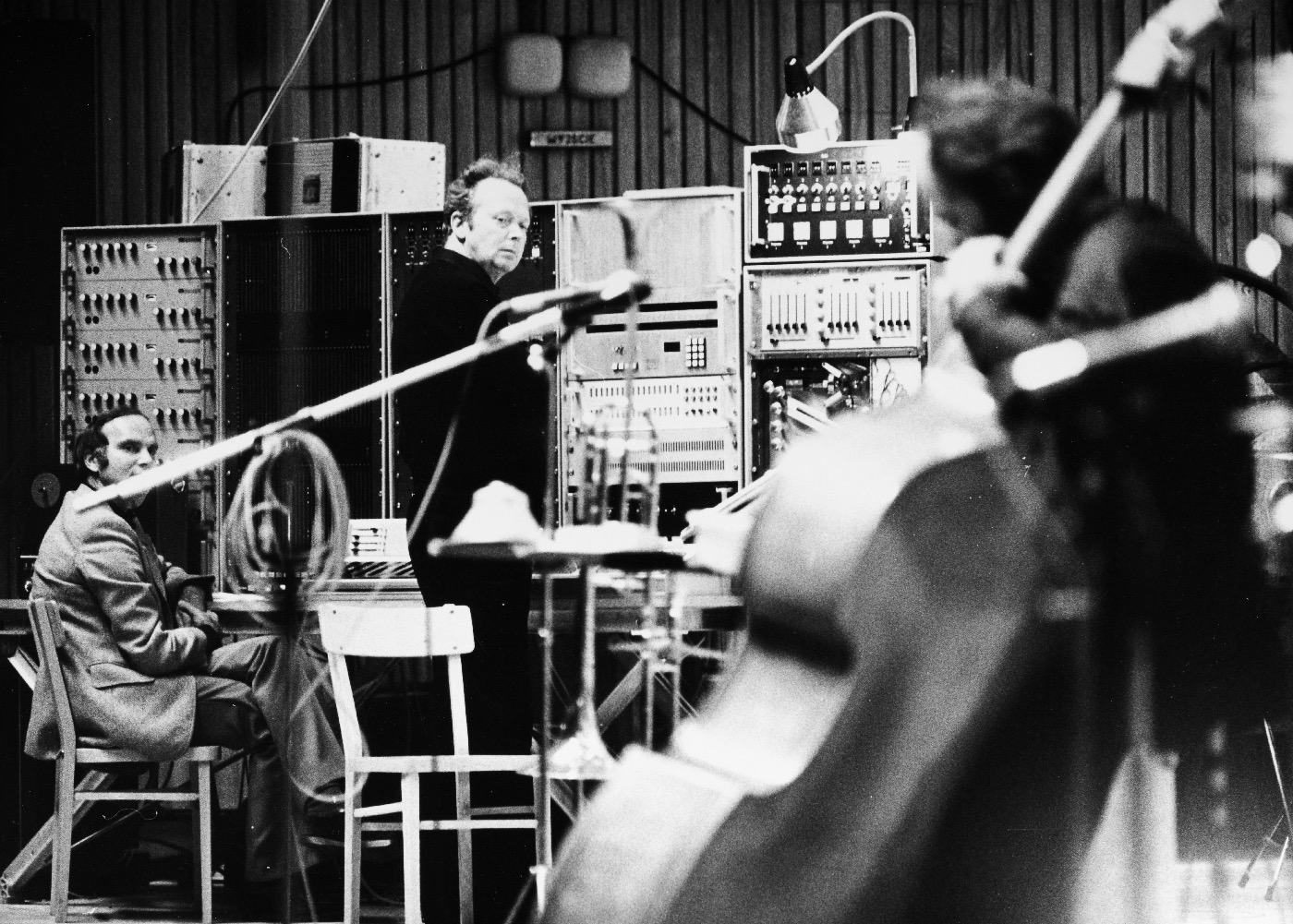

Hans Peter Haller as sound engineer in “Harvest Work” (group improvisation) at the State Higher School of Music in Warsaw (now the F. Chopin University of Music), photo by Andrzej Glanda
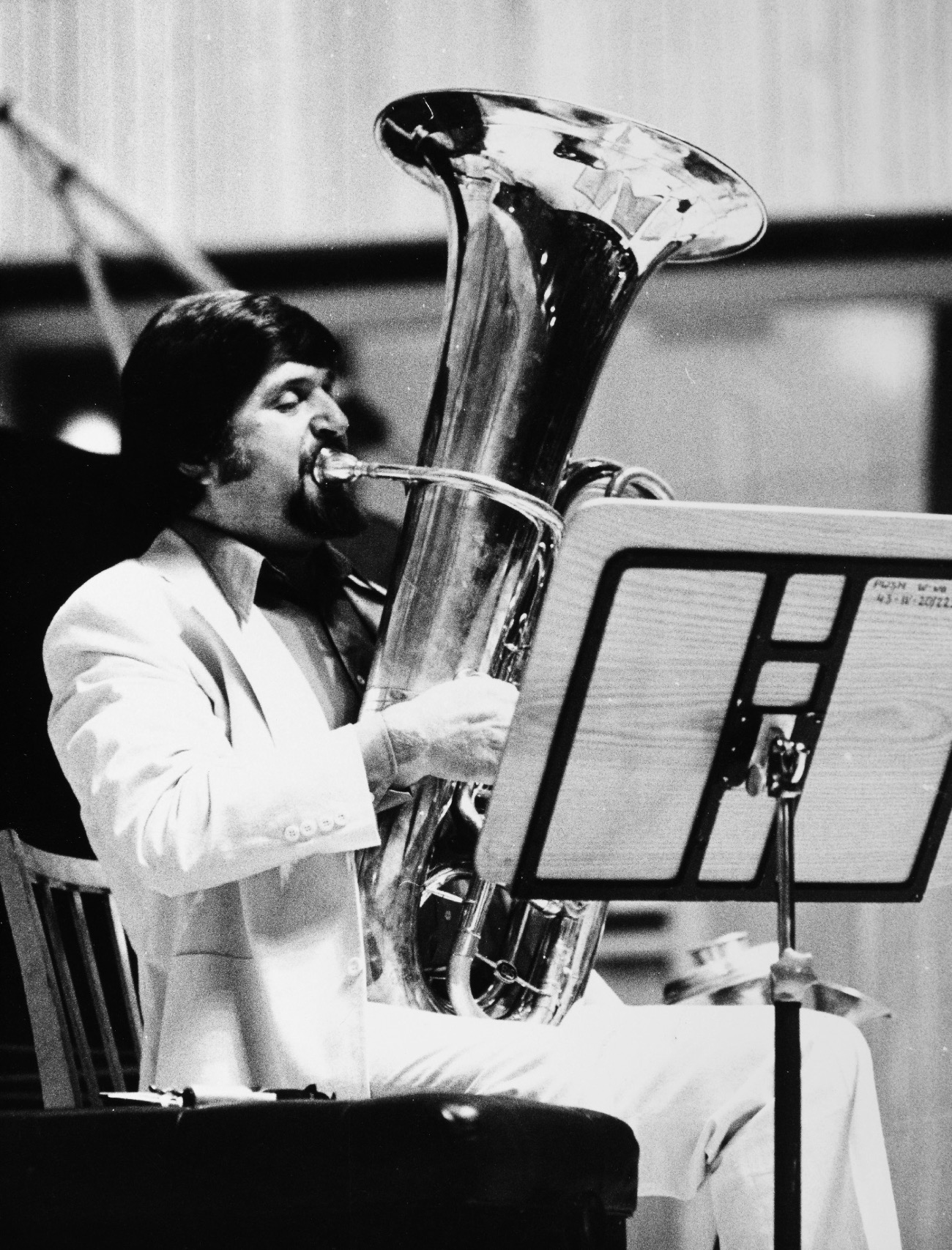

Zdzisław Piernik performing Witold Szalonek’s “Piernikiana” at the State Higher School of Music in Warsaw (now the F. Chopin University of Music), photo by Andrzej Glanda
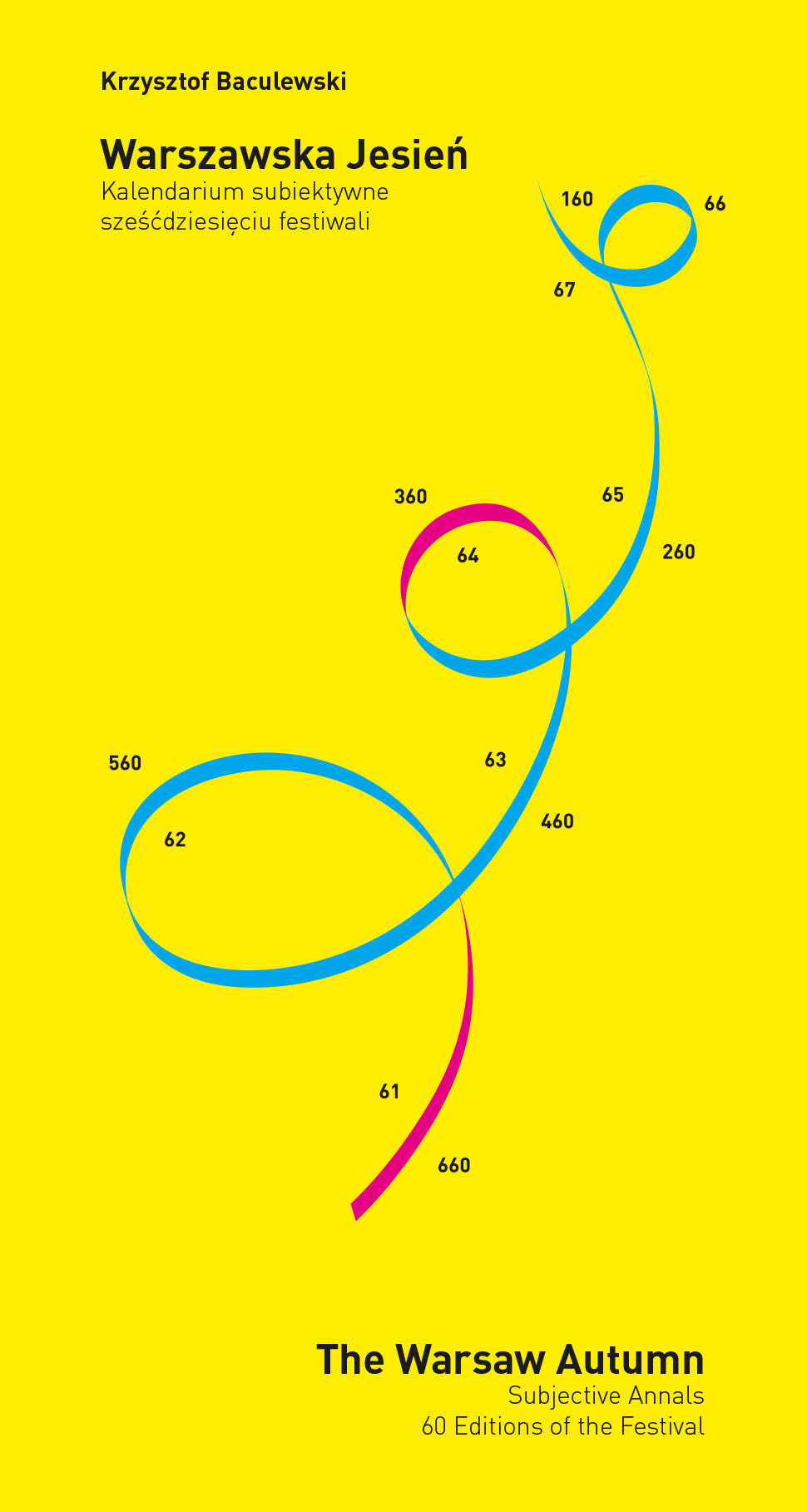

Krzysztof Baculewski "Subjective Annals 60 Editions of the Festival"
Important debuts: Grażyna Pstrokońska-Nawratil with the symphonic poem Icar and Aleksander Lasoń with Symphony No. 1 for winds, percussion and two pianos. The third episode of Wojciech Kilar's Tatra cycle - Siwa mgła (Grey Mist), with a spectacular highland-style solo by Andrzej Bachleda. Andrzej Dobrowolski's Passacaglia - Music for Orchestra No. 5. Deutsche Oper am Rhein presented Arnold Schoenberg's Moses and Aaron at the Grand Theatre. A group of young performers also made their appearances: singers Henryka Januszewska, Olga Szwajgier - sopranos and Urszula Mitręga - alto; flutist Joanna Turska; oboist Mariusz Pędziałek; tuba player Zdzisław Piernik; bass clarinettist Harry Sparnaay; Warsaw Percussion Group. The London Sinfonietta arrived from London; the Dutch ensembles Electric Phoenix and Het Residentie Orkiest were conducted by Ernest Bour; from Moscow came pianist Sviatoslav Richter, violinist Oleg Kagan, soprano Galina Pisarenko, violist Yuri Bashmet and the Conservatory Ensemble.
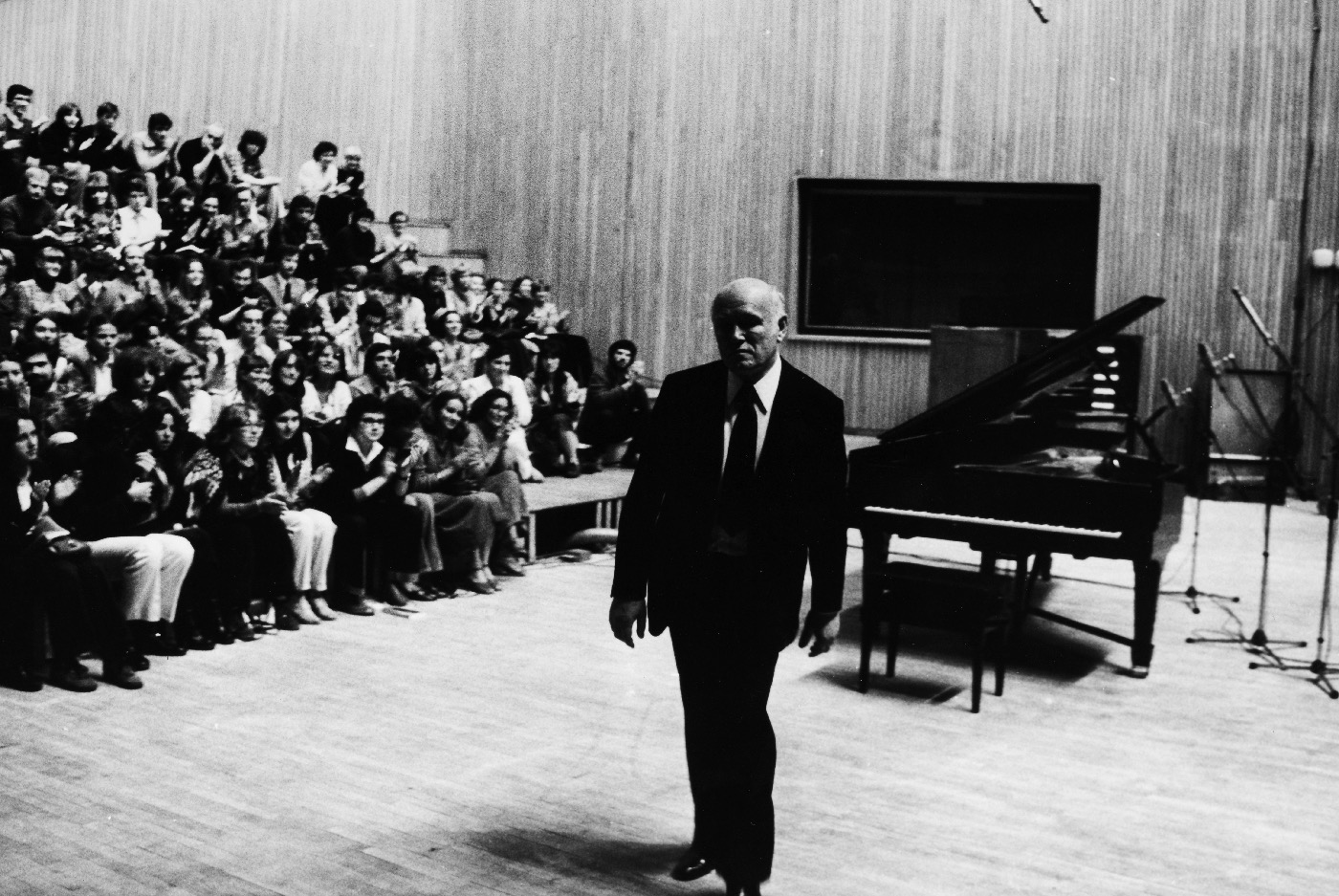

Sviatoslav Richter and the audience of a concert at the Academy of Music (now the F. Chopin University of Music) in Warsaw, photo by Jan Hausbrandt
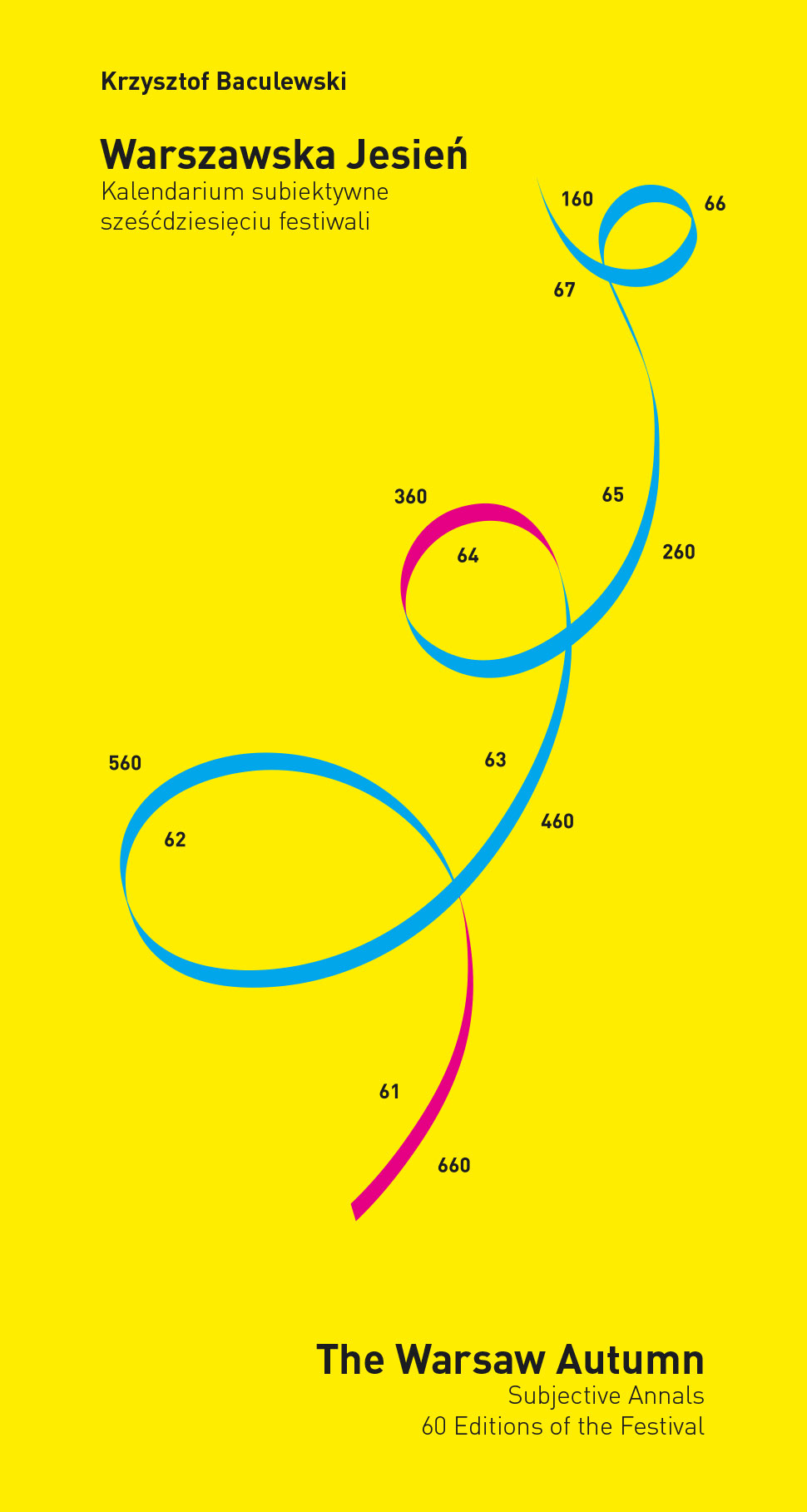

Krzysztof Baculewski "Subjective Annals 60 Editions of the Festival"
The inaugural concert featured Poetries by Kazimierz Serocki and Concerto lugubre by Tadeusz Baird, co-creators of the 'Warsaw Autumn', who both died in 1981. The Festival programme included the striking Exodus by Wojciech Kilar, String Quartet by Eugeniusz Knapik, Arabesque by Grażyna Pstrokońska-Nawratil, the sensational Harpsichord Concerto by Henryk Mikołaj Górecki with the soloist Elżbieta Chojnacka, as well as Krzysztof Penderecki's Symphony No. 2 (later referred to as the 'Christmas' Symphony because of a quotation from a carol). However, instead of the State Symphony Orchestra of Georgia from Tbilisi the Festival hosted the Orchestra of the State Conservatory of Moscow; the Soviet rulers could not bear the dedication to Mstislav Rostropovich in the commentary to a work by Valentin Silvestrov, which was to be included in the programme. During the next few years not only was it impossible to invite that artist to Warsaw, but even to print his name under the successive notes on compositions. John Tilbury's interpretation of Sonatas and Interludes by John Cage created a sensation. Ensemble de l'Itinéraire from Paris brought the first works by Gérard Grisey (Périodes) and Tristan Murail (Ethers), who at that time were not yet referred to as spectralists... ere were performances by cellist Roman Jabłoński, violinist Wanda Wiłkomirska, flutist Aurèle Nicolet, oboist Heinz Holliger, London Contemporary Dance Theatre, the Wilanów Quartet, the Silesian Quartet, the Budapest Symphony Orchestra conducted by György Lehel. An impressive debut by Paweł Buczyński with Muzyka opadających liści (Music of Falling Leaves), performed by the Polish Chamber Orchestra under Jerzy Maksymiuk.
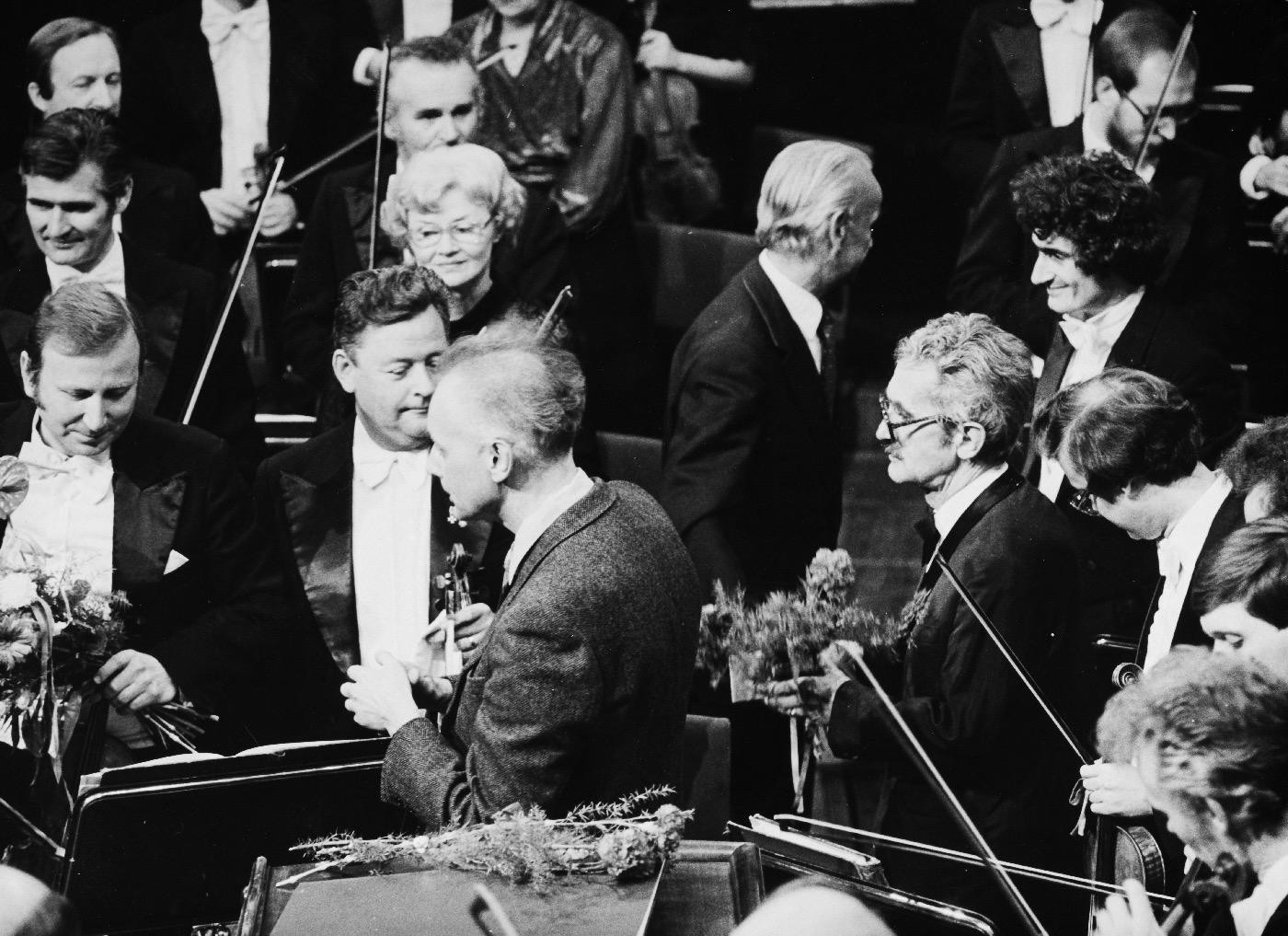

After a performance of “Exodus” by Wojciech Kilar at Warsaw Philharmonic. In the middle: the composer; above him on the right: Jacek Kaspszyk, Photo by Andrzej Glanda
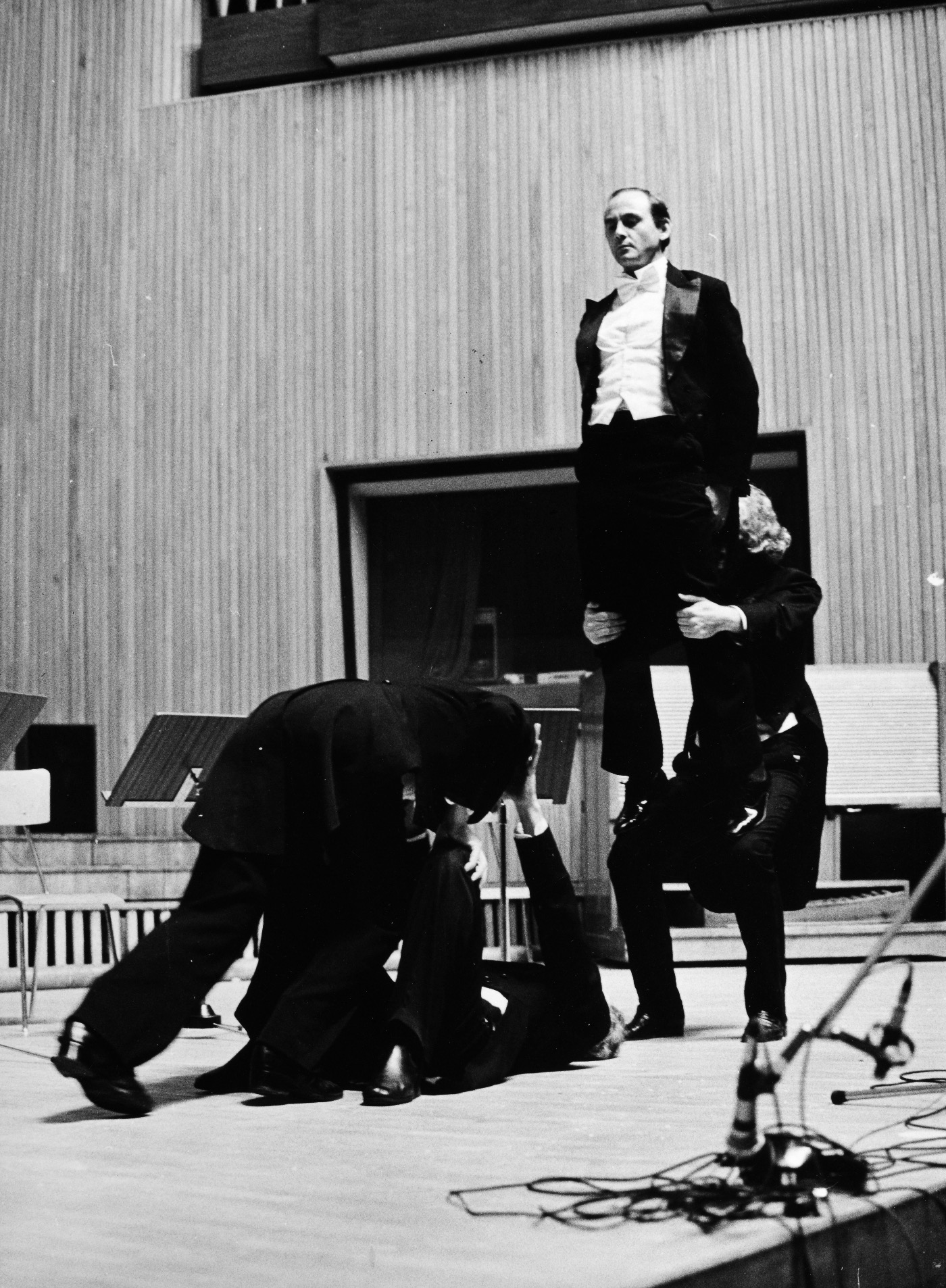

MW2 ensemble performing Bogusław Schaeffer’s “Quartet” for four actors at the Academy of Music (now the F. Chopin University of Music) in Warsaw, photo by Andrzej Glanda
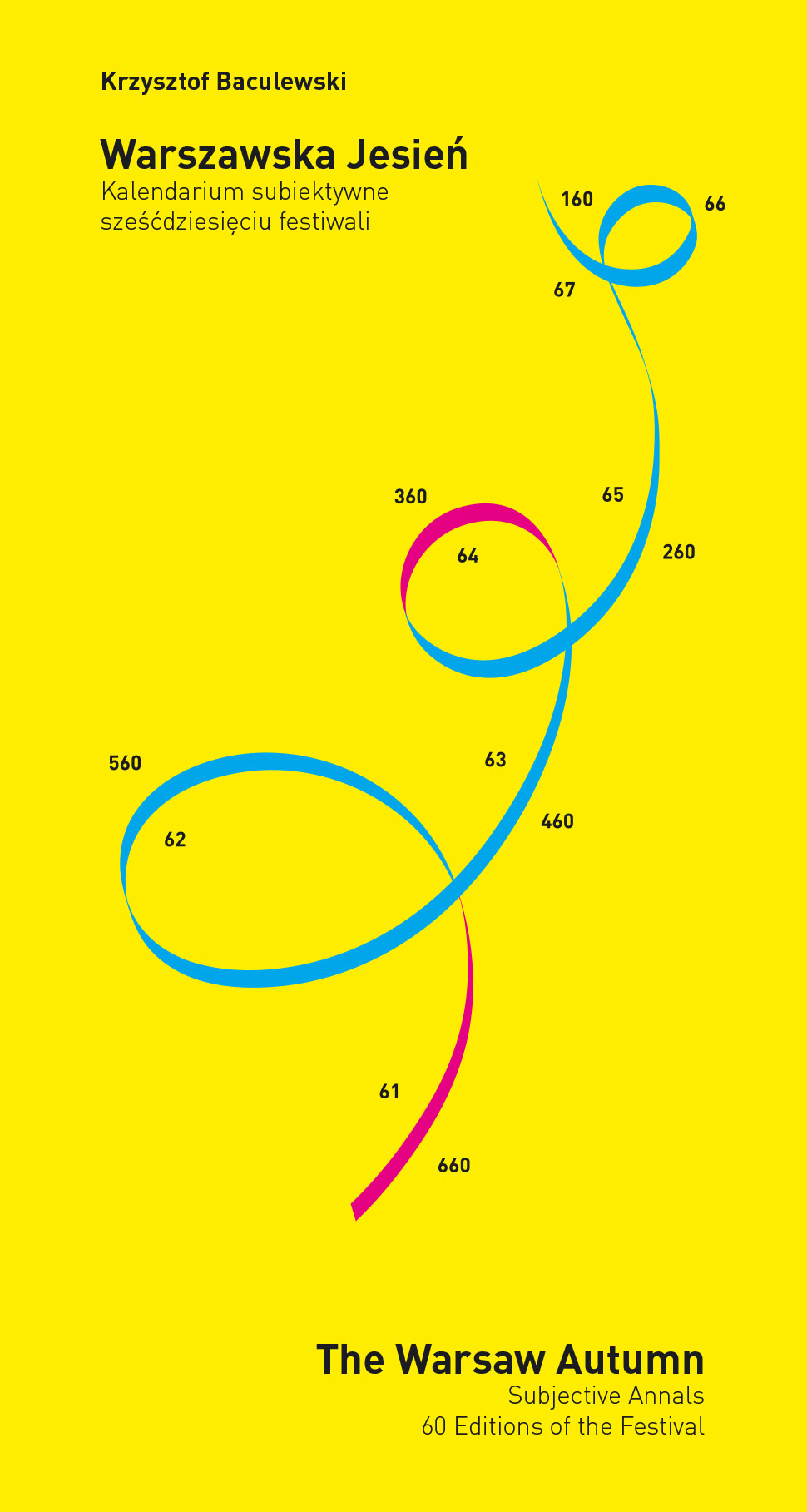

Krzysztof Baculewski "Subjective Annals 60 Editions of the Festival"
The first 25-year period of the 'Warsaw Autumn''s activity, which began in October 1956, came to an end with the imposition of the martial law on 13th December 1981. Although the musical community was not directly a ected by this, the suspension of telephone services and censorship of correspondence meant that contacts were broken o . The Polish Composers' Union was suspended, which meant it was deprived of the power to act; it came close to being delegalised and dissolved in the spring of 1982. In fact there were a number of musicians who would have approved of such a step, and a number of legally produced pamphlets were published promoting such action... However, the Management Board of the Union saved face and managed to preserve unity. In spite of political pressures, it cancelled the 1982 'Warsaw Autumn', and the authorities did not decide either to dissolve the Union or to take over the Festival. us a return to the tradition was not possible until 1983. However, the programmes were examined for their political aspects much more thoroughly than before. Accordingly, Andrzej Panufnik's Sinfonia votiva had to be removed from the programme, since censorship continued to have a suspicious attitude toward him. As a result of the political situation, and of the fact that the 'Warsaw Autumn' had dropped out of the calendar of international events, the Festival had to rely mainly on musicians from Poland and the other 'peoples' democracies'. However, even in that year a number of important events took place, such as the performance of Requiem by Edison Denisov with solos by Elżbieta Towarnicka (soprano) and Piotr Kusiewicz (tenor) at the opening concert, the opera Mannequins by Zbigniew Rudziński, a cycle of Violin Sonatas by Charles Ives (violinist Aureli Błaszczok and Eugeniusz Knapik as pianist), the opera Gamblers by Dmitri Shostakovich, which had been completed by Krzysztof Meyer (Wuppertaler Bühnen), a concert by the Arditti Quartet (including Tetras by Iannis Xenakis), as well as the first of the phenomenal Lithuanian oratoria-mysteries - Last Pagan Rites by Bronius Kutaviãius. Debuts by Lidia Zielińska (Taniec sobotni [Saturday Dance]), Edward Sielicki (Agnus Dei) and Rafał Augustyn (Violin Quartet No. 2 with flute ad libitum).
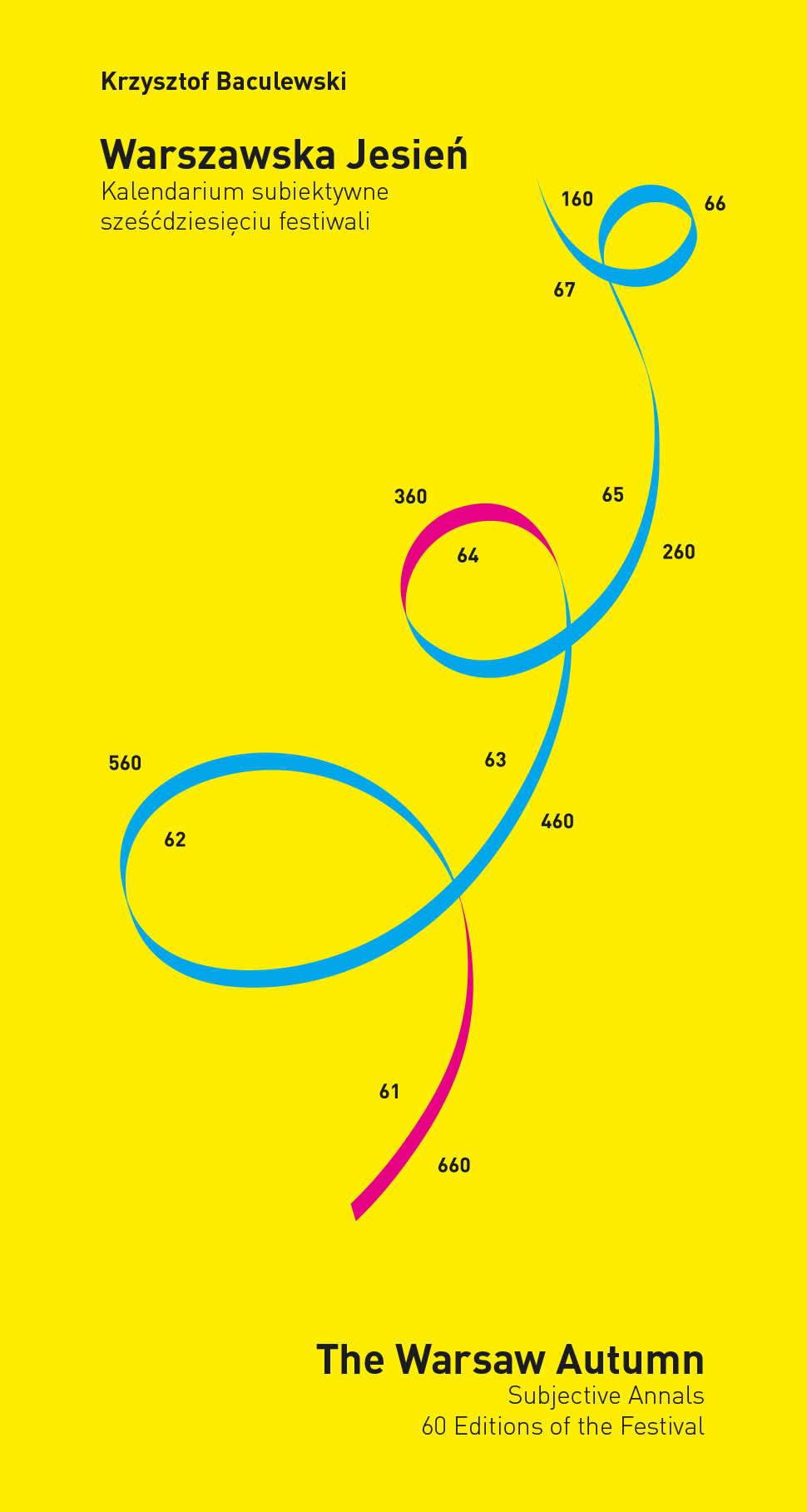

Krzysztof Baculewski "Subjective Annals 60 Editions of the Festival"
That year's Festival began with a memorable performance of Tout un monde lointain... by Henri Dutilleux for cello and orchestra (Wolfgang Boettcher replaced Mstislav Rostropovich), and ended with the first performance of Terra incognita by Włodzimierz Kotoński as well as a presentation of Symphony No. 3 by Witold Lutosławski, which had already achieved both o cial and uno cial fame (it was given an award by the delegalised underground 'Solidarity' Union for the year 1984). The Festival programme featured A Polish Requiem by Krzysztof Penderecki, the debut of Grażyna Krzanowska (String Quartet No. 2), Impresja kapryśna (Impression Caprice) by Stefan Kisielewski (absent from the 'Warsaw Autumn' programmes for the previous 21 years!), Wyspy (Islands) by Eugeniusz Knapik, Symphony No. 4 ('Polish Symphony') by Krzysztof Meyer, the first performance of Concerto for Orchestra by Andrzej Krzanowski; debuts by: Jacek Grudzień, Tadeusz Wielecki (Melodia z akompaniamentem / Melody with accompaniment); Stanisław Krupowicz with his piece for tape Music for S dedicated to the 'Solidarity', and a posthumous debut by Andrzej Bieżan with the tragic Isn't it (also for tape). Electroacoustic and computer music was now performed more frequently and began to play a more important role at the Festival (three concerts in 1984). Among the performers one should note the presence of a new trombone quartet from Stockholm - The New Culture Quartet, Italian pianist Bruno Canino; a superb concert by the Junge Deutsche Philharmonie conducted by Heinz Holliger, which included the Polish première of Chain I by Witold Lutosławski and a moving performance of Et exspecto resurrectionem mortuorum by Olivier Messiaena.
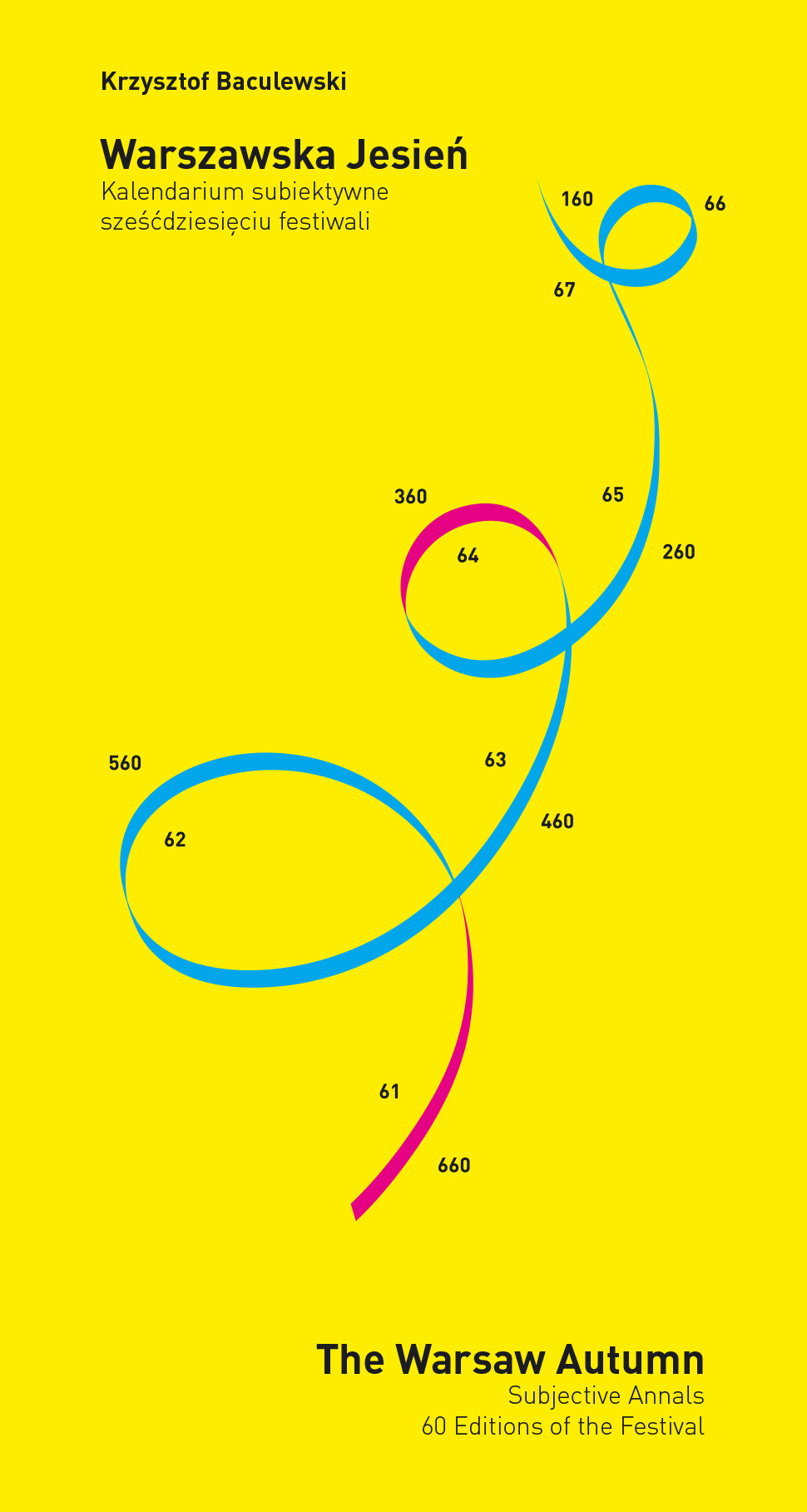

Krzysztof Baculewski "Subjective Annals 60 Editions of the Festival"
In the programme: Krzysztof Meyer's String Quartet No. 7; Andrzej Panufnik's Arbor cosmica, George Crumb's Ancient Voices of Children; François-Bernard Mâche's Styx and Lethe - peculiar compositions for piano, eight hands; a kind of minimal music by Henryk Mikołaj Górecki - Recitativa and ariosa 'Lerchenmusik'; a concert by IRCAM; a great cycle of orchestral songs A Life's Parallels II by Rafał Augustyn. But above all, this was the year of György Ligeti's music. The Warsaw audience could hear, among others, his string quartets, Trio, Rami cations and Atmosphères, Lux aeterna and a number of other choral works, as well as his first piano Études , including one dedicated to the 'Warsaw Autumn'. ere were performances by: Mexican flutist Marielena Arizpe, German clarinettist Eduard Brunner and pianist Herbert Henck, the Niedersächsische Staatsoper from Hanover and the Choir of the Süddeutscher Rundfunk from Stuttgart, The Presidential Orchestra from Ankara, RTV Symphony Orchestra from Ljubljana conducted by Anton Nanut and Ensemble intercontemporain under Arturo Tamayo from Paris.
The flutist Marielena Arizpe added to her programme an extra composition: Lamento by Maria Lavista. The performance was dedicated to the memory of the victims of the earthquake that on the very same day (19th September) had affected her country, including the soloist's home city - Mexico City.
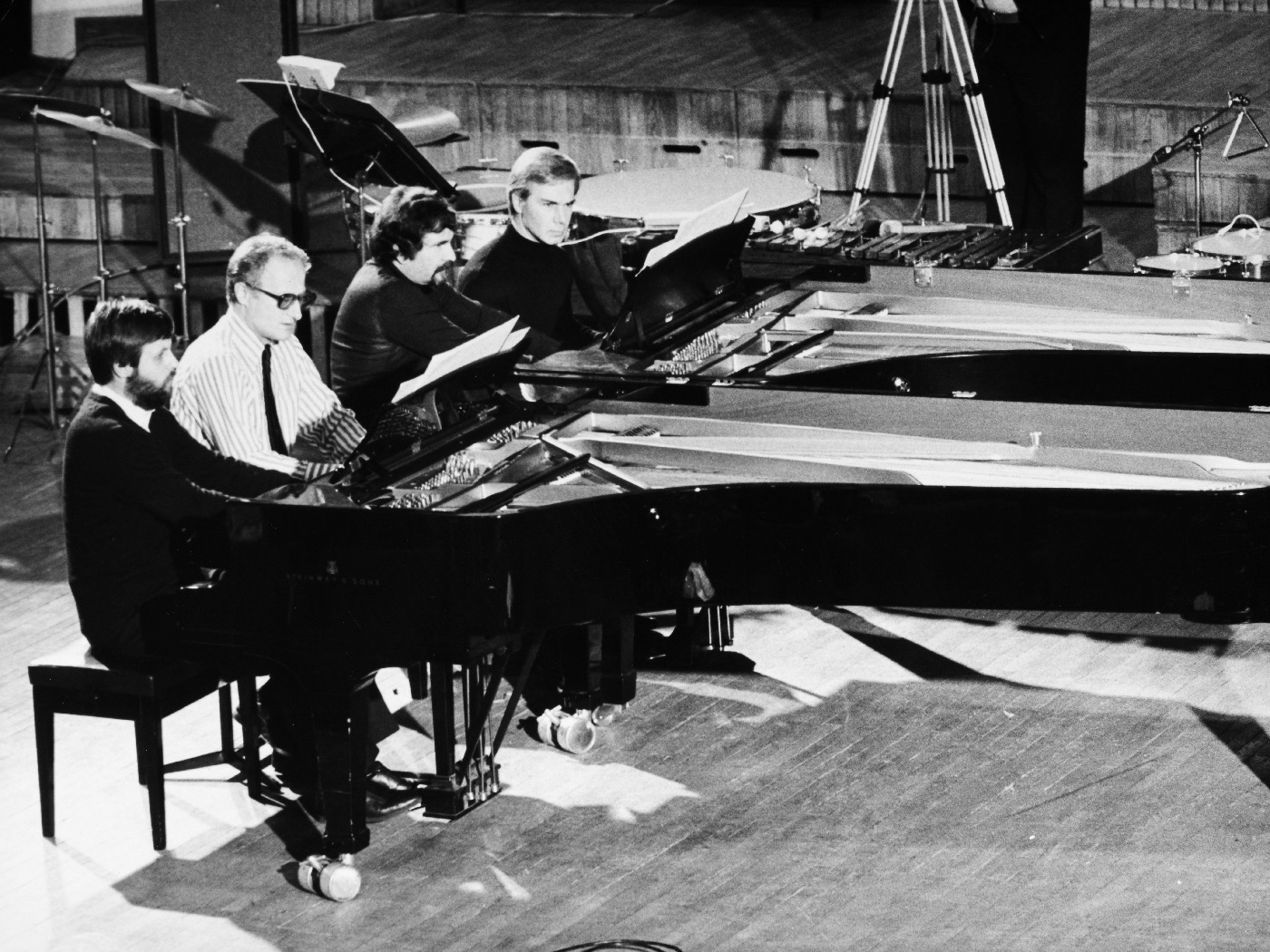

Eugeniusz Knapik, Krzysztof Meyer, Andrzej Dutkiewicz and Szabolcs Esztényi performing a piece by François-Bernard Mâche for 2 pianos, 8 hands at the Academy of Music (now the F. Chopin University of Music) in Warsaw, photo by Andrzej Glanda
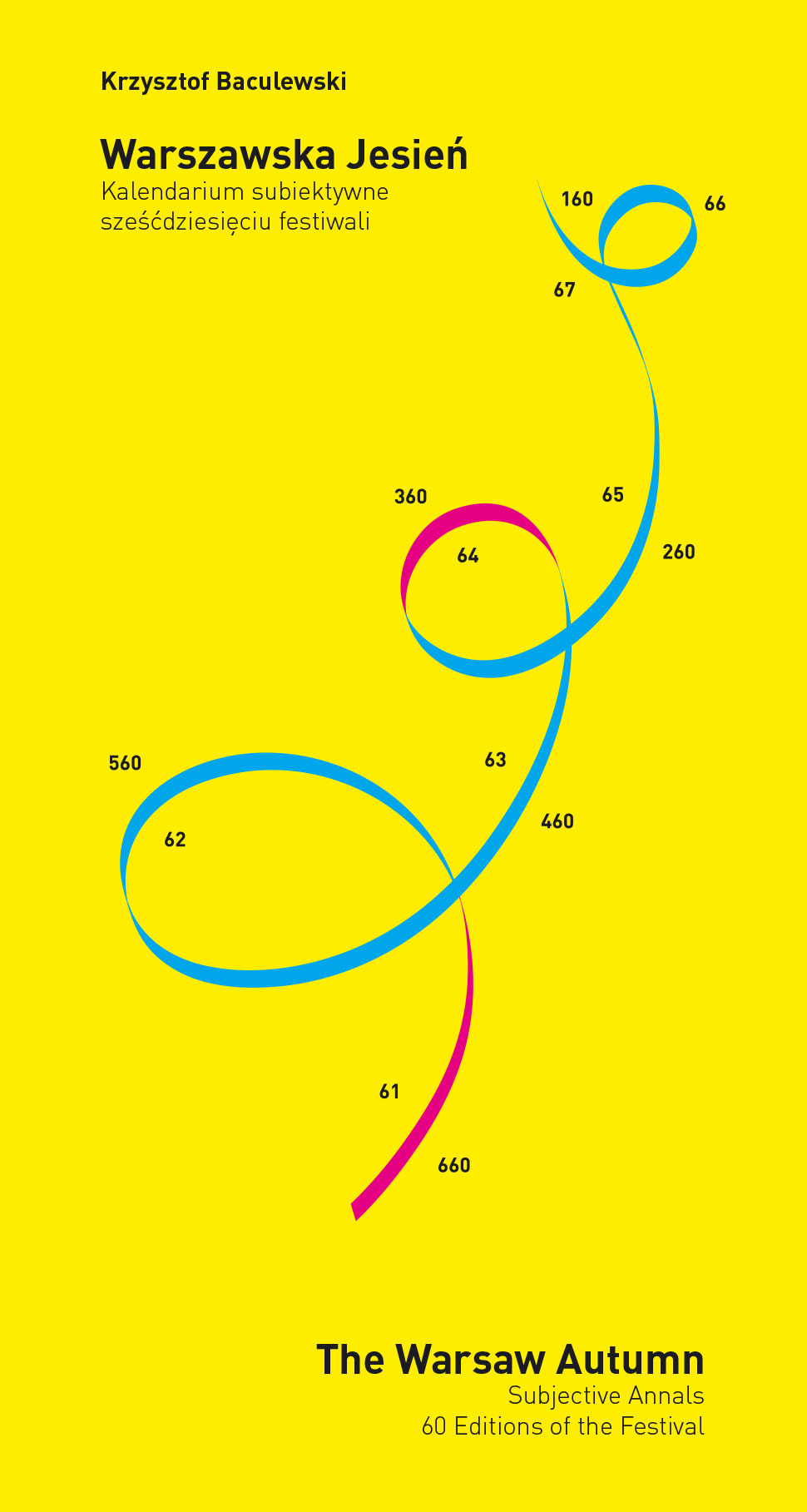

Krzysztof Baculewski "Subjective Annals 60 Editions of the Festival"
This was the year of Carter, Elliott Carter. 'Warsaw Autumn' audiences had the opportunity to get acquainted with A Symphony of ree Orchestras, the choral piece To Music, Timpani Pieces for solo kettledrums (sic!), Triple Duo and Night Fantasies for piano. ere were also the debuts of Anna Zawadzka (Girare for tape and percussion) and Magdalena Długosz (Pulsations for tape), Sławomir Olszamowski and Wiesław Rentowski as well as Hanna Kulenty (Ad unum). In the programme: A Haunted Landscape by George Crumb, Clarinet Concerto and Symphony No. 1 by Isang Yun, Narodzenie (Birth) for choir and orchestra by Zbigniew Bujarski, Symphony No. 2 (Concertante) by Aleksander Lasoń, Symphony No. 4 by Giya Kancheli, Eufonia (Euphony) by Tomasz Sikorski, four vocal cycles by György Kurtág, Symphony No. 2 by Andrzej Krzanowski, Shaker Loops by John Adams and the first performance of Pozdraveni (Salutations) by Marek Kopelent. ere were also recitals by the Canadian flutist Robert Aitken, pianist Szabolcs Esztényi, harpsichord player Elżbieta Chojnacka, three concerts of tape music, performances by Ensemble Modern, Speculum Musicae, Schola Cantorum Gedanensis choir and - as usual - Polish ensembles and orchestras.
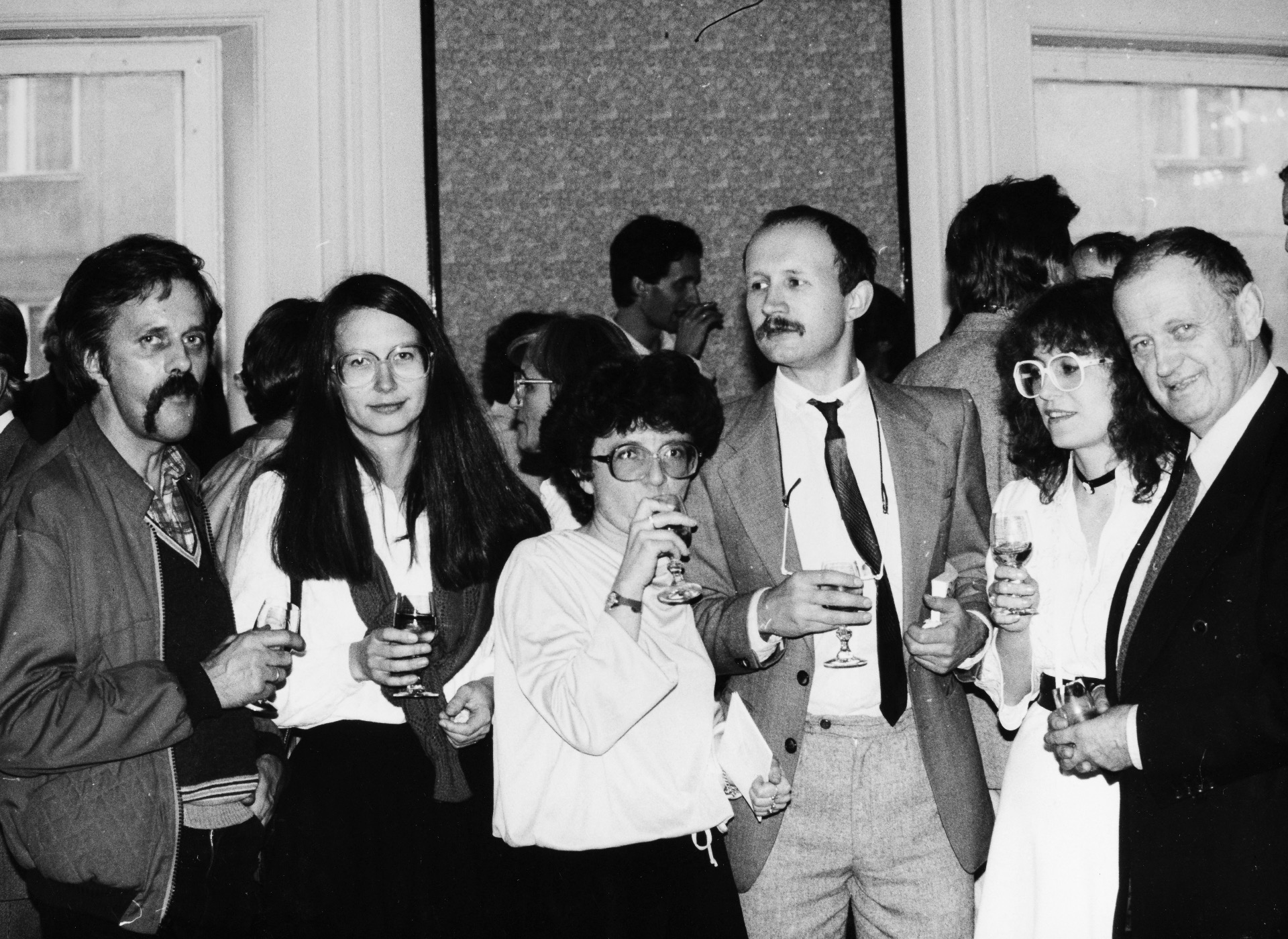

Inauguration of the Warsaw Autumn festival in the foyer of Warsaw Philharmonic. In the foreground, left to right: Edward Kulka, Martina Homma, Jolanta Bilińska, Rafał Augustyn, Danuta Gwizdalanka (Meyer), and Augustyn Bloch, photo by Andrzej Glanda
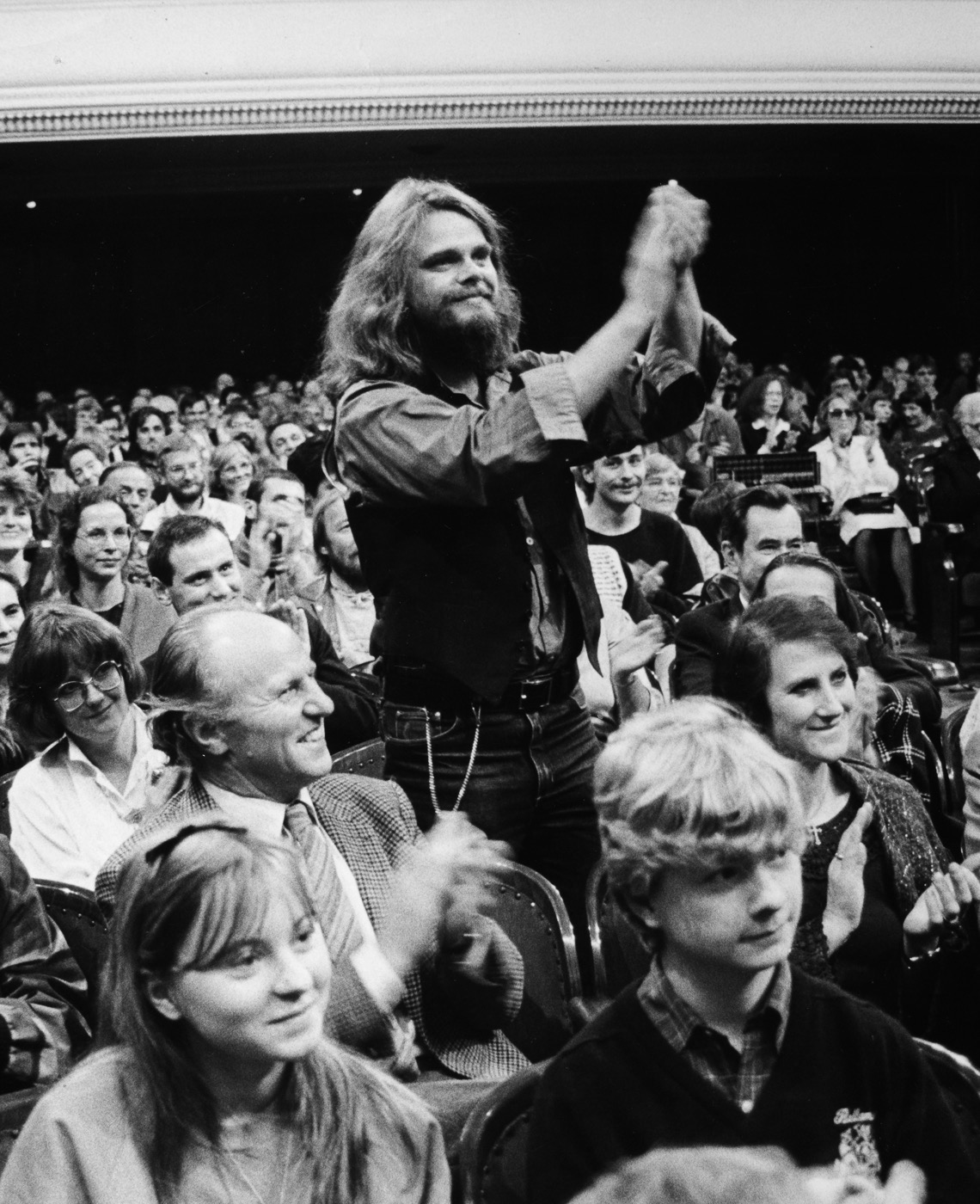

After the performance of Paweł Szymański’s “Partita III” at Warsaw Philharmonic. The composer in the centre of the photo. Author of the photo – unknown.
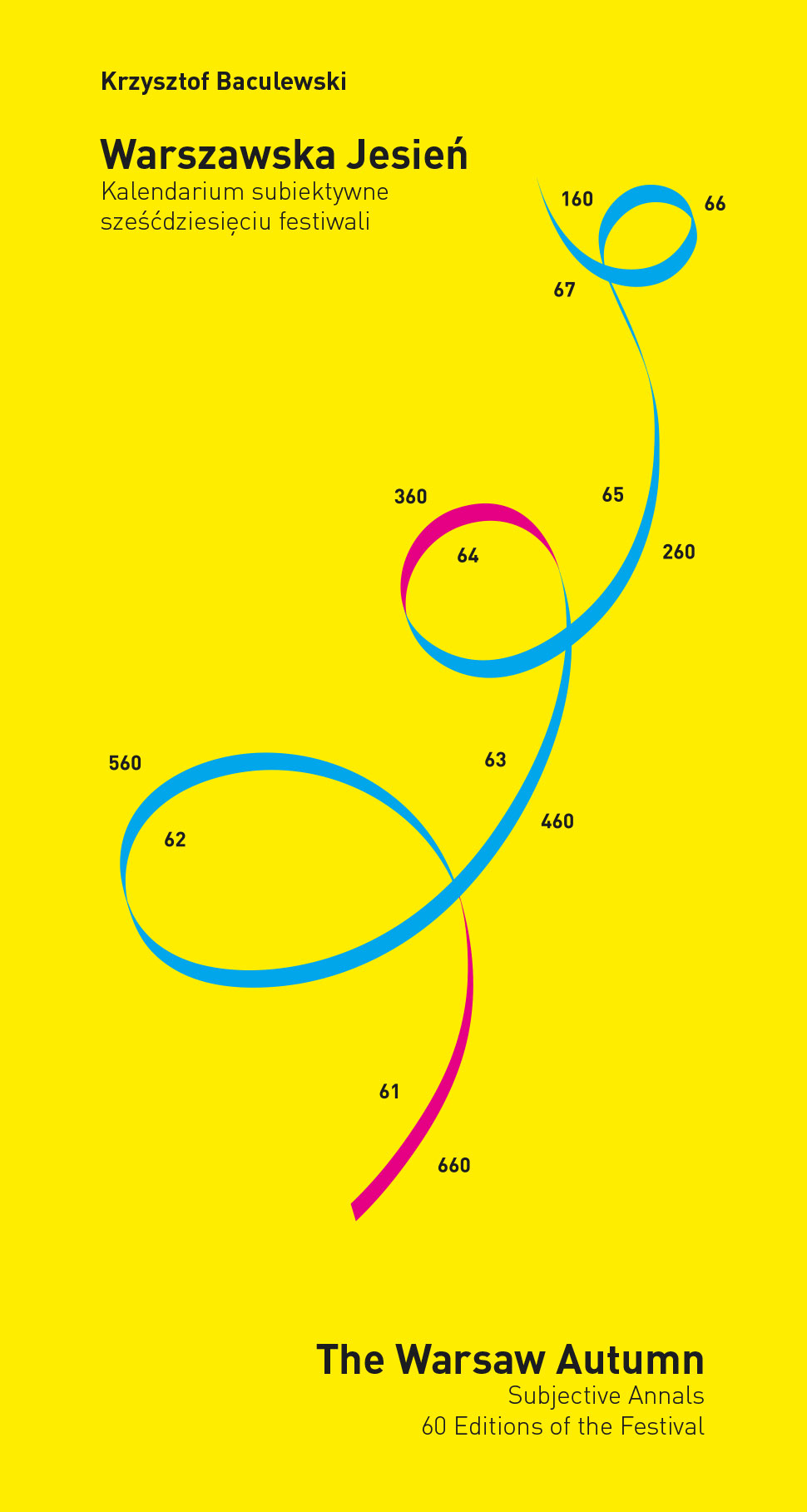

Krzysztof Baculewski "Subjective Annals 60 Editions of the Festival"
The Festival began with O ertorium, a Violin Concerto by So a Gubaidulina (Gidon Kremer) and Sinfonia di speranza by Andrzej Panufnik. The programme included: Dérive by Pierre Boulez, Cantiones e circulo gyrante by Klaus Huber, Musica da camera for string quartet by Jan Krenz, orchestral Horos and choral Nuits by Iannis Xenakis, as well as Cinq rechants by Olivier Messiaen (Groupe Vocal de France), Passionato by Władysław Słowiński, Słysz, Boże, wołanie moje (Hear, oh God, My Call) by Andrzej Nikodemowicz (alto - Jadwiga Rappé), two concerts of Groupe de Recherches Musicales from Paris with the saxophonist Daniel Kientzy, two performances by Institut für Neue Musik der Staatlichen Hochschule für Musik Freiburg, a concert by Neue Vocalsolisten from Stuttgart, as well as one of the last still unpresented items from the historical backlog: A Sermon, a Narrative and a Prayer by Igor Stravinsky.
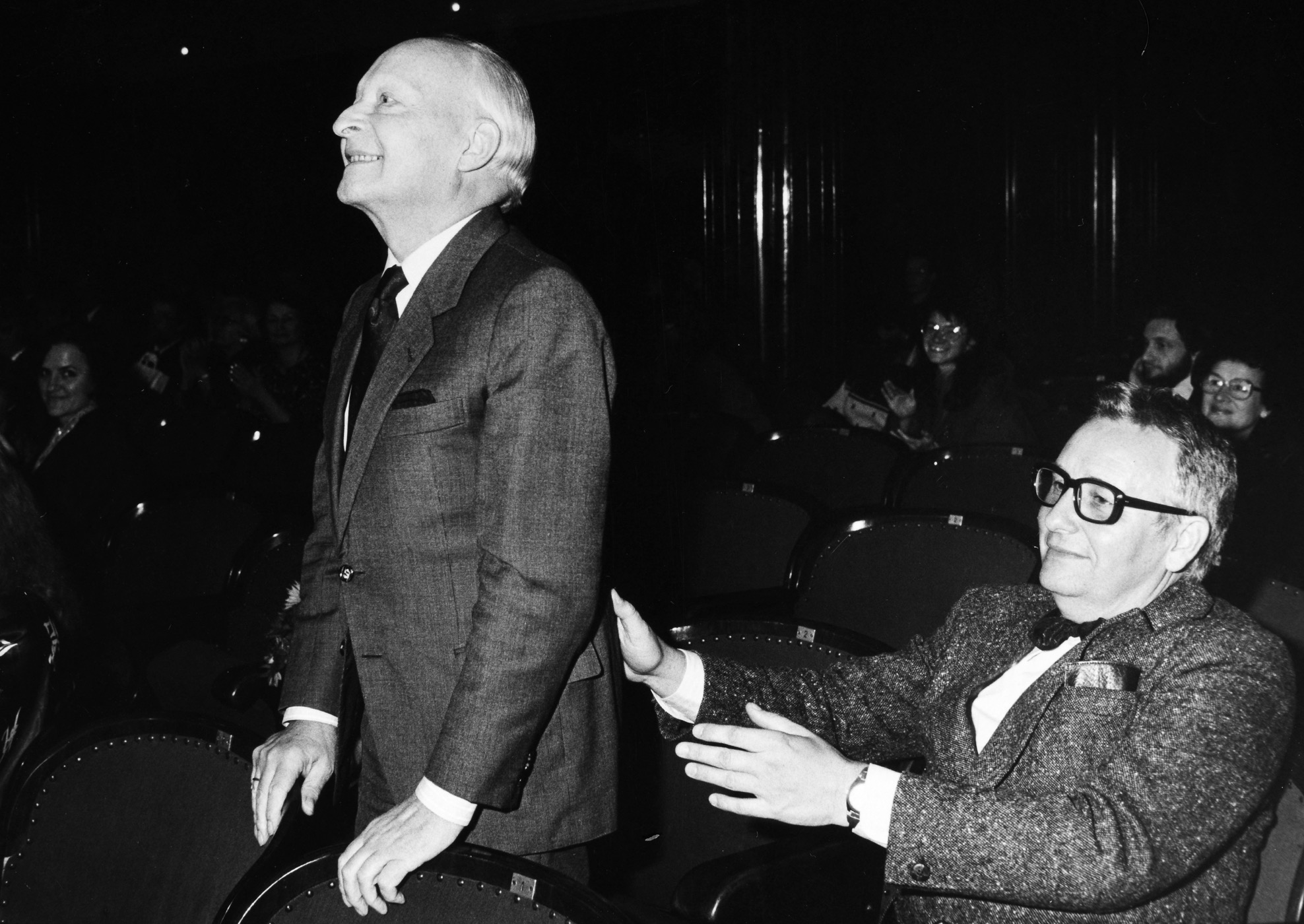

Witold Lutosławski and Henryk Mikołaj Górecki at Warsaw Philharmonic, photo by Włodzimierz Echeński
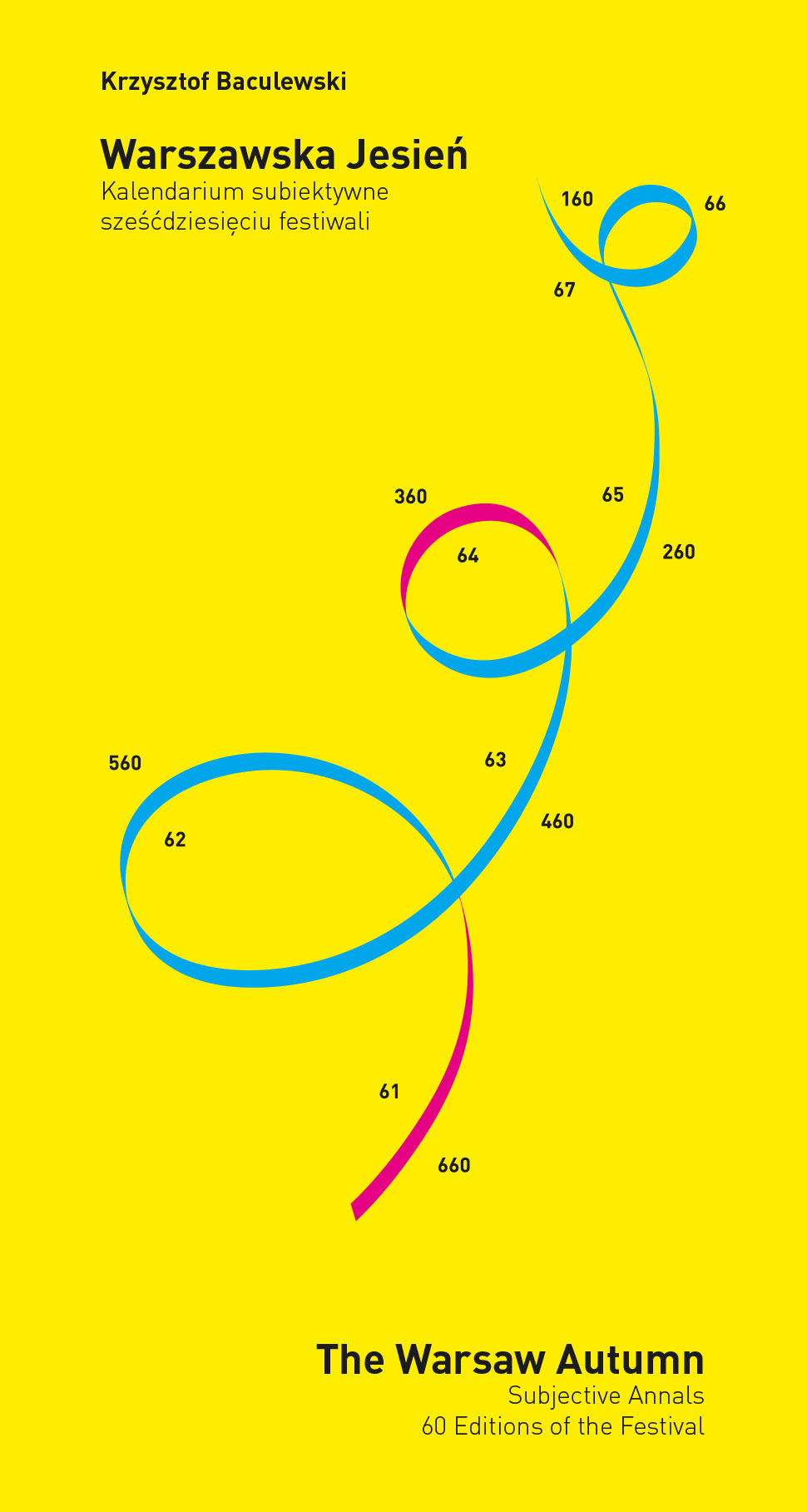

Krzysztof Baculewski "Subjective Annals 60 Editions of the Festival"
Works for piano with orchestra were the highlights of this Festival. To start with, Keqrops by Iannis Xenakis with Roger Woodward, then Piano Concerto by György Ligeti with Volker Ban eld, and Piano Concerto by Witold Lutosławski with Krystian Zimerman at the end. ere were also three opera spectacles: the Grand Theatre put on Penderecki's e Black Mask, Warsaw Operetta played host to the Opera Theatre from Poznań with a performance of the same work, and the Dramatyczny Theatre provided the venue for Wrocław Opera's production of Nowe Wyzwolenie (New Liberation) by Krzysztof Baculewski. Other works included Roman Palester's Symphony No. 5 and the classics of avant-garde: Karlheinz Stockhausen with the composition Spiel, Luigi Nono with A Carlo Scarpa..., Post-prae-ludium Donau, Risonanze erranti... and Quando stanno morendo, also known as Diario Polacco N. 2. Furthermore, Pierre Boulez with the complete cycle of Pli selon pli and explosantexe... Zbigniew Bagiński made his debut with Sinfonia notturna. Herbert Henck's recital of Les Heures Persanes by Charles Koechlin (who had died in 1950) should be noted as a kind of curiosity; the performance was accompanied by a projection of pictures by Dietmar Keilitz.
The Repertoire Committee was chaired by Olgierd Pisarenko (until 1995).
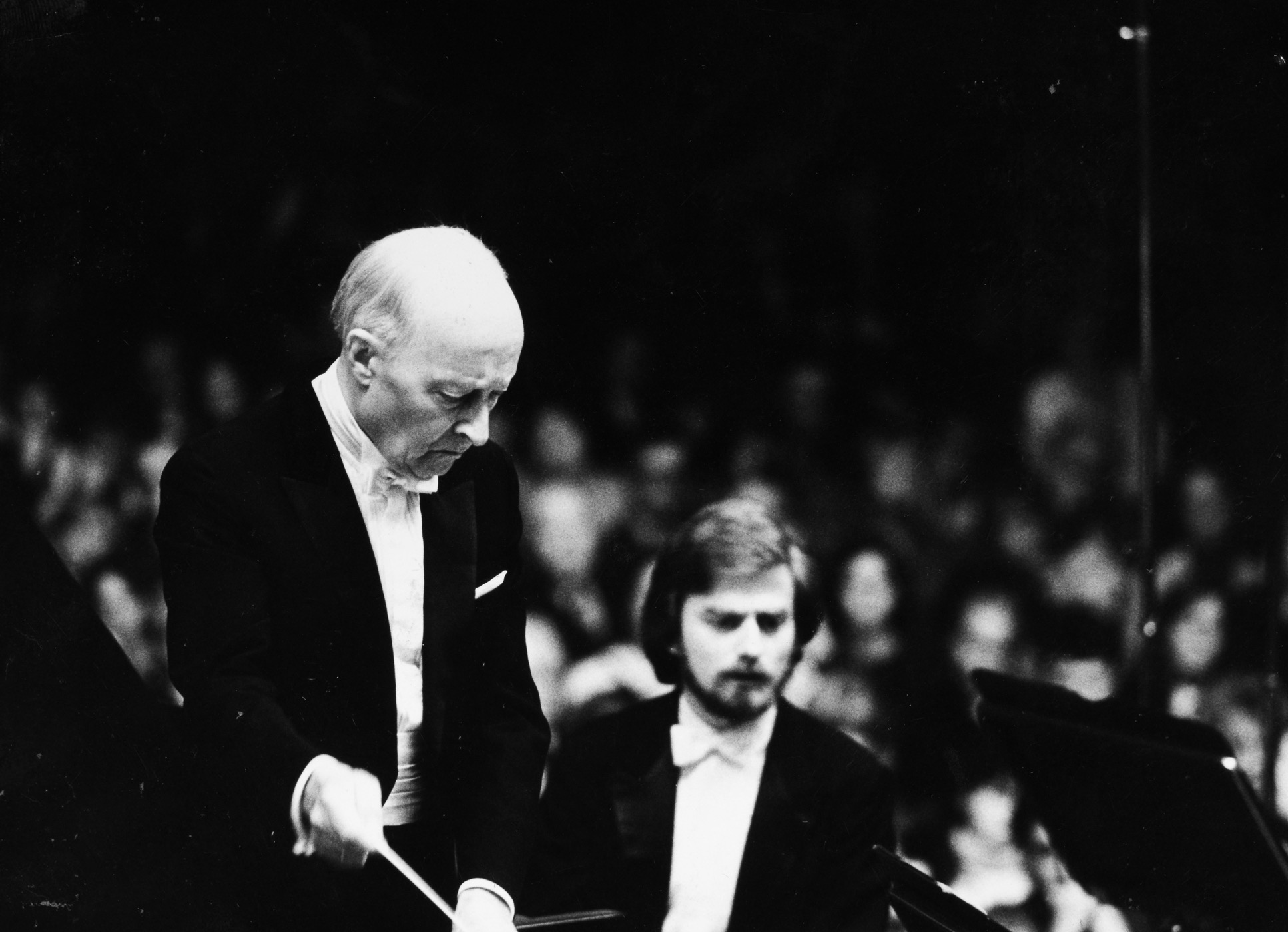

Witold Lutosławski and Krystian Zimerman Górecki at Warsaw Philharmonic during a performance of Lutosławski’s “Piano Concerto” under the composer’s own baton, photo by Andrzej Glanda
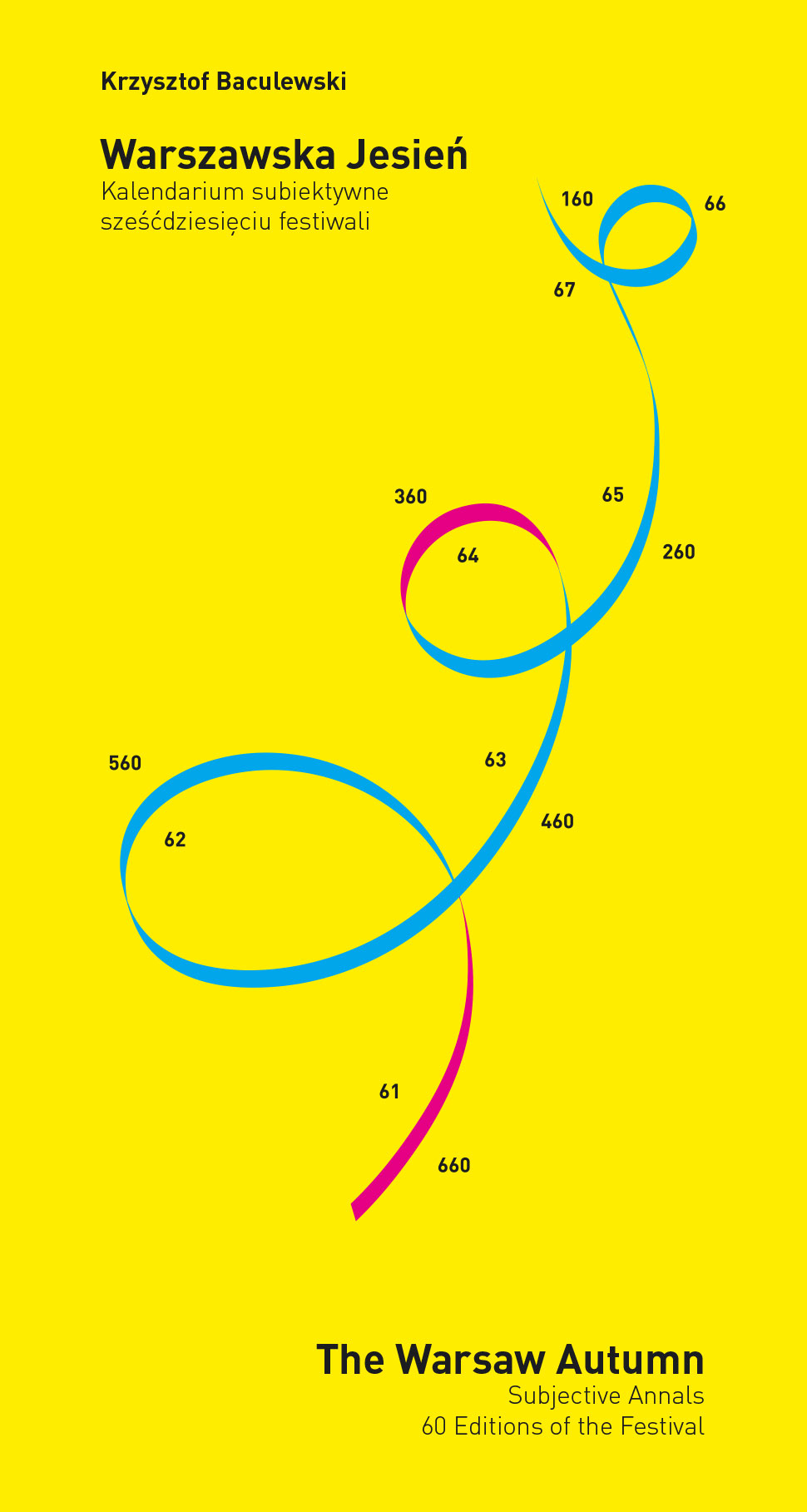

Krzysztof Baculewski "Subjective Annals 60 Editions of the Festival"
This was the first 'Warsaw Autumn' after the change of political system in Poland, but designed and planned still in the 'old' reality. The Festival opened with some rather curious points: Memory by Marek Kopytman and Cosmos I by Stefan Kisielewski juxtaposed with the Sinfonia Mistica by Andrzej Panufnik. The finale concert featured a monumental concert performance of excerpts from Olivier Messiaen's opera Saint-François d'Assise (cond. Antoni Wit). The performance was attended by the composer himself, visiting Poland for the first time; he assisted at the rehearsals in Katowice and then came to Warsaw. The present writer, as a pupil of Messiaen's, was entrusted by the PCU with the job of interpreter and carer to the 81-year-old composer during his stay in Poland. The first year of independent Poland also brought a performance of Katyn Epitaph by Andrzej Panufnik, dedicated to the memory of more than twenty thousand Polish prisoners-of-war murdered by the Soviet authorities in 1940. The programme also included Fresco by Krystyna Moszumańska-Nazar, Stabat Mater (and a number of other works) by Arvo Pärt, a monographic concert dedicated to Giacinto Scelsi (who was just being discovered), and another one to the memory of Tomasz Sikorski, who had died a year earlier; Rappel II by Elżbieta Sikora for orchestra and SYTER sound transformation system. Stanisław Moryto made his debut with Per uno solo for percussion. Another premiere was the presentation of studies for player piano by Conlon Nancarrow.
Owing to the organisational and nancial problems experienced by 'Polskie Nagrania' - the record company that had produced the 'Sound Chronicles of Warsaw Autumn' on LPs, the PCU decided to end its collaboration with this state monopoly and began independent production of the 'Sound Chronicles' on cassettes.
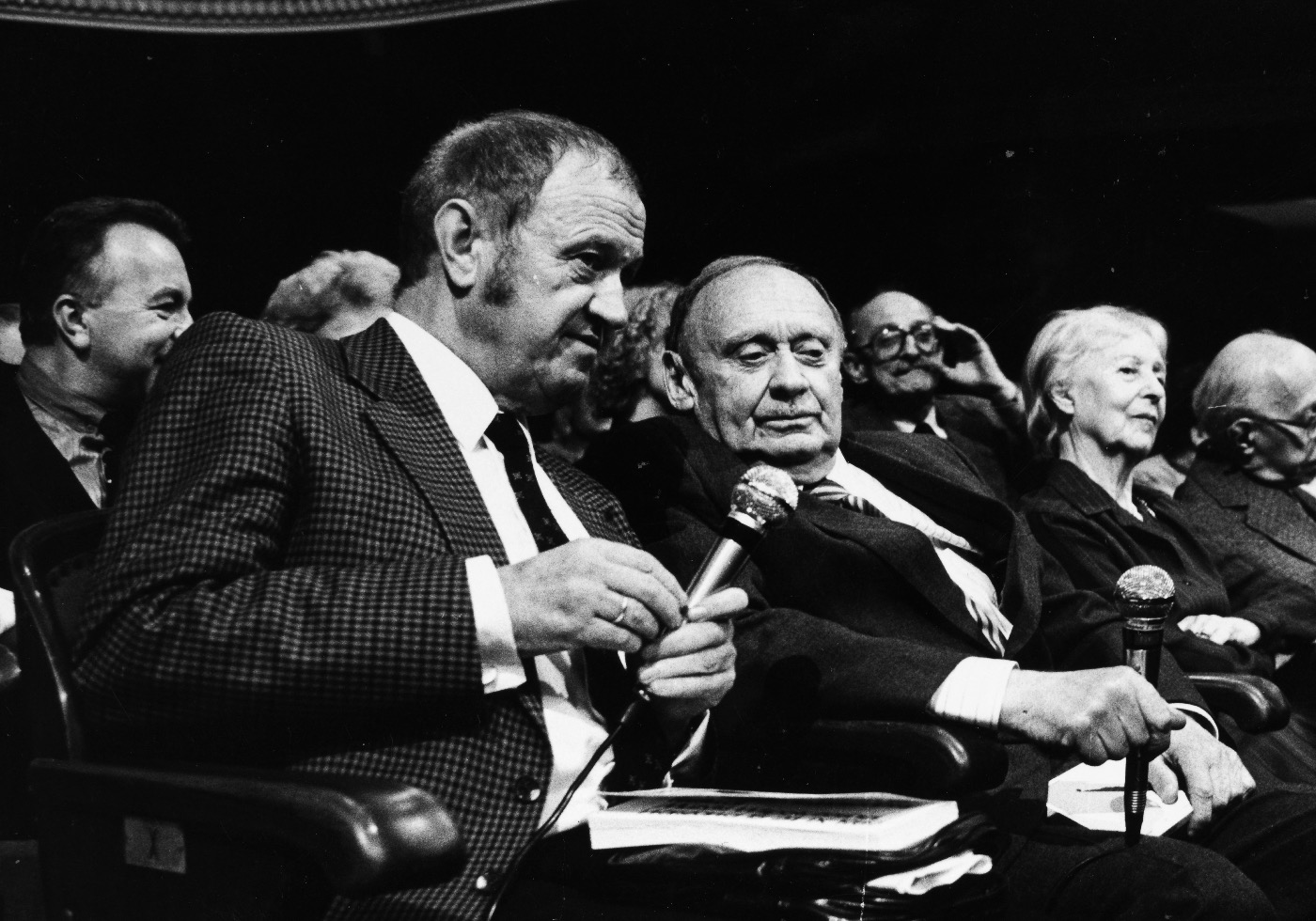

In the forefront on the left: Jerzy Waldorff at a Warsaw Autumn concert in 1989, photo by Włodzimierz Echeński
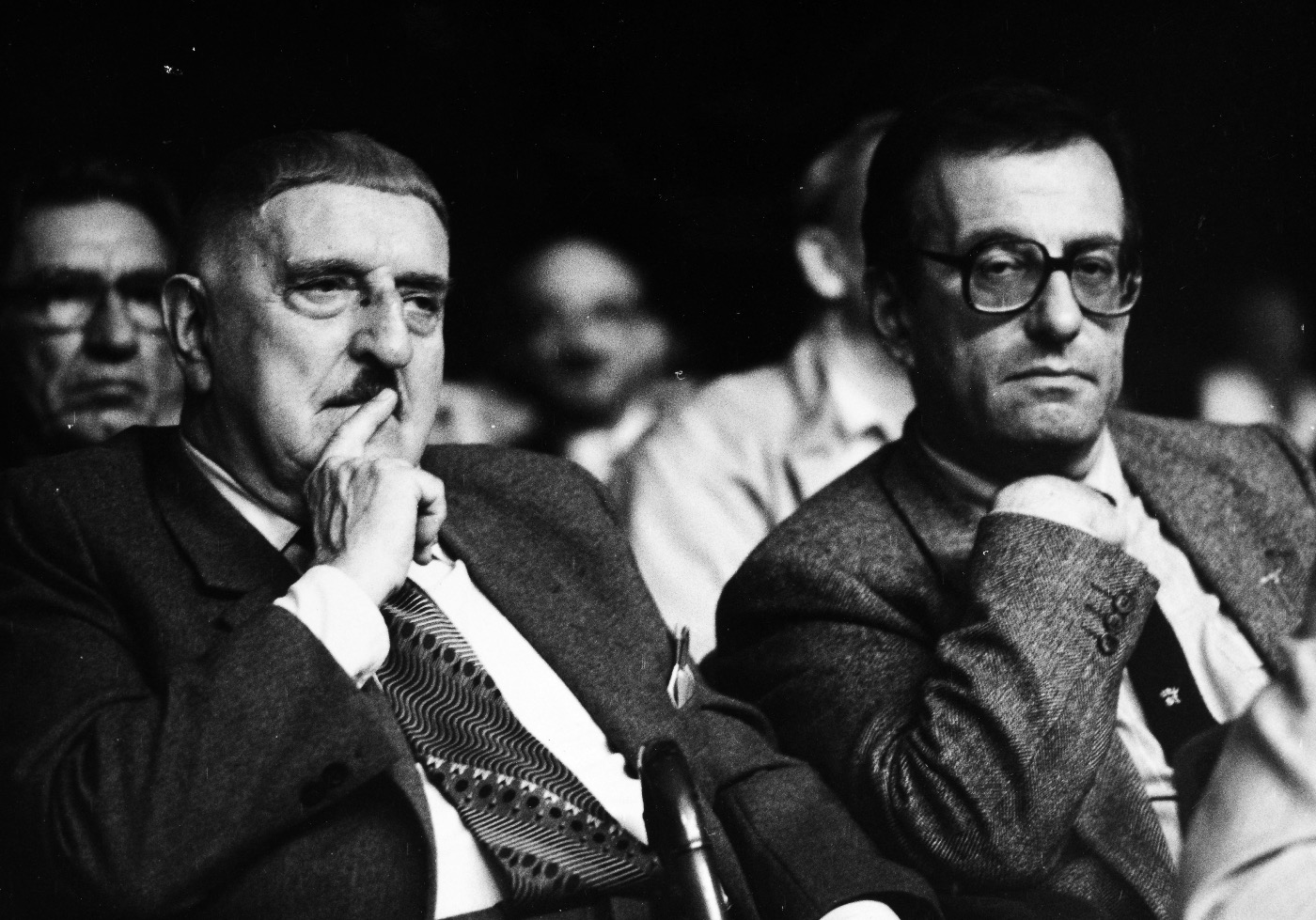

In the forefront, left to right: Augustyn Bloch and Stefan Kisielewski as commentators at a Warsaw Autumn concert in 1989, photo by Włodzimierz Echeński
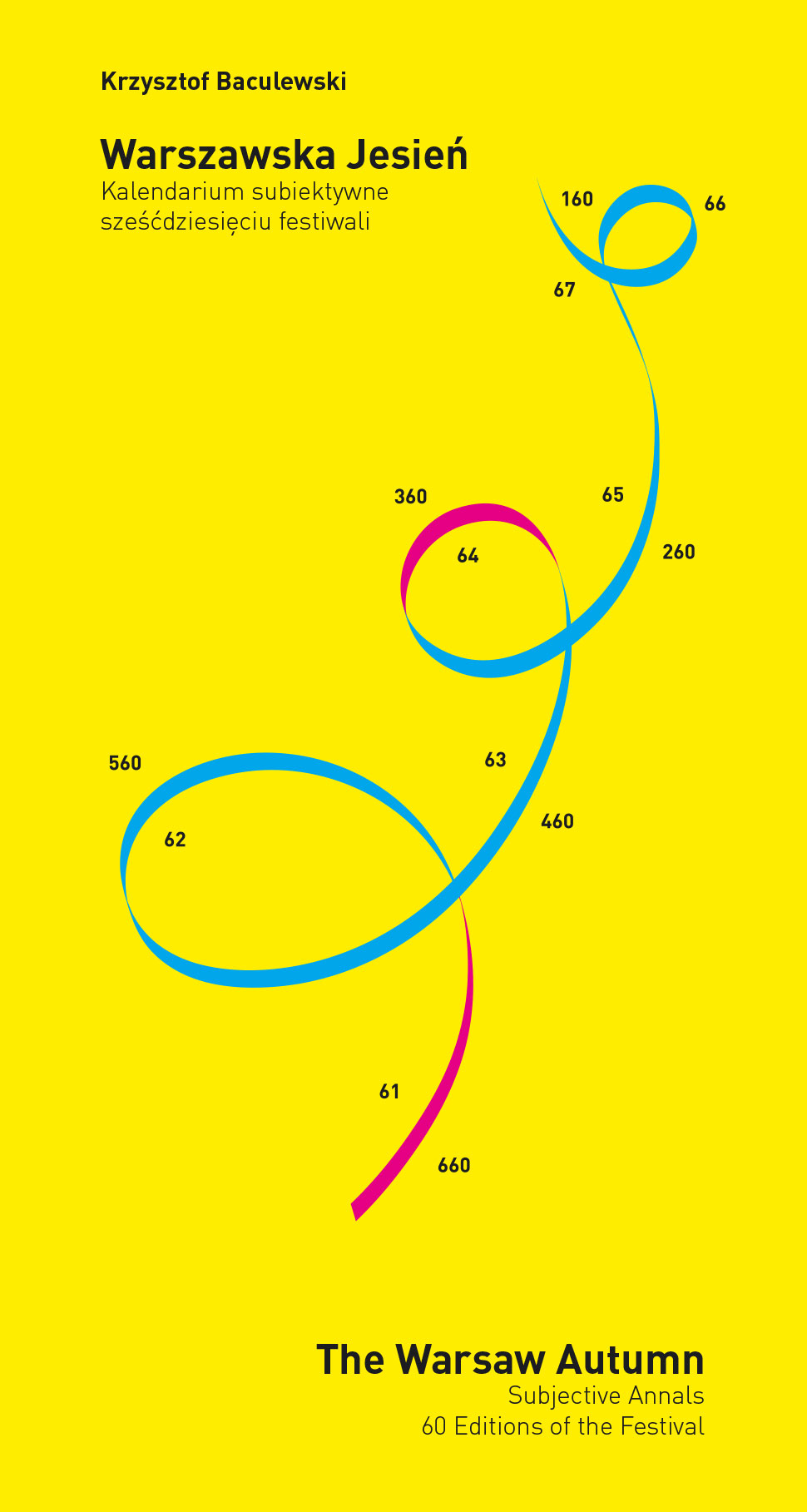

Krzysztof Baculewski "Subjective Annals 60 Editions of the Festival"
This was the year of Andrzej Panufnik. The composer came to Warsaw for the first time since leaving Poland in 1954. Eleven of his compositions were performed on this occasion, including Tragic Ouverture, Piano Concerto, Violin Concerto No. 2, String Quartet No. 2, Pentasonata and Krąg kwintowy (Circle of Fifths - 12 Miniature Studies). This was a gesture of recognition toward the Polish composer, of whom Polish audiences were largely unaware, meant to restore his works to Polish culture and compensate him for the (mainly moral) wrongs he su ered after his emigration, when he was denounced as a traitor and his name disappeared from encyclopaedias and lexicons.
The second protagonist of that Festival was George Crumb, with Night of the Four Moons, Black Angels, Star-Child and four other works. The third important guest was Mauricio Kagel, whose two works for a salon orchestra (!), String Quartet No. 3 and Musik für Tasteninstrumente und Orchester were performed during the Festival. Other significant events included performances of the cycle 32 Duetti per violini by Luciano Berio and the complete Drumming by Steve Reich.
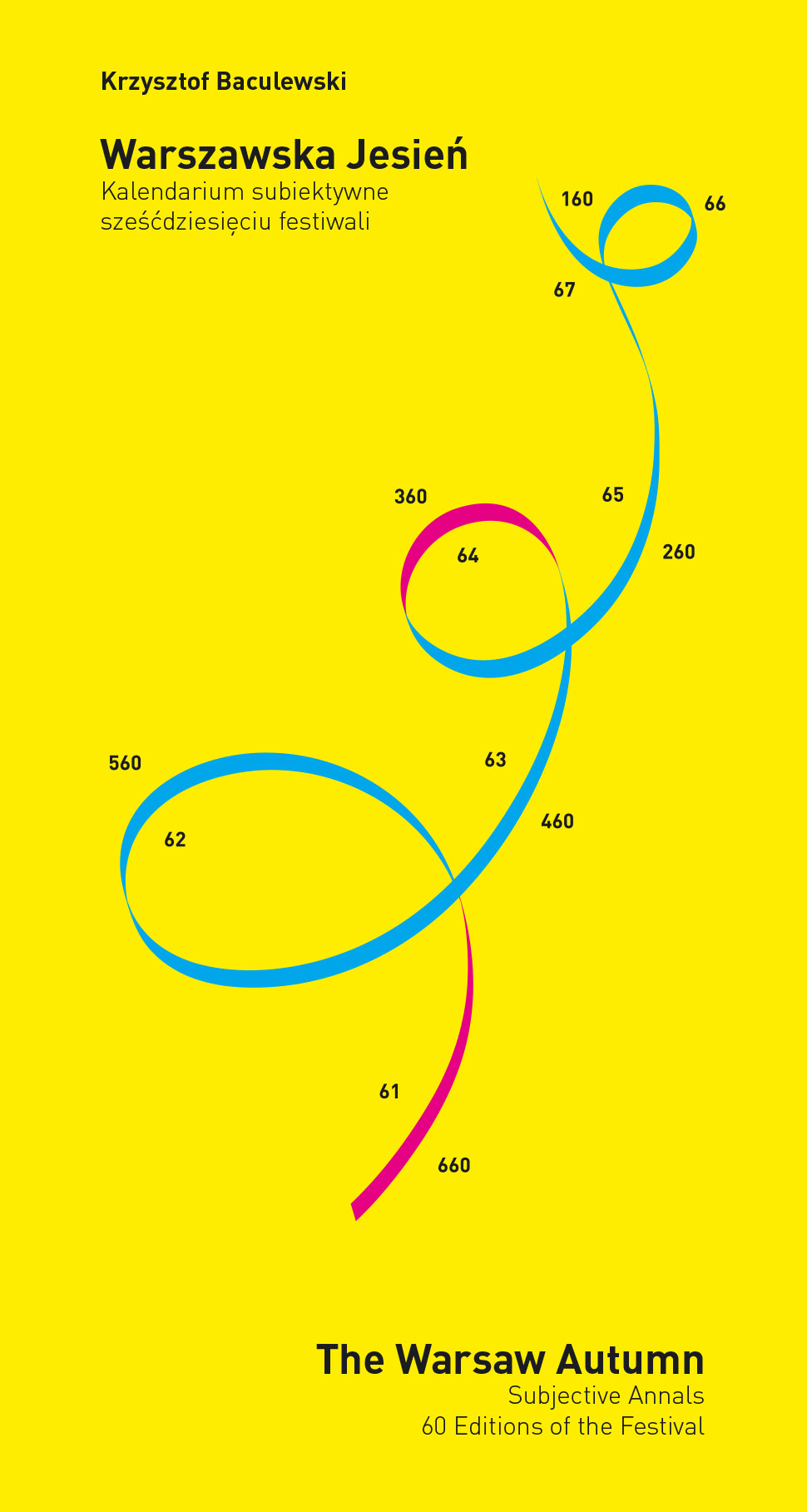

Krzysztof Baculewski "Subjective Annals 60 Editions of the Festival"
The Festival opened with a concert conducted by Krzysztof Penderecki, featuring music by Andrzej Krzanowski, Marek Stachowski and Dmitri Shostakovich. The programme consisted of compositions to texts by Samuel Beckett; two Cascando settings: by Charles Dodge and Lidia Zielińska, as well as the chamber opera Come and Go by Heinz Holliger, familiar to the audience from his earlier appearances at the 'Warsaw Autumn' as oboist and conductor. A monographic concert was dedicated to Luigi Nono; Stefan Kisielewski's Piano Concerto was premiered (the composer died three days later; he listened to his Concerto on the radio in hospital), and Witold Lutosławski's Chante eurs et Chantefables was first performed in Poland (Solveig Kringlebotn, soprano). We played host to: Camerata Bern, Schönberg Ensemble, the 'Amadeus' Chamber Orchestra under Agnieszka Duczmal, Concerto Avenna led by Andrzej Mysiński, as well as Sinfonia Varsovia conducted by Grzegorz Nowak. Among the soloists, there were: cellist Andrzej Bauer, violinists Saschko Gawrilo and Barbara Górzyńska, pianists Volker Baneld, Marek Drewnowski and Zygmunt Krauze. This edition of the 'Warsaw Autumn' was also a festival of choirs and vocal ensembles, with performances by The Poznań Boys' Choir (dir. Wojciech Krolopp), the BBC Singers under Simon Joly, Neue Vokalsolisten from Stuttgart, Schola Cantorum Gedanensis under Jan Łukaszewski, the Choir of Silesian Philharmonic, RIAS-Kammerchor Berlin and Südfunk-Chor from Stuttgart.
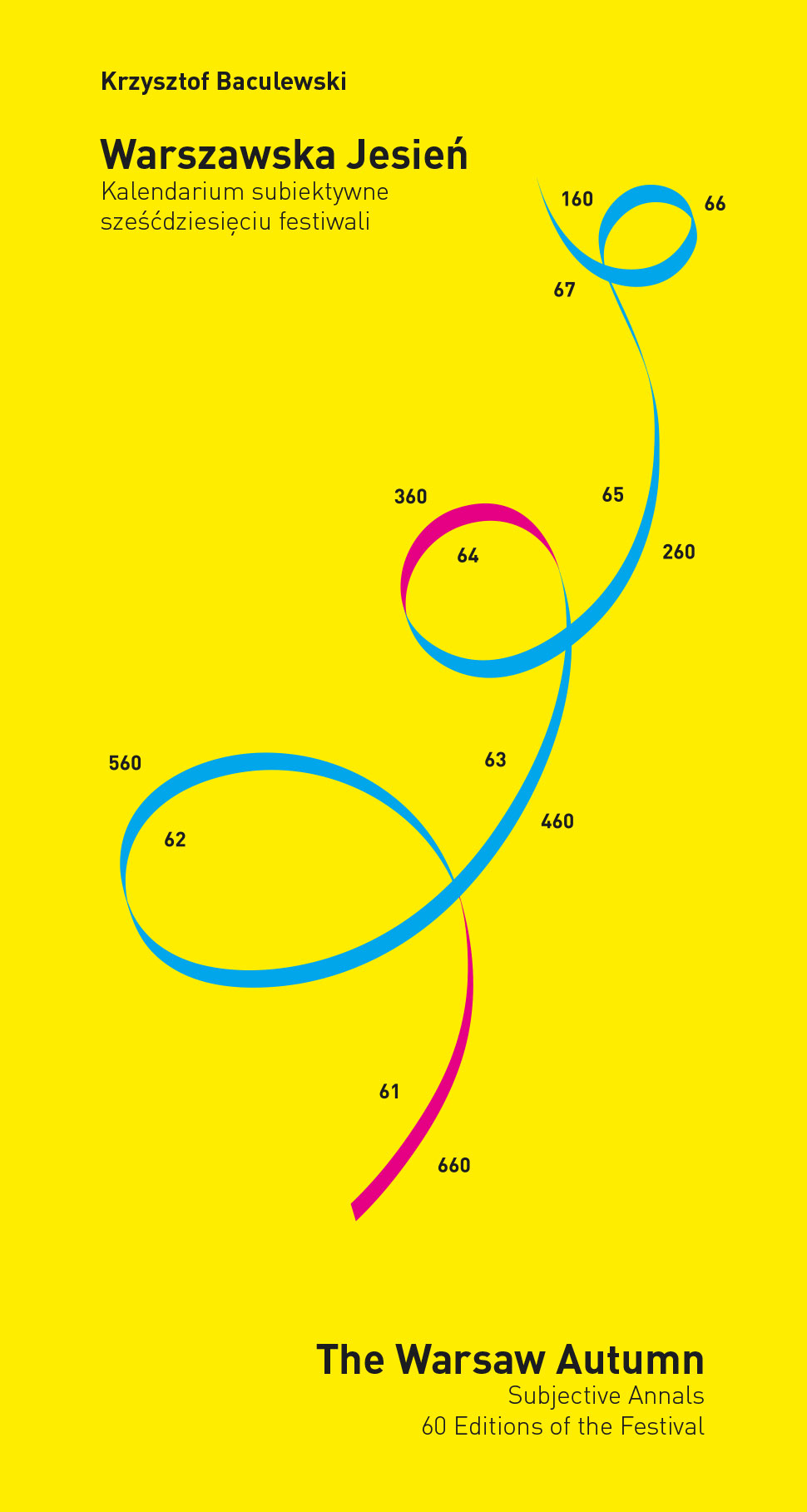

Krzysztof Baculewski "Subjective Annals 60 Editions of the Festival"
This time Warsaw was visited by one of the gurus of the avant-garde -perhaps by then a little dated, but undoubtedly important since it triggered a change of direction in the evolution of 20th-century music: Karlheinz Stockhausen. Fourteen of his works were performed at three concert spectacles, directed by the composer himself. ere were concerts by The Hilliard Ensemble, two by the Orchestra of the State Opera in Kiev, and, naturally - the Wilanów Quartet, as well as the Kraków Percussion Group, the outstanding English soprano Jane Manning, The Matrix Ensemble and the Kronos Quartet.
An event of a different kind, belonging to a different aesthetics, was the performance of Passio Domini nostri Jesu Christi secundum Joannem by Arvo Pärt. One should also note the monographic concert of Wojciech Kilar's music, the appearance of Krzysztof Meyer as soloist in his own Piano Quintet, the crazy Harmonielehre by John Adams, the debuts of Bettina Skrzypczak (String Quartet No. 2) and Jerzy Kornowicz (Relacja), the opera The Death of Don Juan by Roman Palester, who had died in Paris two years earlier - another work by a composer almost unknown in Poland; the (surprisingly uncomprehended by the audience) Muzyka na Wielki Tydzień (Music for Holy Week) by Lidia Zielińska, Requiem in Memory of Cathy Berberian by Luciano Berio, a recital by harpsichordist Elżbieta Chojnacka, the poignant Different Trains by Steve Reich, a monumental scene from the opera Silent Screams, Dificult Dreams by Eugeniusz Knapik, and a kind of suite from Le Grand Macabre by György Ligeti.
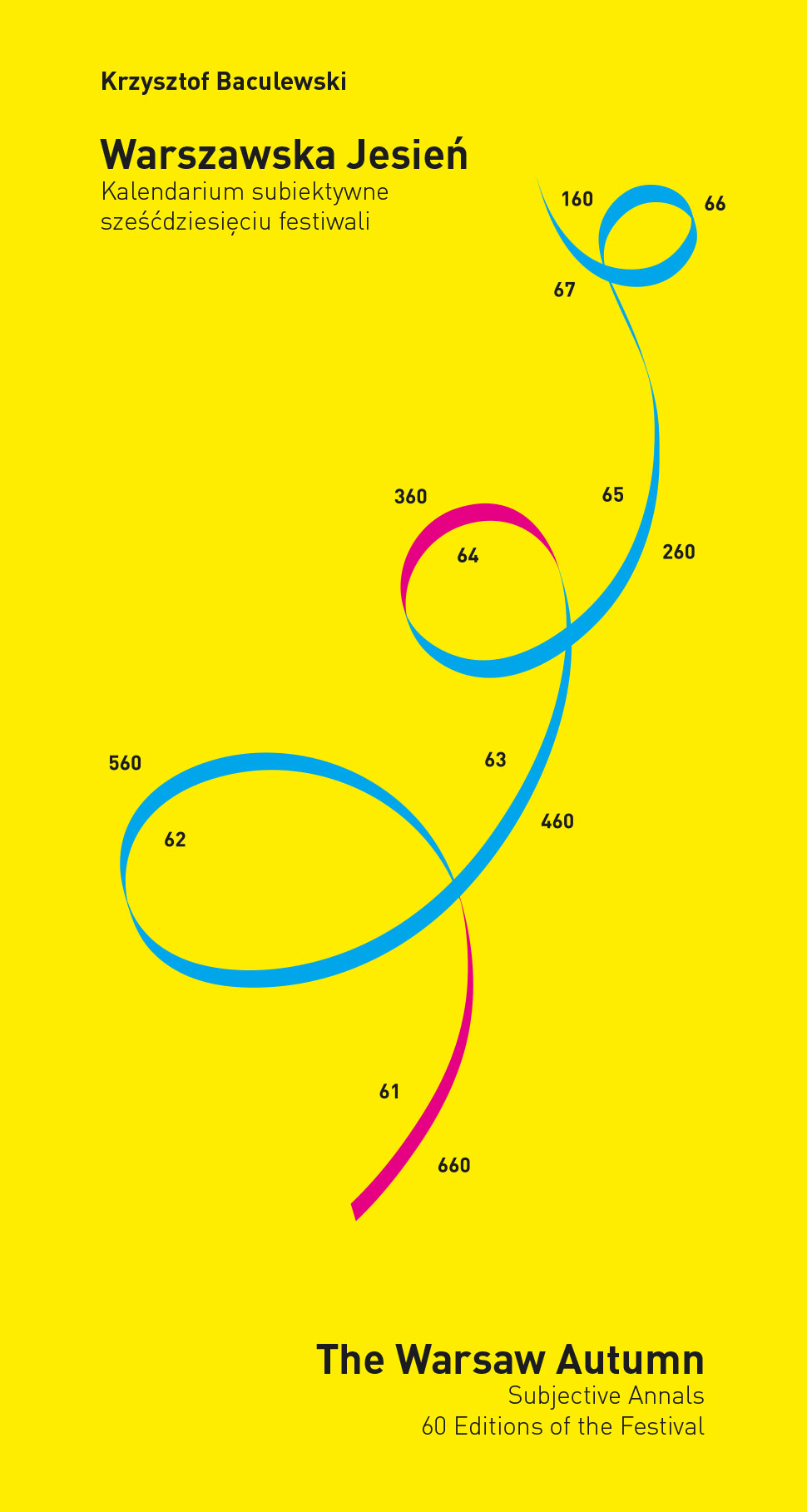

Krzysztof Baculewski "Subjective Annals 60 Editions of the Festival"
Another change to the duration of 'Warsaw Autumn': this time the Festival was shortened by cutting out the final Sunday, and thus it lasted from Friday until Saturday in the second half of September. The programme marked the 60th birthdays of Krzysztof Penderecki and Henryk Mikołaj Górecki, and the 80th birthday of Witold Lutosławski, who conducted the final concert with the Warsaw Philharmonic Orchestra; this was Lutosławski's last public appearance in Poland. The concert would be released a year later on CD. Among outstanding performers one should mention violinist Christiane Edinger, flutist Irena Grafenauer, cellist Boris Pergamenschikov, the Scandinavian Kontra Kvartetten, the Wilanów and Silesian Quartets, Ensemble Contrechamps from Geneva, Agon Ensemble from Prague, Nieuw Ensemble from Amsterdam, and, last but not least, Paweł Mykietyn's debut as composer. An event of interest was the concert by the State Symphony Orchestra of Lithuania, which featured two works - Poème électrique Op.16 of 1932 and Symphonie No. 6 Op. 66 'Cosmique' of 1960 - by the almost totally unknown in Poland Vytautas Bacevičius, brother of Grażyna and Kiejstut Bacewicz. This was one of the last instances of 'Warsaw Autumn' catching up with the historical backlog, which is how its story began in the first place. ere was also a monographic concert devoted to Per Nørgård; Jan Krenz presented his Symfonia quasi una fantasia No. 2, Daryl Rosenberg revisited John Cage's Sonatas and Interludes; Camerata Silesia conducted by Anna Szostak and pianist Aleksandra Krzanowska made their debuts. Antoni Wit conducted the Polish National Radio Symphony Orchestra in the Polish première of Éclairs sur l'Au-Delà by Olivier Messiaen, who had died a year earlier: a recording of this concert was later issued on CD by the French company JADE.
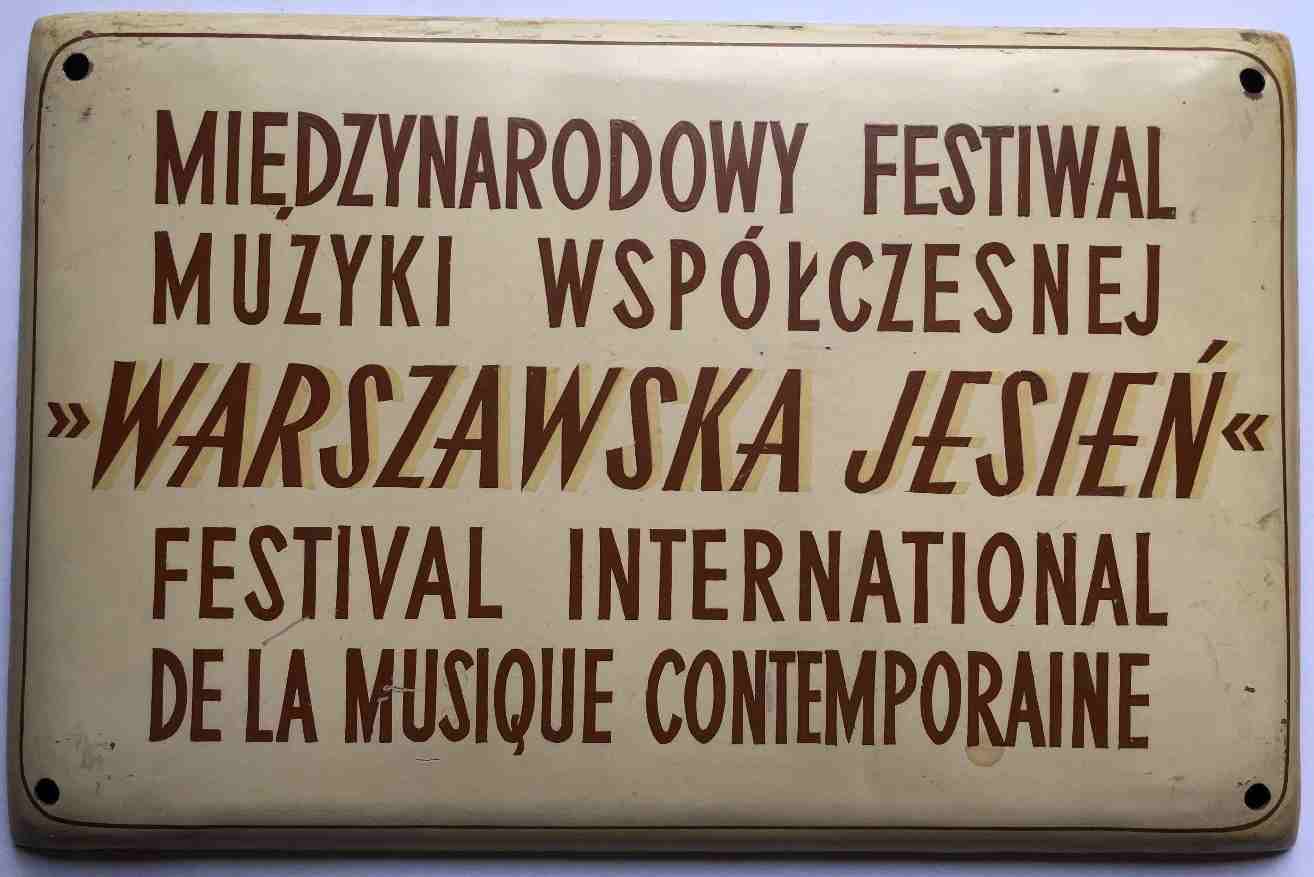

A plate from the door of the Warsaw Autumn festival office. Originally (till about 1980) the office was located at the Bristol Hotel, later – at the Europejski Hotel. Today it is housed in a historical tenement in Old Town Square, Warsaw
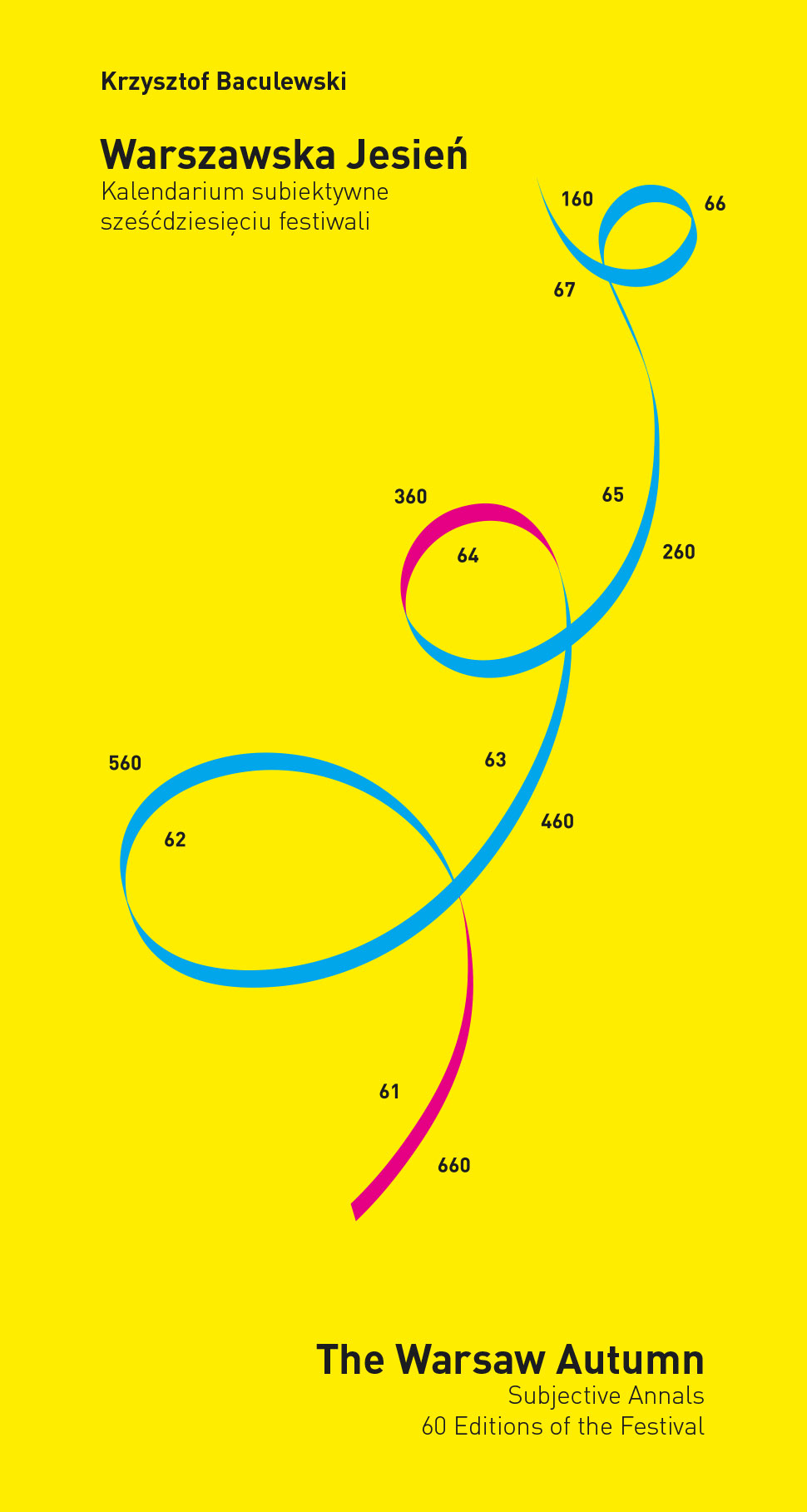

Krzysztof Baculewski "Subjective Annals 60 Editions of the Festival"
This Festival was dominated by concerts in memory of Witold Lutosławski, who had died on 7th February of that year. During the first concert, apart from Preludes and Fugue and Funeral Music performed by Sinfonia Varsovia conducted by Jan Krenz, we heard Anne-Sophie Mutter playing the solo parts in Partita and Chain II. The second 'Hommage à Lutosławski' included ten compositions for various instruments, dedicated to the memory of Lutosławski, by various composers including Per Nørgård, Elliott Carter, Iannis Xenakis, Toru Takemisu; the programme opened and ended with Lutosławski's works: Epitaph and Grave. ere was also another commemorative concert, in memory of Roman Haubenstock-Ramati (who had died in the spring of that year) performed by Klangforum Wien. Oriental avour was provided by two large-scale spectacles presented by Jean-Claude Eloy, with music inspired by the cultures of Japan (Erkos and Butsumyôe), India (Anâhata and Yo-In), but also Greece (Sappho Hikètis). Bogusław Schaeffer made an appearance - this time as a pianist in his own composition (Congruences). The 'Warsaw Autumn' also organised a 'trip' to Łódź, where the Łódź Grand Theatre staged Krzysztof Penderecki's opera Ubu Rex, under the baton of Antoni Wicherek. The German ensemble musikFabrik NRW made its debut; there were performances by the Norwegian Cikada Ensemble and the Sicilian Zephir Ensemble.
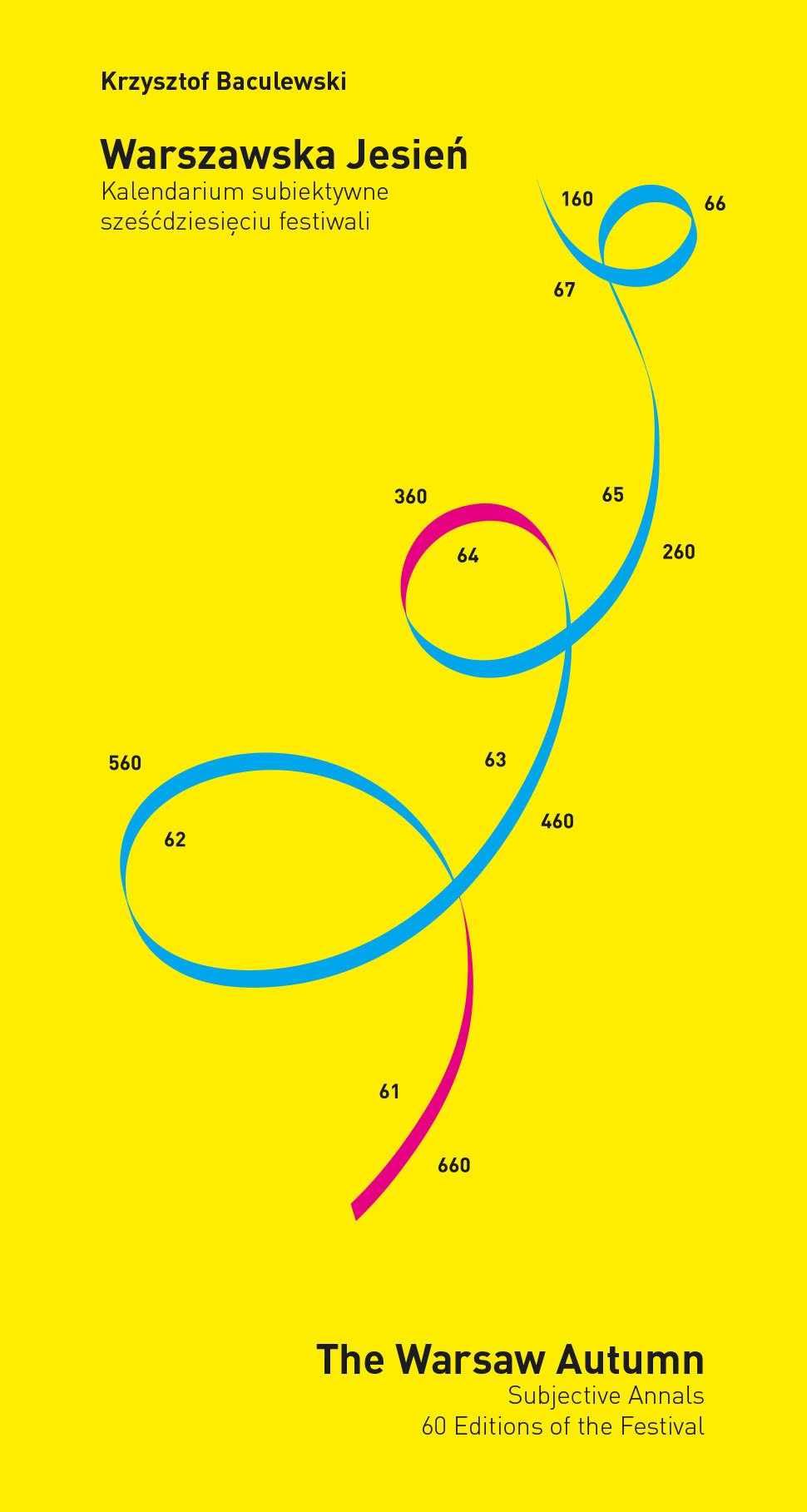

Krzysztof Baculewski "Subjective Annals 60 Editions of the Festival"
Two Cantatas by Anton Webern provided an excellent framework for the programme of the inaugural concert performed by the Camerata Silesia and Sinfonia Varsovia conducted by Ed Spanjaard. In between, we heard Jeux vénitiens by Witold Lutosławski, Variations by Anton Webern and Life without Christmas - Morning Prayers by Giya Kancheli. Retrospective presentations of works by this classic composer of twelve-tone music and precursor of serialism marked the 50th anniversary of his death. Kancheli's Life without Christmas was performed in full, though Day Prayers, Night Prayers and Evening Prayers were presented at different concerts. This cycle might be described as the composer's ethical and artistic 'settling of accounts' with that part of his life which he had been destined to spend in the USSR. Other highlights included: the opera The Heartsnatcher by Elżbieta Sikora, staged by the Grand Theatre - National Opera, and an 'evening of performances and installations' at the Ujazdowski Palace - a novelty which in future would make its presence increasingly felt 'Warsaw Autumn'. Julian Gembalski improvised on the new organ of St John's Cathedral, Ewa Pobłocka presented Piano Concerto by Paweł Szymański, and Elżbieta Chojnacka - the Harpsichord Concerto by Michael Nyman; ensemble 'De Ereprijs' played the Festival debut (Agmen) of Marzena Komsta, and the Wola Theatre staged Die Befreiung des Prometheus by Heiner Goebbels, adapted from Heiner Müller. This edition of the 'Warsaw Autumn' ended with a monumental concert, featuring the vast Universe Symphony by Charles Ives, reconstructed by Larry Austin, and John Tavener's cantata We Shall See Him As He Is: Ikon of the Beloved.
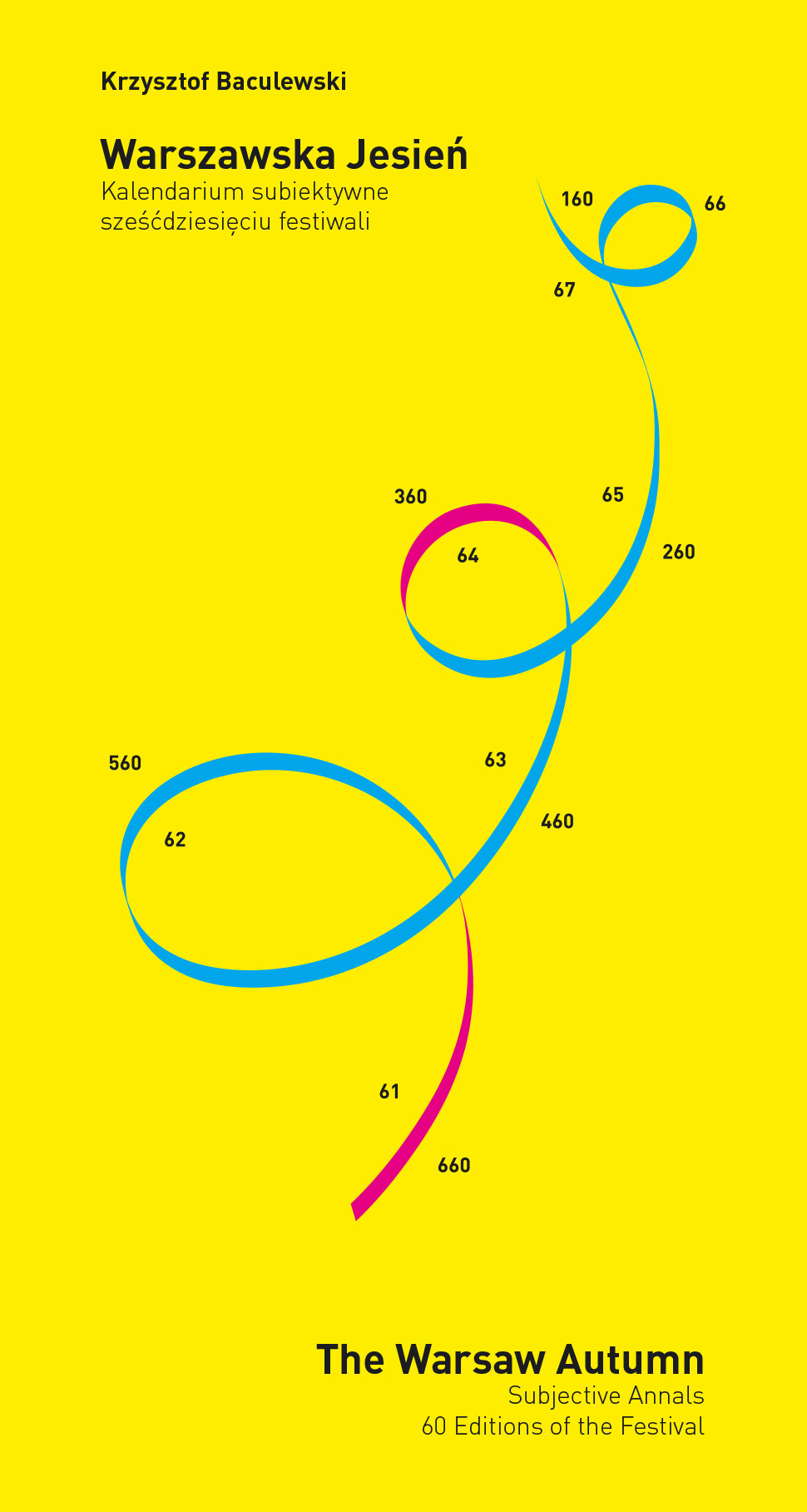

Krzysztof Baculewski "Subjective Annals 60 Editions of the Festival"
From the Chamber Concerto by Stanisław Skrowaczewski and Sinfonietta per ati by Jan Krenz - to a stage performance of three scenes (1, 3, and 5) from the opera La libertà chiama la libertà by Eugeniusz Knapik. From Arcana by Edgard Varèse - to Id by Tadeusz Wielecki.
From the recital of Hungarian pianist Zoltán Kocsis and Finnish harpsichordist Jukki Tiensuu - to the 'Week of Films by Mauricio Kagel'. From John Adams's Chamber Symphony - to Krzysztof Penderecki's Violin Concerto No. 2. To these highlights one should add Trois Poèmes d'Henri Michaux by Witold Lutosławski (Camerata Silesia and the Polish National Radio Symphony Orchestra).
In retrospect, this was the year when the tendency to present pro les of completely new composers at the 'Warsaw Autumn' first manifested itself. This rejuvenation of the Festival was quite significant. After years of the public's decreasing interest in the Festival, which had reached its lowest point in the late 1980s and early 1990s, attendance begin to grow again. One of the reasons for this might be the change in Festival organisation: the Management Board of the Polish Composers' Union began to hold competitions to appoint a Festival Director, who was at the same time chairman of the Repertoire Committee. The Committee thus becomes an advisory, and not a decision-making body. Krzysztof Knittel held the post of the 'Warsaw Autumn' Director until 1998.
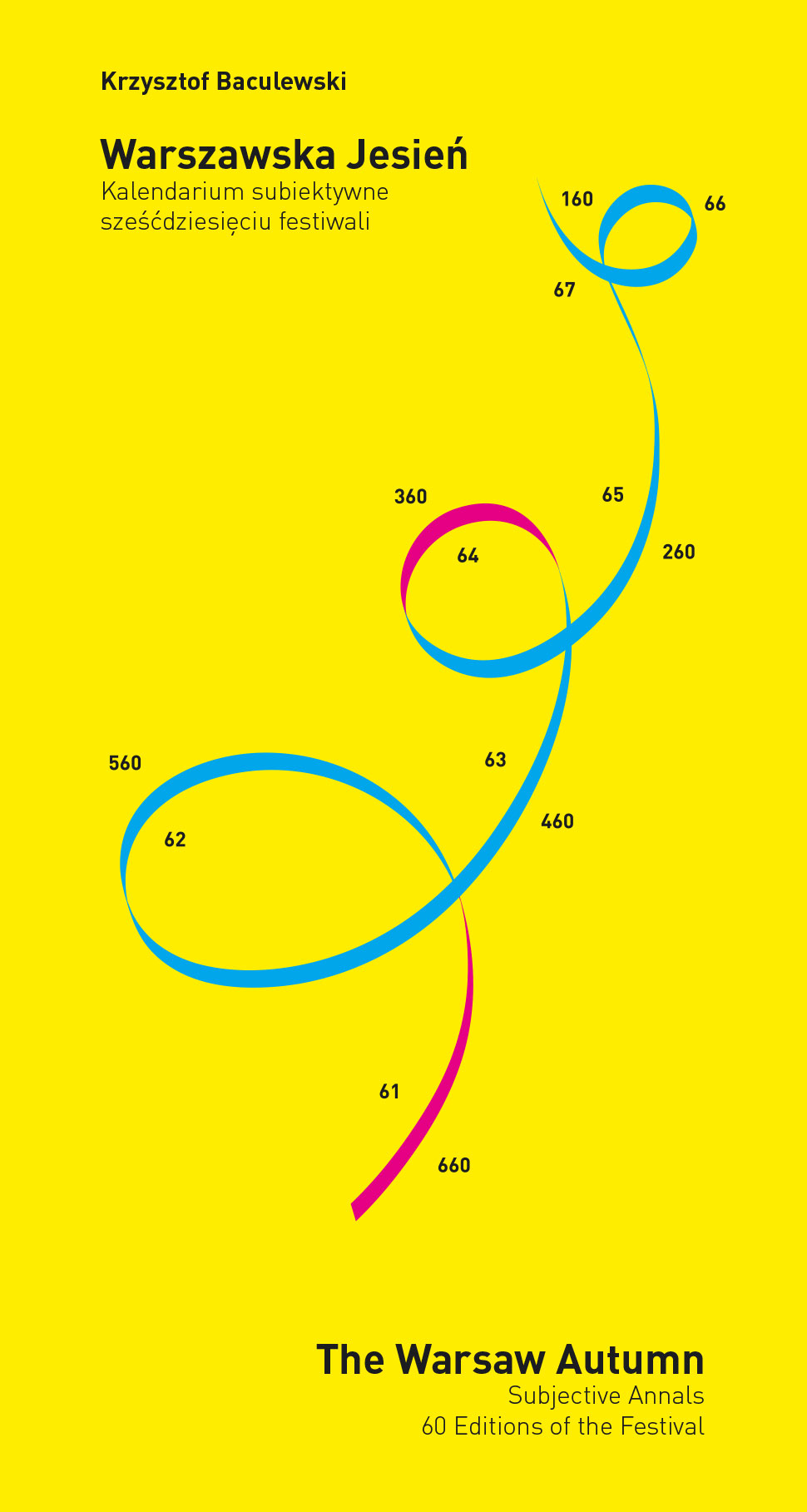

Krzysztof Baculewski "Subjective Annals 60 Editions of the Festival"
That year's 'Warsaw Autumn' was preceded by a curious event, unprecedented in the history of the Festival: on the Sunday before the inaugural Friday Llorenç Barber gave a concert for church bells Vox clamans in Warsaw's Old Town. Mobile phone communication made it possible to synchronise the individual bell-ringers. As a witness to this event, I can claim that it was memorable as something undoubtedly exceptional and original, even though the sound of bells in itself is nothing new or original. However, the combination of rhythms, pitches, order of entry, space - all this was unquestionably new.
The 40th 'Warsaw Autumn' began with a concert by the Warsaw Philharmonic Orchestra under Jan Krenz, featuring music by the grand old masters of the Festival: the Cello Concerto by Witold Lutosławski (sol. Andrzej Bauer), Symphony No. 3 by Tadeusz Baird and Episodes by Kazimierz Serocki; the concert ended with the music of Olivier Messiaen. This was an allusion to the first composition played at the 1st 'Warsaw Autumn' (Les O randes oubliées), but this time the music was much more momentous: Et exspecto resurrectionem mortuorum. The jubilee edition closed with Krzysztof Penderecki's Symphony No. 5, preceded by Lidia Zielińska's postmodernist Fiction and the first performance of Wojciech Kilar's Piano Concerto. One of the concerts took the form of a piano 'festival': four piano concertos were performed, Zygmunt Krauze played his own Concerto No. 2, Paweł Kubica - ...quasi una fantasia... by György Kurtág, Ewa Pobłocka - the Piano Concerto by Paweł Mykietyn, and Janusz Olejniczak - Valse boston by Giya Kancheli. ere was also a marathon of electroacoustic music to celebrate the 40th anniversary of the Experimental Studio of Polish Radio. One should also note the presence of Olga Szwajgier (soprano), Tomasz Strahl (cello), the Loos ensemble, Steve Reich & Musicians with a monographic Steve Reich programme (the complete Drumming, Music for Mallet Instruments and Organ and Music for 18 Musicians), as well as the compositional debut of Michał Talma-Sutt.
As part of the Festival's jubilee celebrations, the programme book carried 118 photographs from years past at the front, and, in the middle, a number of drawings illustrating the Erotics by Bronius Kutavičius, and A Small Lexicon of Contemporary French Music by the present writer.
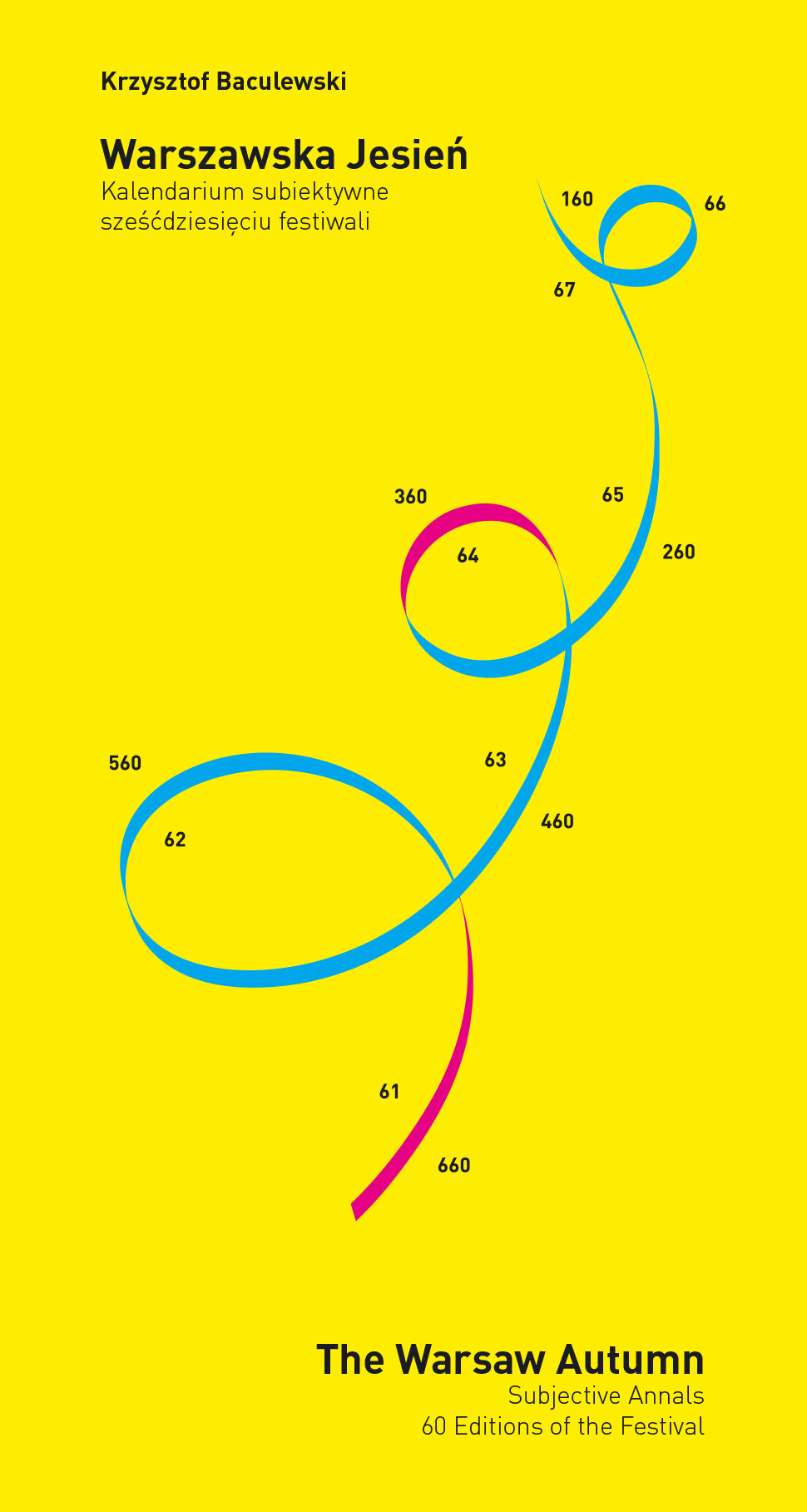

Krzysztof Baculewski "Subjective Annals 60 Editions of the Festival"
This was a very special edition of the Festival. For the first time it had a subtitle: 'North '98'. This title reflected the main focus of the programme - Scandinavian music (primarily owing to considerable support from the Nordic Council of Ministers). Hence many names of composers previously unknown to Polish audiences: Jan Sandström, Haukur Tómasson, Frederik Högberg, Pelle Gudmundsen-Holmgreen, Paavo Heininen, Kimmo Hakola, Karin Rehnquist, Jukka Koskinen, Poul Ruders, Hans Gefor, and Olav Anton Thommessen. However, the final concert ended with a 20th-century classic: Symphony No. 4 by Per Nørgård. Also for the first time there was an internet link with Helsinki and Oslo, which enabled simultaneous audiovisual presentations involving sound and computer images as well as acoustic instruments. As far as Polish music is concerned, one should note performances of Symphony No. 4 by Witold Lutosławski, Symphony No. 1 and Clarinet Concerto by Krzysztof Penderecki, Cello Concerto No. 2 by Krzysztof Meyer, Concerto à rebours by Tadeusz Wielecki, Psychodrama by Tadeusz Baird, Trio by Augustyn Bloch, Music from Afar by Tomasz Sikorski, as well as possibly one of the best Polish symphonic compositions ever heard at the 'Warsaw Autumn' - Slapstick by Zbigniew Bargielski.
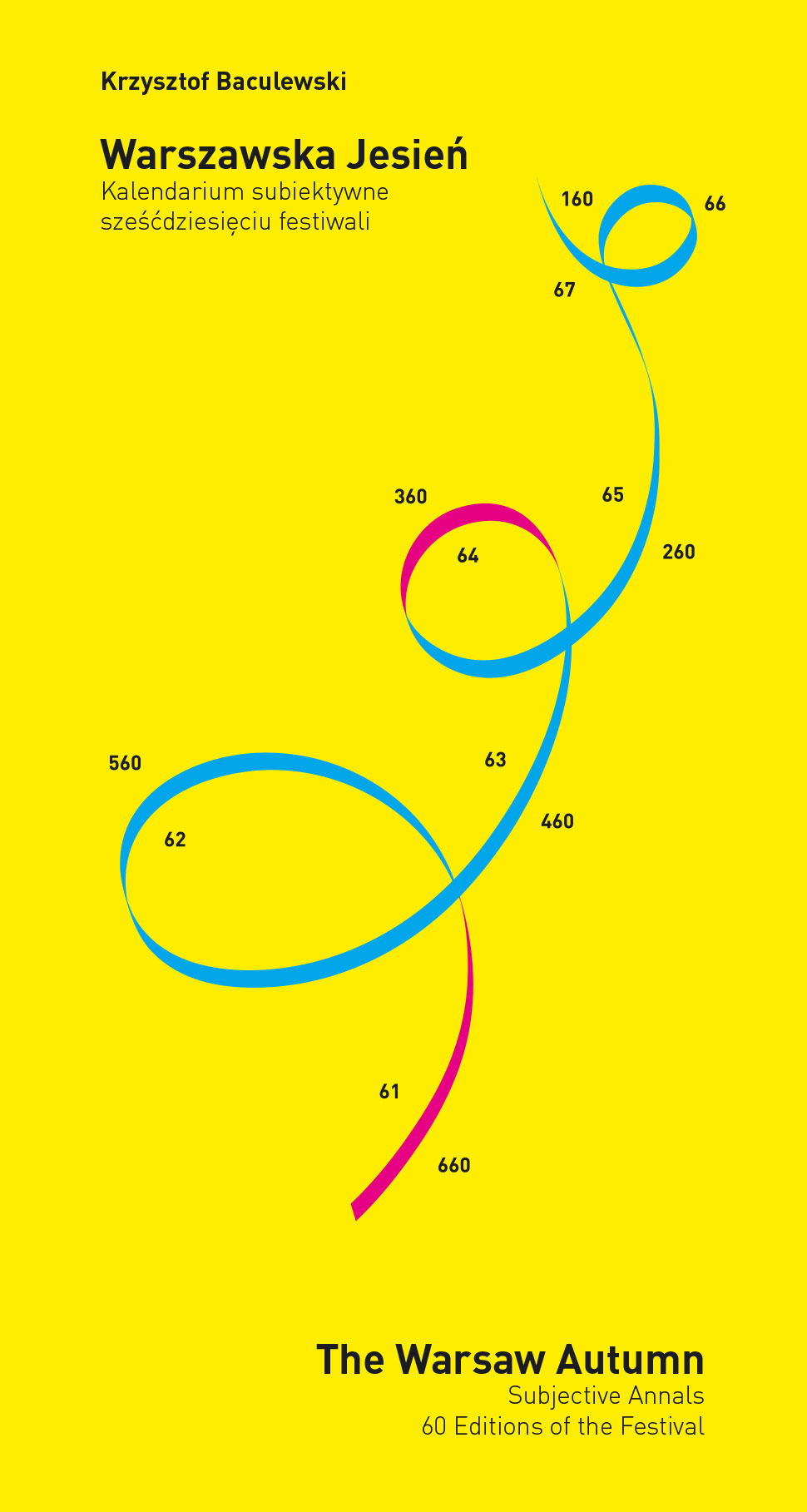

Krzysztof Baculewski "Subjective Annals 60 Editions of the Festival"
The very first concert of the 'Warsaw Autumn '99' already contained an event of great importance: the first Polish performance of Sinfonia by Luciano Berio, with soloists of Camerata Silesia and Warsaw Philharmonic Orchestra conducted by Wojciech Michniewski. In comparison with that composition, even Le Temps et l'Ecume by Gérard Grisey lost the lustre of avant-garde novelty and the lure of the unexpected. Among other Festival performances one should mention Mirrors by Anna Zawadzka-Gołosz, The Garden's Gates by Szabolcs Esztényi, Interwoven Figures by Jerzy Kornowicz, Piano & String Quartet by Morton Feldman, Piano Concerto by John Cage, the multimedia opera Dust by Robert Ashley, as well as the debut of Ewa Podgórska (Constans). Outstanding performers: conductor Peter Eötvös, soprano singer Olga Pasichnyk, the Silesian Quartet, and the English orchestra Sinfonia 21 conducted by Martyn Brabbins.
The Festival closed with an event which has already become ancedotal: during the performance of Fresco VII - Uru Anna by Grażyna Pstrokońska-Nawratil, toward the end of the composition there was a power cut at the venue (the Church of St. Dominic). The darkness was complete - even the emergency lights did not come on. Neither the soloist - the tenor Piotr Kusiewicz, nor the Polish Radio Choir, nor the Orchestra of Kraków Philharmonic had the slightest chance to see the conductor - Tamas Vetö. In spite of this, the musicians finished playing with no u s or mistakes!
From that year on, the 'Sound Chronicles' have been released on CDs. Tadeusz Wielecki became the Director of 'Warsaw Autumn' and Chair of the Repertoire Committee (until 2016).
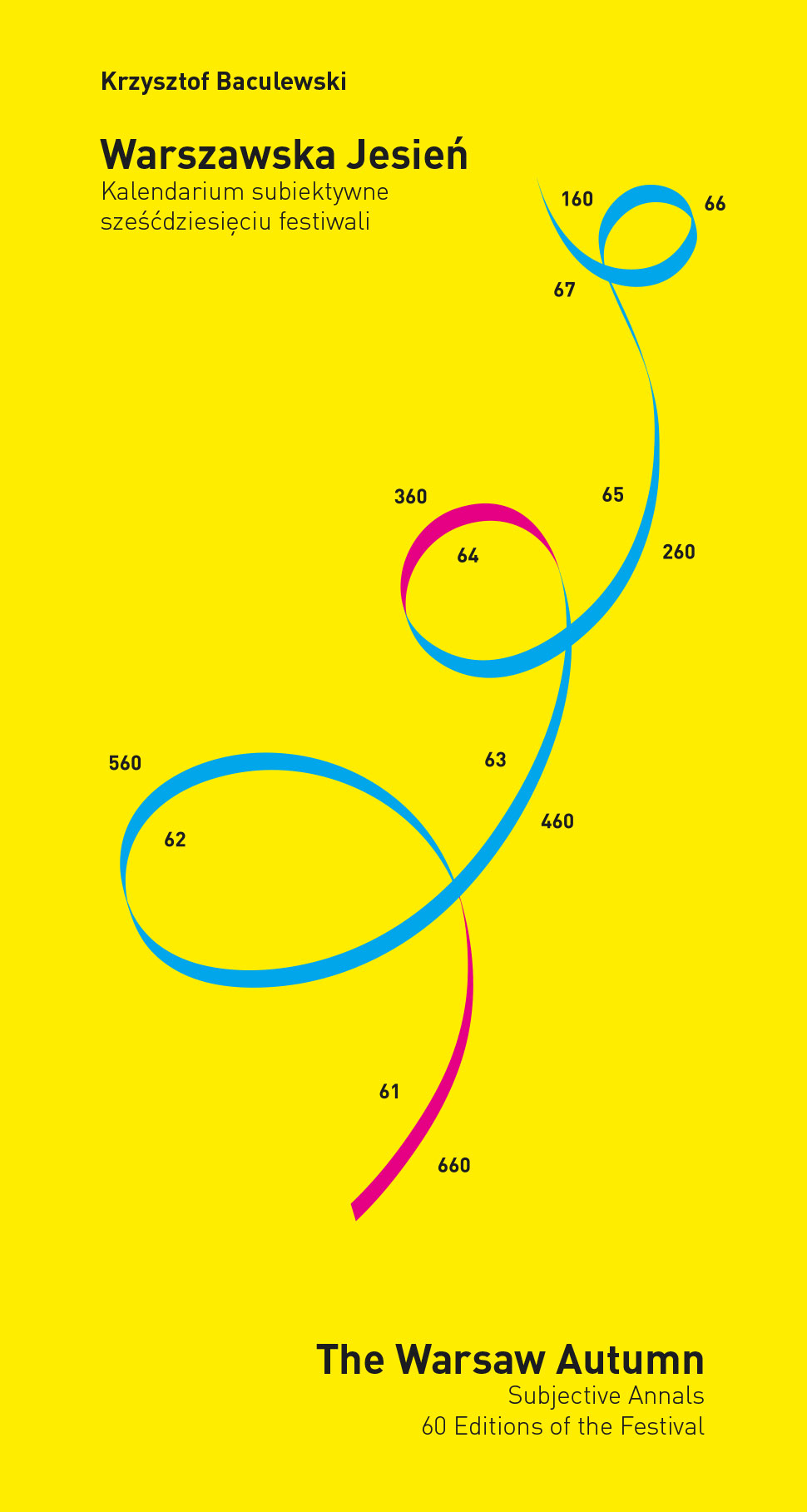

Krzysztof Baculewski "Subjective Annals 60 Editions of the Festival"
Though without a subtitle of the kind that had been used in 1998, this edition of the Festival also had its leitmotifs: sound and space, vision and visionaries, as well as the 'German Wave'. Exceptionally, the inaugural concert took place at the Grand Theatre -National Opera. The programme comprised Ata by Iannis Xenakis, Forte e piano by Kazimierz Serocki and Watt by Pascal Dusapin. A new venue was used for some of the concerts: the Stefan Demby Auditorium at the National Library, which hosted, among others, a significant piano recital by Pierre-Laurent Aimard, performing works by György Ligeti: the set of fourteen Études and the cycle Musica ricercata. Prominent performers included the Camerata Silesia, Zentrum für Kunst und Medientechnologie Karlsruhe, Arditti String Quartet, and others. A performance of Stockhausen's already historical (completed in 1957) Gruppen by the Janáček Philharmonic from Ostrava and the S.E.M. Orchestra from New York caused a sensation. The conductors were Petr Kotik, Zsolt Nagy and Christian Arming. It took place at the Sports Hall of the Legia Football Club in the Bemowo district of Warsaw: three orchestras and the audience were comfortably housed in this gigantic hall. The very fact of holding a concert outside the traditional concert venues, such as the Philharmonic, the Academy of Music, the Lutosławski Polish Radio Concert Studio or the churches, attracted a great number of young people to the event. It is also true that the musical youth had not previously had a chance (apart from a few recordings) to hear that classic serialist work. ere was also a monographic concert of music by Andrzej Krzanowski commemorating the 10th anniversary of the composer's death. Two cycles were performed on that occasion: the four Broadcasts separated by Three Pieces for Oboe and Trumpet. The Royal Castle hosted a concert featuring Baroque instruments, and in the Lutosławski Concert Studio the Belarussian ensemble Classic-Avantgarde played, among other items, Jour, contre-jour by Gérard Grisey and Light on the Path by Jauhen Poplausky of Grodno.
The 'Warsaw Autumn' final concert again took place in unconventional surroundings: the architecture of the Royal Castle courtyard.
Among the works then performed was the fourth part of the cycle De materie by Louis Andriessen, and Prometheus. The Poem of Fire by Alexander Scriabin. What made the situation even more unconventional was that, in spite of the temperature falling below 10o C, and the presence of honourable guests in the front rows, the dancer in Andriessen's work appeared topless. The performance of Scriabin's composition was supposed to be accompanied by a computer reconstruction of the light effects envisaged by the composer. This was only partially successful, since the electronic equipment lost out in confrontation with the weather conditions.
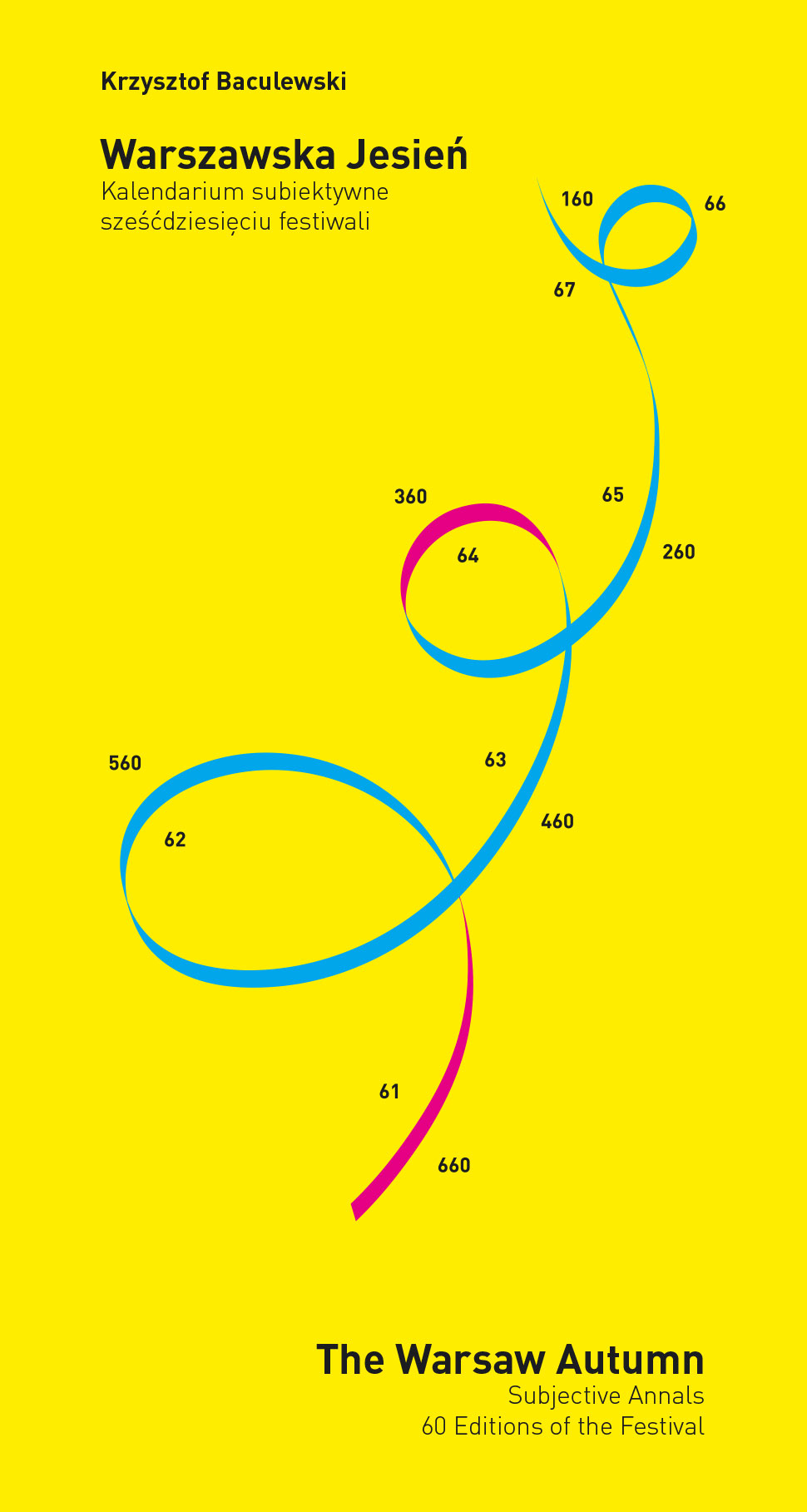

Krzysztof Baculewski "Subjective Annals 60 Editions of the Festival"
The main accents of this Festival edition - though not really very strongly accented - were time and multimedia. The Festival was opened by the Moscow Philharmonic Orchestra conducted by Yuri Simonov, with a programme including the Violin Concerto by Alfred Schnittke and Symphony No. 1 by Galina Ustvolska. The remaining four Symphonies by the venerable woman composer were performed by the Silesian Philharmonic conducted by Mirosław Jacek Błaszczyk, with Jadwiga Rappé (alto) as soloist. Mathias Spahlinger presented a work titled furioso performed by the ensemble United Berlin, while Jean Efflam Bavouzet gave a daring performance of Piano Concerto - hommage à Frédéric Chopin by Elżbieta Sikora.
The Grand Theatre - National Opera hosted the première of the first part of an opera triptych commissioned by the Festival, The Land of Ulro [title after Czesław Miłosz]. This part (adapted from Emanuel Swedenborg), titled Tattooed Tongues, was composed by Martijn Padding. There was also a performance by the Parisian ensemble Court-Circuit of one of Gérard Grisey's most important works, Vortex temporum. In the Agnieszka Osiecka Concert Studio (of Polish Radio), Martine Joste presented a number of works for microtonally tuned piano. We witnessed the debuts of Weronika Ratusińska, Aleksandra Gryka, Bartłomiej Krcha, Tomasz Praszczałek, and one of the most interesting composers of young generation - Agata Zubel (Lentille). The Festival closed with performances of Symphony by Bent Sørensen, Concerto for Percussion and Orchestra by Krystyna Moszumańska-Nazar and Dämmerschein by Iannis Xenakis, who had died in February the same year.
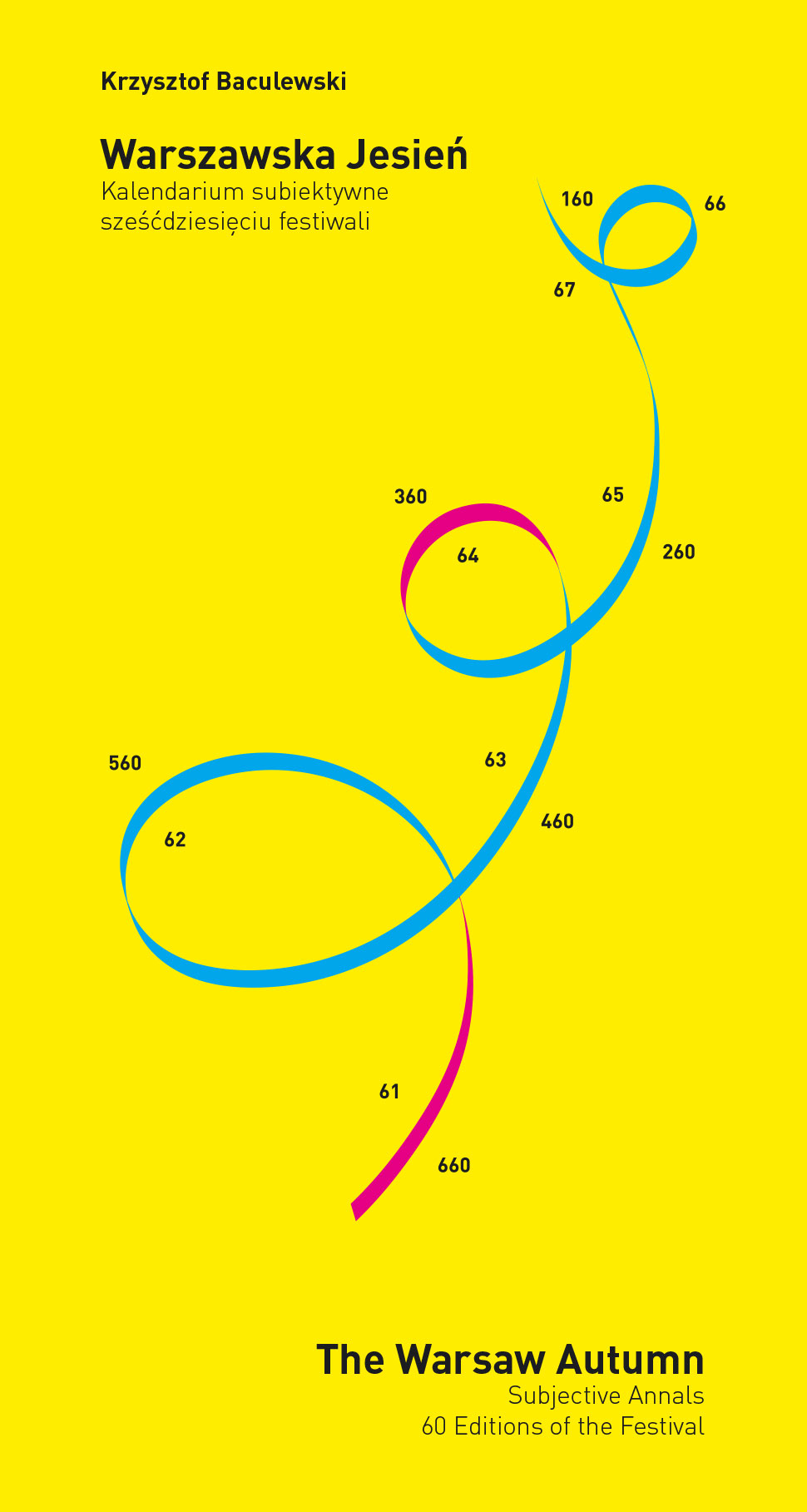

Krzysztof Baculewski "Subjective Annals 60 Editions of the Festival"
Recitals juxtaposed with symphonic concerts were one of the leitmotifs of this edition, as indicated in the programme book. The Land of Ulro operatic cycle from the preceding Festival was continued. The second part, La Lointaine (after Oskar Miłosz) was composed by Osvaldas Balakauskas, and premiered at the Mały Theatre under Przemysław Fiugajski. The Silesian Quartet presented one of the most exciting events of the Festival, the Symphony of Rituals by Witold Szalonek, who had died a year earlier. We also had a single-composer concert dedicated to Roman Berger, a Pole from Bratislava, and a recital by Christine Michaela Pryn, an interesting Danish violinist. In the foyer of the Warsaw Stock Exchange in Książęca Street the ensemble Freight Train improvised music for a silent lm of 1924. From that year on, chamber music concerts took place in the newly opened Mazovian Centre of Culture and Art in Elektoralna Street. We should also note the debuts of Dobromiła Jaskot, Marcin Bortnowski and Cezary Duchnowski. The inaugural concert featured the Clarinet Concerto by Krzysztof Meyer (with Eduard Brunner), Symphony No. 4 by Maciej Jabłoński with organ solo (Jarosław Malanowicz) and Brian Current's For the Time Being, all performed by the Warsaw Philharmonic Orchestra under Antoni Wit. In the finale, after Symphony No. 4 'At the End of the Day' by Per Nørgård, Barry Douglas played, with the Polish National Radio Symphony Orchestra conducted by Gabriel Chmura, the Piano Concerto 'Resurrection' by Krzysztof Penderecki. Some part of the audience reacted to this work with hissing and booing, as listeners do in France. This work also caused a media uproar over questions of style, aesthetics and other imponderables. What aroused emotions was an aesthetic catering to popular taste combined with eclecticism, which might have suited the American audience for which the work was written, but not the listeners at a European Festival of n e w music...
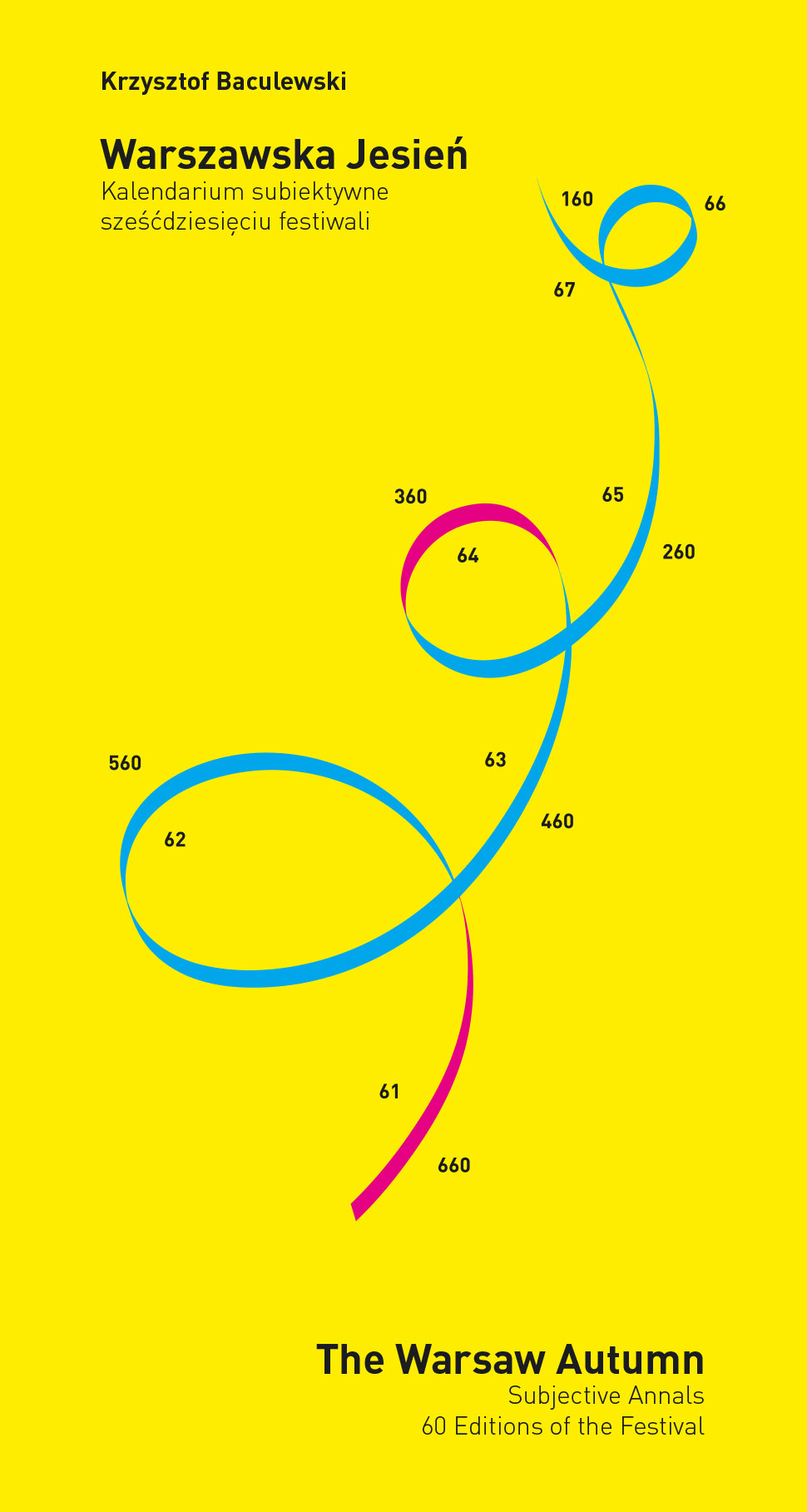

Krzysztof Baculewski "Subjective Annals 60 Editions of the Festival"
The motto and focus of that year's edition was intensive listening, silence, peace and insight. New venues keep appearing on the concert map of the Festival: the Sports Centre in Nowowiejska Street, the Stock Exchange in Książęca Street and the Artistic Centre 'Fabryka Trzciny' (Reed Factory) in Otwocka Street on Szmulowizna (Praga district), where a number of concerts took place. ere were also many fringe events. New names: Cornelis de Bondt, Luca Francesconi, Anders Hillborg, Ivan Fedele. Ensembles new to the 'Warsaw Autumn': Österreichisches Ensemble für Neue Musik, Kwartludium, Ensemble Musiques Nouvelles, Walter Verdehr Trio and Algoritmo. The debuts of Ewa Trębacz and Adam Falkiewicz (who died in 2007). The programme also included works by Salvatore Sciarrino, Luciano Berio, George Crumb, Giacinto Scelsi, Kaija Saariaho, York Höller, Helmut Lachenmann, Witold Szalonek, Zbigniew Bargielski, Bogusław Schaeffer and Krzysztof Penderecki. at year's discovery was Gérard Grisey's song cycle Quatre chants pour franchir le seuil (with soprano Sylvia Nopper). An important event at the close of the Festival: a performance of So a Gubaidulina's Passion According to St John.
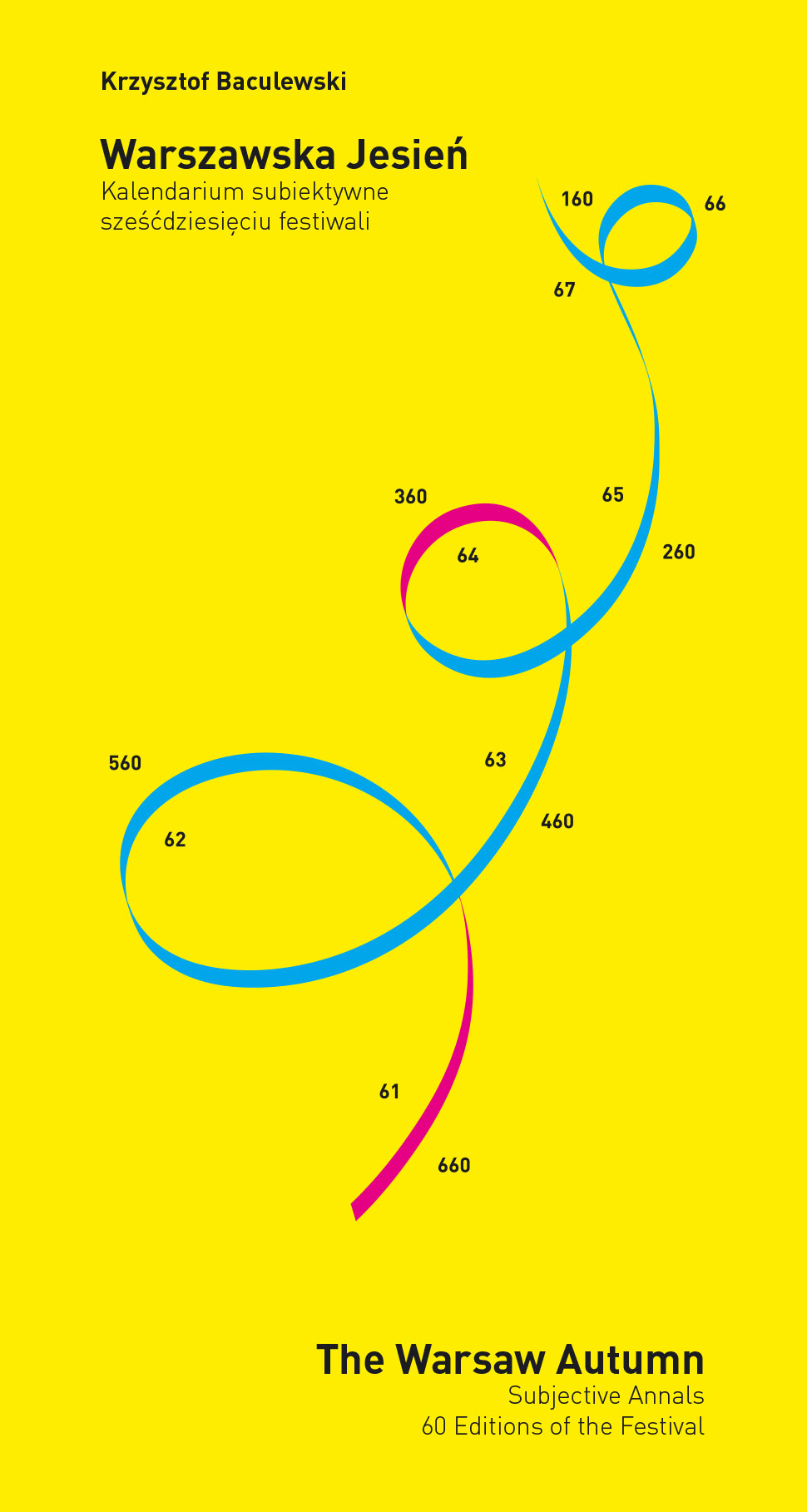

Krzysztof Baculewski "Subjective Annals 60 Editions of the Festival"
The trend toward a diversification of concert venues keeps getting stronger. The new venues include: the Olympic Centre in Wybrzeże Gdyńskie (Żoliborz district) and 'Koneser' Vodka Distillers in Ząbkowska Street (Praga district). This is also related to the gradual loss of interest, both on the part of listeners and composers, in traditional symphonic concerts, and at the same time a strong tendency to locate high culture events on the other side of the Vistula. This edition of the 'Warsaw Autumn' had several foci: emphasis on Polish-German cultural links, Witold Lutosławski's complete symphonies (performed to mark the composer's 10th death anniversary), and the last link in the operatic cycle The Land of Ulro after William Blake - which revisits problems of spirituality in contemporary culture, as well as the universal questions of time and space; and, finally improvisations.
There were only three symphonic concerts (!) The inaugural one featured the Taipei Philharmonic Orchestra conducted by Leif Segerstam with the intriguing Tranquil Abiding by Jonathan Harvey and the Concerto for Orchestra: Yio a piece catering to popular tastes, by Tan Dun, a Chinese composer and conductor extremely active in a number of fields, including that of lm music. Sinfonia Varsovia with the Warsaw Philharmonic Choir conducted by Renato Rivolta presented the monumental Symphony of Hymns by Rafał Augustyn to texts which summarise the history of literature from Pindar to Dylan omas. In the finale - a marathon of all the four Symphonies of Witold Lutosławski (the Polish National Radio Symphony Orchestra conducted - alternately - by Gabriel Chmura and Jacek Kaspszyk). The première of the last part of The Land of Ulro, a cycle initiated in 2001. This part, entitled Europa (after William Blake) was composed by Stanisław Krupowicz. The debuts of Maciej Zieliński, Sławomir Kupczak and Ryszard Osada. The Polish-German Youth Ensemble under Rüdiger Bohn brought back to life the classic Kontra-Punkte by Karlheinz Stockhausen; the Studio for New Music from Moscow presented Trio by Galina Ustvolska, Postludia by Faraj Gara oglu Garayev and Echoes of the Passing Day by Vladimir Tarnopolski, The Cikada Quartet played works by such composers as Ivan Fedele and Kaija Saarijaho. The Festival programme also featured the ensembles: Musicatreize from Marseilles, Nordlys from Copenhagen, Kwartludium and ürmchen Ensemble from Mühlheim. A number of fringe events added colour to this edition of the 'Warsaw Autumn'.
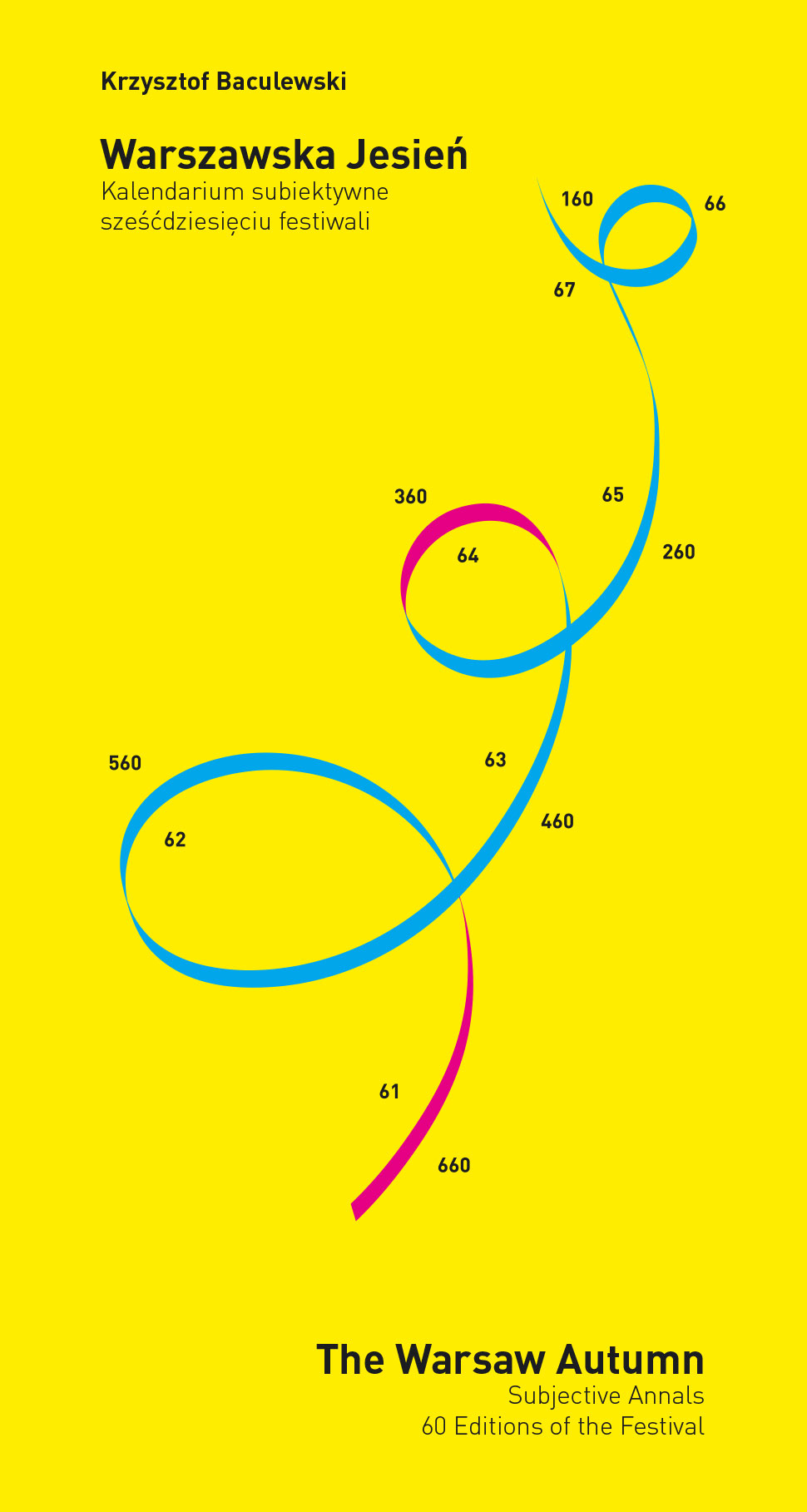

Krzysztof Baculewski "Subjective Annals 60 Editions of the Festival"
The East - the Far East (Chinese, Japanese and Korean music) and that a bit closer to Poland, in the form of works by Ukrainian, Belorussian and Russian composers. Different approaches, perspectives and artistic standpoints.
The list of new concert venues was now even longer: it included the 'Dziekanka' Józef Elsner Hall in Krakowskie Przedmieście, the spectacular Highest Voltage Hall of the Institute of Power Engineering in Mory (Wola district) on the western outskirts of Warsaw, the 'Zachęta' Art Gallery and, again, the Sports Centre in Bemowo. New ensembles: The Moscow Contemporary Music Ensemble, Collegium Novum Zürich, Seattle Chamber Players, Kairos Quartet from Berlin, Timf from Tongyeong in South Korea. New composers: Helena Tulve, Xu Yi, Fausto Romitelli, Lawrence Moss, Unsuk Chin and others. But there were also familiar names: Toru Takemitsu, Toshio Hosokawa, Klaus Huber, Heinz Holliger, Zbigniew Bargielski, Krzysztof Knittel, Heiner Goebbels and John Tavener, as well as working through the classical backlog: Edgard Varèse - Amériques and Pierre Boulez - Notations I-IV and Répons. To celebrate the latter composer's eightieth birthday, the 'Warsaw Autumn' programme book included a small lexicon entitled The World according to Boulez, written by the present writer.
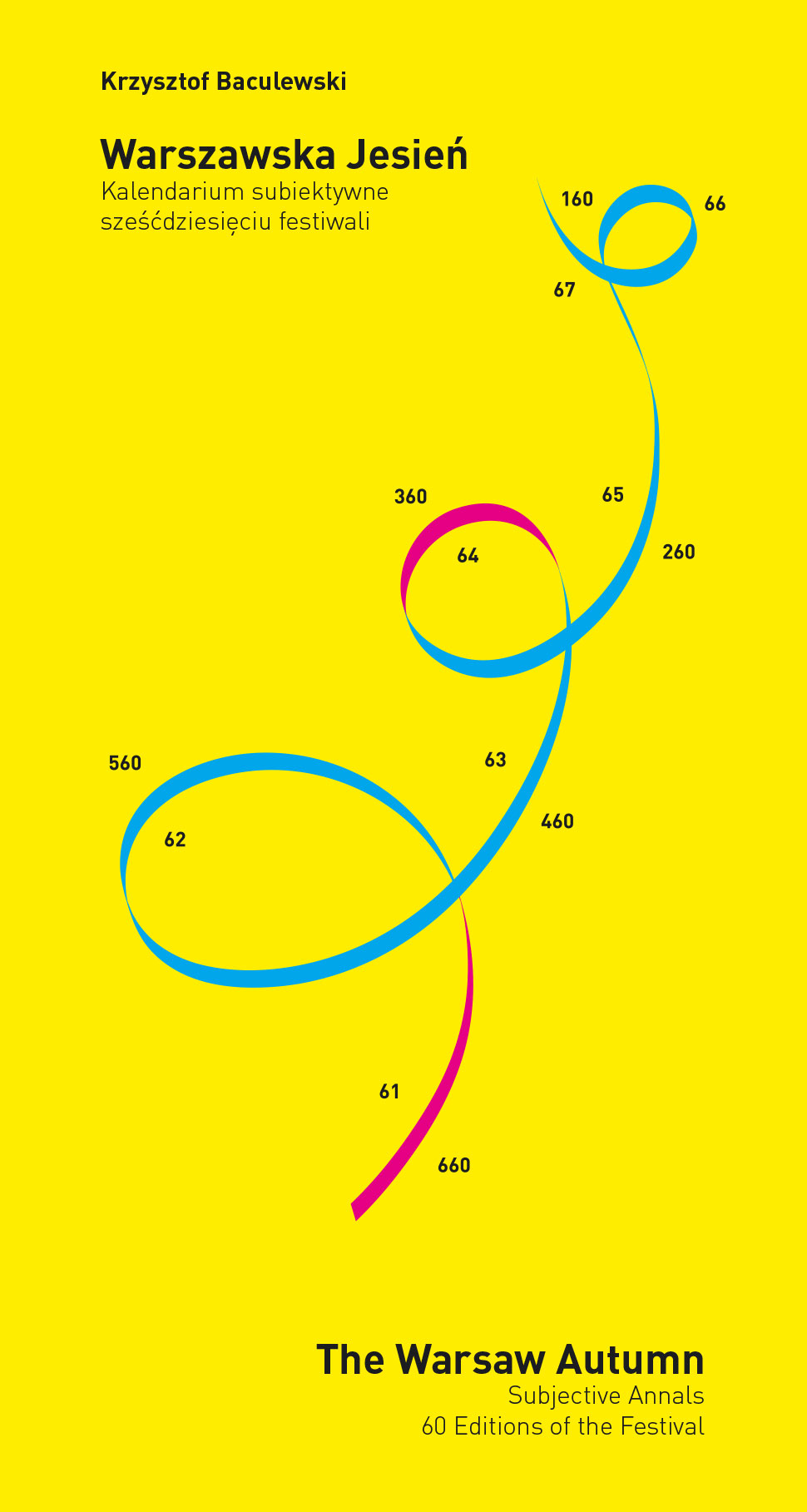

Krzysztof Baculewski "Subjective Annals 60 Editions of the Festival"
Polish music took pride of place at the 2006 Festival, but it was presented in an international context. The Festival also underlined some permanently present musical phenomena; in this edition, it focused on the string quartet, which was the protagonist of an extremely significant event: a marathon of Polish string quartets, by the Silesian Quartet and Quartet Dafô. Between midday and 11 p.m., in the Warsaw Philharmonic Chamber Music Hall, they played nineteen works, including Play by Tadeusz Baird, Dorikos by Krzysztof Knittel, Messages by Andrzej Panufnik and Farewell Night by Zbigniew Bargielski. The ensemble Camerata Silesia appeared on a number of occasions: in Canticum Canticorum Salomonis by Krzysztof Penderecki with Sinfonia Varsovia conducted by Peter Hirsch, in Das atmende Klarsein by Luigi Nono and, together with the Choir of the Polish Radio in Kraków and the Polish National Radio Symphony Orchestra conducted by Gabriel Chmura - in Introduction to the Mystery - a prologue to the musical drama Moby Dick by Eugeniusz Knapik. The Symphony Orchestra of the Academy of Music in Kraków conducted by Wojciech Czepiel played, among other works, Symphony No. 2 by Agata Zubel and Slonimsky's Earbox by John Adams. We heard the second part of the operatic saga Kommander Kobayashi consisting of two operas: Sergey Nevsky's Die Zerstörung von Moskau ist keine Lösung and Aleksandra Gryka's Scream You. ere was also the première of Zygmunt Krauze's opera Yvonne, Princess of Burgundy. The final concert (apart from a vast composition by Eugeniusz Knapik) recalled Roman Haubenstock-Ramati (Symphony K of 1967) and featured Piano Concerto No. 3 by Juraj Beneš, a Slovak composer who had died two years previously. To mark the 'Warsaw Autumn''s 50th anniversary, the programme included a number of works performed at the Festival many years earlier, which by then had become historical. Apart from string quartets, these were compositions by Tomasz Sikorski, Andrzej Dobrowolski, Krzysztof Penderecki, Augustyn Bloch (who died that year), Tomasz Sikorski and Luciano Berio. The programme also included well-known names: Henryk Mikołaj Górecki, Pierre Boulez, György Kurtág, Ton Bruynèl, Salvatore Sciarrino, John Cage, Tristan Murail, Steve Reich, Helmut Lachemann, as well as Jerzy Kornowicz, Anna Zawadzka-Gołosz, Magdalena Długosz, Krzysztof Knittel and others. Sławomir Kupczak made his debut; ensemble debuts included Ensemble Phoenix from Basel, the Choir of the Opera and Philharmonic of Podlasie, and Streichquartett Köln.
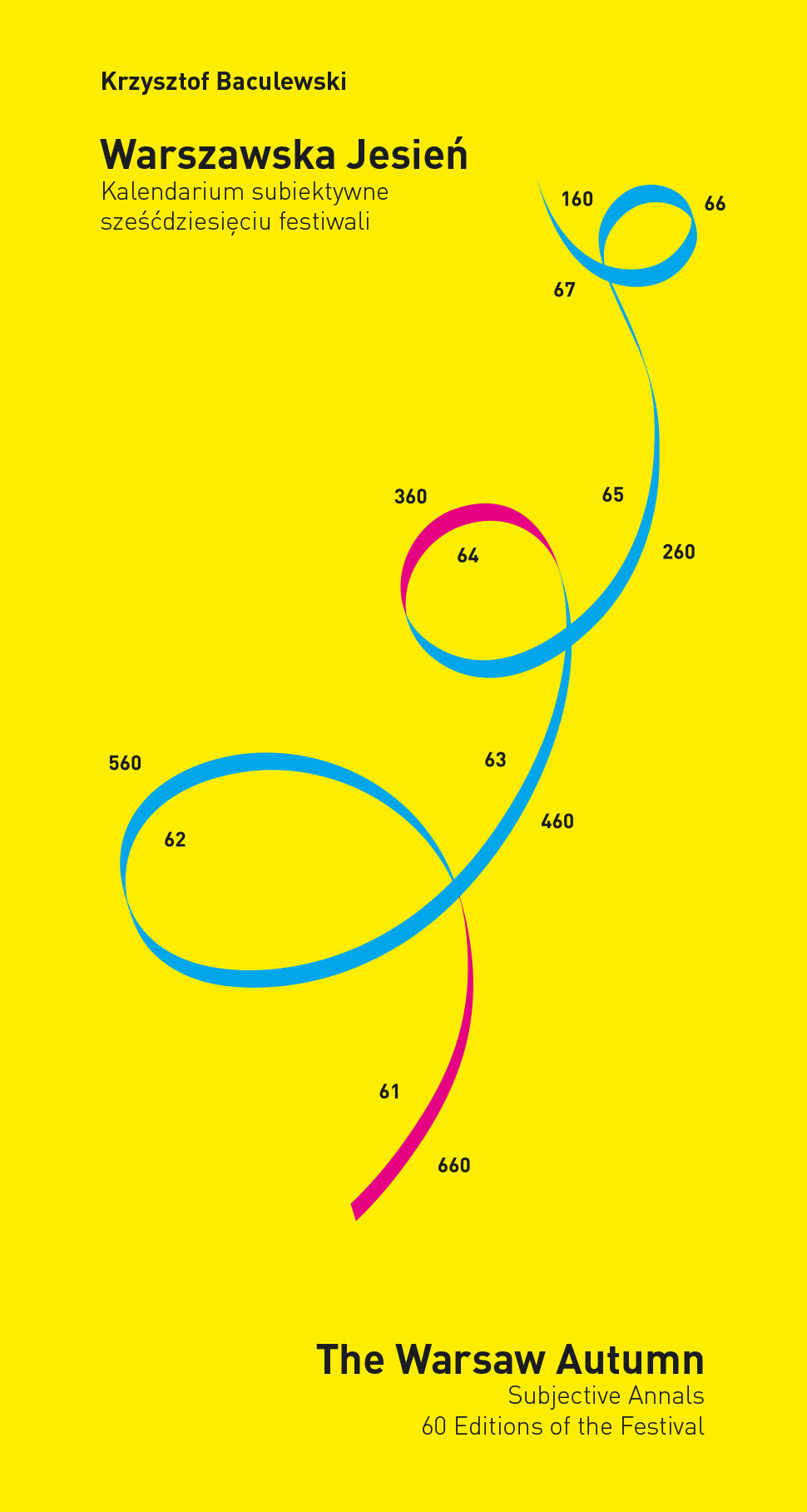

Krzysztof Baculewski "Subjective Annals 60 Editions of the Festival"
The 50th edition of the 'Warsaw Autumn' - another modest jubilee. Modest - because it did not occasion any grand celebrations. Still, POLMIC (Polish Music Information Centre) did release a retrospective set of ten CDs (Polish Collection of the 'Warsaw Autumn' Festival 1956-2005), on which the compositions were arranged (at least to a certain extent) by genre and style. The University of Warsaw hosted a conference entitled 'The Warsaw Autumn as a Realisation of Karol Szymanowski's Vision of Modern Polish Music. Modernism in Postmodern Times.' Similarly as in 1966, the programme book contained many historical photographs.
New concert venues included the Warsaw Centre EXPO XXI and Montownia Artistic Centre (in the old YMCA building). The departure from traditional philharmonic concert situations had already become a tradition in itself. This trend would be continued in later years.
The programme of the 50th edition itself did not contain any special anniversary events. ere were, however, several reminiscences from the beginnings and the middle years of the Festival history: Henryk Mikołaj Górecki's Concerto for Five Instruments and String Quartet (1957), Włodzimierz Kotoński's Music for 21 Instruments and Percussion (1957), Witold Lutosławski's first aleatory piece, Jeux vénitiens (1961), Tadeusz Baird's most avant-garde composition - Étude for vocal orchestra, percussion and piano (1961), the 2nd part of Krzysztof Penderecki's Utrenja (1971), Wojciech Kilar's Upstairs-Downstairs (1971) and Kazimierz Serocki's Fantasia elegiaca for organ and orchestra (1972). New Polish music was mostly represented that year by orchestral or large-scale chamber music: Paweł Szymański's Ceci n'est pas une ouverture, Paweł Mykietyn's Symphony No. 2, Magdalena Długosz's Gemisatos for orchestra, percussion and electronics, Ewa Trębacz's things lost, things invisible for ambisonic space and orchestra, Roman Berger's Improvisation sur Herbert, Wojciech Ziemowit Zych's Tremor, Lidia Zielińska's Conrad's Seven Islands, Tadeusz Wielecki's The Valley of Dry Water, Elżbieta Sikora's Le Chant de Salomon, Krzysztof Wołek's 'Warsaw Autumn' debut - Eppur si muove, Zbigniew Bargielski's Nocturne in Red and Blue, Aleksander Lasoń's Symphony No. 4 'SATJA', and Jerzy Kornowicz's Build-Ups. Polish chamber music in the Festival programme included: Krzysztof Baculewski's cycle of Études for piano, Dobromiła Jaskot's Linearia, Szábolcs Esztényi's Studies, Toccata and A Look from Afar, as well as works by Aleksandra Gryka, Bettina Skrzypczak, Dominik Karski and Krzysztof Knittel.
This was also the last edition of the 'Warsaw Autumn' in which orchestral concerts took up as much as half of the programme. ese were concerts by the Polish National Radio Symphony Orchestra, the Karol Szymanowski Academic Symphony Orchestra of Katowice, SWR Sinfonie-Orchester Baden-Baden und Freiburg, Sinfonia Varsovia, the New Music Orchestra, Warsaw Philharmonic, as well as large chamber ensembles: Megaron, the AUKSO, and Israel Contemporary Players. Of foreign works in the Festival programme, one should note: Kaija Saariaho's Notes on Light, Gérard Grisey's L'Icône paradoxale, Iannis Xenakis' Nomos Gamma, harpsichord pieces by György Ligeti, Helmut Lachenmann's Schreiben, Giya Kancheli's Kápote, Georges Aperghis' Zeugen, Karlheinz Stockhausen's Oktophonie, older works by Luciano Berio, George Crumb, John Cage, Friedrich Cerha, Klaus Huber, as well as more recent compositions by Mathias Spahlinger, Martin Smolka, Jean-Claude Risset, Irinel Anghel, James Dillon, and others.
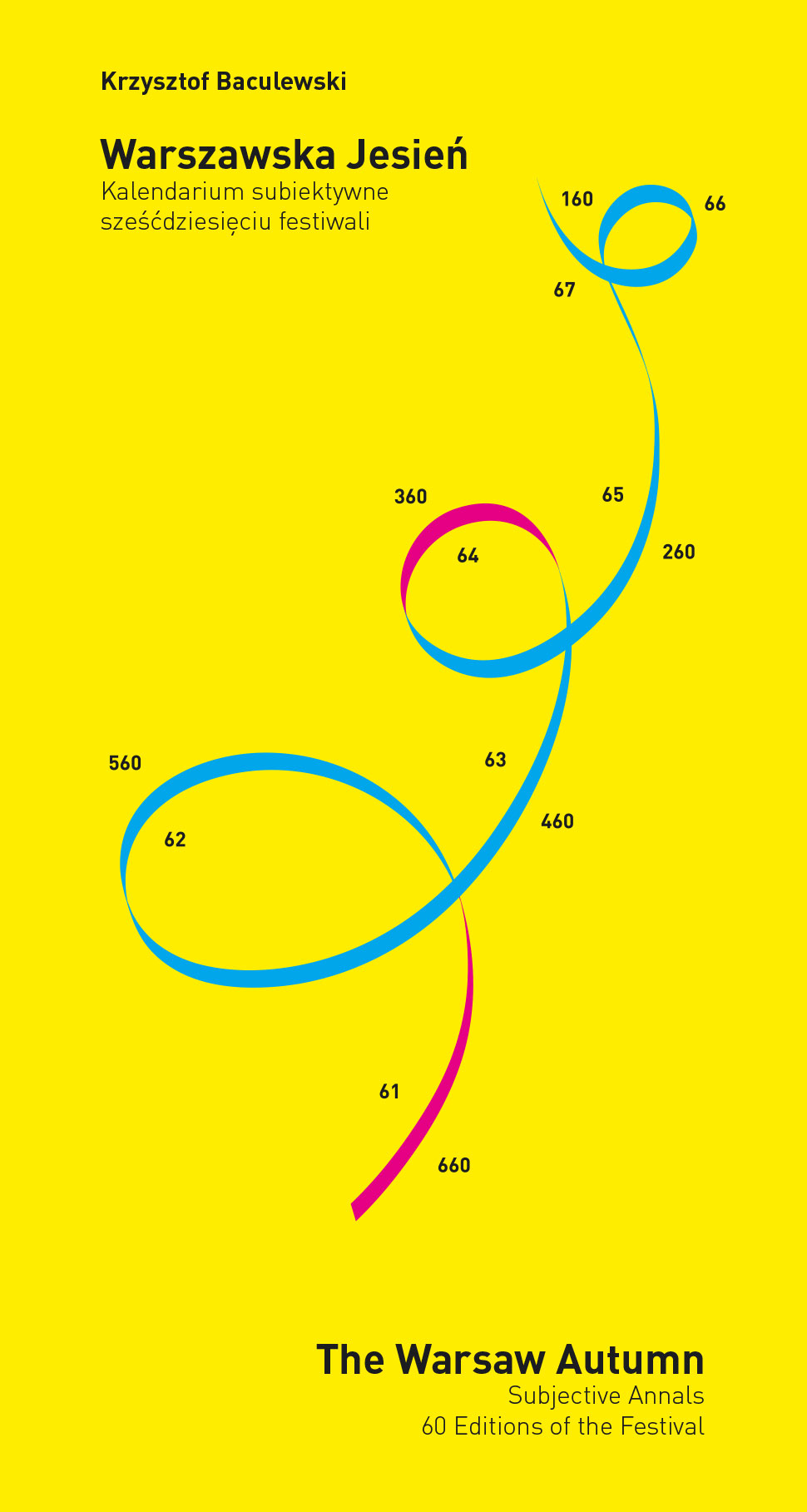

Krzysztof Baculewski "Subjective Annals 60 Editions of the Festival"
The central topic was the music of the Iberian Peninsula and Latin American countries. Hence the presentations of works by both wellknown and less famous composers representing those countries, such as Mauricio Kagel, Enrico Chapela, Alejandro Rossi, Mauricio Sotelo, Alejandro Viñao, José María Sánchez-Verdú, Miguel Azguime, Hèctor Parra, and Mario Lavista. ere were only four concerts dedicated wholly or partly to symphonic music, performed as usual by the PRNSO and Warsaw Philharmonic, but also by the Orquesta de Radio Television Española (two performances), as well as large ensembles: the Leopoldinum, Musik-Fabrik and the Camerata Silesia. Musical highlights: Maqbara for voices and orchestra by José María Sánchez-Verdú, Oscar Strasnoy's The End, Fabián Panisello's Concierto de Cámara, as well as the classic Méditations sur le mystère de la Sainte Trinité by Olivier Messiaen. Karlheinz Stockhausen, who had died in the previous year, was remembered with three pieces, including Hymnen 1-4 and Cosmic Pulses. Debuts of Polish composers: Aleksander Nowak, Jagoda Szmytka, Paweł Hendrich, Andrzej Kwieciński, and Wojciech Widłak. Of the 23 Festival concerts, ten were held outside the traditional concert halls. New venues included: Torwar Hall, Central Artistic Swimming Pool and the Auditorium of the Academy of Fine Arts. In that year, the Academy of Music changed its name to the F. Chopin University of Music.
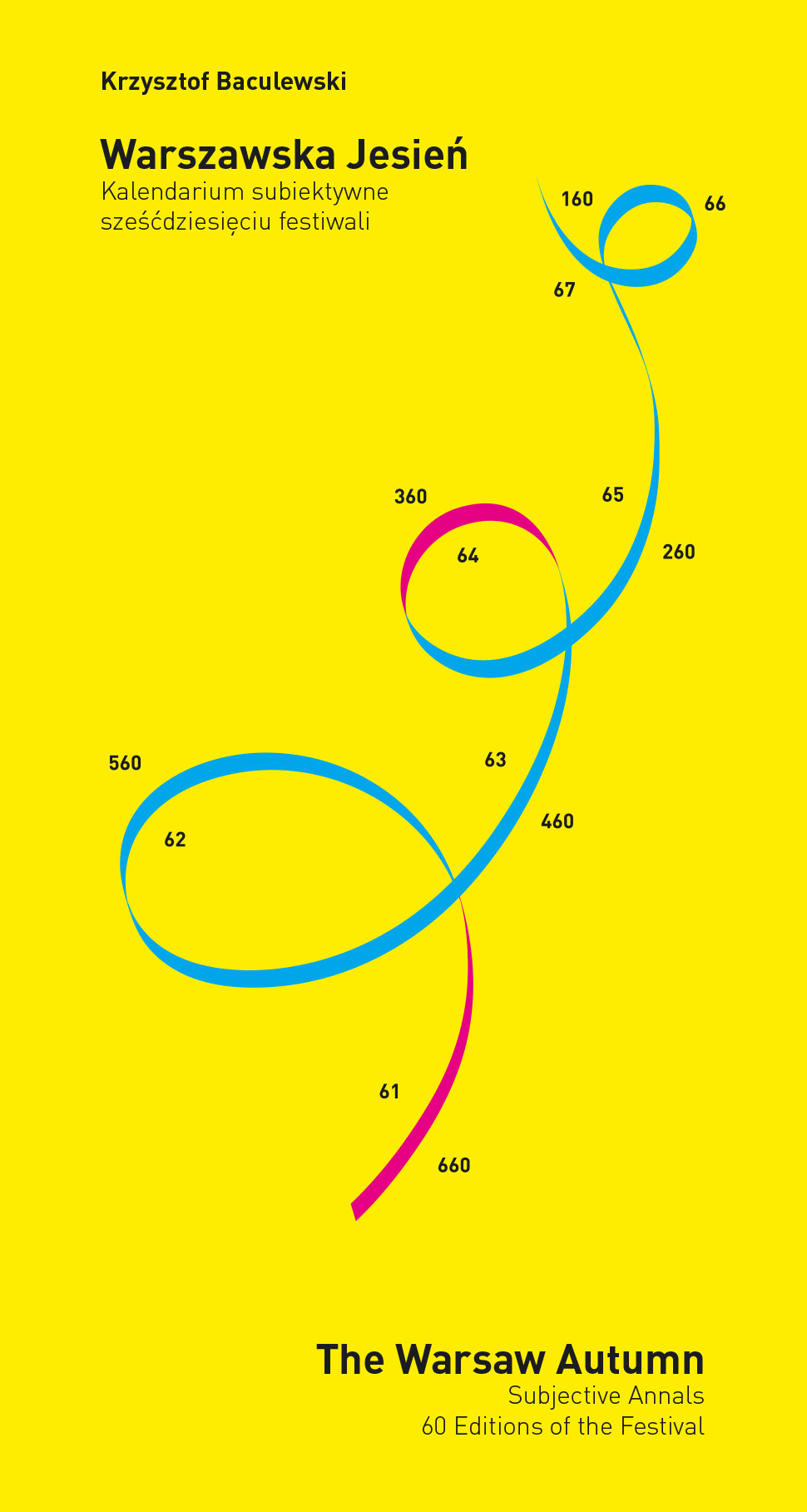

Krzysztof Baculewski "Subjective Annals 60 Editions of the Festival"
The leitmotifs were: instrumental and vocal music with electronics and purely electronic music. The opening piece, Cours des nuages by Ton Bruynèl, successfully combined instrumental and electroacoustic sounds. Other highlights included Edgar Varèse's Déserts; a concert dedicated to Pierre Henry's electroacoustic music; another concert exploring spatial phenomena, particularly - the unique echo in the Highest Voltage Hall of the Institute of Power Engineering; an installation by the Polish Association of Electro-Acoustic Music, and as a finale (!) - an electronic marathon in another post-industrial venue the Tęcza Studio in Żoliborz district. The Festival programme featured works by Georges Lentz, Paweł Szymański, Ewa Trębacz, Georges Aperghis, Fausto Romitelli, Per Nørgård, Steve Reich, Paweł Mykietyn's Passion According to St. Mark, and Cezary Duchnowski's operatic spectacle Martha's Garden. Composer debuts: Filip Matuszewski, Karol Nepelski, Piotr Roemer, Sławomir Wojciechowski, Stanisław Bromboszcz, and artists selected in the "Call for Sounds" competition: Anna Maria Huszcza, Martyna Kosecka, Sebastian Ładyżyński, and Marcin Rupociński.
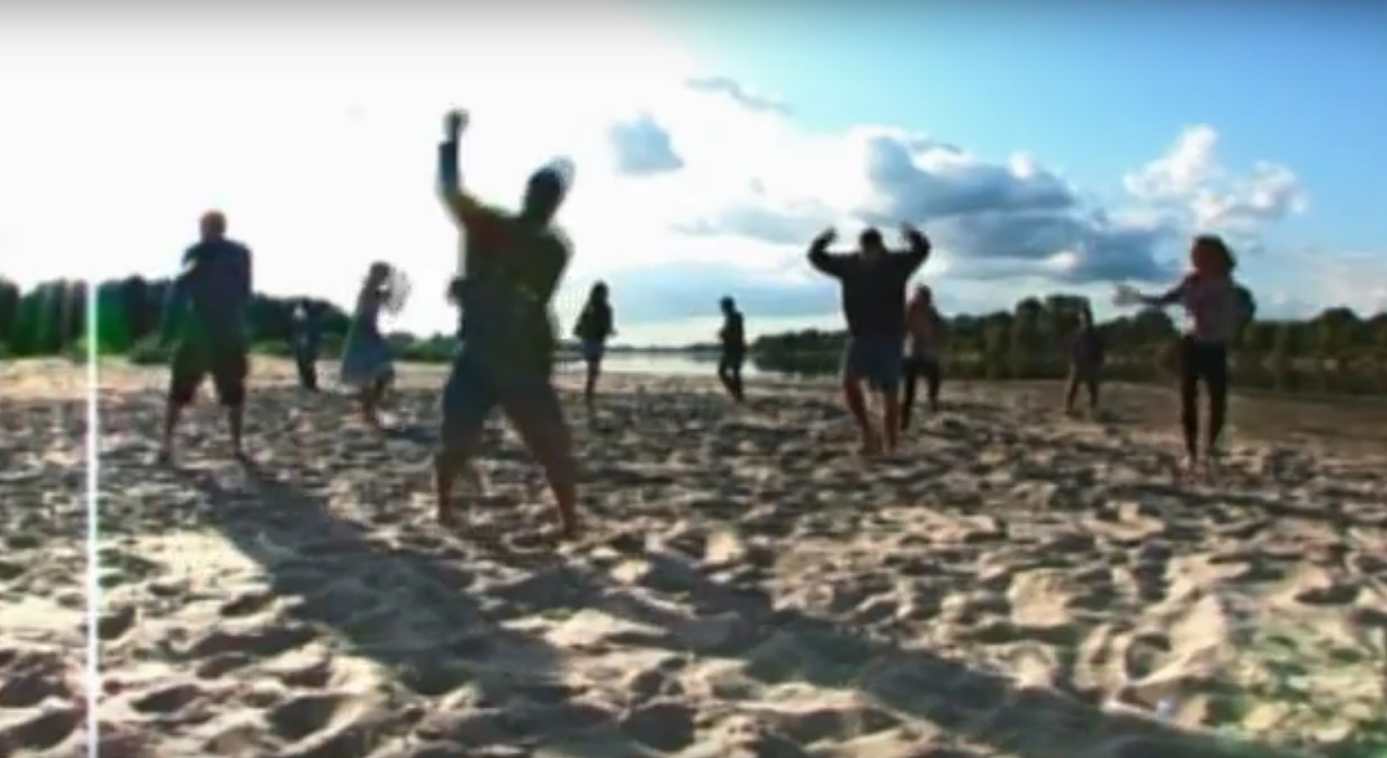
Warsaw Autumn video clip
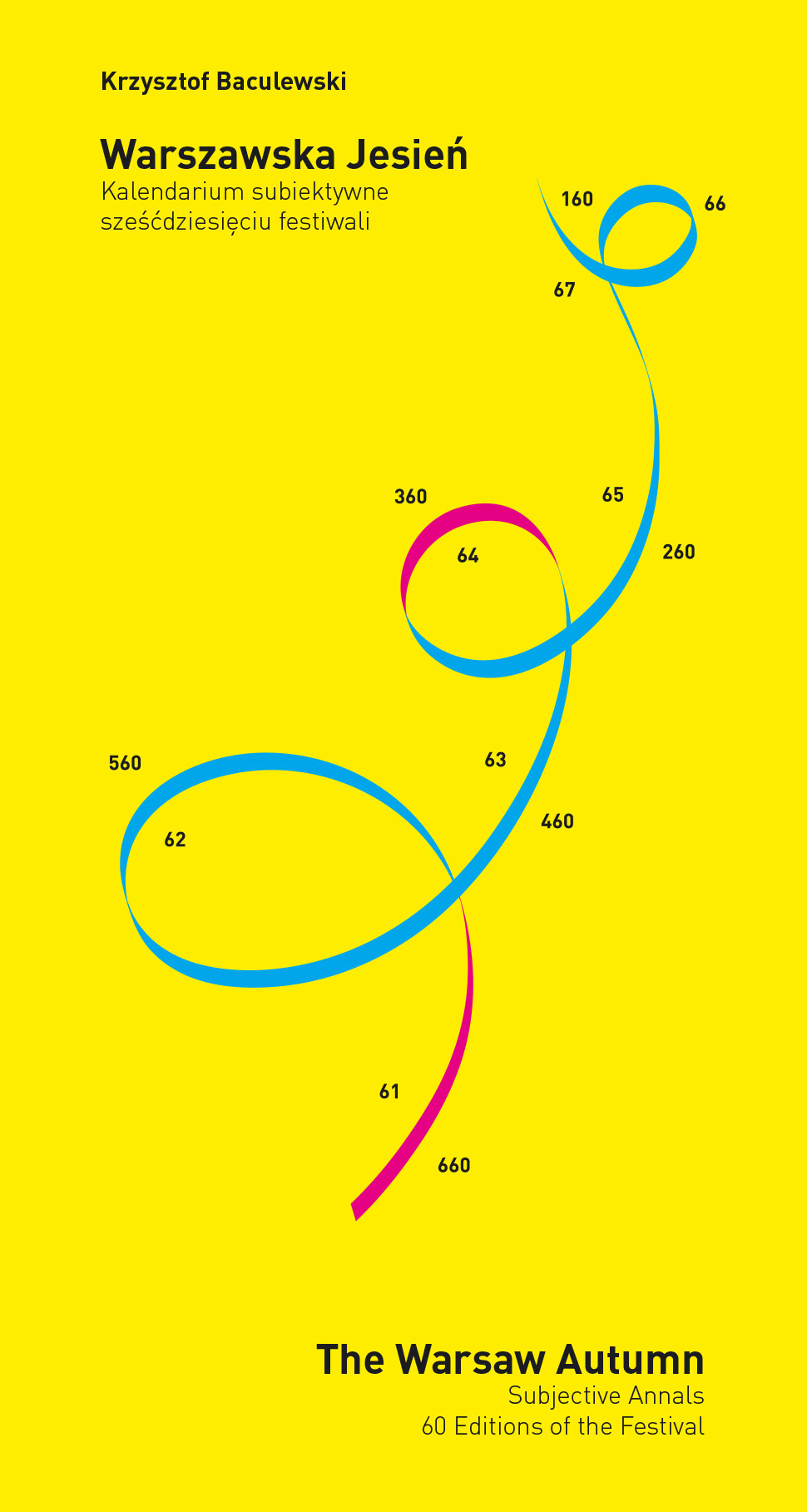

Krzysztof Baculewski "Subjective Annals 60 Editions of the Festival"
The main topic: music for keyboard instruments, including the accordion, harpsichord, harmonium, electro-acoustic instruments, midi piano, as well as the classical concert piano; all this with a symbolic reference to the bicentenary of Fryderyk Chopin's birth. The Festival music itself, despite the passage of two centuries, also referred to some extent to Chopin's works. Ensembles included: the Österreichisches Ensemble für Neue Musik, Orkest de Ereprijs, Les Percussions de Strasbourg, Musikfabrik, the international Ensemble Nikel, and the European Workshop for Contemporary Music. Sound installations were again present in abundance: Gordon Monahan's project was shown in Warsaw's Castle Square as a prelude to the Festival, and during the 'Warsaw Autumn' installations were presented in several Tęcza Studio interiors (Jarosław Kapuściński, Ignas Krunglevicius, Elisabetta Benassi, Lucia Ronchetti) and in the courtyard of the F. Chopin University (Marek Chołoniewski and Krzysztof Knittel). The Artistic Centre 25 changed its name to Soho Factory. The Festival programme featured works by, among others, Louis Andriessen, Ondřej Adámek, François-Bernard Mâche, Włodzimierz Kotoński, Fausto Romitelli, Bruno Mantovani, Beat Furrer, Agata Zubel, Misato Mochizuki, Claude Vivier, Mauricio Kagel, Cornelis de Bondt, Jerzy Kornowicz, and Lidia Zielińska. The Festival debuts: Marcin Stańczyk, Prasqual, Katarzyna Szwed, as well as installation authors: Marek Chołoniewski and Paweł Janicki. The 'Orpheus' Prize of the Association of Polish Artists-Musicians SPAM went to sound producer Ewa Guziołek-Tubelewicz for the realisation of the electronic part in Lidia Zielińska's In the Rear. In this way, the award committee emphasised the ever growing though still much underestimated role of sound producers in performances of not only electro-acoustic music.
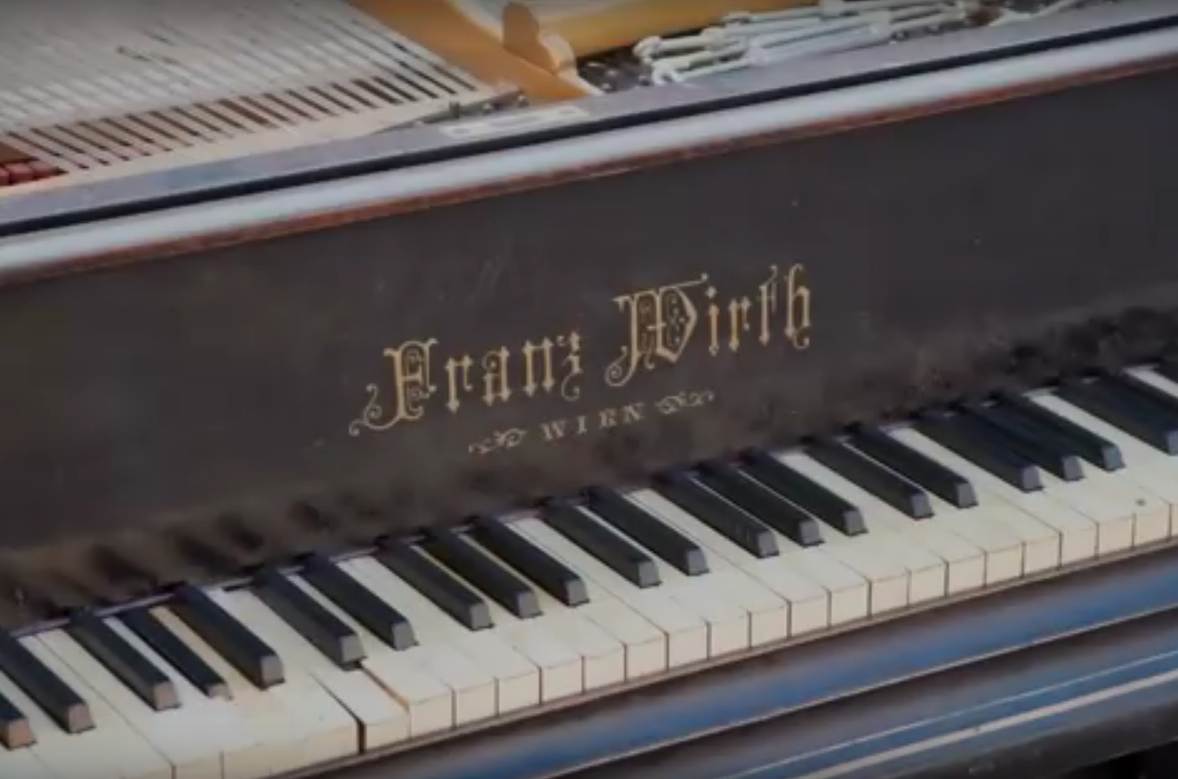
Gordon Monahan "A Piano Listening To Itself - Chopin Chord"
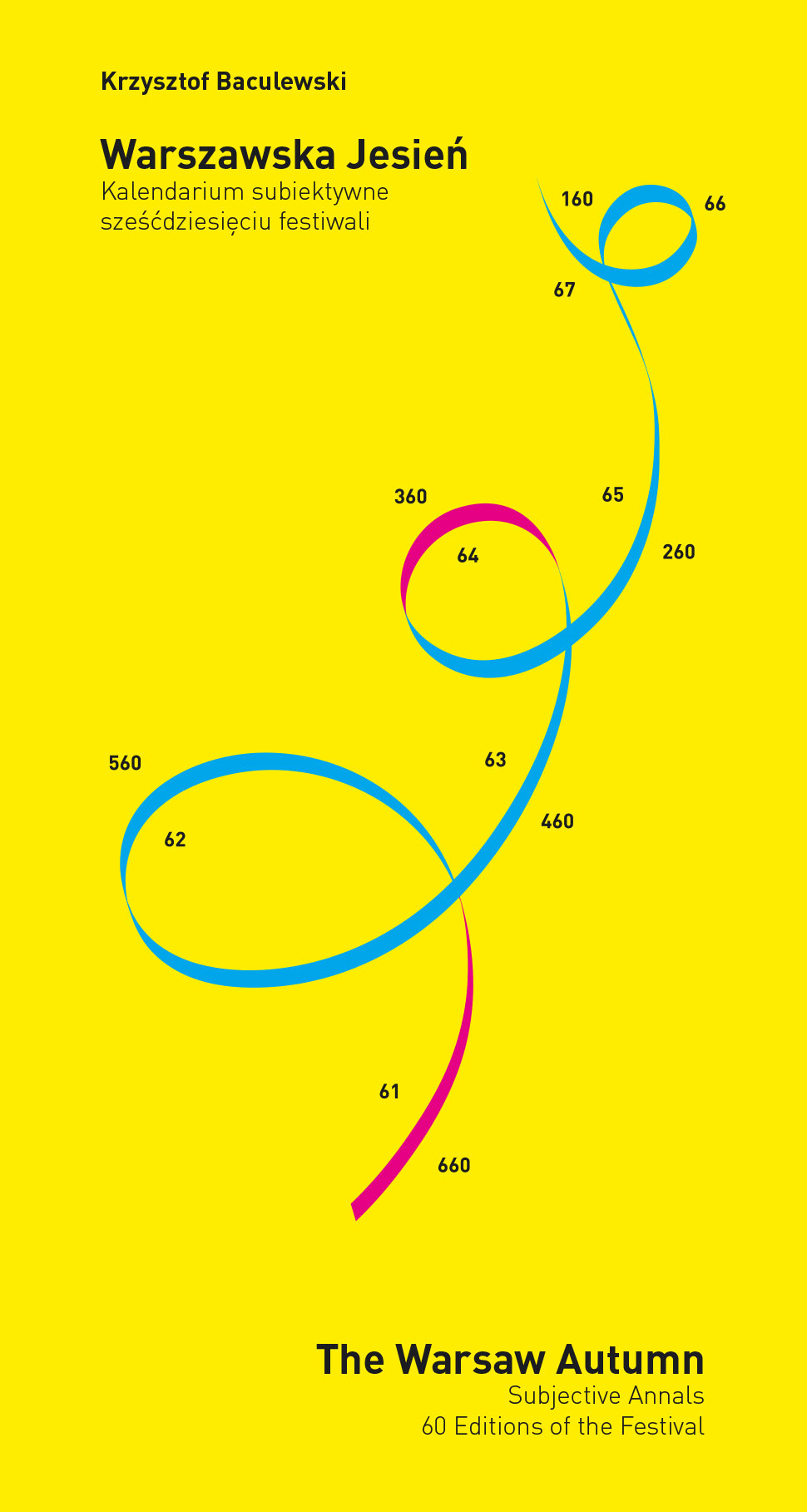

Krzysztof Baculewski "Subjective Annals 60 Editions of the Festival"
This edition of the Festival was dominated by social topics, related to or expressed through the music in various ways. Social issues were strongly present in several of the Festival works, including Phill Niblock's The Movement of People Working, Heiner Goebbels's Songs of War I Have Seen, Krzysztof Penderecki's Brigade of Death, and Luigi Nono's Il Canto sospeso. Performers: the London Sinfonietta, the New Music Orchestra, Neue Vokalsolisten, Musikfabrik, Schlagquartett Köln. New venues included the IMKA Theatre. Events of note: a series of concerts dedicated to Karlheinz Stockhausen's Klang cycle; Roman Berger's Missa pro nobis; Frederic Rzewski's recital of his own compositions. The 'Orpheus' SPAM Prize, then granted for the last time, went to conductor Lukas Vis and the Polish National Radio Symphony Orchestra for their performance of Andrzej Krzanowski's Symphony. SPAM discontinued the Orpheus Prize tradition in later years. at year's Festival edition saw the debut of Michał Moc, as well as one major novelty: the 'Little Warsaw Autumn', featuring events for children aged 5-12: concerts, spectacles, outdoor games and installations. From that moment on, the 'Little Warsaw Autumn' has remained an important element of the Festival.
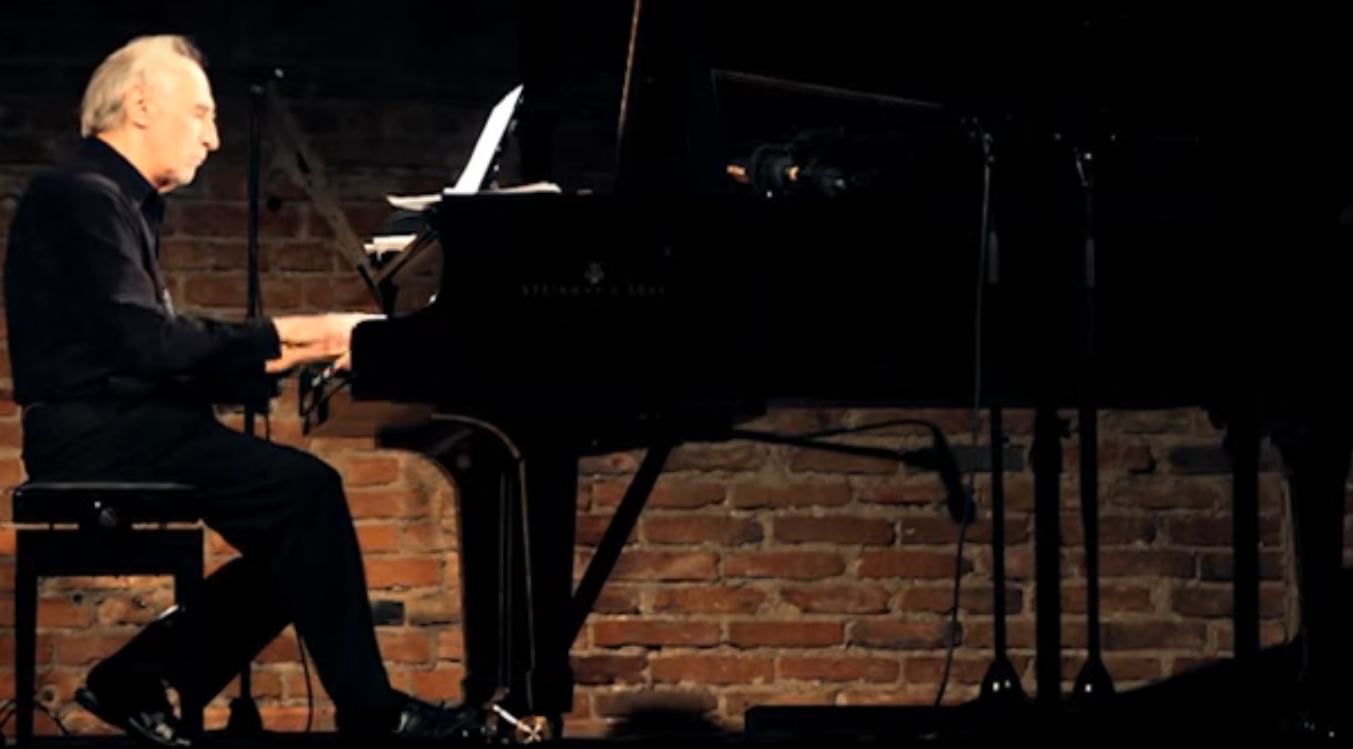
Interview with Frederic Rzewski
23rd September 2011, 22:30 - "Fabryka Trzciny" Arts Centre
Etude, Nanosonatas Book 7, De Profundis
video: Marek Dolewka, studioFILMLOVE
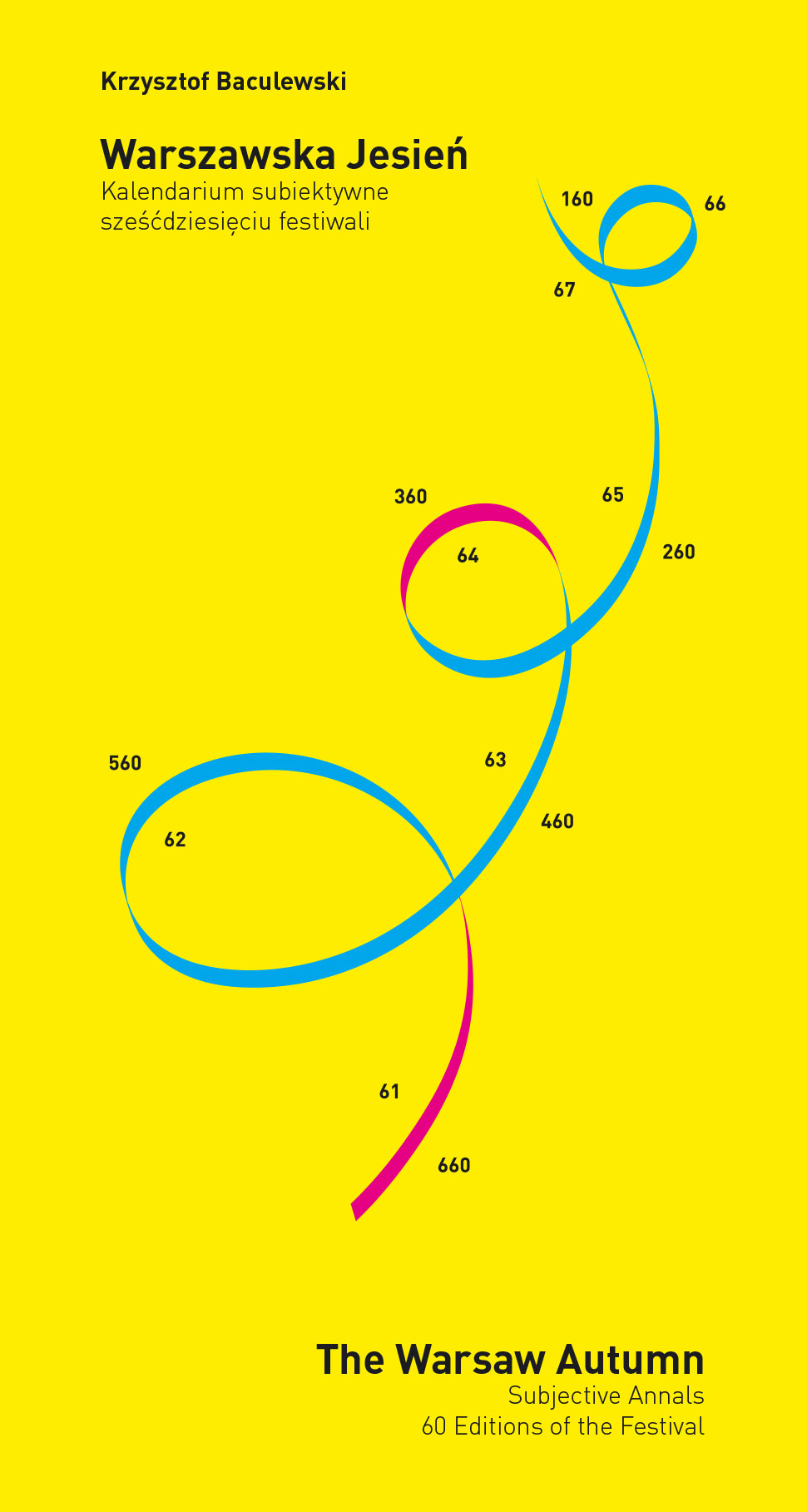

Krzysztof Baculewski "Subjective Annals 60 Editions of the Festival"
The focus of this edition was the word, and all that is associated with or results from words: speech, song, text, stage action, dance, anecdotes, images, metaphors, etc. This topic was illustrated with such works as Jonathan Harvey's Speakings, Mauricio Kagel's Ein Brief, György Kurtág's Four Songs to Poems by Anna Akhmatova, Tadeusz Wielecki's Points of Hearing, Oscar Strasnoy's Geschichte, Salvatore Sciarrino's Cantiere del poema, Krzysztof Wołek's The Body, Paweł Szymański's Phylakterion, Kaija Saariaho's D'Om le vrai sens, Georges Aperghis' Luna Park, Arnold Schoenberg's Pierrot lunaire, as well as Maciej Jabłoński and Przemysław Fiugajski Lunar Pierrot. The 'Little Warsaw Autumn' was hosted by the Zachęta Gallery and the Royal Łazienki Park (several events). Composer debuts: Wojciech Blecharz and Joanna Woźny.
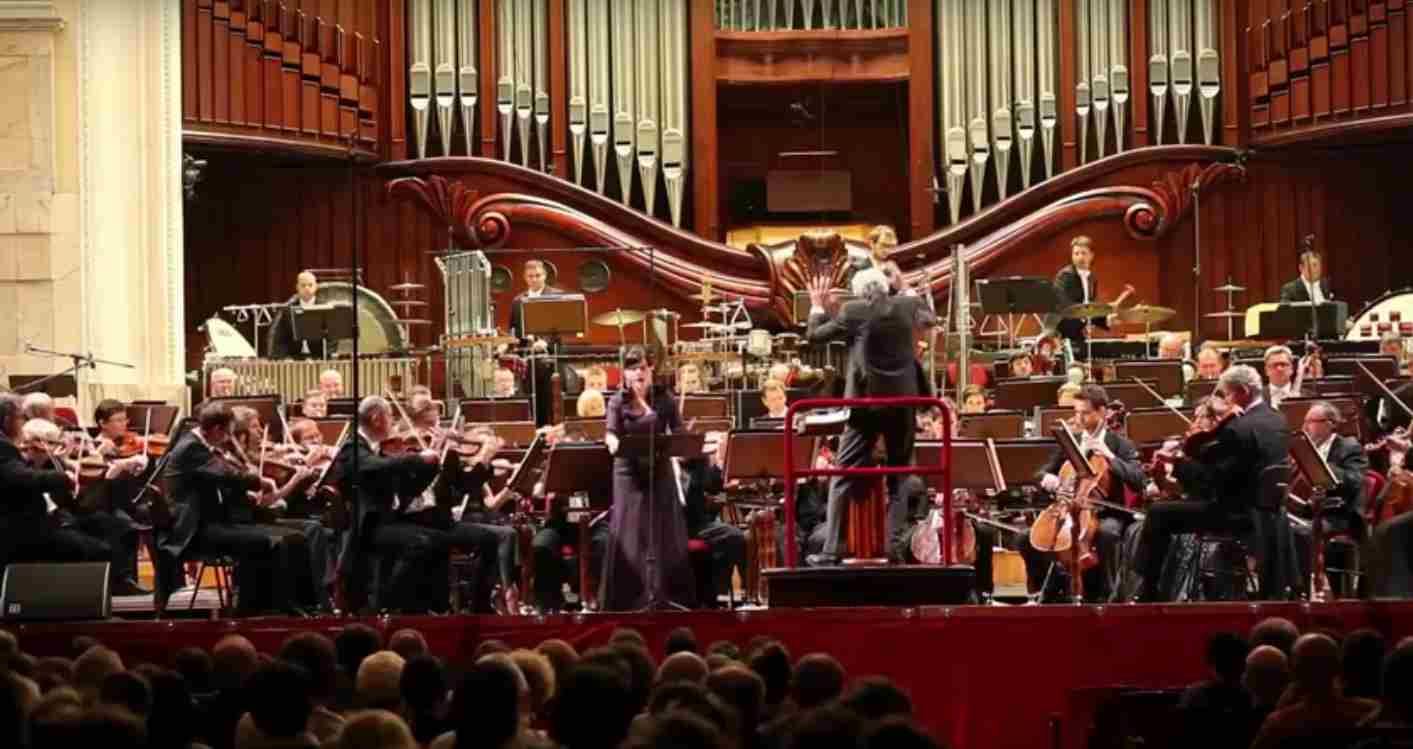
A glance at Warsaw Autumn
video: studioFILMLOVE
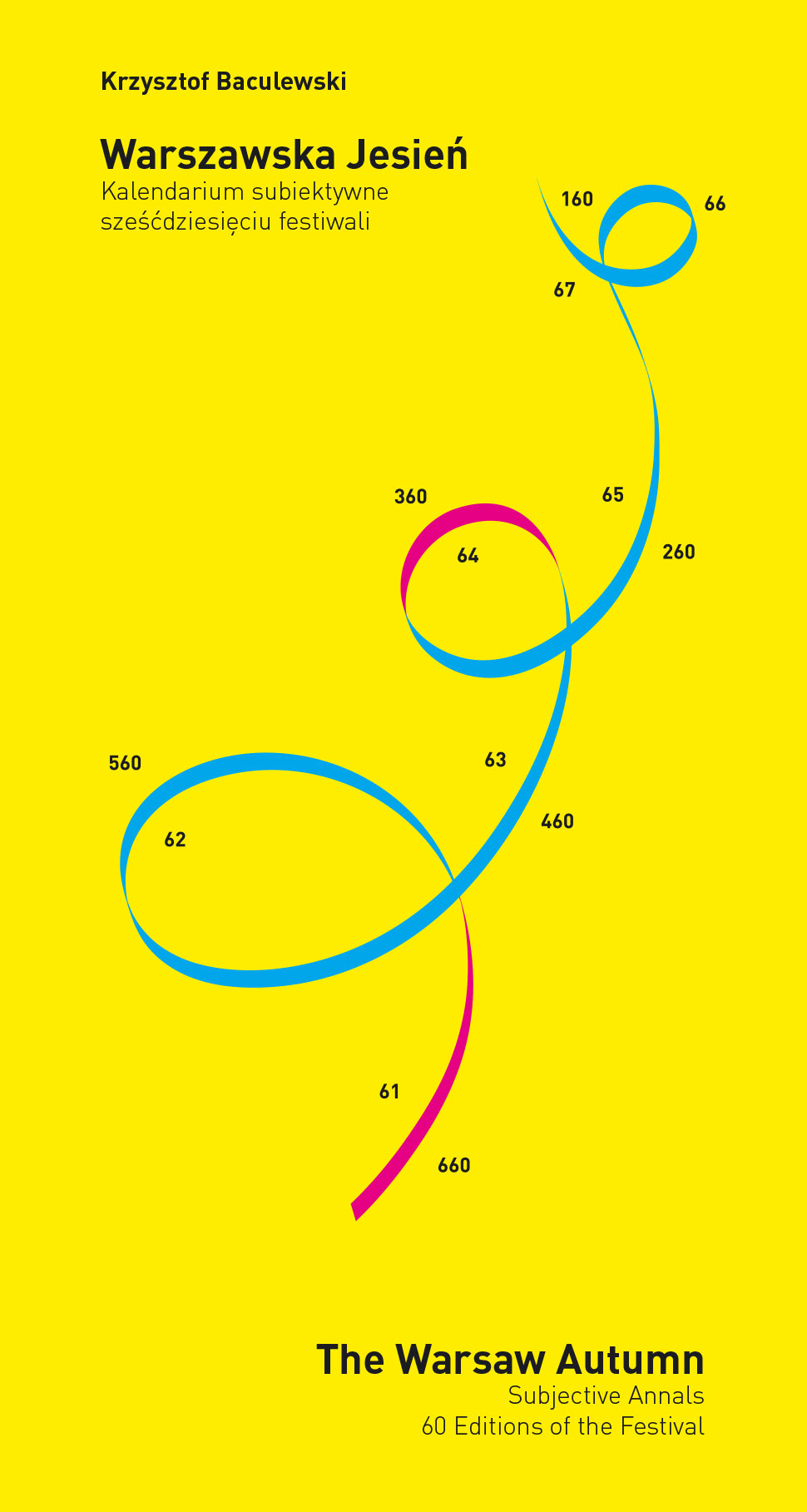

Krzysztof Baculewski "Subjective Annals 60 Editions of the Festival"
New works set against the backdrop of contemporary classics - or perhaps vice versa. is edition revived and repeated 'Warsaw Autumn' events from the Festival's history: Kazimierz Serocki's Symphonic Frescoes (1964), Krzysztof Penderecki's St Luke Passion (1966), three string quartets by Henryk Mikołaj Górecki - the 1st of 1991, the 2nd of 1993, and a premiere performance of the 3rd, as well as Witold Lutosławski's Piano Concerto of 1988. The other, more 'recent' face of the Festival was represented by the innovative spaceand-light solutions of José María Sánchez-Verdú's Libro de las estancias, Fabiàn Panisello's Libro del frio and the multimedia opera A Laugh to Cry by Michel Azguime - an attempt at a synthesis of speech and sound. Apart from well-known symphony orchestras, the Festival hosted: Ensemble Phoenix of Basel, the Experimental Studio des SWR, Ensemble Modern, the Silesian Quartet, and Kwartludium. The programme included premieres of large forms: the theatrical Machinae coelestes by Stanisław Krupowicz and Tam (There) for violin, voices and instruments, with a choir placed where the string orchestra would traditionally sit. The Festival closed with Thomas Adès's Totentanz, in memory of Danuta and Witold Lutosławski, which divided the audience into enthusiasts of the music and those opposed to the dedication. Debuts by Miłosz Pękala and Grzegorz Pieniek. The 'Little Warsaw Autumn' continued with new projects.
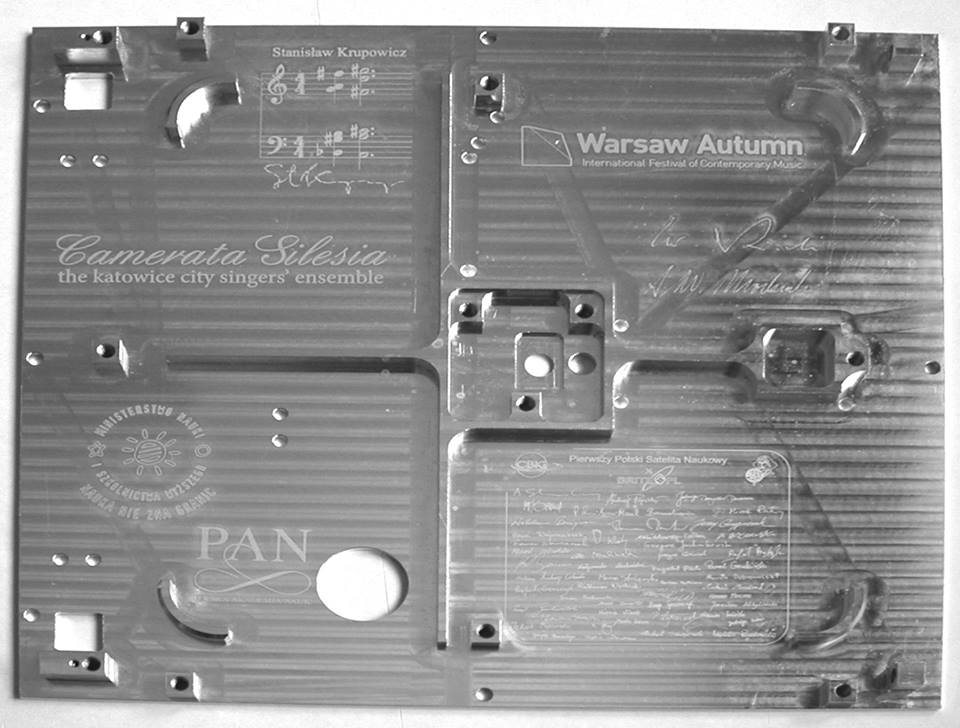

The side panel of the Polish scientific satellite Heweliusz. The construction of the Polish satellites Lem and Heweliusz was commemorated by a commission from the Warsaw Autumn and the Space Research Centre of the Polish Academy of Sciences
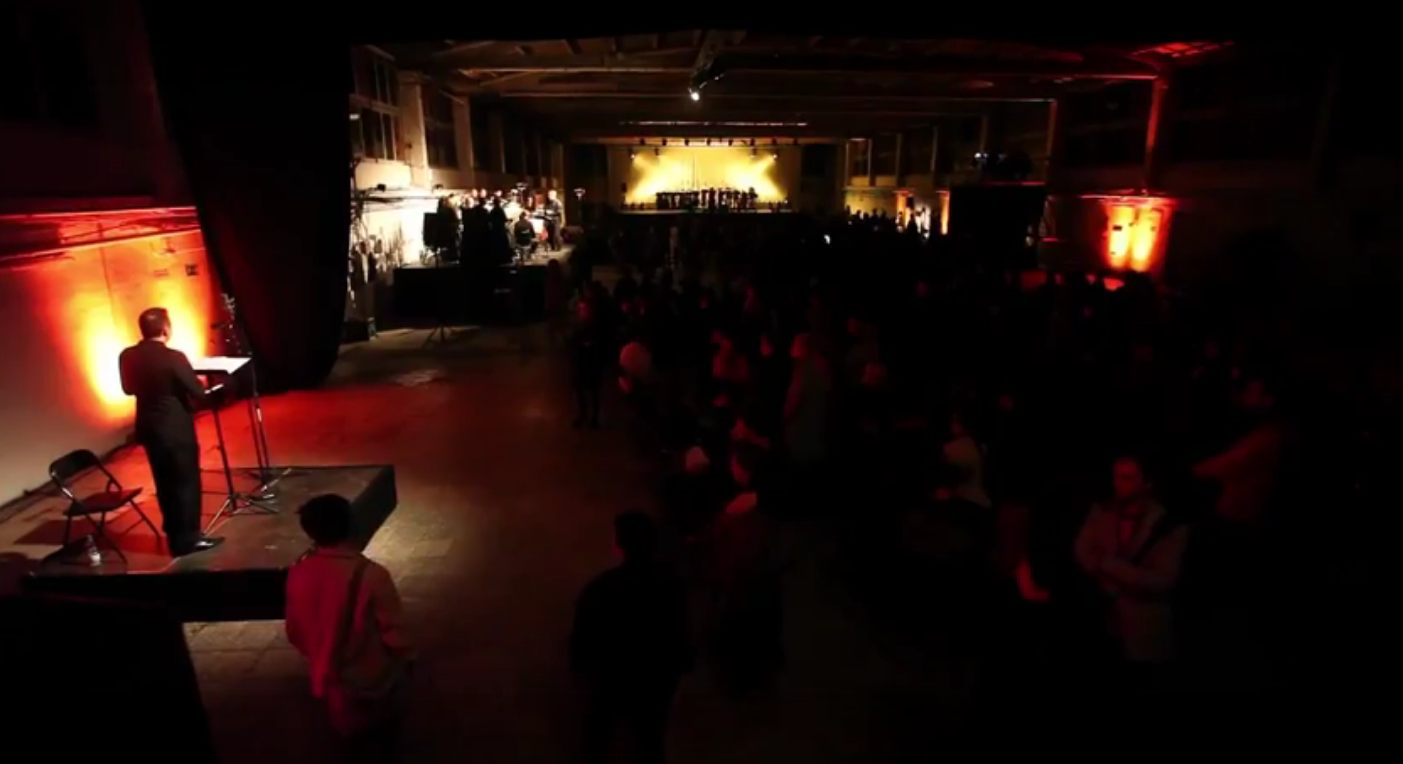
José María Sánchez-Verdú "Libro de las estancias"
SOHO FACTORY/ 21.09.2013/ 19.30
NEW MUSIC ORCHESTRA
Katowice City Singers' Ensemble CAMERATA SILESIA
Anna Szostak, choirmaster
Carlos Mena, countertenor
Marcel Pérès, Arab voice
Isabel Puente, piano
EXPERIMENTALSTUDIO des SWR, sound projection
José María Sánchez-Verdú, conductor
Szymon Bywalec, conductor
José María Sánchez-Verdú Libro de las estancias
video: studioFILMLOVE
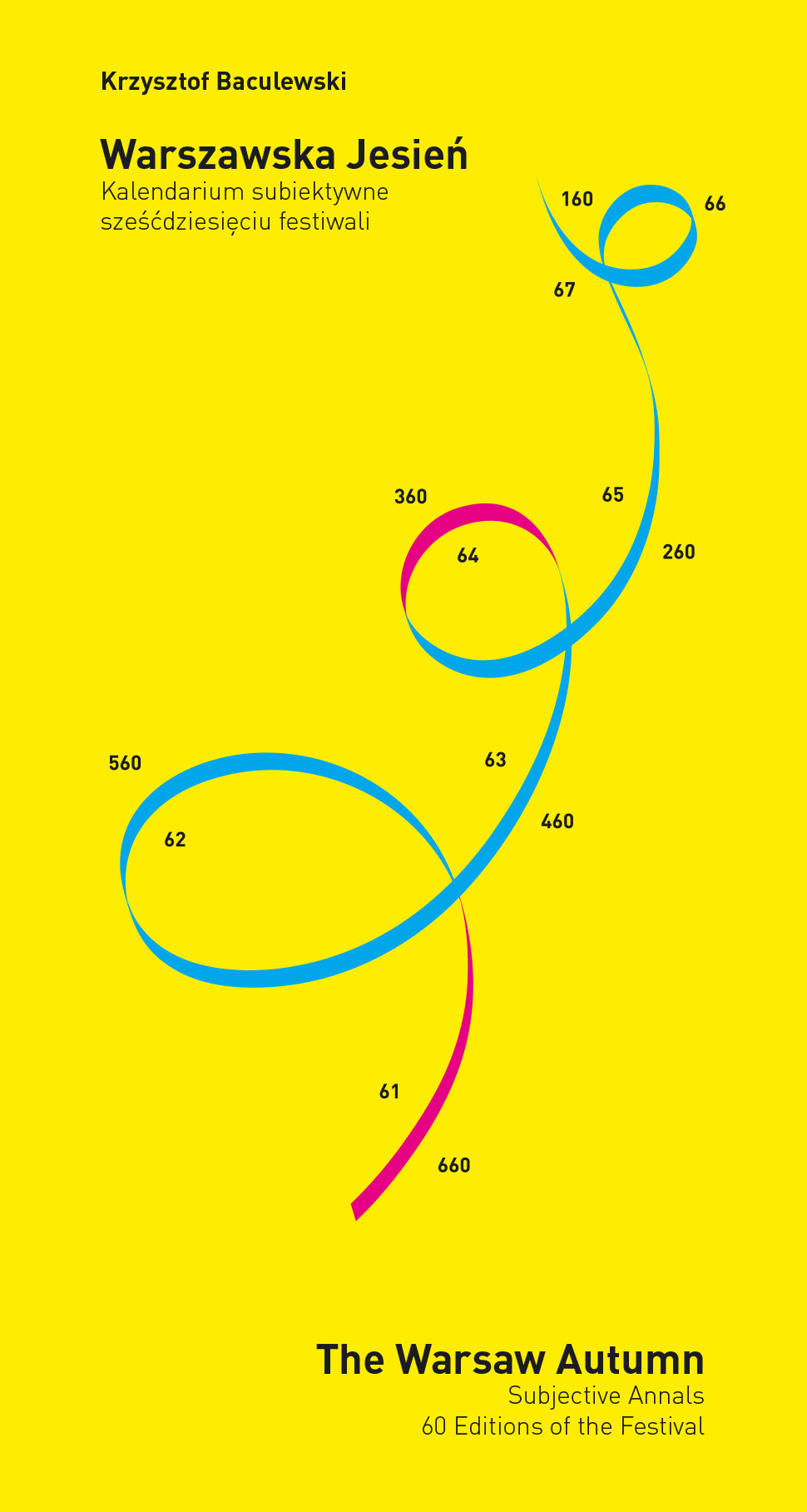

Krzysztof Baculewski "Subjective Annals 60 Editions of the Festival"
The leitmotif was music instruments: new and unknown as well as old-historical; exotic and folk, as well as exotic vocal techniques. The list of featured instruments is impressive: those of the European Renaissance (Mauricio Kagel - Kammermusik für Renaissance-Instrumente) and Baroque (ensemble Arte dei Suonatori); a duo of contrabass clarinets; Chinese folk instruments (Forbidden City Chamber Orchestra); folk instruments of the Bolivian Indians (Orquesta Experimental de Instrumentos Nativos); natural horns (György Ligeti - Hamburgisches Konzert); contemporary performance techniques on the harpsichord (soloist Goska Isphording); Breton bagpipes (soloist Erwan Keravec); the gamelan, didgeridoo, shō, koto, guzheng; glass harmonica (Jörg Widmann - Armonica), electric zither, as well as electronics. Of the latter there was a lot as usual, but electronics also appeared here in a new role. Kazimierz Serocki's Pianophonie of 1978, produced with live electronics (mostly analogue technology at that time) was - in the absence of the original historical devices - reconstructed in digital form. The programme also featured rare guests: South American composers (Alejandro Cardona of Costa Rica, Graciela Paraskevaídis of Argentina, Cergio Prudencio of Bolivia), composers from China (Wenjing Guo, Yi Chen, Wenchen Qin) as well as from cultures geographically closer and more familiar to the Polish audience. Polish debut: the Young Composers from Cracow group, consisting of Piotr Peszat, Szymon Strzelec, Kamil Kruk, and Piotr Roemer. For the first time in very many years, young composers presented themselves at the Festival as a group, professing the same modernist artistic world view - though significantly differing in specific musical solutions. The 'Little Warsaw Autumn' expanded, with an installation in the Królikarnia, a performance in the Łazienki Park, concerts in the Fabryka Trzciny (Reed Factory), as well as a location-based game at the seat of Agora SA.
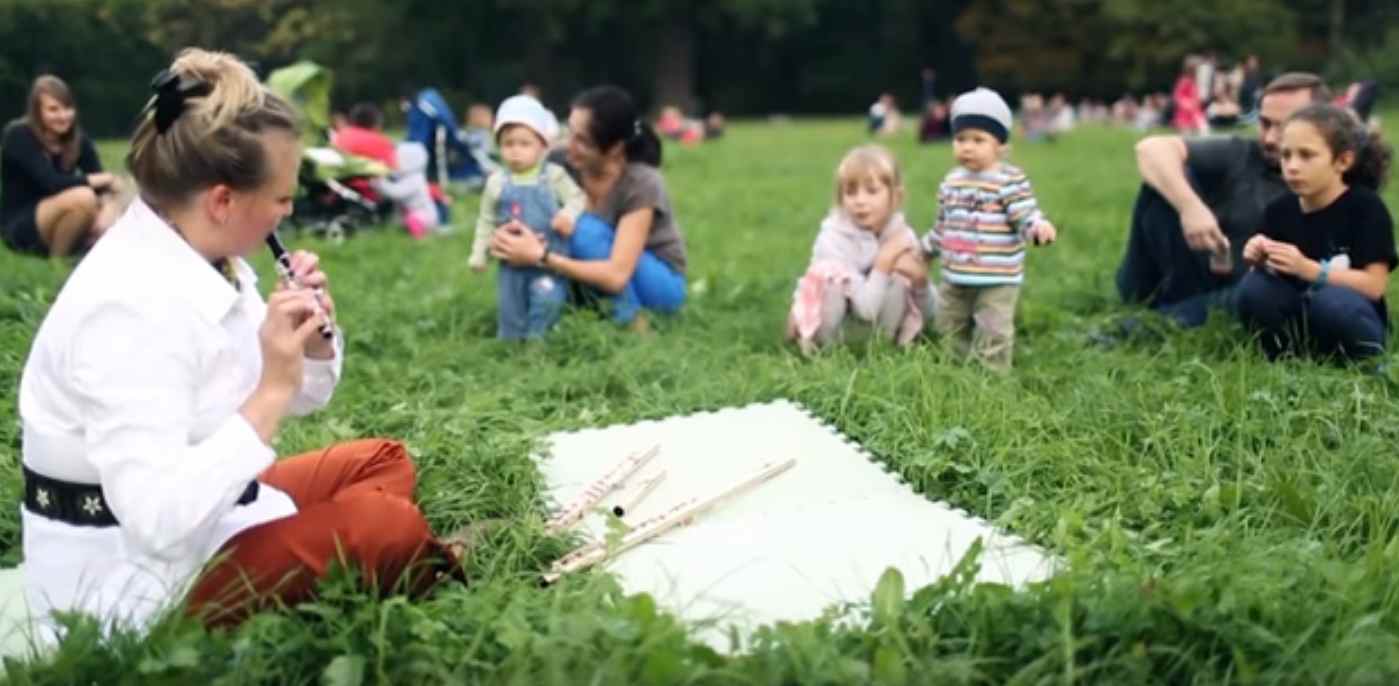
Little Warsaw Autumn
video: studioFILMLOVE
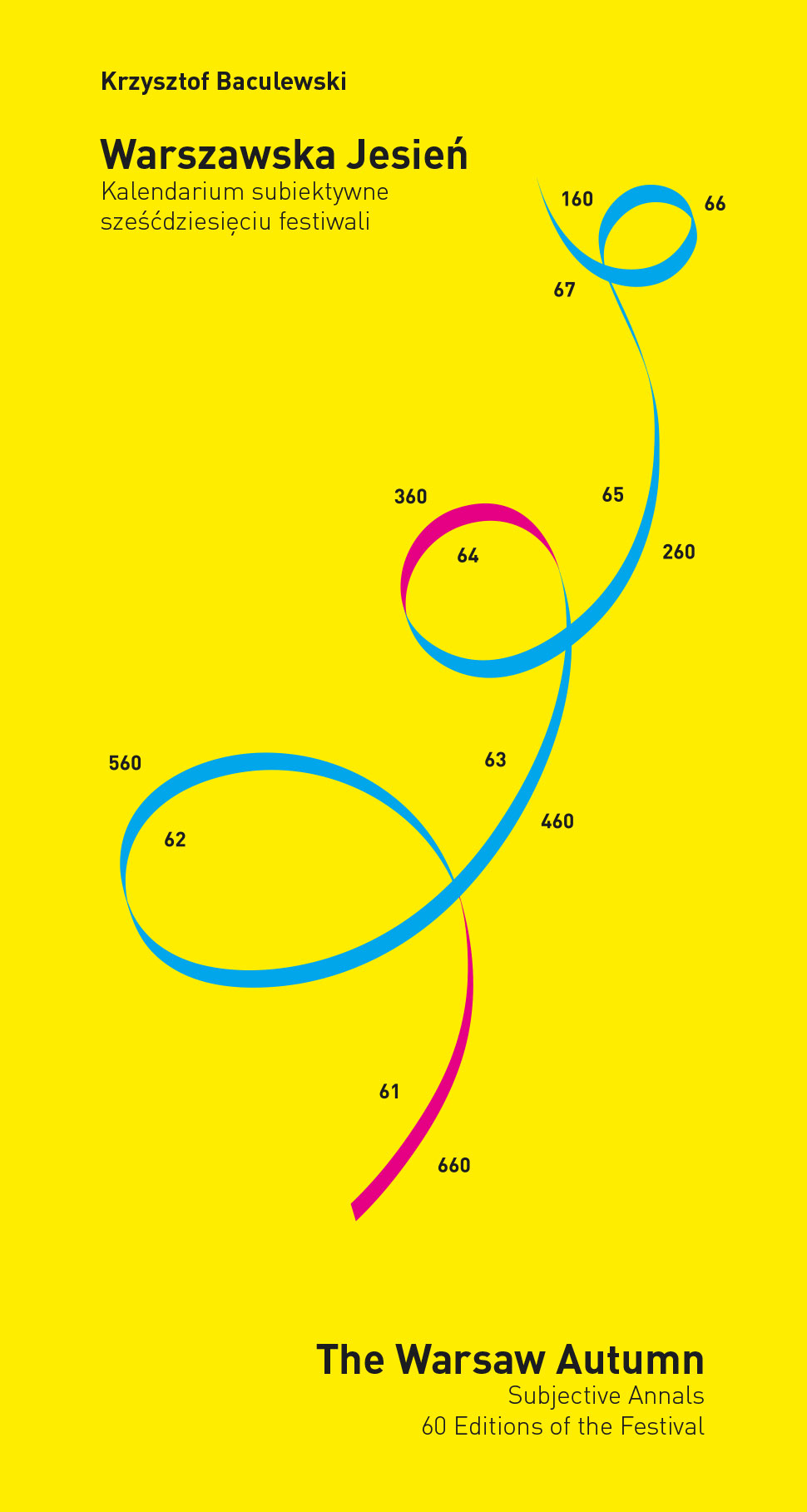

Krzysztof Baculewski "Subjective Annals 60 Editions of the Festival"
The motto of the 'Warsaw Autumn' 2015 - dynamistatics - was coined by Krzysztof Szwajgier, whose eponymous essay opens the programme book. This neologism aptly reflects the ambiguity of the terms dynamics and statics, as frequently applied to music. Half a century earlier, Monika Gorczycka had come forward with the term 'static energy', used with reference to Karol Szymanowski's music. Both terms bring out the apparent contradiction between the two juxtaposed elements. The phenomenon to which this edition of the Festival was dedicated is by no means unknown, but may not have received appropriate attention and/or recognition.
'Frozen' time appears in La Monte Young's The Second Dream of the High-Tension Line Stepdown Transformer of 1962 as well as the recent Slices by Alvin Lucier (2007) and Baobab by Phill Niblock (2011). Action, drama and change can be found in Philippe Monoury's Zones de turbulences (2013) and James Dillon's New York Triptych (2012); new complexity - in Brian Ferneyhough's La Chute d'Icare (1988) and Witold Szalonek's Improvisations sonoristiques (1968). And finally, the high and low tides of musical energy can be heard in Giacinto Scelsi's Anahit (1965), Gérard Grisey's Périodes (1974), Toshio Hosokawa's Woven Dreams (2010), and even in Paweł Szymański's Partita III (1986). 'Frozen movement', on the other hand, imbues Jerzy Kornowicz's The Big Crossing (2013). Debuts of Michał Pawełek, Kasper Teodor Toeplitz (quasi noise) and Marta Śniady (Aer of 2015 for clarinets and ensemble).
In all the groups of works performed at this 'Warsaw Autumn', a wide range of dates of composition was represented, which demonstrates the long-time rooting of these phenomena in new music. Other events of note included a concert by the Leoš Janáček Philharmonic of Ostrava - featuring a demanding programme, with Mural by José María Sánchez-Verdú. New venues: Praska Drukarnia (Old Printing House in Praga) and ATM Studio in Wawer, which hosted the first performance of Jagoda Szmytka's multimedia opera Lost Play, drawing on pop culture and the internet in an ironic-critical context.
The 'Little Warsaw Autumn' was now almost as long as the main Festival.
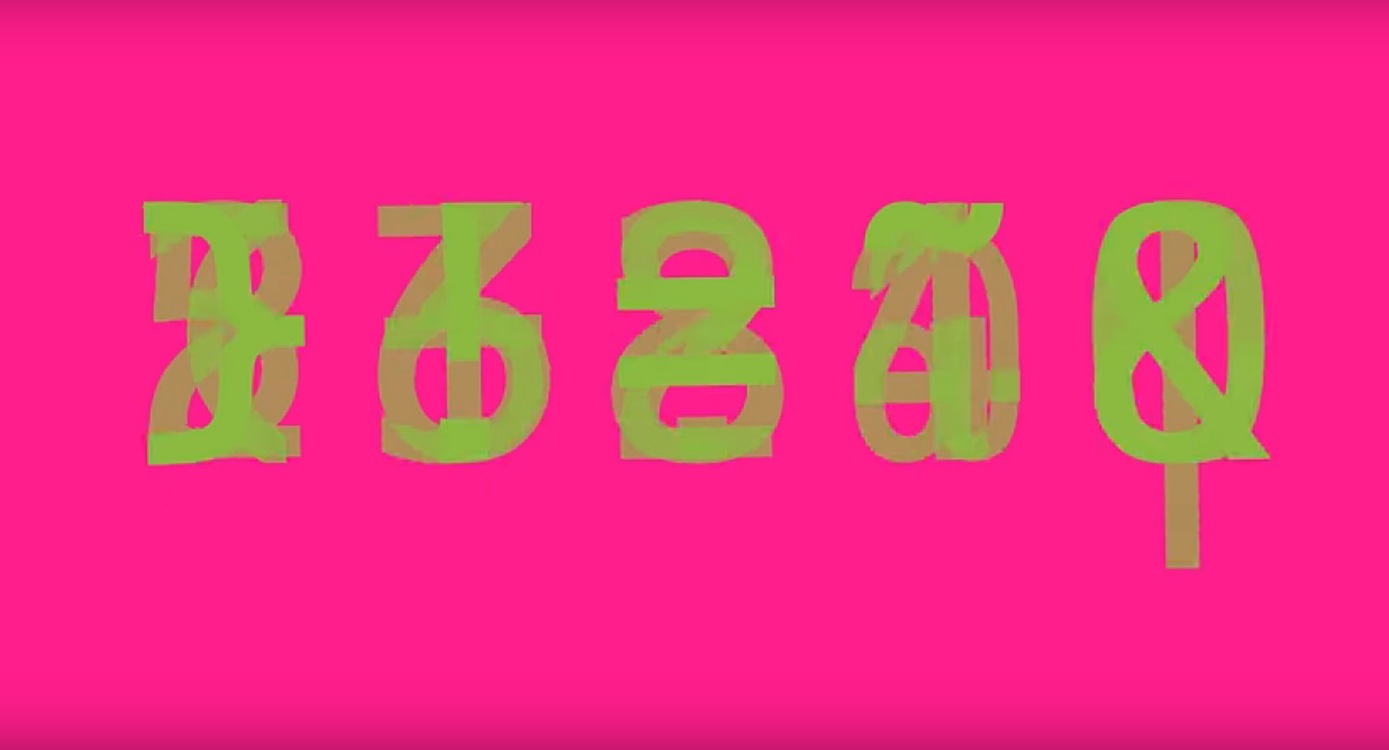
Warsaw Autumn video clip
screenplay and realization: Adam Dudek / Delikatesy&Frykasy, music: Stefan Prins Fremdkörper #1 performed by Nadar Ensemble (excerpt)
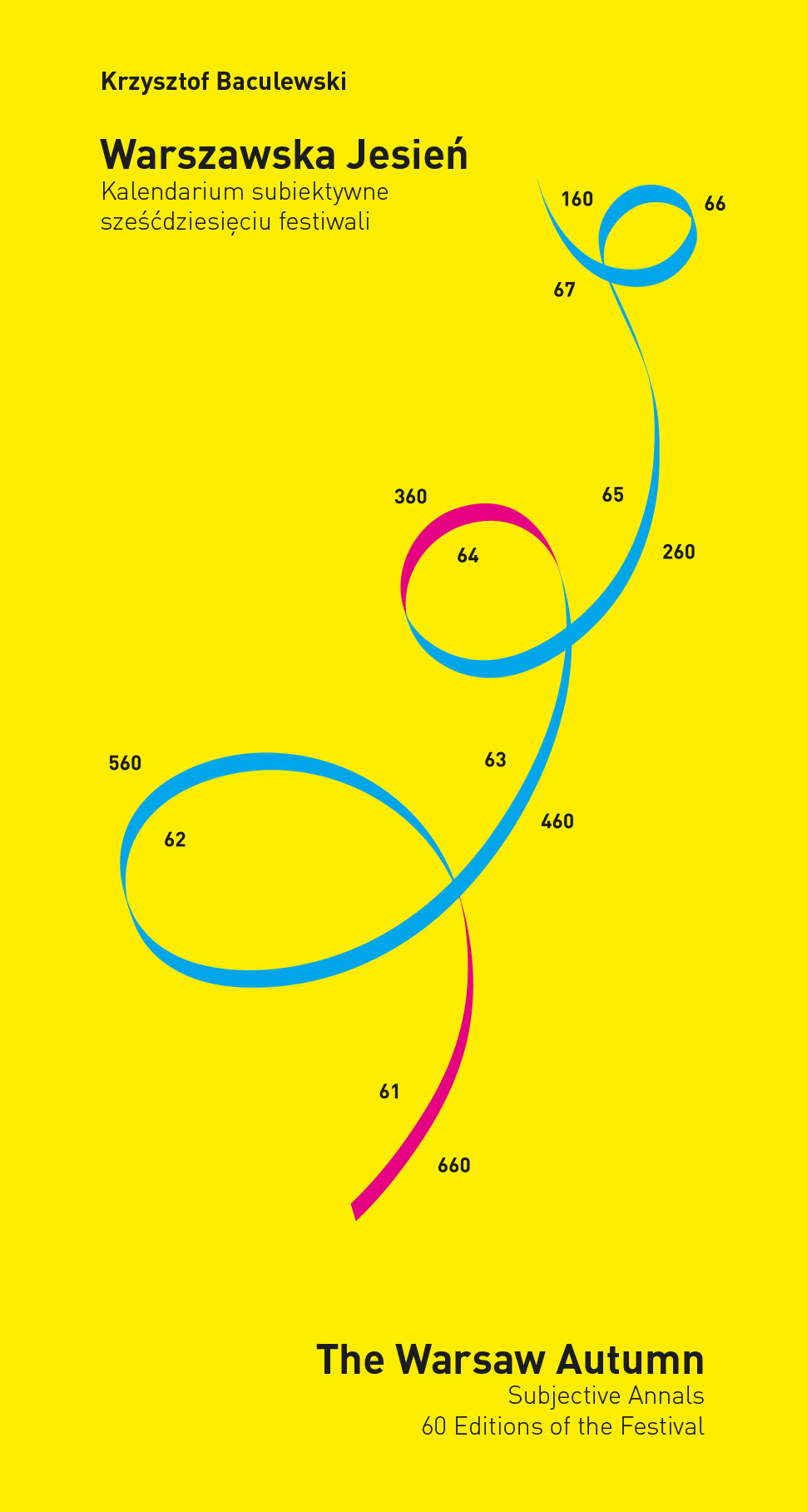

Krzysztof Baculewski "Subjective Annals 60 Editions of the Festival"
The slogan 'Opera Operations' (the Polish version was 'In the Fumes of the Opera') brings to mind associations with the prewar volume by Julian Tuwim and Antoni Słonimski In the Fumes of Absurd. This was not so far removed from operatic culture, but it is not this aspect of the opera that the 'Warsaw Autumn' programme authors wished to emphasise. ere have been literary inspirations in the presented spectacles: Mann's The Magic Mountain in Paweł Mykietyn's opera, Elfriede Jelinek's prose in Olga Neuwirth's Lost Highway, Sophocles' Electra in Iannis Xenakis' Polla ta Dhina, a play by Michel de Ghelderode in György Ligeti's Mysteries of the Macabre, Albert Camus' Le malentendu in Fabiàn Panisello's composition, and the biography of Gesualdo da Venosa in Salvatore Sciarrino's Luci mie traditrici. Naturally, voice manifests itself in these works in various ways, and its uses go beyond the traditional sphere, as does the application of literary texts derived from different sources, traditions and contexts. Apart from the operas, the Festival also featured other works, such as Philippe Hurel's Tour à tour, Grażyna Pstrokońska-Nawratil's Rain Forest, Edgard Varèse's Tuning Up, and Aureliano Cattaneo's Violin Concerto. A new outstanding talent emerged in the field of music interpretation - the soprano Joanna Freszel, who won the audience's hearts with her daring performance of Ligeti's scene. Wojciech Błażejczyk made his debut with Trash Music and - for contrast, one might say Zo a Dowgiałło with her subtle orchestral Composition with Motion Background. The 'Little Warsaw Autumn' - by now an obligatory segment of the Festival - offers music and related games and plays to the youngest audience, thus filling a gap in children's education concerning contemporary music. It teaches how to perceive, and make contact with, contemporary music and other arts, proving that they do not necessarily have to be elitist, alien or incomprehensible.
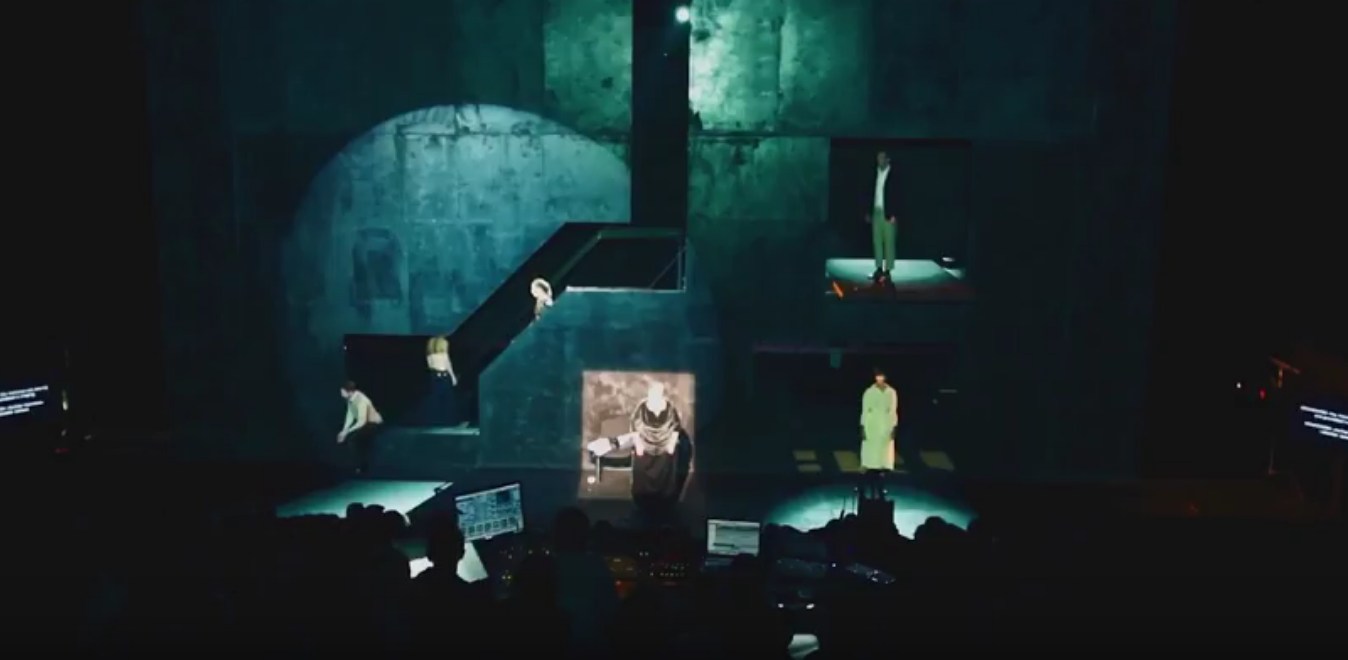
Paweł Mykietyn "The Magic Mountain"
Nowy Teatr International Cultural Centre / 18.09 / 19:30
Małgorzata Sikorska-Miszczuk, libretto concept, libretto
Andrzej Chyra, libretto concept, direction
Mirosław Bałka, stage design
Agata Zubel, soprano (The American)
Łukasz Konieczny, bass (Behrens)
Szymon Maliszewski, bass-baritone (Joachim)
Szymon Komasa, baritone (Hans)
Barbara Kinga Majewska, soprano (Clavdia)
Juan Noval–Moro, tenor (Krokowski)
Urszula Kryger, mezzo-soprano (Naphta)
Jadwiga Rappé, alto (Mrs. Stöhr)
Marcin Habela, baritone (Peeperkorn)
Karol Kozłowski, tenor (Settembrini)
Anna Gadt, (choir / Elly Brand)
Agnieszka Kiepuszewska, (choir / Marusja)
Michał Dembiński, (choir / Wehsal)
Iwona Kmiecik, (choir)
Jacek Kotlarski, (choir)
Marcin Wawrzynowicz, (choir)
Adam Banaszak, musical direction
Magdalena Maciejewska, costume design
Maria Stokłosa, stage motion
Bartosz Nalazek, lighting direction
Ewa Guziołek-Tubelewicz, sound projection
Paweł Mykietyn The Magic Mountain (opera after the novel by Thomas Mann)
video: studioFILMLOVE
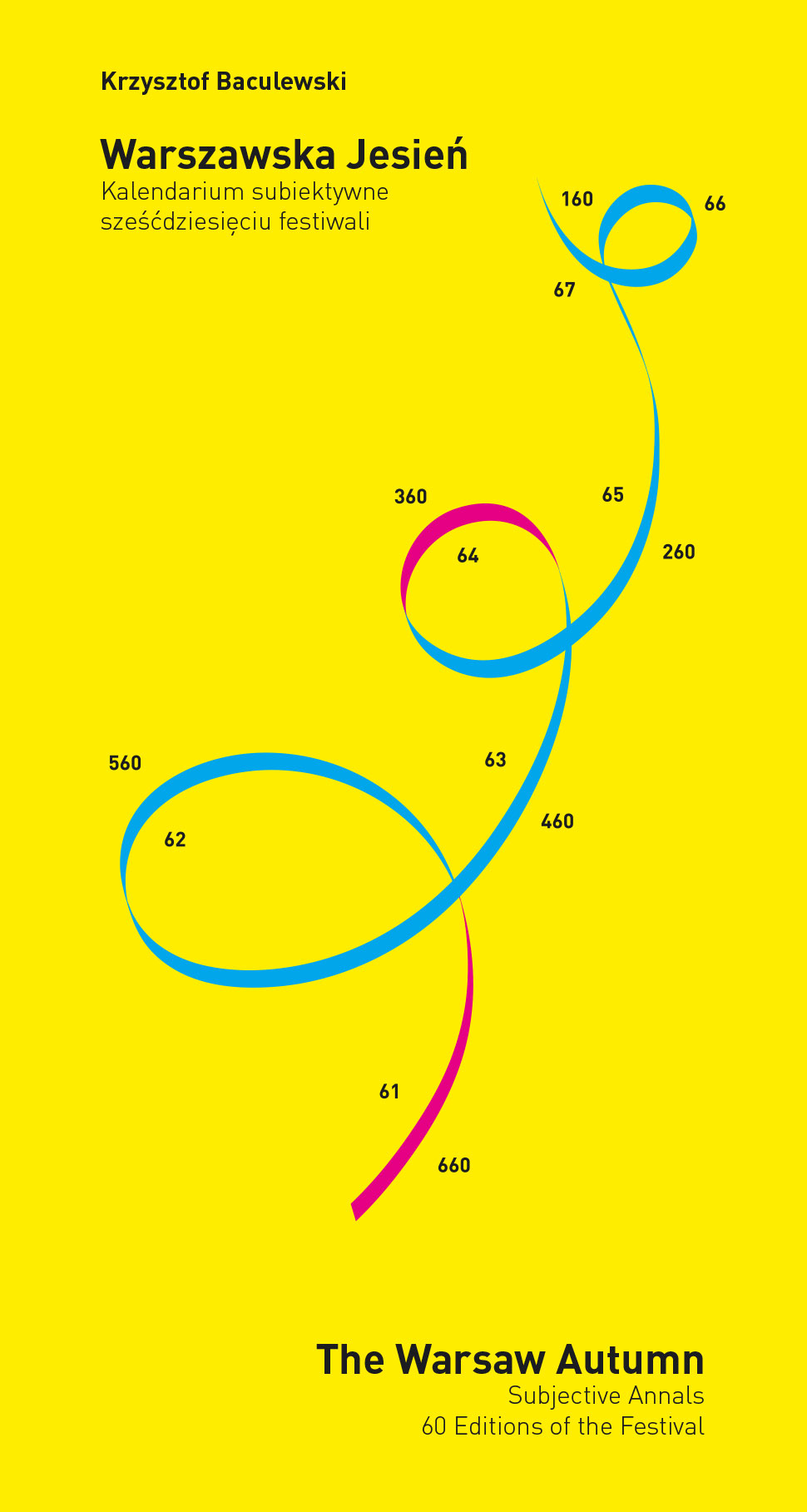

Krzysztof Baculewski "Subjective Annals 60 Editions of the Festival"
Another of the 'Warsaw Autumn''s jubilees - its 60th edition! Also - the first edition prepared under the Festival's new director, Jerzy Kornowicz, and the fiftieth that the undersigned is going to witness himself.
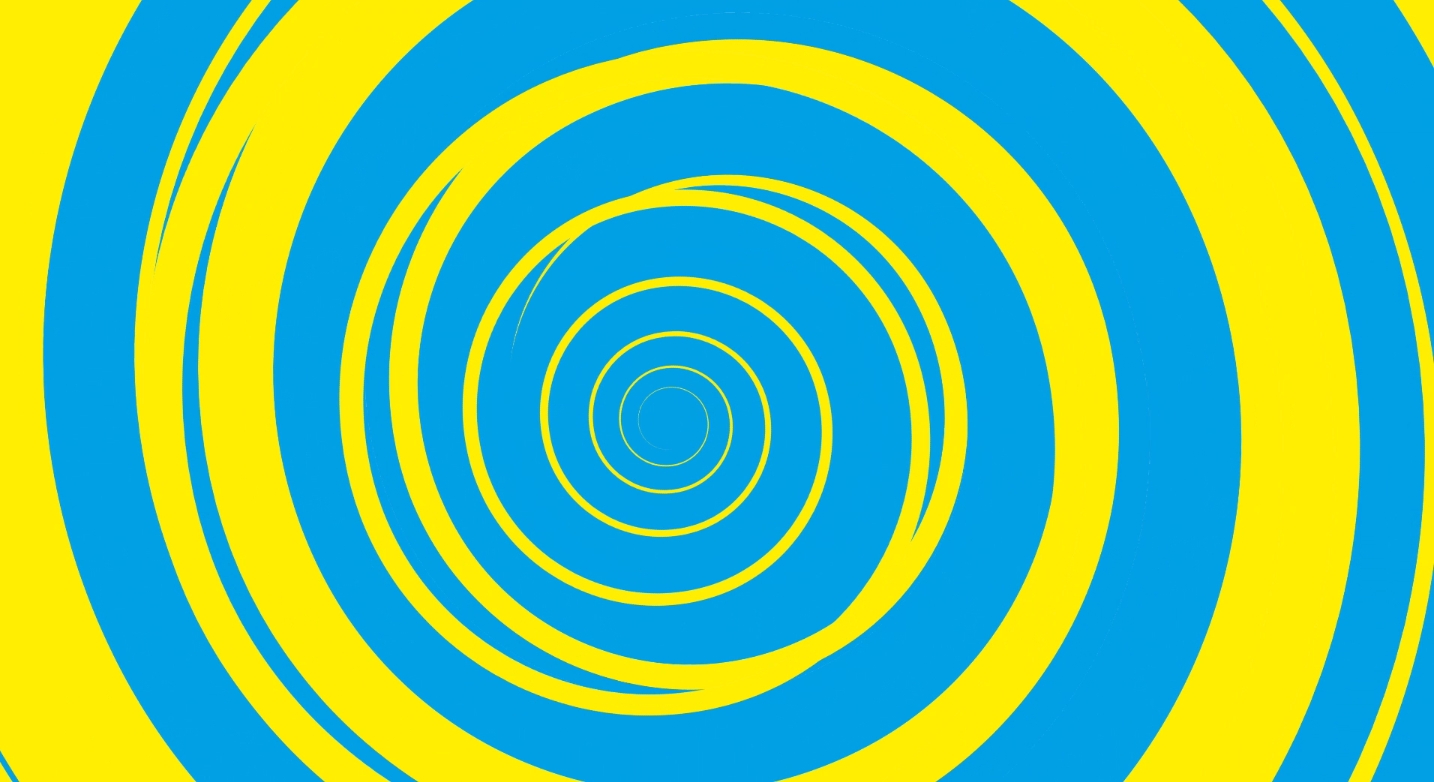
Warsaw Autumn video clip
screenplay and realization: Adam Dudek / Delikatesy&Frykasy, music: John Cage "Bacchanale" (Aleksandra Krzanowska, piano)
